This page contains the full text of Learning Quranic Arabic for Complete Beginners by Ikram Hawramani. You can get this book on Amazon.com as a paperback and Kindle ebook.
Learning Quranic Arabic for Complete Beginners
✽
A Step by Step Self-Teaching Guide to the Arabic Language of the Quran
Ikram Hawramani
2019
Stewards
Publishing

STEWARDS PUBLISHING
Copyright © 2019 Ikram Hawramani
First Edition
First Published in 2019 in the United States
ISBN 9781796502404
Hawramani.com
All rights reserved. No part of this publication may be reproduced, stored in a retrieval system, or transmitted, in any form or by any means for commercial purposes without prior permission of the author. The author affirms the readers’ right to share this book for personal, non-commercial purposes.
CONTENTS
Introduction

This book is an introduction to Quranic Arabic which begins by teaching the Arabic alphabet. It uses the unique LTSDR method to familiarize learners with the Arabic language without overwhelming them with unnecessary technical details. A highly developed and detailed transliteration system is used to help learners know the exact pronunciation of each Arabic word even before mastering the alphabet.
LTSDR (Learning through Stimulated Decipherment of Representations) is a method of language learning that I invented after I became dissatisfied with educational books on human languages, computer languages and mathematics. Many teachers are under the impression that highly structured books, with long lists and tables, facilitate learning. Many language books delve into technicalities like grammar and ignore the fact that in the real world people successfully learn languages all the time without knowing anything about grammar.
I used this method to teach myself many computer languages in very short time. I went on to write many successful educational books on learning computer languages like JavaScript using this method. I have now adapted it to teaching Quranic Arabic. LTSDR breaks down any complex topic into small, easily digestible pieces that the brain easily picks up and remembers.
I hope that you will have as much joy learning from this book as I had in writing it.
This book has been enriched by numerous works of Quranic exegesis (tafsīr) and Quranic linguistics (iʿrāb), such as the Quran commentaries of al-Ṭabarī, al-Wāḥidī, al-Qurṭubī and al- Bayḍāwī, and the works of Quranic linguistics al-Jadwal fī Iʿrāb al-Qurʾān of Maḥmūd al-Ṣāfī and Mujtabā min Mushkil al-Qurʾān of Aḥmad al-Kharrāṭ.
How to Use This Book
This book is training book designed to help you understand Quranic Arabic and train your ability to read it and comprehend it. Once you have learned the alphabet, do your best to read the Arabic and understand it, and use the translation and transliteration to help you when you need it. Difficult as it may be, it is essential that you do your best to struggle to understand the Arabic on its own. This is where your learning takes place.
Memorizing the meaning of the words is not as important as being able to understand the structure of the language. You can always look up the meaning of a word later during your normal reading of the Quran. What you should gain from this book is the ability to understand the structure and patterns of the language.
There is no way to make language learning effortless. Hundreds of hours of training are needed to gain a basic grasp of any language. Thousands of hours are needed to gain some expertise in it. This book is designed to help you get some of that training. To get the full benefits, once you finish the book, come back to the beginning and do all of the Lesson Reviews again. This will refresh your memory of things that will slowly escape your mind if you let them, while also helping you get a fuller grasp of the language’s grammar.
You know you are ready to move on when the material in the Lesson Reviews becomes so familiar that you can effortlessly read through them without having to use the transliterations and translations underneath the Arabic script.
Lesson 1: al-Fātiḥa

Above is the first verse of the Quran, which translates as “In the name of God: the Most Gracious, the Most Merciful.” This verse is part of the first chapter of the Quran. The chapter’s name is al-Fatiḥa (“the Opening”). The Arabic word for a chapter of the Quran is sūra. We will use the word “chapter” in this book.
Below is the first part of the verse:

The above phrase is made up of only three letters: b-s-m, which means “In the name of.” Arabic is an abjad language, meaning that the focus of the writing system is largely on consonants. Normal written Arabic lacks most vowels. A person simply learns to fill in the vowels as they progress in their learning. But important books like the Quran are written specially with all of the vowels filled in to help readers avoid misreading the text. Below is the same phrase with the vowels filled in:
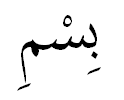
While the b-s-m remains, the additional marks known as ḥarakāt now tell us that the b-s-m should be read as b(i)-s-m(i). The singular of ḥarakāt is ḥaraka (“vowel mark”).
Below is the first letter of the earlier phrase:

The above is the letter bāʾ, which is pronounced exactly the same as the English letter “b”. Below is the same letter with the vowel mark added:

The diagonal line underneath the bāʾ is a kasra, which is a vowel mark that stands for the sound “i” as in the English word “sit”. The “b” sound above is now followed by a “i” sound, becoming “bi”. The sound bi is now a full word that means “with”, “in” or “by”. The meaning changes depending on the context.
Below is the next letter:

The above is the letter sīn, which sounds exactly like the letter “s” in English. Below is the same letter with the vowel mark added:

The circle above the sīn is a vowel mark known as sukūn, which tells us that there is no vowel here. It looks like the number zero; you can think of it as “zero vowels here.” By having a sukūn above it, the “s” sound remains a “s”. While most Arabic fonts represent the sukūn as a circle, calligraphic fonts can represent it as follows:

That is a stylized sukūn and it is not used in ordinary Arabic writing.
The next letter is a mīm, which sounds exactly like “m” in English:

Below is the same letter with the vowel added:

Now it reads like mi.
Below is the full phrase again:

The bi at the beginning is a word that means “with/by/in” as mentioned, while the smi means “name of”. The whole phrase is read as bis-mi. Even though the “s” is part of the second word, during reading it is conjoined with the first word simply because this is the easiest way to pronounce it. Saying bi-smi feels unnatural, it is much easier on the tongue to say bis-mi.
The sm means “name”. It is a shortened form of the Arabic word ism that we will see later.
Even though the phrase bis-mi means “in the name of”, we see no obvious word that stands for “of”. That is because the “of” is inferred from the context. You just know it is there when you see a word end with a “i” sound in certain contexts.
The lessons in this book are not meant to be memorized. Readers are meant to pick up a few useful things from each lesson while casually moving on to the next one. Important concepts will be explained many times in different lessons until they become fully clear.
Lesson 2: Allāh
In this lesson we will move onto the second word of the first verse of the Quran, which is the word Allāh. This is the Arabic word for “God” that is used by Arabic-speaking Muslims, Jews and Christians.

The word Allāh begins with a letter known as hamza. This letter makes a sound that is produced by a constriction of the throat, it is the same as the “u” sound in “umbrella”, but only the first part of the “u” sound (only the throat constriction).
The hamza, when it is at the start of a word, is generally represented as a vertical line:

Next we have two occurrences of the letter lām, which is pronounced the same as “l” in “language”:

One lām by itself looks like this:

After the two lāms we have a shadda which stands above the second lām:

The shadda mark simply duplicates the sound it stands above. It is not a vowel mark; it deals with consonants. Since it is above a lām, it causes a new lām to be created. It is therefore as if we now have three lāms. Therefore the following:

has the same meaning as the following:

When reading the word, all these lāms get merged into a single “l” sound as in the English word “ball”. Depending on the context, the “l” sound in Allāh can also be pronounced as “l” in “language”.
Let us now take another look at the word Allāh:

Above the shadda there is a short vertical line, stylized to make it look curvy. This line represents an alif, a letter which sounds similar to the “a” in “car”. This letter is normally a vertical line. We differentiate it from a hamza by the fact that it only occurs in the middle or end of a word, and by special marks that are placed on the hamza when needed. But here the alif is not written in the normal way. A few special Arabic words are written in a way that does not follow the ordinary rules of spelling.
The final letter of the word Allāh is a hāʾ, which is pronounced the same as the “h” in “hill”:

We are now ready to cover the full phrase “In the name of God”:
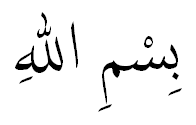
As mentioned earlier, the first phrase above is bis-mi. Now that the word Allāh comes after it, the pronunciation changes. The whole phrase is pronounced as bis-mil-lā-hi. We say hi because the hāʾ has a kasra underneath it (the final vowel mark in the above picture). The first “l” sound of Allāh is merged with the “mi” before it, becoming “mil”. The hamza at the beginning of Allāh completely disappears.
In Quranic calligraphy, these silent hamzas are written with a special mark above them, as follows:

Muslims often say bismillāh when starting something in hope of gaining God’s blessing, for example when leaving or entering a house. When this phrase is by itself, there is no kasra underneath the final hāʾ . But when the phrase is in context, for example in a verse of the Quran, there it will have a kasra.
Lesson 3: al-Raḥmān

We are still covering the first verse of the Quran. We will now move on to the “the Most Gracious, the Most Merciful” part.

Above is one of the names of God in Islam, al-Raḥmān, which is often translated as “The Most Gracious”. The word begins with an “al”, which in Arabic means “the”. Below is the “al” part by itself:

Next is the letter rāʾ, which is pronounced as the “r” in “random”:

Above the rāʾ there is a shadda which duplicates it:

Above the shadda there is a slanted line that is known as a fatḥa (pronounced fat-ḥa). This is a vowel mark that indicates a sound that is akin to the “u” in “cup”. The vowel mark does not apply to the original rāʾ but to the duplicated one. The first rāʾ remains unvowelled, as if it has a sukūn above it. Therefore the following:

is identical with the following:

The shadda is just a shorthand that helps us avoid having to write the same letter twice.
Let us take another look at the word we are working on:

The next letter is a ḥāʾ:

Notice the way this letter is not joined with the rāʾ before it. That is because some letters are joined and some letters are not. Over time it should become clear which ones are joined and which ones are not.
The letter ḥāʾ is also exists in the popular name Muḥammad. To find out how it is pronounced, I recommend that you do a search for “how to pronounce Muhammad” on websites like YouTube. Until you learn how to pronounce it, you can pronounce it like an “h”. In fact Persians, despite using common Muslim names like Muhammad, pronounce it exactly like an “h” due to the fact that their language does not have the ḥāʾ sound.
The next letter is one that we have already seen. It is a mīm. Earlier we saw a mīm that looked like this:

The current mīm looks like this:
The reason is that this mīm is joined to another letter both at the beginning and at the end. Arabic letters can look different depending on what they are joined with.
There is a fatḥa above the mīm, as follows:

This turns the “m” sound into a “mu” as in the English word “must”.
The last letter of al-Raḥmān is a nūn, which sounds exactly like the English letter “n”:

There is a hidden alif between the mīm and the nūn, which is why we say al-Raḥmān (no need to worry about hidden letters, only a few words are like this). We do not pronounce the fatḥa above the mīm, since it is difficult to say al-Raḥma-ān. The fatḥa is thrown away and only the hidden alif is pronounced, leading to the pronunciation mān.
Lesson 4: al-Raḥīm

Bismi (in the name [of]) allāhi (God) al-raḥmāni (the Most Gracious) al-raḥīm (the Most Merciful).
We will now move on to the final word, al-Raḥīm (“The Most Merciful”):
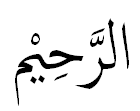
The only new letter above is the yāʾ before the final mīm. This letter acts like the English letter “y” and the English digraph “ee” as in “see” depending on the context. The appearance of this letter changes greatly depending on where it is. Since the ḥāʾ before it has a kasra and the yāʾ has a sukūn, the resulting sound is “ḥī”. The two names of God together are pronounced thus: al-Raḥ-mā-nil-Ra-ḥīm.
However, there is a complication here. Arabs say ar-Raḥ-mā-nir-Ra-ḥīm. The “l” sound becomes an “r” sound with a shadda when it comes to certain types of letters that come after “al”. This is something that will become clear over time. The full verse is pronounced thus: bis-mil-lā-hir-Raḥ-mā-nir-Ra-ḥīm. There is a kasra on the last letter al-Raḥīm in the Quranic verse, as follows:
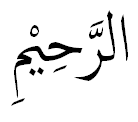
This kasra is ignored because it is at the end of the verse. It would have been pronounced if there was something after it.
Lesson 5: al-Fātiḥa 2

Praise is for God, Lord of the Worlds
Transliteration: al-ḥamdu li-llāhi rabbi al-ʿālamīn
Pronunciation: al-ḥam-du lil-lā-hi rab-bil-ʿā-la-mīn
Al-ḥamdu (praise [is]) li-llāhi (for God) rabbi (Lord [of]) al-ʿālamīn (the worlds).
An essential part of your learning is to try to read the Arabic while using the transliteration to help you figure out the letters you do not know. Take a minute to do that at the beginning of each lesson.
We will now move on to the second verse of the Quran (chapter 1, verse 2). The first phrase of the verse is al-ḥamdu, which means “praise is”. The word ḥamd means “praise”, but not just any kind of praise. It means grateful praise; praise directed at someone who deserves it and has earned it by doing us a favor. The verse starts with al-ḥamd rather than merely ḥamd because in Arabic the “al” also serves the function of making the meaning of a word more general. If the word lacked “al”, it would have meant “a praise”, which sounds strange.

Above is the phrase al-ḥamdu. The letters are all familiar except for the last one. That is the letter dāl, which is the same as the English letter “d”. There is a vowel mark above it. This mark is known as the ḍamma, which makes the same sound as “u” in the English word “put”.
As mentioned, al-ḥamdu means “praise is”. The context tells us that this is an “is” context. This is figured out by looking at the words that come after it. There is no shortcut to learning how this works; you just have to keep reading and learning until your brain starts to pick up the patterns.
The next word is lillāhi, “for God”:

The beginning li is a word by itself that means “for”. The rest of the phrase is the word Allāh. The word is compressed due to the context. Originally it was li-Allāhi, but it is easier on the tongue to throw away the A and say lillāhi.
Rather than writing

we write

The next word in the verse is rabb, which means “lord”, “master” and “mentor”:

The first letter is a rāʾ (which makes the “r” sound). We have seen it before, but here it looks different due to the fact that it is not joined to anything. The next letter is a bāʾ which makes a “b” sound. The shadda on the bāʾ duplicates it, as if the word was as follows:

The next word is al- ʿālamīn, which is often translated as “the worlds”:

The first letter of ʿālamīn is the letter ʿayn, which has no equivalent in English. Watch a video on how to pronounce the Arabic name Umar, which begins with an ʿayn, and you will get an idea about how it is pronounced.

There is a hidden alif after the ʿayn, which is why the fatḥa on the ʿayn is ignored. If you look at a modern Arabic book, the alif would be there:

It is just a peculiarity of the Quranic text that it lacks the alif. I use the symbol ʿ to represent the letter ʿayn in my transliteration system.
The rest of the letters should be familiar. Let us look at the full phrase:
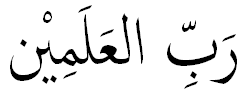
Note that there is a kasra underneath the bāʾ in rabb, so that it is actually rabbi. The ending “i” sound functions as an “of”, so that the full phrase is “Lord of the worlds”.
Lesson 6: al-Fātiḥa 3-4

The Most Gracious, the Most Merciful
Transliteration: al-Raḥmāni al-Raḥīm
Pronunciation: al-Raḥ-mā-nir-Ra-ḥī-m
Al-Raḥmāni (the Most Gracious) al-Raḥīm (the Most Merciful).
The third verse of the Quran is merely a repetition of the names of God from before: al-Raḥmān al-Raḥīm (“the Most Gracious, the Most Merciful”). We will therefore move on to the next verse:

Translation: Sovereign of the Day of Repayment
Transliteration: māliki yawmi al-dīn
Pronunciation: mā-li-ki yaw-mid-dīn
Māliki (Sovereign [of]) yawmi (the day [of]) al-dīn (repayment).
The fourth verse of the Quran starts with the word is mālik (“sovereign”, “keeper”).

The first letter is mīm (making a “m” sound). There is hidden alif right after it which would be shown in standard Arabic writing:

The next letter is a lām (making a “l” sound). The final letter is a kāf which makes a “k” sound. The symbol above the kāf is part of the letter; it is not a special mark. It is only written when the kāf is at the end of a word.
The second word of the verse is yawm, which means “day”.

The first letter is a yāʾ, which as mentioned functions as the English “y” or “ee” depending on its context. Here it functions as a “y”. Since it has a fatḥa above it, we say “ya”. The “a” is a short “a”, pronounced as the “u” in “cup”. In the transliteration system I use in this book, the long “a” sound (as in “car”) has a line above it: ā.
The second letter of the word yawm is a wāw, which functions as the English “w” or “oo” depending on context. Here it functions as a “w”. It has a sukūn above it which tells us it is unvowelled.
The final letter of the word yawm is a mīm. It looks like that because it is not joined with anything.
The mīm has a kasra underneath it, so in context (when reading it as part of the verse) we say yawmi, and this tells us that it means “day of” rather than merely “day”.
The final word of verse four of the Quran is the word dīn, which means “religion”, “creed”, “repayment”, “recompense”. In this particular verse it means “repayment”, “recompense”.

After the “al” there is a dāl (“d”) with a shadda above it, which duplicates it. When we pronounce the word with the “al” before it, we say ad-dīn similar to the way we said ar-Raḥmān (“the Most Gracious”). After the dāl there is a yāʾ with a sukūn above it, making the sound “ee” as in “see”. This long “ee” sound is represented in my transliteration system by the “i” with a line above it: ī.
This full phrase yawm al-dīn (pronounced yaw-mid-dīn) means “Day of Repayment”, meaning the Day of Judgment.
Lesson 7: al-Fātiḥa 5

You we worship and You we ask for help
Transliteration: Iyyāka naʿbudu wa-iyyāka nastaʿīn
Pronunciation: Iy-yā-ka naʿ-bu-du wa iy-yā-ka nas-ta-ʿīn
Iyyāka (You) naʿbudu (we worship) wa-iyyāka (and You) nastaʿīn (we ask for help).
The first word of the fifth verse of the Quran is iyyāka, which means “you” (singular). This is not an ordinary “you”; it is only used to express high regard for the addressed person. It almost means “your highness”.

Above, the vertical line at the beginning is a hamza as has been mentioned. The symbol underneath it indicates that this hamza is pronounced “i” rather than “a”. If the symbol was above the vertical line, it would have told us that it is pronounced “a”. The kasra is additional help that tells us the word starts with a “i” sound, but it is not necessary because whenever you see the special hamza symbol underneath the vertical line, you immediately know there is a kasra underneath whether it is written or not. Many Arabs when writing omit both the hamza symbol and the kasra, as follows:

One simply learns to figure out the meaning and pronunciation based on the word and its context.
The fourth letter (the vertical line after the yāʾ) is an alif. Here we finally see a proper alif, which is a vertical line that can be joined with what comes before it. The vertical line in the middle or end of a word is always an alif rather than hamza unless it has the special symbol of the hamza underneath or above it, in which case it becomes a hamza.
The second word is naʿbudu, which means “we worship”:

The third letter is a bāʾ (“b”), which we have seen before.
Next we have the phrase wa-iyyāka, which means “and you”:

The first part of the phrase is wa, which is Arabic for “and”. There is no space between this wāw letter that means “and” and the word after it. The special hamza mark and kasra appear to be underneath the wāw, but they actually belong to the vertical line and form part of the word iyyāka (“you”) that we saw earlier.
The final word is nastaʿīnu (“we ask for help”):
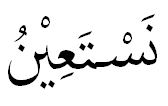
The only new letter here is the third one, which is a tāʾ and makes a “t” sound:

If this letter is at the beginning of a word, it looks like this:

Lesson 8: al-Fātiḥa 6

Guide us to the Straight Path
Transliteration: Ihdinā al-ṣirāt al-mustaqīm
Pronunciation: Ih-di-nāṣ-ṣi-rā-tal-mus-ta-qīm
Ihdinā (guide us) al-ṣirāt (the path) al-mustaqīm (the straight).
The first word of the sixth verse of the Quran is ihdinā (“guide us”):

The second letter is a ḥāʾ which makes a “h” sound as in “hill”. We have seen as the last letter of the word Allāh. It looks different here because it is not joined with anything before it. You recognize it by the double holes or “eyes”. When the ḥāʾ is in the middle of a word, it looks like this:

The next word is al-ṣirāt, which means “the path”:

There are two new letters in this word. The first one after the “al” is a ṣād. This has no English equivalent; you can pronounce it as an “s” for now. You can look up “how to pronounce Mustafa” online to find out how the letter sounds (the “s” in Mustafa is a ṣād). In the Quranic text, the alif is missing and is represented by a short vertical line. Here I have chosen to place a full alif.
Do not confuse ṣād with ḥāʾ:

The letter on the left is a ḥāʾ, while the one on the right is a ṣād. The ṣād has no sharp edges while the top part of the ḥāʾ has a sharp angle, although calligraphers may soften the angle a little as seen above.
The last letter of al-ṣirāt is a ṭaʾ. This letter looks like a ṣād with a vertical line at its end:

The letter ṭaʾ has no English equivalent. For now you can pronounce it as a “t”. The “t” in the name Mustafa is a ṭaʾ.
The final word in the verse is al-mustaqīm, “the straight”:
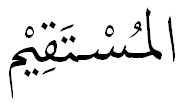
The first letter after the “al” is a mīm. Some fonts show an “eye” for the mīm, as follows:

But other fonts represent the mīm without an eye. In some fonts, as in the earlier image, the mīm is directly beneath the letter that comes before it, in this case the lām, while in the image right above the lām is elongated for a bit before the mīm.
The one new letter in this word is the second before last, a qāf:

The qāf looks like a mīm with two dots above it. It has no English equivalent. The country name Iraq has a qāf at the end.
Let us now look at the full phrase “the Straight Path”:

The first means “the path” while the second one means “the straight”. But when they are together, the meaning is “the Straight Path”. The second word, al-mustaqīm, is an adjective or ṣifa—it describes the word that comes before it. In Arabic, the adjective follows the format of the word before it. If the previous word has an “al”, the adjective must have an “al” too.
Lesson 9: al-Fātiḥa 7a

We are now at the final verse of the first chapter of the Quran. Due to its length, we will break it up into multiple parts:

The path of those whom You bestowed your favor upon
Transliteration: Ṣirāta alladhīna anʿamta ʿalayhim
Pronunciation: Ṣi-rā-tal-la-dhī-na an-ʿam-ta ʿa-lay-him
Ṣirāta (path) alladhīna (those whom) anʿamta (You bestowed) ʿalayhim (upon them).
The first word is ṣirāt (“path”), which we saw in the previous lesson. In this verse it lacks an “al”. However, its context makes it definite, as if it has an “al”. This will be explained further in future lessons.
The second word is alladhīna (“those who”, “those whom”).

The “al” at the beginning is part of the word—it is not the usual “al” that means “the”. The third letter is a dhāl, which is pronounced exactly like the “th” in “that”. In my transliteration system I use dh to represent it. The word alladhīna is the plural form of alladhī (“he who”, “he whom”):

That is used when referring to a masculine item. When referring to a feminine, we say allatī (“she who”, “she whom”):

And when referring to a plural feminine, we say allātī (“those who”, “those whom”):

Back to the Quranic verse, the third word is anʿamta (“you bestowed”):

The first letter is a hamza. This hamza has the hamza symbol above it. This tells us that this particular hamza cannot be neglected even when reading it in context (the same is true when the hamza symbol is beneath the vertical line). If you remember, the word Allāh would become li-llāh if it had a li before it (the A would disappear). But when you see the hamza symbol, you know this cannot happen to it. So even if we place the emphatic word la (“truly”) before anʿamta, it becomes la-anʿamta (“You truly bestowed”). It does not become lanʿamta.
The final part of the part of the verse we are working on is ʿalayhim (“upon them”):
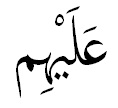
The first letter is an ʿayn which we have already seen. This is what it looks like if it is at the beginning of a word. To refresh your memory, here is what it looked like when it was in the middle of a word:

The ʿayn can also have an eye depending on the font, as follows:

The way we differentiate it from a mīm is that the ʿayn has sharper angles, looking somewhat like an inverted triangle.
The letter before last of ʿalayhim is a ḥāʾ. Here it is stylized in a way that makes it lack any eyes.

Above are four examples of the shapes the letter ḥāʾ can take. The one on the right is the shape it takes when it is alone by itself at the end of a word.
Lesson 10: al-Fātiḥa 7b
Below is the second part of the final verse of the chapter we are in:

Not those who have evoked anger and not the misguided
Transliteration: ghayri al-maghḍūbi ʿalay-him wa-lā al-ḍālīn
Pronunciation: ghay-ril-magh-ḍū-bi ʿa-lay-him wa-laḍ-ḍā-līn
Ghayri (not) al-maghḍūbi ʿalay-him (those upon whom anger is directed) wa-lā (and not) al-ḍālīn (the misguided [ones]).
The first word of this fragment is ghayri, which means “except for”, “not [that thing]”, “apart from”:

The first letter is a ghayn which has no English equivalent. It is present in the city name Baghdad. You can pronounce it as a “g” in “girl” until you learn how to pronounce it accurately. Below are some of the different shapes this letter takes:
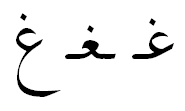
The second word is al-maghḍūbi, which means “thing that is experiencing someone’s anger”, something that someone is angry at. There is no simple English word for it, and it makes more sense when read with the word after it:
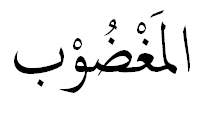
After the “al” the first letter is a mīm. The next letter is a ghayn which we just saw above. The third letter is a ḍād, which we have not seen before. This letter has no English equivalent. You can pronounce it as a “d” for now. If you try to say “d” while making your whole tongue touch the roof of your mouth, you would be close to making the correct sound. Below are the different shapes this letter takes:

The next letter is ʿalayhim (“upon them”). We already covered this phrase in the previous lesson. The full phrase al-maghḍūbi ʿalayhim means “those upon whom is anger is directed”.
The next phrase is wa-lā (“and not”):

The above letters are all familiar. After the wāw there is a lām and then an alif. Here is another way of writing it to clarify it further:

The word lā is Arabic for “no”, “not”, “do not”, the meaning depends on the context.
The final word in the current fragment is al-ḍālīn (“the misguided [ones]”):

Lessons 1-10 Review
At the end of each there will be a Lesson Review meant to help you practice your learning. Do your best to read the Arabic text and make sense of it. Use the transliteration and translation underneath it to help you when you need it.
According to LTSDR theory the act of comprehension is the act of learning. Your efforts to “decipher” the meaning of each word is what helps your brain learn, this is what the “D” in LTSDR stands for. Trying to decipher words in a language you do not speak is very taxing on the brain, but by performing it you force your brain to build new neuronal connections that cause the new language’s vocabulary and grammar to be embedded in your brain (i.e. to be learned). Doing the deciphering at the end of each lesson is therefore essential; it is in fact the most important part of the learning you will get from this book.

Bismi (in the name [of]) allāhi (God) al-raḥmāni (the Most Gracious) al-raḥīm (the Most Merciful).

Al-ḥamdu (praise [is]) li-llāhi (for God) rabbi (Lord [of]) al-ʿālamīn (the worlds).

Al-Raḥmāni (the Most Gracious) al-Raḥīm (the Most Merciful).

Māliki (Sovereign [of]) yawmi (the day [of]) al-dīn (repayment).

Iyyāka (You) naʿbudu (we worship) wa-iyyāka (and You) nastaʿīn (we ask for help).

Ihdinā (guide us) al-ṣirāt (the path) al-mustaqīm (the straight).

Ṣirāta (path) alladhīna (those whom) anʿamta (You bestowed) ʿalayhim (upon them).

Ghayri (not) al-maghḍūbi ʿalayhim (those upon whom anger is directed) wa-lā (and not) al-ḍālīn (the misguided [ones]).
Lesson 11: al-Ikhlās
We will now move on to another short chapter of the Quran—chapter 112. The name of this chapter is al-Ikhlās (“sincere devotion”) and it has only four verses.

Muslims pronounce the the basmala (the phrase “In the name of God: Most Gracious, Most Merciful”) at the beginning of the recitation of every chapter of the Quran (except chapter 9), therefore we will placed at the top of the start of each new chapter we deal with. While the basmala is part of the first chapter of the Quran, when it comes to the rest of the chapters it is placed ahead of them outside the chapters.
Verse 1

Say: “He is God, [Who is] One.”
Transliteration: qul huwa Allāhu aḥad
Pronunciation: qul hu-wal-lā-hu a-ḥad
Qul (say) huwa (He is) Allāhu (God) aḥad (One/Individual).
The first word is qul, which is a command that means “Say!” The second word is huwa, which means “he [is]”. The third word is Allāh, and the fourth word aḥad, which means “one”, “individual”, “solitary”. The word for the number one in Arabic is actually wāḥid. The word aḥad emphasizes the individuality of the thing described.
Verse 2

God: the Eternal
Transliteration: Allāhu al-ṣamad
Pronunciation: Al-lā-huṣ-ṣa-mad
Allāhu (God) al-ṣamad (the Eternal, or the Absolute).
The second word al-ṣamad, which means “eternal”, “absolute”.
Verse 3

He did not beget, and he was not begotten
Transliteration: lam yalid wa-lam yūlad
Pronunciation: lam ya-lid wa-lam yū-lad
Lam (did not) yalid (He begets) wa-lam (and did not) yūlad (He gets begotten).
The first word is lam, which means “did not”. The second word yalid means “he begets”. Next, the phrase wa-lam means “and did not”. The final word yūlad means “he gets begotten”.
Verse 4

And there was not to Him any equivalent
Transliteration: wa-lam yakun la-hu kufuwan aḥad
Pronunciation: wa-lam ya-kun la-hu ku-fu-wan a-ḥad
Wa-lam (and did not) yakun (was/existed) la-hu (for Him) kufuwan (an equal) aḥad (one/anyone).
We are now at the final verse. The word yakun means “was”, “existed”. But it can refer to an action or state that continued from the past to the present. For this reason this verse is often translated as “And there is not to Him any equivalent.”
The phrase la-hu is made up of two words: la, which means “for”, and hu, which is a pronoun that means “him”. If it was referring to a female, it would have been la-hā (“for her”):

And if it was referring to a plural male group, it would have been la-hum (“for them”):

As for a plural female group: la-hunna (“for them”):

The tiny wāw after la-hu in the Quranic text is to help with recitation. It tells the reciter that the sound before it should be voiced for double the time of a normal sound:

The reason the lām has a shadda above it is that when reciting it in context, according to the rules of Quran recitation (the art of tajwīd), the letter before it can be omitted and the lām can be doubled. Instead of saying yakun la-hu the reciter says yakul la-hu. This is not essential for understanding the Quran therefore there is no need to be concerned about it.
The word kufuwan (“an equal”, “an equivalent”) starts with the letter kāf. Here it does not have the special kāf symbol which we saw in the past: because that symbol only shows up when the kāf is at the end of a word:

The second letter of the word kufuwan is a fāʾ which makes a “f” sound. It looks like a qāf but it has only one dot instead of two:

The wāw after the fāʾ has a double slanted line above it that we have not seen before:
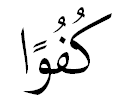
This symbol is known as a tanwīn. It creates a vowel sound followed by an “n” sound. There are three types of tanwīn, each corresponding to one of the vowel marks:

The one on the right is tanwīn al-fatḥ: it creates the sound an. The one in the middle is tanwīn al-kasr and creates the sound in. The one on the left is tanwīn al-ḍamm and creates the sound un. The tanwīn performs various grammatical functions, one of which is to turn a word into its singular form. For example, below is the word bayt, which means “house”:

Below is the same word with a tanwīn al-ḍamm at its end, making it baytun:

Now the meaning is “a house” rather than just “house”. All of the tanwīns can perform this function of turning a name into a singular instance.
In the Quranic verse, kufuwan means “an equivalent”. Notice that this word has an alif at the end:

The alif is only written when it is tanwīn al-fatḥ, which is why baytun above has no alif. The reason why an alif exists here is that this alif is pronounced when the word is at the end of a sentence. If there had been nothing after kufuwan, or if we paused here before going on, we would have said kufuwā, taking away the un sound and replacing it with a long ā. The meaning remains the same; it is just the reading that changes.
As for the other types of tanwīn, if the word is at the end of a sentence or if someone pauses at them, the tanwīn becomes a sukūn. For example, below is Arabic for “a tall man”:
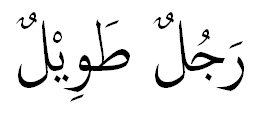
If this phrase is part of a longer sentence, you would say rajulun (“a man”) ṭawīlun (“a tall [one]”). But if it is at the end of a sentence, you would ignore the tanwīn and say rajulun ṭawīl.
The second letter above is a jīm, with sounds like the “j” in “juice”. It looks exactly like a ḥāʾ except that it has a dot underneath it:

The last word of the verse is aḥad (“one”), which we have already seen.
Lesson 11 Review


Qul (say) huwa (he is) Allāhu (God) aḥad (one/individual).

Allāhu (God) al-ṣamad (the Eternal, or the Absolute).

Lam (did not) yalid (he begets) wa-lam (and did not) yūlad (he gets begotten).

Wa-lam (and did not) yakun (was/existed) la-hu (for him) kufuwan (an equal) aḥad (one/anyone).
Lesson 12: al-ʿAṣr
In this chapter we will move on to chapter 103 of the Quran, which is called al-ʿAṣr (“time”, “the age”, the word age has the same meaning as the “age” in “the Middle Ages”). This chapter has only three verses.

Verse 1

[I swear] by the age
Transliteration: wa-alʿaṣr
Pronunciation: wal-ʿaṣr
The first letter of this very short verse is a wāw, which usually means “and”. Here, however, it means “by”. It is used to express an oath, as when you say “By God, I did not do that!” Here God swears by the age.
Verse 2

Indeed, humanity is in loss.
Transliteration: inna al-insāna la-fī khusr
Pronunciation: in-nal-in-sā-na la-fī khusr
Inna (truly) al-insāna (humanity) la-fī (truly in) khusr (loss).
The first of this verse is inna, which is used for emphasis. It means “truly”, “indeed”, “verily”. The second word is al-insān, which literally means “the human”. As has been mentioned, the “al” before a word sometimes functions to make the meaning of a word more general, therefore while the word literally means “the human”, we know it actually means “humanity”, “mankind”.
There is a hidden alif after the sīn in al-insān in the Quranic calligraphy. The short vertical line, known as a dagger, represents this alif. In standard Arabic writing the alif is present:
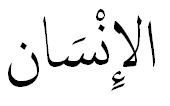
After the “al” at the beginning of the word, there is a hamza with a hamza symbol and kasra beneath it. Below is a different way of writing the same word in order to clarify it:
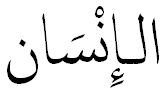
To clarify further, below I have separated the “al” completely from the word:
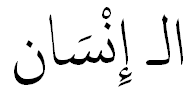
The next phrase in the verse is la-fī (“truly in”):

The la is used for emphasis, it means “truly”, “verily”. The word fī means “in”. Notice that the yāʾ at the end has two dots underneath it, while in the Quranic calligraphy the dots are missing. The dot is not essential, it merely helps readers know this is a yāʾ. Calligraphers may avoid them for stylistic purposes.
The final word of the verse is khusr, which means “[a state of] loss”.
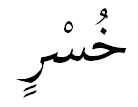
The first letter is a khāʾ, which we have not seen before. It is present in the city name Khartoum. You can pronounce it as a “k” until you learn the correct pronunciation. Below are the different forms this letter takes:

Notice that there is a tanwīn al-kasr at the end of the word. Since the word is at the end of a verse, this tanwīn is ignored and is treated as if it was a sukūn. We say khusr rather than khusrin unless we continue the recitation to the next verse without pausing, it which point we would pronounce the tanwīn.
Verse 3, part 1
We are now at the third and final verse. Since it is a little long, we will break it up into two fragments:

Translation: Except those who have believed and done righteous deeds
Transliteration: illā alladhīna āmanū wa-ʿamilū al-ṣāliḥāt
Pronunciation: il-lal-la-dhī-na ā-ma-nū wa-ʿa-mi-lūṣ ṣā-li-ḥāt
Illā (except) alladhīna (those who) āmanū (they believed) wa-ʿamilū (and they did) al-ṣāliḥāt (good deeds).
The word illā means “except”. The second word alladhīna (“those”) is familiar.
The third word is āmanū (“they believed”, “they acquired faith”). It starts with a hamza followed by an alif. The vertical line is not above the hamza because that would make it part of the hamza. It is written to its left to tell us that it is an independent letter.
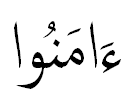
In standard Arabic, this word would be written as follows:
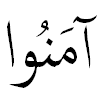
The two have exactly the same meaning and pronunciation. Standard Arabic uses the letter you see at the beginning to represent a hamza that has an alif after it.
The alif at the end of the word is not pronounced. It is only there in past verbs referring to a plural masculine. Its only purpose is to help us know that the word is a plural verb rather than a plural noun. Instead of using an alif, they could have used any other symbol for this purpose, but they settled on an alif. If you forget to write the alif, this would suggest that the word āmanū is a noun rather than a verb, which is nonsensical. As you progress in your learning, you will come to recognize these silent alifs.
To turn this verb into the singular masculine, we say āmana (“he believed”):

As for a singular female, we say āmanat (“she believed”):

For a plural female group, we say āmanna (“they believed”):
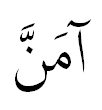
And if you wanted to say “I believed”, you would say āmantu:

To say “we believed”, you would say āmannā:

These different verb forms all follow a familiar pattern that you will pick up over time.
The next word of the verse is wa-ʿamilū (“and they did”, “and they performed”):
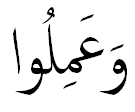
Similar to the previous word, there is a silent alif at the end. In Arabic past verbs can refer to actions or states that continue to the present, which is why this verb is translated as “those who have done righteous deeds”, and similarly the previous verb is translated as “those who have believed”. One determines from the context whether the action started and ended in the past or whether it is implied that the action continues to the present.
The next word is al-ṣāliḥāt (“righteous deeds”, “good deeds”), literally “the wholesome [things]”:

In the Quranic calligraphy shown earlier both the alif after the ṣād and the alif after the ḥāʾ are hidden, while above I have written them both in their usual places. The word al-ṣāliḥāt is the feminine plural of al-ṣāliḥ (“the sound [one]”, “the wholesome [one]”, “the good [one]”, “the pious [one]”):

To say “The pious man,” we say al-rajul al-ṣāliḥ:

To say “The pious woman”, we say al-marʾatu al-ṣāliḥa:

The word al-marʾatu (“the woman”) ends with what is called a tāʾ marbūṭa or closed tāʾ. It looks like a hāʾ but has two dots above it, and it only occurs at the end of words to indicate the feminine:

The closed tāʾ is only pronounced if there comes something after it. If we had “the woman” without anything after it, we would not pronounce it:

The above is pronounced al-marʾa. The word al-ṣāliḥa (“the pious”) also has a closed tāʾ because in Arabic adjectives must follow the pattern of the word they describe. Since “the pious” is applying to a female, al-ṣāliḥ acquires a closed tāʾ at its end to becomes al-ṣāliḥa in order to match the word it describes.
Verse 3, part 2
We will now move on to the second and last fragment of the final verse of chapter 103:

And advised each other to truth and advised each other to patience
Transliteration: wa-tawāṣaw bi-al-ḥaqqi wa-tawāṣaw bi-al-ṣabr
Pronunciation: wa-ta-wā-ṣaw bil-ḥaq-qi wa-ta-wā-ṣaw bil-ṣabr
Wa-tawāṣaw (and they recommended to each other) bi-al-ḥaqqi (by the truth) wa-tawāṣaw (and they recommended to each other) bi-al-ṣabr (by patience).
The word tawāṣaw means “they recommended to each other”, “they advised each other”, but it has no exact equivalent in English.
The phrase bi-al-ḥaqqi is made up of the word bi (“with”, “by”) and al- ḥaqqi (“the truth”). The last phrase is bi-al-ṣabr. We again have the word bi followed by al-ṣabr (“patience”).
Lesson 12 Review


Wa-alʿaṣr (by the age).

Inna (truly) al-insāna (humanity) la-fī (truly in) khusr (loss).

Illā (except) alladhīna (those) āmanū (they believed) wa-ʿamilū (and they did) al-ṣāliḥāt (good deeds).
Illā (except) alladhīna āmanū (those who believed) wa-ʿamilū al-ṣāliḥāt (and did good deeds).

Wa-tawāṣaw (and they recommended to each other) bi-al-ḥaqqi (by the truth) wa-tawāṣaw (and they recommended to each other) bi-al-ṣabr (by patience).
Wa-tawāṣaw bi-al-ḥaqqi (the recommended the truth to each other) wa-tawāṣaw bi-al-ṣabr (the recommended patience to each other).
Lesson 13: al-Ḍuḥā
We will now move on to the 93rd chapter of the Quran. This chapter has 11 verses and is called al-Ḍuḥā (“the forenoon”, “the [time of] the morning brightness”). It refers to the part of the morning where the sun has risen for a while so that it has become very bright.

Verse 1

By the [time of] the morning brightness
Transliteration: wa-al-ḍuḥā
Pronunciation: wad-ḍu-ḥā
The verse begins with the letter wāw. Like we saw before, the letter means “by” (for oaths) rather than having the usual meaning of “and”. The one new thing above is the final letter, which is actually an alif. This alif is known as alif maqṣūra (“shortened alif”). It looks like a yāʾ but has nothing to do with a yāʾ. Some Arabic words simply end with an alif that is written in this way. In the Quranic calligraphy a dagger is placed above it to hint that it is an alif rather than a yāʾ.
Verse 2

By the night when it covers
Transliteration: wa-al-layli idhā sajā
Pronunciation: wa-al-layli idhā sajā
Wa-al-layli (by the night) idhā (when) sajā (covers with darkness).
After the oath-taking wāw, the first word is al-layl (“night”). The word idhā means “when”. The word sajā means “it covered”, for example when you cover something with a blanket. The full verse therefore means “I swear by the night when it covers [the world like a blanket].” The word sajā also ends with a shortened alif. The word sajā is in the past tense format, but due to the fact that there is an idhā before it, we know it is referring to the present tense. The word idhā turns the past tense into the present tense.
Verse 3

Your Lord has not abandoned you, and He has not detested [you]
Transliteration: mā waddaʿa-ka rabbu-ka wa-mā qalā
Pronunciation: mā wad-da-ʿa-ka rab-bu-ka wa-mā qa-lā
Mā (has not) waddaʿaka (abandoned you) rabbu-ka (your Lord) wa-mā (and has not) qalā (detested).
The word mā means “has not”. The phrase waddaʿaka means “abandoned you”. It is made up of two words: waddaʿa (“[he] abandoned”) and ka (singular “you”). The wāw at the beginning of waddaʿa is part of the word—it is not the independent wāw that means “and” or “by”. If we wanted to say “abandoned you” directed at a female, we would say waddaʿakī:
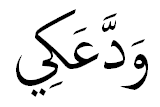
Arabic differentiates between a plural made up of only two people and a plural made up of three or more people. If we said “abandoned you” and the speech was directed at two males or two females, or a male and a female, then we would say waddaʿakumā:

In this unique case, there is no differentiation between speech directed at males or females. But if the speech was directed at a group of males (three or more), we would say waddaʿakum:
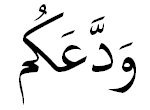
As for a group of females, we would say waddaʿakunna (“he abandoned you [O group of females]”):
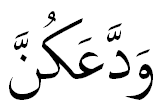
The next phrase of the verse is rabbuka (“your Lord”, “your Master”), made up of rabb (“lord”, “master”) and ka (singular “you”):

Below are different versions of this word all of which mean “your Lord”. From right to left: directed at one female, at two males or females, a group of males, and a group of females.

Next we have the phrase wa-mā (“and has not”):

The final word of the verse is qalā, which ends with a shortened alif and means “he detested”:

Verse 4

And truly the Hereafter is better for you than the first [life]
Transliteration: wa-la-l-ākhiratu khayrun la-ka mina al-ūlā
Pronunciation: wa-lal-ā-khi-ra-tu khay-run la-ka mi-nal-ū-lā
Wa (and) la (truly) l-ākhiratu (the Hereafter) khayrun ([is] better) la-ka (for you) mina (than) al-ūlā (the first).
The phrase wa-la-al-ākhiratu is made up of three words: wa (“and”), la (“truly”), al-ākhiratu (“the Hereafter”). The “al” of al-ākhiratu merges with the la that comes before it, as follows:

The hamza at the beginning of al-ākhiratu disappears, so that we say lal-ākhiratu. Above, I have used the standard letter to represent the ā, while in the Quranic calligraphy above a hamza symbol is used, followed by an alif. As has been mentioned, the two things have the same meaning.
The next word is khayrun (“better”, “best”). In Arabic the comparative and the superlative forms of adjectives are the same word. We determine whether “better” or “best” is meant from the context. The rest of the verse shows us that here “better” is meant.

Above, I have used the usual symbol for tanwīn al-ḍamm on the end of the final letter, while in the Quranic calligraphy another symbol is used that looks like two small wāw letters. This was done by the calligrapher for decorative purposes; it is still a tanwīn al-ḍamm.
The next word is laka (“for you”):

In the Quranic calligraphy the lām has a shadda:

The reason is that according to the art of Quran recitation (tajwīd), a person can duplicate the lām and merge it with the sound before it, saying: khayrul laka (note that the “n” sound of the tanwīn has now become a “l” sound).
The final two words of the verse are:
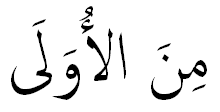
The first word is mina (“than”, “from”), while the second one is al-ūlā (“the first one”), which refers to the life of this world. Notice that the hamza symbol on al-ūlā is directly above the vertical line, which means that the vertical line along with the hamza symbol together make up a single letter: a hamza. But if you look at wa–lal-ākhiratu in the Quranic calligraphy, you see the hamza symbol is in the middle between the lām and vertical line rather than hovering at the tip of the vertical line:

That tells you that the hamza does not belong with the vertical line. It is independent and the vertical line is a different letter (an alif) that follows it. Below I have broken down wa–lal-ākhiratu so that you can see the independent hamza, while on the right you can see the way the hamza of al-ūlā belongs with the vertical line:

Verse 5

And your Lord is going to give you, and you will be satisfied
Transliteration: wa-la-sawfa yuʿṭī-ka rabbu-ka fa-tarḍā
Pronunciation: wa-la-saw-fa yuʿ-ṭī-ka rab-bu-ka fa-tar-ḍā
Wa (and) la (truly) sawfa (will) yuʿṭīka (give you) rabbuka (your Lord) fa (then) tarḍā (you will be satisfied).
The first phrase of the verb is made up three words: wa (and) la (truly) sawfa (will). The second phrase is yuʿṭīka, made up of the verb yuʿṭī (“gives”) and ka (“you”). The word yuʿṭī is a verb (fiʿl) in the present tense, known as the muḍāriʿ tense. To turn it into the past (māḍī) tense we say aʿṭā (“he gave”):
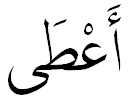
Below are other forms of this verb:

From right to left: aʿṭat (“she gave”), aʿṭayā (“they [two of them] gave”), aʿṭaw (“they [male plural] gave”, aʿṭayna (“they [female plural] gave”).
When I place the different permutations of a word, they are not for memorization, but for exposure to the way the language works. Try to read each word and make sense of it. As you continue doing this throughout this book, the patterns of the language become embedded in your mind so that you get an intuitive sense for how it works.
Notice the way the alif at the end becomes a yāʾ in the word second from the right. That is the reason this type of alif is written to look like a yāʾ.
Below, all four are shown in their present tense:

The hamza at the beginning of the word disappears according to the rules of Arabic grammar. This is something that becomes familiar as you continue your learning.
Moving onto the last part of the verse:

The first word is rabbu-ka (“your Lord”). The second item is a phrase made up of fa (“then”, “and then”) and tarḍā (“you will be satisfied”).
The symbol at the end of the very last word of the verse is there to tell reciters to elongate that final ā sound.
Verse 6

Did He not find you an orphan and then give [you] refuge?
Transliteration: a-lam yajid-ka yatīman fa-āwā
Pronunciation: a-lam ya-jid-ka ya-tī-man fa-ā-wā
A-lam (did not) yajid-ka (He found you) yatīman (an orphan) fa (and then, so) āwā (gave refuge).
The phrase a-lam means “is it not the case that…?”, “is it not true that…?” It is made up of a, which is a hamza used for asking questions, and lam (“did not”, “is not”).
The word yajidka means “he found you”. Therefore the full phrase a-lam yajidka means “Is it not true that He found you…?”, “Did He not find you…” Lam yajidka means “he did not find you”; adding the a to the beginning turns it into a question.
The word yatīm means “orphan” while yatīman means “an orphan”. The last part of the verse is fa (“then”, “and then”) and āwā (“gave refuge”). Below are the two different ways of writing this phrase:

In the Quranic calligraphy the letter fāʾ is joined with the alif and the hamza symbol is placed above the joined area.
Verse 7

And He found you lost and then guided [you]
Transliteration: wa-wajada-ka ḍālan fa-hadā
Pronunciation: wa-wa-ja-da-ka ḍā-lan fa-ha-dā
Wa (and) wajada-ka (He found you) ḍālan (a lost one) fa (and then) hadā (he guided).
The first wāw is an “and”, while the second one is part of the verb wajadaka (“he found you”). The word ḍāl means “lost”, “misguided”. We already saw this word in its plural form: ḍālīn (“misguided ones”).
Verse 8

And He found you poor and made [you] self-sufficient.
Transliteration: wa-wajada-ka ʿāʾilan fa-aghnā
Pronunciation: wa-wa-ja-da-ka ʿā-ʾi-lan fa-agh-nā
Wa (and) wajada-ka (he found you) ʿāʾilan (a poor one, a poor person) fa (and then) aghnā (he made [someone] rich, he made [someone] self-sufficient).
Notice that in the transliteration of ʿāʾilan (“a poor one”) there is a new symbol: ʾ. This stands for a hamza and faces in the opposite direction to the ʿayn symbol. The standard way of writing this word is as follows:

In the Quranic calligraphy the hamza symbol is underneath. The wavy symbol above the second letter of ʿāʾilan merely tells the reciter to elongate that sound. In the Quranic calligraphy it never stands for the hamza–alif combination that is used in standard Arabic writing.
Verse 9

So as for the orphan: then do not oppress [him]
Transliteration: fa-ammā al-yatīma fa-lā taqhar
Pronunciation: fa-am-mal-ya-tī-ma fa-lā taq-har
Fa (so) ammā (as for) al-yatīma (the orphan) fa (then) lā (do not) taqhar (you oppress).
The fa at the beginning is the same as the one from the previous verse, but here it is more correct to translate it as “so”. The word ammā means “as for”.
Verse 10

And as for the asker, so do not repel [him].
Transliteration: wa-ammā al-sāʾila fa-lā tanhar
Pronunciation: wa-am-mal-sā-ʾi-la fa-lā tan-har
Wa (and) ammā (as for) al-sāʾila (the asker) fa (then) lā (do not) tanhar (repel).
The word al-sāʾil means “asker”, both one who asks a question and one who asks for something. Here it is generally considered to refer to one who asks for material assistance.
Verse 11

And of the favor of your Lord, then speak
Transliteration: wa-ammā bi-niʿmati rabbika fa-ḥaddith
Pronunciation: wa-am-mā bi-niʿ-ma-ti rab-bi-ka fa-ḥad-dith
Wa (and) ammā (as for) bi-niʿmati (of the favor) rabbika (your Lord) fa (then) ḥaddith (speak).
The phrase wa-ammā still means “and as for”, but now that there is an “of” right after it, in English it sounds strange to say “And as for of the favor”, therefore in the translation I wrote “And of the favor”. The word niʿma means “favor”, “blessing”, “bounty”, something that is bestowed by someone on someone. Since it ends with a closed tāʾ, we simply say niʿma if we say the word by itself. But in context we read the closed tāʾ, saying niʿmati rabbika. The final phrase is fa-ḥaddith (“then speak!”). The final letter is a thāʾ which is pronounced the same as the “th” in “thing”. In this book I always use th to represent this letter, while using dh to represent the “th” sound in “that”.
The words in the Quranic verse are arranged to create a poetic effect. Below I have rephrased them to make them sound more like ordinary Arabic:

The above says fa-ḥaddith (“then speak”) bi-niʿmati (“of the favor [of]”) rabbik (your Lord).
While there is no “of” in “the favor of your Lord”, the phrase bi-niʿmati rabbik “favor [of] your Lord” tells us there is an “of” there based on the way the vowels are placed.
Lesson 13 Review


Wa-al-ḍuḥā (by the morning brightness).

Wa-al-layli (by the night) idhā (when) sajā (covers with darkness).

Mā (has not) waddaʿaka (abandoned you) rabbuka (your Lord) wa-mā (and has not) qalā (detested).

Wa (and) la (truly) l-ākhiratu (the Hereafter) khayrun ([is] better) laka (for you) mina (than) al-ūlā (the first).

Wa (and) la (truly) sawfa (will) yuʿṭīka (give you) rabbuka (your Lord) fa (then) tarḍā (you will be satisfied).

A-lam (did not) yajid-ka (He found you) yatīman (an orphan) fa (and then, so) āwā (gave refuge).

Wa (and) wajada-ka (he found you) ḍālan (a lost one) fa (and then) hadā (he guided).

Wa (and) wajadaka (he found you) ʿāʾilan (a poor one, a poor person) fa (and then) aghnā (he made [someone] rich, he made [someone] self-sufficient).

Fa (so) ammā (as for) al-yatīma (the orphan) fa (then) lā (do not) taqhar (you oppress).
Fa–ammā (so as for) al-yatīma (the orphan) fa-lā taqhar (then do not oppress).

Wa (and) ammā (as for) al-sāʾila (the asker) fa (then) lā (do not) tanhar (repel).
Wa ammā (and as for) al-sāʾila (the asker) fa-lā tanhar (so do not repel).

Wa (and) ammā (as for) bi-niʿmati (of the favor) rabbika (your Lord) fa (then) ḥaddith (speak).
Lesson 14: al-Sharḥ
We will now move on to chapter 94 of the Quran, known as al-Sharḥ (“the expansion of the chest”, “the opening of the heart”), referring to the feeling of open-heartedness a person feels when they finally accept something and open their heart toward it.

Verse 1

Did we not expand your chest for you?
Transliteration: a-lam nashraḥ la–ka ṣadrak
Pronunciation: a-lam nash-raḥ la-ka ṣad-rak
A-lam (did not) nashraḥ (we expand) la-ka (for you) ṣadrak (your chest).
A-lam means “is it not true that…?” while nashraḥ means “we expand”, “we cause to be open-hearted”. The sīn-like letter with three dots above it is a shīn which makes a “sh” sound as in “should”. I use “sh” to represent it in the transliteration. The full phrase Alam nashraḥ then means “Did we not expand…?”. The word ṣadrak literally means “your chest”, metaphorically referring to a person’s heart.
Verse 2

And we removed from you your burden
Transliteration: wa-waḍaʿ-nā ʿan-ka wizra-k
Pronunciation: wa-wa-ḍaʿ-nā ʿan-ka wiz-rak
Wa (and) waḍaʿ-nā (we removed) ʿan-ka (from you) wizra-k (your burden).
The first phrase is wa-waḍaʿnā (“and we removed”). The verb waḍaʿnā (“we removed”) is the first person plural of waḍaʿa (“he removed”):

The phrase ʿan-ka is made up of ʿan (“from”) and ka (“you”). The phrase wizrak (“your burden”) is made up of the noun wizr (“burden”) and the pronoun ka (“you”).
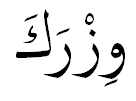
I have written wizrak rather than wizraka in the transliteration because the word is at the end of the verse, meaning that its final vowel is not pronounced. The second letter of wizr is a zāy, which is pronounced like the “z” in “zebra”. It looks like a rāʾ with a dot above it.
Verse 3

The one which weighed upon your back
Transliteration: alladhī anqaḍa ẓahra-k
Pronunciation: al-la-dhī an-qa-ḍa ẓah-rak
Alladhī (which, the one which) anqaḍa (weighed upon) ẓahra-k (your back).
The verb anqaḍa means “it weighed upon”. The phrase ẓahrak means “your back”. The first letter is a ẓāʾ, which is pronounced like a “z” but with the back part of the tongue lifted up. It is presented in the city name Abu Dhabi (the “Dh”).
Verse 4

And we raised for you your repute
Transliteration: wa-rafaʿnā la-ka dhikrak
Pronunciation: wa-ra-faʿ-nā la-ka dhik-rak
Wa (and) rafaʿnā (we raised) la-ka (for you) dhikra-k (your repute).
The verb rafaʿnā is the first person plural of rafaʿa (“he raised”):
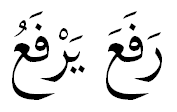
Above, on the right is the past tense rafaʿa (“he raised”), while on the left is the present tense yarfaʿu (“he raises”).
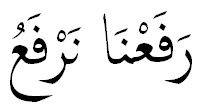
Above is the past and present for the plural form: rafaʿnā (“we raised”) on the right and narfaʿu (“we raise”) on the left.
The phrase dhikrak means “your repute”, “your mention”, “your remembrance”.
Verse 5

Then truly with hardship is relief
Transliteration: fa-inna maʿa al-ʿusri yusrā
Pronunciation: fa-in-na ma-ʿal-ʿus-ri yus-rā
Fa (then) inna (truly is) maʿa (with) al-ʿusri (hardship) yusrā (relief).
The meaning of the verse is that relief always follows after hardship. The word inna is used for emphasis, it means “truly is”. I have written yusrā at the end of the verse even though it has a tanwīn because the tanwīn is not pronounced when it is at the end of a sentence or verse, and instead the alif is pronounced.
As we progress, there will be fewer explanations for each verse since their contents will become familiar.
Make sure to do all of the Training Points, since that is where most of your learning will take place. Do your best to read the Arabic and understand it, using the transliteration above it for help when needed.
Verse 6

Truly with hardship is relief
Transliteration: inna maʿa al-ʿusri yusrā
Pronunciation: in-na ma-ʿal-ʿus-ri yus-rā
Inna (truly is) maʿa (with) al-ʿusri (hardship [is]) yusrā (relief).
The sixth verse is a repetition of the previous verse. The only difference is that this verse does not start with a fa (then).
Verse 7

So when you finish [your work] then devote [yourself to worship]
Transliteration: fa-idhā faraghta fa-inṣab
Pronuncianation: fa-i-dhā fa-ragh-ta fan-ṣab
Fa (then) idhā (when) faraghta (you finish) fa-inṣab (then devote!).
Faraghta means “you finish”, “you become free [from whatever busies you]”.
The command fa-nṣab (“then devote!”) is made up of fa and insab. The hamza at the beginning of insab is silent when there is a vowel before it, which is why we say fa-nṣab.
Verse 8

And to your Lord turn with longing.
Transliteration: wa-ilā rabbi-ka fa-irghab
Pronunciation: wa-ilā rab-bi-ka far-ghab
Wa (and) ilā (toward) rabbi-ka (your Lord) fa (then) irghab (turn with longing).
The word ilā means “to”, “toward”. The word irghab (the hamza at the beginning is silent in context) means “turn [toward something] with desire”, “turn [toward something] with longing”. The past tense is raghiba (“he turned [toward something] with longing”):

On the right is the past tense, while on the left is the present tense yarghabu (“he turns [toward something] with longing”).
Lesson 14 Review


Alam (did not) nashraḥ (we expand) laka (for you) ṣadrak (your chest).

Wa (and) waḍaʿ-nā (we removed) ʿan-ka (from you) wizra-k (your burden).

Alladhī (which, the one which) anqaḍa (weighed upon) ẓahra-k (your back).

Wa (and) rafaʿnā (we raised) la-ka (for you) dhikra-k (your repute).

Fa (then) inna (truly is) maʿa (with) al-ʿusri (hardship) yusrā (relief).

Inna (truly is) maʿa (with) al-ʿusri (hardship [is]) yusrā (relief).

Fa (then) idhā (when) faraghta (you finish) fa-nṣab (then devote!).

Wa (and) ilā (toward) rabbi-ka (your Lord) fa (then) irghab (turn with longing).
Lesson 15: al-ʿAlaq Part 1
We will next move onto chapter 96 of the Quran. This chapter is named al-ʿAlaq (“the Clinging Substance”), which is a reference to a fetus in the womb. This chapter is considered to be the first chapter of the Quran revealed to the Prophet Muhammad (pbuh).

Verse 1

Recite in the name of your Lord who created
Transliteration: iqraʾ bi-smi rabbi-ka alladhī khalaq
Pronunciation: iq-raʾ bis-mi rab-bi-kal-la-dhī kha-laq
Iqraʾ (read) bi (in) smi (name [of]) rabbi-ka (your Lord) alladhī (who) khalaq (He created).
The verb iqraʾ is a command that means “read!” or “recite!” There is a hamza at the end that is always pronounced. You know that because it has the hamza symbol. You do not say iqra, you say iqraʾ with a “throat constriction” at the end.
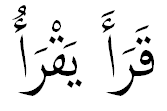
Above on the right is qaraʾa (“he read”) and on the left is yaqraʾu (“he reads”).
The final word is khalaqa (“he created”). Below is its present tense yakhluqu (“he creates”):

The dots of the yāʾ are stylized in a way that makes them appear underneath the khāʾ, which can be confusing to beginners. Below is the same word written to take away the stylization:
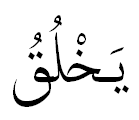
Verse 2

He created the human from a clinging substance
Transliteration: khalaqa al-insāna min ʿalaq
Pronunciation: kha-la-qal-in-sā-na min ʿa-laq
Khalaqa (He created) al-insāna (the human) min (from) ʿalaq (a clinging substance).
While al-insān literally means “the human”, note that here it is used as a generic reference to all humans. It means “humanity”, “mankind”.
Since the tanwīn at the end of ʿalaq is tanwīn al-kasr, it becomes a sukūn when the word is at the end of a verse or sentence, so we say ʿalaq rather than ʿalaqin.
Verse 3

Translation: Read, and your Lord is the Most Generous
Tranlsiteration: iqraʾ wa-rabbu-ka al-akram
Pronunciation: iq-raʾ wa-rab-bu-kal-ak-ram
Iqraʾ (read) wa (and) rabbu-ka (your Lord [is]) al-akram (the Most Generous).
The word akram means “more generous”, “most generous”. From the context we know that “most generous” is meant here.
Verse 4

The One Who taught by the pen
Transliteration: alladhī ʿallama bi-al-qalam
Pronunciation: al-la-dhī ʿal-la-ma bil-qa-lam
Alladhī (the One Who) ʿallama (taught) bi (by) al-qalam (the pen).
The verb ʿallama means “he taught”, “he imparted knowledge”. That shadda is part of the verb. Without the shadda the word would become a completely different word ʿalama which means “he placed a marker on it”. It also means “he dominated [another person] in knowledgeability” (he was more knowledgeable than another person).

And if we turn the fatḥa on the second letter into a kasra, it again becomes a different word that means “he knew”:

The noun al-qalam means “the pen”. It does not refer to a particular pen, it just means pens in general. However, some interpretations of the Quran assume it refers to a particular metaphorical/theological “pen”.
Therefore the vowel and shadda on the second letter of a verb are highly important and determine its meaning.
Verse 5

He taught the human that which he did not know
Transliteration: ʿallama al-insāna mā lam yaʿlam
Pronunciation: ʿal-lamal-in-sā-na mā lam yaʿ-lam
ʿallama (he taught) al-insāna (the human) mā (what, that which) lam (did not) yaʿlam (he knows).
The final word is yaʿlam (“he knows”), which is the present tense form of ʿalima (“he knew”):
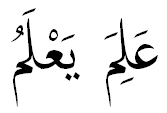
Unlike the first word of the verse, this final word lacks a shadda since it is a different word as mentioned earlier.
While yaʿlam is in the present tense, the lam before it turns its meaning into the past tense, so that the full phrase lam yaʿlam means “he did not know”. If we wanted to say “he does not know” (in the present tense), we would say lā yaʿlam:
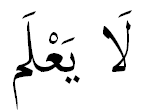
Verse 6

No! But indeed man truly transgresses
Transliteration: kallā inna al-insāna la-yaṭghā
Pronunciation: kal-lā in-nal-in-sā-na la-yaṭ-ghā
Kallā (No! But) inna (indeed) al-insāna (the human) la (truly) yaṭghā (he transgresses).
The word kallā means “No! But…” It is one word and has no English equivalent. The final phrase la-yaṭghā is made up of la (truly) and yaṭghā (“he transgresses”, “he acts despotically”). It is the present tense form of ṭaghā (“he transgressed”, “he acted despotically”):
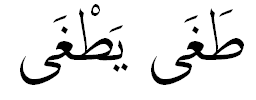
Verse 7

When he sees himself [as] self-sufficient
Transliteration: an raʾā-hu istaghnā
Pronunciation: an ra-ʾā-hus-tagh-nā
An (when) raʾā-hu (sees him) istaghnā (became needless).
The word an (“when”), which lacks a shadda, is different from inna (“indeed”). The verb raʾā-hu means “he saw him”. It is made up of raʾā (“he saw”) and the pronoun hu (“him”). We know from the context that it is referring to the person himself, so it means “he saw himself”. Below are the past and present tense of the verb raʾā written using standard Arabic spelling:
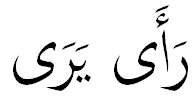
On the right is the verb raʾā (“he saw”) while on the left is yarā (“he sees”).
The verb istaghnā means “he became rich”, “he became needless”, “he became self-sufficient”.
Verse 8

Truly to your Lord is the return
Transliteration: inna ilā rabbi-ka al-rujʿā
Pronunciation: in-na ilā rab-bi-kar-ru-jʿā
Inna (truly) ilā (to) rabbi-ka (your Lord [is]) al-rujʿā (the return).
Al-rujʿā literally means “the return”. It refers to the return of all humans to God.
Verse 9

Have you seen the one who forbids
Transliteration: a-raʾayta alladhī yanhā
Pronunciation: a-ra-ʾay-tal-la-dhī yan-hā
A-raʾayta (have you seen) alladhī (the one who) yanhā (forbids).
The beginning hamza turns the sentence into a question. raʾayta means “you saw”, while a-raʾayta means “did you seen?” Since the rest of the verse is in the present tense, we know that meaning is actually “have you seen?” We already saw the verb raʾayta in its third person singular form raʾā (“he saw”) in verse 7.
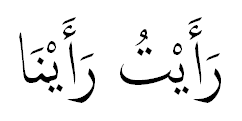
Above are the first person singular and plural of the verb. On the right there is raʾaytu (“I saw”). On the left there is raʾaynā (“we saw”).

Above are the second person forms. From right to left: raʾayta (“you saw” addressed to a male, although it can be used with a female as well), raʾaytī (“you saw” addressed specifically to a female), raʾaytumā (“you saw”, addressed to two males or females), raʾaytum (“you saw”, addressed to three or more males, although it can be used with females), raʾaytunna (“you saw”, addressed specifically to three or more females).

Above are the third person forms. From right to left: raʾā (“he saw”), raʾat (“she saw”), raʾayā (“they saw”, meaning two males or females), raʾaw (“they saw”, meaning a group of males), raʾayna (“they saw”, meaning a group of females).
Back to the Quranic verse, the word yanhā means “he forbids”, “he blocks”. It has no exact English equivalent because it means both to forbid and to take action to enforce it, for example by telling someone not do something and by getting in their way if they try to do it. The past tense form is naḥa (“he forbad”):
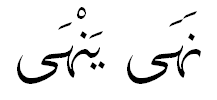
Below are the various permutations of this verb:
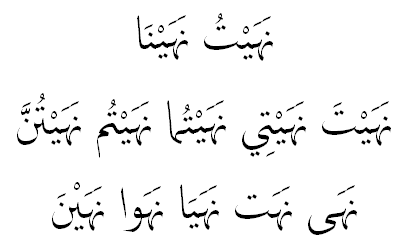
Above, the first line is the first person, second line is the second person, and the third line is the third person.
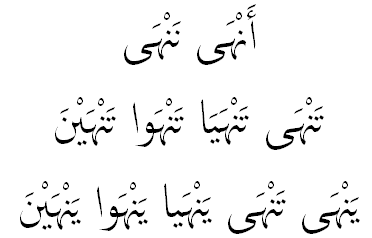
Above, the present tense forms are shown. Note that when it comes to the second person (second line), the first word on the right tanhā (“you forbid”) applies to both males and females, which is why we have four words on the second line, while above in the past tense there are five words on the second line.
Verse 10

Translation: A servant when he prays
Transliteration: ʿabdan idhā ṣallā
Pronunciation: ʿab-dan i-dhā ṣal-lā
ʿabdan (a servant) idhā (when) ṣallā (he prayed).
This verse completes the meaning of the verse before it: “Have you seen the one who forbids a servant when he prays?” The word ʿabd means “slave”, “servant”. Here it is referring to a servant of God, so the intent is anyone who prays. The verb ṣallā means “he prayed”, “he performed worship”. It does not mean prayer that asks for something, but prayer that is made up of praise and remembrance of God. The idhā before it turns this past tense verb into the present tense.
Lesson 15 Review


Iqraʾ (read) bi (in) smi (name [of]) rabbi-ka (your Lord) alladhī (who) khalaq (He created).

Khalaqa (He created) al-insāna (the human) min (from) ʿalaq (a clinging substance).

Iqraʾ (read) wa (and) rabbu-ka (your Lord [is]) al-akram (the Most Generous).

Alladhī (the One Who) ʿallama (taught) bi (by) al-qalam (the pen).

ʿallama (he taught) al-insāna (the human) mā (what, that which) lam (did not) yaʿlam (he knows).

Kallā (No! But) inna (indeed) al-insāna (the human) la (truly) yaṭghā (he transgresses).

An (when) raʾā-hu (sees him) istaghnā (became needless).

Inna (truly) ilā (to) rabbi-ka (your Lord [is]) al-rujʿā (the return).

A-raʾayta (have you seen) alladhī (the one who) yanhā (forbids).

ʿabdan (a servant) idhā (when) ṣallā (he prayed).
Lesson 16: al-ʿAlaq Part 2
Verse 11

Have you seen if he was upon guidance
Transliteration: a-raʾayta in kāna ʿala al-hudā
Pronunciation: a-ra-ʾay-ta in kā-na ʿa-lal-hu-dā
A-raʾayta (Have you seen) in (if) kāna (he was) ʿala (upon) al-hudā (guidance).
This verse is asking the Prophet (pbuh): This man who is forbidding people from praying—have you seen him to be upon right guidance? It is a rhetorical question.
Verse 12

Or if he commanded piety?
Transliteration: aw amara bi-al-taqwā
Pronunciation: aw a-ma-ra bit-taq-wā
Aw (or) amara (he commanded) bi (with/to) al-taqwā (piety, fear of God).
The word aw is Arabic for “or”. The verse continues the question from the previous verse: “Have you seen if he was upon right guidance, or if he commanded piety?” Even though the literal meaning of the verses is in the past tense, we know that it is asking about the present because in verse 9 it used “the one who forbids” rather than “the one who forbad”. For this reason these verses are generally shown in Quran translations in the present tense: “Have you seen if he is upon right guidance, or if he commands piety?”
The phrase amara bi-al-taqwā means “he commanded piety”. The bi means “with”, “to”. It does not seem to have a place in the English, but in the Arabic it is necessary. You can think of the verse as saying “he commanded to piety” which sounds a little strange but not entirely wrong.
Verse 13

Have you seen if he denied and turned away?
Transliteration: a-raʾayta in kadhdhaba wa-tawallā
Pronunciation: a-ra-ʾay-ta in kadh-dha-ba wa-ta-wal-lā
A-raʾayta (have you seen) in (if) kadhdhaba (he denied) wa (and) tawallā (turned away).
The word kadhdhaba means “he denied [the truth of]”, “he considered something to be a lie or considered someone to be a liar”. Without the shadda, the word becomes kadhaba which means “he lied”.
Verse 14

Did he not know that God sees?
Transliteration: a-lam yaʿlam bi-anna Allāha yarā
Pronunciation: a-lam yaʿ-lam bi-an-nal-lā-ha ya-rā
A-lam (did not) yaʿlam (he knows) bi-anna (about the fact that) Allāha (God) yarā (sees).
The phrase yaʿlam bi-anna means “he knows about the fact that…”. The verb yaʿlam means “he knows”, bi here means “about”, and anna means “[the fact] that…” So the verse literally means “Did he not know about the fact that God sees?”, but it can be simplified to “Did he not know that God sees?”
Verse 15

No! But truly if he does not desist, We will surely drag him by the forelock
Transliteration: kallā la-in lam yantahi la-nasfaʿan bi-al-nāṣīya
Pronunciation: kal-lā la-in lam yan-ta-hi la-nas-fa-ʿam bin-nā-ṣī-ya
Kallā (No! But…) la (truly) in (if) lam (does not) yantahi (he desists) la (truly) nasfaʿan (we surely drag him) bi (by/with) al-nāṣīya (the forelock).
The phrase la-in means “truly if”. In standard Arabic writing it looks like this:

The word yantahi (“he desists”, “he stops doing something”) would actually be yantahī in standard Arabic:
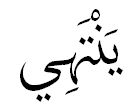
In the Quranic Arabic, the final yāʾ is thrown away. This is just a peculiarity of the Quranic text.
The phrase nasfaʿan (“we will surely drag him”) would be written as follows in standard Arabic:

It is a peculiarity of the Quranic text that it is written with an alif. The verb is nasfaʿ (“we drag”):

But for added emphasis, a nūn added to the end.
The tiny mīm on the ʿayn in the Quranic text indicates to reciters that the nūn should be pronounced as a mīm here:

The nasfaʿan is pronounced nasfaʿam.
Verse 16

A lying, sinning forelock.
Transliteration: nāṣiyatin kādhibatin khāṭiʾa
Pronunciation: nā-ṣi-ya-tin kā-dhi-ba-tin khā-ṭi-ʾa
Nāṣiyatin (a forlock) kādhibatin (a lying [one]) khāṭiʾa (a sinning [one]).
We already saw nāṣiya in the previous verse, which means “forelock” (a lock of hair growing just above the forehead). It can also refer to front part of the head. This verse refers to the person’s forlock as a lying and sinning thing, rather than referring to the person himself. The next two words are adjectives that describe nāṣiya and follow its format. They too are in the feminine form (they end with a closed tāʾ) and they have the tanwīn al-kasr. The word kādhibatin means “a [female] lying person/thing”. It is the feminine form of kādhib (“lying person/thing”, “liar”). The reason it is feminine is because the word it describes, nāṣiya, is a feminine word. in Arabic some words are masculine and some words are feminine. The word for “forlock” happens to be feminine.
The word khāṭiʾa (“an erring one”, “a sinning one”) also describes nāṣiya.
Verse 17

Then let him call his associates
Transliteration: fa-l-yadʿu nādiya-h
Pronunciation: fal-yad-ʿu nā-di-yah
Fa (then) l (let him) yadʿu (he calls) nādiya-h (his associate).
In fa-l-yadʿu (“then let him call”, “so let him call”) the second word is a li which means “let [him/her/it/them]”. Normally this word would have a kasra, as follows, while yadʿu would normally have a wāw at the end so that it would be pronounced yadʿū:

The reason that in the Quranic text the li has a sukūn is that it is preceded by fa. A reciter is supposed to join both sounds and ignore the kasra, saying fal-yadʿu. Since the Quranic text is designed to help reciters, the grammatically correct kasra is omitted from the text. It is also a peculiarity of the Quranic text that the final grammatically correct ū is omitted and turned into a u.
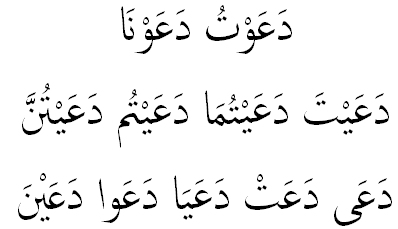
Above are the various past tense forms of this verb:
Top line (from right to left): I called; we called.
Middle line: You (singular male or female) called; you (two) called; you (plural male) called; you (plural female) called.
Bottom line: He called; she called; they (two males or females) called; they (group of males) called; they (group of females) called.
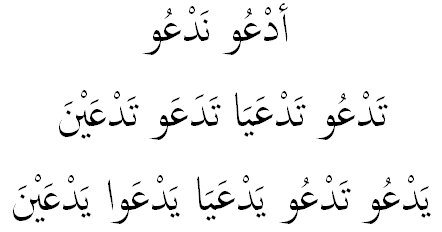
Above are the present tense forms.
Top: I call; we call.
Middle: you (singular male or female) call; you (two) call; you (male group) call; you (female group) call.
Bottom: he calls; she calls; they (two) call; they (male group) call; they (female group) call.
The last phrase of the verse is nādiya-h. Because it is at the end of the verse, we ignore its final vowel. We say nādiya-h rather than nādiya-hu:

The noun is nādī (“a person that one usually calls for help”, “associate”). The h at the end is a pronoun that means “his”. So the full phrase nādiya-h means “his associate”.
Verse 18

We will call the angels of Hell.
Tranliteration: sa-nadʿu al-zabāniya
Pronunciation: sa-nad-ʿuz-za-bā-ni-ya
Sa-nadʿu (We will call) al-zabāniya (the angels of Hell).
This verse says in regards to the man who forbids people from praying; let him call whomever he wishes to support him. We (God) can always call the angels of Hell on him (once he dies). In the Quran sometimes God refers to Himself in the singular and sometimes in the plural. When God uses “We”, He is referring to Himself and His establishment: His angels and other servants.
The word sa turns the verb that comes after it into the future tense. For example aktubu means “I write”:
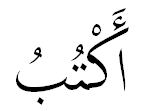
But sa-aktubu means “I will write”:
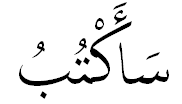
The verb nadʿu again has a non-standard spelling here. It would be written as follows in standard Arabic:

Al-zabāniya is the plural of al-zabān, which literally means “one who thrusts”, “one who shoves”. This word refers to the angels who are in charge of Hell.
Verse 19

No! But do not obey him, and prostrate yourself, and draw near [to God].
Transliteration: kallā lā tuṭiʿ-hu wa-usjud wa-qtarib
Pronunciation: kal-lā lā tu-ṭiʿ-hu was-jud waq-ta-rib
Kallā (No! But…) lā (do not) tuṭiʿ-hu (you obey him) wa-sjud (and prostrate yourself) wa-qtarib (and draw near).
The phrase tuṭiʿ-hu means “you obey him”, while lā tuṭiʿ-hu means “do not obey him”. The verb tuṭiʿ becomes aṭaʿa (“he obeyed”) in the past tense.

The line above wa-usjud tells readers that there is a voluntary prostration (sajda) here. When reaching this point in their reading, Muslims can prostrate themselves as a voluntary (rather than obligatory) act of piety. The phrase wa-usjud is made up of wa (“and”) and usjud (“prostrate yourself!”). Below are three forms of this verb:

From right to left: he prostrated himself; he prostrates himself; prostrate yourself!
The last phrase is also a command: wa-qtarib. The verb is iqtarib (“draw near!”, “come closer!”).

From right to left: he drew near; he draws near; draw near!
The hamza at the beginning of iqtaraba is part of the verb. Without it it becomes a different word:

From right to left: qaraba (“he sheathed a sword”); qarraba (“he brought it near”, “he advanced it”, “he offered a sacrifice”), qariba (“he drew near”), qaruba (“it was near”, “it became near”).
As you can see, the vowel on the second letter is essential in determining the meaning. Among them qariba has the same meaning as iqtaraba, but iqtaraba sounds stronger, more emphatic.
Lesson 16 Review

A-raʾayta (Have you seen) in (if) kāna (he was) ʿala (upon) al-hudā (guidance).

Aw (or) amara (he commanded) bi (with/to) al-taqwā (piety, fear of God).

A-raʾayta (have you seen) in (if) kadhdhaba (he denied) wa (and) tawallā (turned away).

A-lam (did not) yaʿlam (he knows) bi-anna (about the fact that) Allāha (God) yarā (sees).


Nāṣiyatin (a forlock) kādhibatin (a lying [one]) khāṭiʾa (a sinning [one]).

Fa (then) l (let him) yadʿu (he calls) nādiya-h (his associate).

Sa-nadʿu (We will call) al-zabāniya (the angels of Hell).

Kallā (No! But…) lā (do not) tuṭiʿ-hu (you obey him) wa-sjud (and prostrate yourself) wa-qtarib (and draw near).
Lesson 17: al-Layl Part 1
We will move on to chapter 92 of the Quran, al-Layl (“the Night”).

Verse 1

By the night when it covers
Transliteration: wa-al-layli idhā yaghshā
Pronunciation: wal-lay-li i-dhā yagh-shā
Wa (by) al-layli (the night) idhā (when) yaghshā (it covers).
The word layl is Arabic for “night”. The phrase “the night” does not refer to any particular night, it refers to nights in general.
Its plural is layāl (“nights”):

In lesson 14, verse 2 we saw the verb sajā (“it becomes covered with darkness”). In this verse the verb yaghshā is used to mean “it covers”. The word sajā has a connotation of silence, quietness, and darkness, while yaghshā has no such connotations.

Above are three forms of the verb: it covered; it covers; cover [it]!
The purpose of showing these different forms is not that you should memorize them. They are only there for you to try to read and make sense of so that you become familiar with the way the language works.
Verse 2

By the daytime when it radiantly appears
Transliteration: wa-al-nahāri idhā tajallā
Pronunciation: wa-al-nahāri idhā tajallā
Wa (by) al-nahāri (the daytime) idhā (when) tajallā (it radiantly appeared).
The word al-nahār (day, daytime) is the opposite of al-layl (night, nighttime).
The verb tajallā means “it appeared radiantly”, “it appeared and shone brightly”. While it is in the past tense, the idhā before it turns it into the present tense.

Above from right to left: it radiantly appeared; it radiantly appears; appear radiantly!
Verse 3

And that which created the male and the female
Transliteration: wa-mā khalaqa al-dhakara wa-al-unthā
Pronunciation: wa-mā kha-la-qa al-dha-ka-ra wal-un-thā
Wa (and) mā (what) khalaqa (he created) al-dhakara (the male) wa (and) al-unthā (the female).
The word mā “that which”, “what”, as in “that is what I wrote”:

The first word above is dhālika (masculine “that”). There is an alif sound after the “dh”, but it does not show up in writing. The word mā can also be used to create a negative, as follows:

Above we have mā katabtu dhālika (“I did not write that”). It depends on the context whether mā means “that which” or “did not/was not”.
The plural of al-dhakar (“the male”) is al-dhukūr and al-dhukrān (“the males”):

The plural of al-unthā (“the female”) is al-ināth (“the females”):

Verse 4

Indeed your efforts are truly diverse
Transliteration: inna saʿya-kum la-shattā
Pronunciation: in-na saʿ-ya-kum la-shat-tā
Inna (indeed) saʿya-kum (your efforts) la-shattā (truly diverse, truly various).
Saʿya-kum is made up of saʿī (“effort”, “efforts”) and the pronoun kum (plural “your”). While saʿī is singular, it is often used, as in here, to mean a bundle of efforts, so it is correct to translate it both as “effort” and “efforts”.
The word shattā (“diverse things”, “various things”) is the plural of shatīt (“differing”, “varying”, “scattered”). The word shatīt is rarely used, the plural shattā is the commonly used word to mean “diverse”, “various”.
Verse 5

So as for he who gives and fears [God]
Transliteration: Fa-ammā man aʿṭā wa-ittaqā
Pronunciation: Fa-am-mā man aʿ-ṭā wat-ta-qā
Fa (then) ammā (as for) man (he who) aʿṭā (gives) wa-ittaqā (and fears [God]).
The word man means “he/she who”.

Above is the sentence anā (I [am]) man (he who) kataba (wrote) dhālik (that) (I am he who wrote that). Depending on the context, man can also be used to ask a question:

Above is the sentence man (who) kataba (wrote) dhālik (that) (Who wrote that?)
The verb ittaqā means “he was cautiously mindful [of God]”, it is generally translated shortly as “he feared [God]”. We already saw a word from the same root in Lesson 16: taqwā (“fear of God”).

Below are the different tenses of ittaqā:
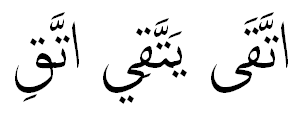
From right to left: he feared [God]; he fears [God]; fear [God]!
Verse 6

And affirms the most beautiful
Transliteration: wa-ṣaddaqa bi-al-ḥusnā
Pronunciation: wa-ṣad-da-qa bil-ḥus-nā
Wa-ṣaddaqa (and affirmed) bi (with/by) al-ḥusnā (the most beautiful).
The verb ṣaddaqa (“he affirmed”, “he considered it to be true”, “he considered him a teller of truth”) is the opposite of kadhdhaba (“he denied”, “he considered it a lie”, “he considered him a liar”).
The word al-ḥusnā (“the most beautiful”) is the feminine form if al-aḥsan (“the more beautiful”, “the most beautiful”). However, the feminine form only means “most”, not “more”. There are different interpretations of what may be meant by al-ḥusnā. Some consider it to refer to the reward of the Hereafter, while others consider it to refer to words that affirm the truth of God’s oneness and other attributes and items of faith.
The bi (“by”, “with”) before al-ḥusnā is necessary in Arabic while in English it has no place.
Verse 7

Then we will ease him toward ease
Transliteration: fa-sa-nuyassiru-hu li-l-yusrā
Pronunciation: fa-sa-nu-yas-si-ru-hu li-l-yus-rā
Fa (then) sa (will) nuyassiru (we make easy) hu (him) li (for) l-yusrā (ease).
The meaning of the verse is that God will facilitate things for such a person toward that which is easiest and most problem-free for them.
The verb nuyassiru means “we make it easy”, “we facilitate”. While nuyassiru-hu literally means “we make him easy”, the meaning is that the way is made easy for him.

Above are the different tenses of nuyassiru when converted to the singular: he made [it] easy; he makes [it] easy; make it easy!
The next word is al-yusrā which comes from the same root as nuyassiru and means “ease”. It is the feminine form of aysar (“easier”, “easiest”). Since it has a li before it, the hamza of the al is removed. The word originally is:
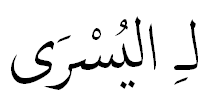
When the li joins it, it becomes:

Verse 8

And as for one who withholds and considers himself needless
Transliteration: wa-ammā man bakhila wa-istaghnā
Pronunciation: wa-am-mā man ba-khi-la was-tagh-nā
Wa-ammā (and as for) man (he who) bakhila (he withheld) wa-istaghnā (and considered himself needless/self-sufficient).
The verb bakhila means “he withheld [his money] in a miserly manner”, “he was ungenerous”.

From right to left: he withheld; he withholds; withhold!
Verse 9

And denied the most beautiful
Translation: wa-kadhdhaba bi-al-ḥusnā
Pronunciation: wa-kadh-dha-ba bil-ḥus-nā
Wa-kadhdhaba (and denied) bi-al-ḥusnā (the most beautiful).
As mentioned in verse 7, kadhdhaba (“he denied”, “he considered him a liar”) is the opposite of ṣaddaqa (“he affirmed”).
Verse 10

Then we will ease him toward difficulty
Transliteration: fa-sa-nuyassiru-hu li-l- ʿusrā
Pronunciation: fa-sa-nu-yas-si-ru-hu lil- ʿus-rā
Fa-sa-nuyassiru-hu (then we will ease him) li (to, toward) l- ʿusrā (difficulty).
The meaning of the verse is that God will arrange matters for such a person so that they easily fall into difficulties, although by “difficulty” the punishment of the Hereafter can also be meant.
The first part of the verse is the same as verse 8. The word al-ʿusrā means “the most difficult”, and more generally means “difficulty”. It is the feminine of aʿsar (“more difficult”, “most difficult”):
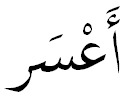
Verse 11

And his wealth avails him not when he falls
Transliteration: wa-mā yughnī ʿan-hu mālu-hu idhā taraddā
Pronunciation: wa-mā yugh-nī ʿan-hu mā-lu-hu idhā ta-rad-dā
Wa-mā (and it does not) yughnī ʿan-hu (avails him) mālu-hu (his wealth, his property) idhā (when) taraddā (he fell [into the Hellfire]).
The verb yughnī means “it makes [him] needless”, “it avails [him]”. The phrase yughnī ʿan-hu means “it avails him”. The phrase ʿan-hu literally means “from him” and is necessary for the Arabic phrasing while in English it has no place.
Lesson 17 Review


Wa (by) al-layli (the night) idhā (when) yaghshā (it covers).

Wa (by) al-nahāri (the daytime) idhā (when) tajallā (it radiantly appeared).

Wa (and) mā (what) khalaqa (he created) al-dhakara (the male) wa (and) al-unthā (the female).

Inna (indeed) saʿya-kum (your efforts) la-shattā (truly diverse, truly various).

Fa (then) ammā (as for) man (he who) aʿṭā (gives) wa-ittaqā (and fears [God]).

Wa-ṣaddaqa (and affirmed) bi (with/by) al-ḥusnā (the most beautiful).

Fa (then) sa (will) nuyassiru (we make easy) hu (him) li (for) l-yusrā (ease).

Wa-ammā (and as for) man (he who) bakhila (he withheld) wa-istaghnā (and considered himself needless/self-sufficient).

Wa-kadhdhaba (and denied) bi-al-ḥusnā (the most beautiful).

Fa-sa-nuyassiru-hu (then we will ease him) li (to, toward) l- ʿusrā (difficulty).

Wa-mā (and it does not) yughnī ʿan-hu (avail him) mālu-hu (his wealth, his property) idhā (when) taraddā (he fell [into the Hellfire]).
Lesson 18: al-Layl Part 2
Verse 12

Indeed, truly upon us is guidance
Transliteration: inna ʿalay-nā la-l-hudā
Pronunciation: in-na ʿa-lay-nā lal-hu-dā
Inna (indeed) ʿalay-nā (upon us) la (truly) l-hudā (guidance).
The phrase ʿalay-nā is made up of ʿalā (“upon”) and the pronoun nā (“us”). The meaning is “it is our duty”. The word ʿalā when combined with a pronoun becomes ʿalay, as follows:
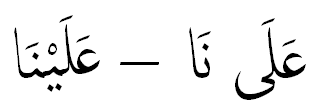
The emphatic la before al-hudā (“truly guidance”) serves to strengthen the original emphatic inna. It English it is strange to say “Indeed, upon us is truly guidance”, the correct meaning is “Indeed, truly upon us is guidance”.
Verse 13

And indeed for us truly is the Hereafter and the first [life]
Transliteration: wa-inna lanā la-l-ākhirata wa-al-ūlā
Pronunciation: wa-in-na la-nā lal-ā-khi-ra-ta wal-ū-lā
Wa-inna (and indeed) la-nā (for us) la-al-ākhirata (truly the Hereafter) wa-al-ūlā (and the first).
The word al-ūlā (“the first one”) is the feminine of al-awwal (“the first one”):
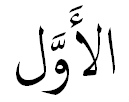
It depends on the context whether one uses the feminine or the masculine form of an adjective.
Verse 14

So I have warned you of a fire that blazes.
Transliteration: fa-andhartukum nāran talaẓẓā
Pronunciation: fa-an-dhar-tu-kum nā-ran ta-laẓ-ẓā
Fa-andhartukum (so I have warned you [of]) nāran (a fire) talaẓẓā (it blazed violently).
The verb andhartu can mean “I warned” and “I warned [him] of [something]” The “of” is part of the meaning of the verb (in Arabic we say the verb takes two objects). Here the first object is kum (“you”) and the second object is nāran (“a fire”), so the full meaning is “I warned you of a fire”. The verb talaẓẓā “it blazes violently” would actually be tatalaẓẓā in standard Arabic. The first tāʾ is removed for poetic effect.
Verse 15

None experiences its heat and burn except the most wretched
Transliteration: lā yaṣlā-hā illā al-ashqā
Pronunciation: lā yaṣ-lā-hā il-lal-ash-qā
Lā (does not) yaṣlā-hā (experiences its heat and burn) illā (except) al-ashqā (the most wretched).
The verb yaṣlā means “experiences the heat and burn [of a fire]”. The word al-ashqā (“the more wretched”, “the most wretched”) is not a feminine superlative like the ones we saw before, so it means “more” or “most” depending on the context.
Verse 16

Who denies and turns away
Translation: alladhī kadhdhaba wa-tawallā
Pronunciation: al-la-dhī kadh-dha-ba wa-ta-wal-lā
Alladhī (who, the one who) kadhdhaba (denied) wa-tawallā (and turned away).
This verse and the two before it are worded as if they are in the past tense but from the context of the chapter we know they are referring to the present.
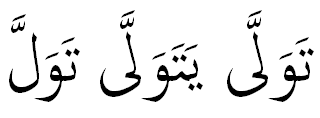
From right to left: he turned away; he turns away; turn away!
Verse 17

And the most pious will be made to avoid it.
Transliteration: wa-sa-yujannabu-hā al-atqā
Pronunciation: wa-sa-yu-jan-na-bu-hal-at-qā
Wa (and) sa (will) yujannabu (will be made to avoid) hā (it) al-atqā (the most pious).

From right to left: he avoided; he avoids; avoid! The verb used in the Quran is none of the above exactly; it is yujannab which means “he is made to avoid it”. It is in the present third person passive voice.
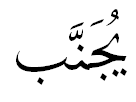
The person is an object who is made to avoid it [by God], and the subject (the doer of the action), who is God, is hidden. The meaning is that while we can work toward avoiding the Hellfire, God’s guidance and help is essential in succeeding.
Al-atqā means “the more pious”, “the most pious”. Here it means “the most pious”. The meaning is not that only the most pious will be made to avoid the Hellfire. “The most pious” is being used to contrast with “the most wretched” from verse 15.
Verse 18

Who gives his wealth to purify himself
Translation: alladhī yuʾtī māla-hū yatazakkā
Pronunciation: al-la-dhī yuʾ-tī mā-la-hū ya-ta-zak-kā
Alladhī (the one who) yuʾtī (gives) māla-hū (his money) yatazakkā (he purifies himself).
The verb yuʾtī means “he gives”:
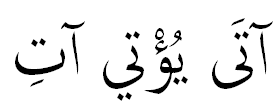
From right to left: he gave; he gives; give!
The verb yuʾtī has a similar meaning to yuʿṭi (“he gives”, “he bestows”):

But yuʿṭi has a connotation of bestowal and favor. The verb yuʾtī (the one in the current verse) merely means “to give”, whether it is to give away money or to hand someone an object in any other context.

From right to left: he purified himself; he purifies himself; purify yourself! The word zakāt, which in Islam refers to the alms tax on wealth, comes from the same root as this word and literally means “purification”.

Verse 19

And there is not for anyone with him a favor to be recompensed
Transliteration: wa-mā li-aḥadin ʿinda-hū min niʿmatin tujzā
Pronunciation: wa-mā li-a-ḥa-din ʿin-da-hū min niʿ-ma-tin tuj-zā
Wa (and) mā (is not) li (for) aḥadin (anyone) ʿinda-hū (with him, by him) min (of) niʿmatin (a favor, a blessing) tujzā (is recompensed).
The meaning of this verse is that this doer of charity does not have any favor that he has to return to someone. He is giving his wealth purely for God’s sake; he is not rewarding anyone for past favors.

From right to left: he recompensed; he recompenses; recompense! The verb used in the Quranic verse is tujzā (“is recompensed”) which is in the passive voice:

Verse 20

Except only to seek the countenance of his Lord, Most High
Transliteration: illā ibtighāʾa wajhi rabbi-hi al-aʿlā
Pronunciation: il-lab-ti-ghā-ʾa waj-hi rab-bi-hil-aʿ-lā
Illā (except, only) ibtighāʾa (to seek) wajhi (face [of], countenance [of]) rabbi-hi (his Lord) al-aʿlā (the highest).
Ibtighāʾ means “to seek”, from the verb ibtaghā (“he sought”):

From right to left: he sought; he seeks; seek!
Verse 21

And he truly will be satisfied
Transliteration: wa-la-sawfa yarḍā
Pronunciation: wa-la-saw-fa yar-ḍā
Wa (and) la (truly) sawfa (will) yarḍā (he is satisfied)
The word sawfa (“will”) is like sa, it turns the verb that comes after it into the future tense.
Lesson 18 Review

Inna (indeed) ʿalay-nā (upon us) la (truly) l-hudā (guidance).

Wa-inna (and indeed) la-nā (for us) la-al-ākhirata (truly the Hereafter) wa-al-ūlā (and the first).

Fa-andhartukum (so I have warned you [of]) nāran (a fire) talaẓẓā (it blazed violently).

Lā (does not) yaṣlā-hā (experiences its heat and burn) illā (except) al-ashqā (the most wretched).

Alladhī (who, the one who) kadhdhaba (denied) wa-tawallā (and turned away).

Wa (and) sa (will) yujannabu (will be made to avoid) hā (it) al-atqā (the most pious).

Alladhī (the one who) yuʾtī (gives) māla-hū (his money) yatazakkā (he purifies himself).

Wa (and) mā (is not) li (for) aḥadin (anyone) ʿinda-hū (with him, by him) min (of) niʿmatin (a favor, a blessing) tujzā (is recompensed).

Illā (except, only) ibtighāʾa (to seek) wajhi (face [of], countenance [of]) rabbi-hi (his Lord) al-aʿlā (the highest).

Wa (and) la (truly) sawfa (will) yarḍā (he is satisfied)
Wa (and) la (truly) sawfa yarḍā (he will be satisfied)
Lesson 19: al-Fajr Part 1
In this lesson we will move to chapter 89 of the Quran; al-Fajr (the Dawn).

Verse 1

By the dawn
Transliteration: wa-al-fajr
Pronunciation: wal-fajr
Verse 2

And by ten nights
Transliteration: wa-layālin ʿashr
Pronunciation: wa-la-yā-lin ʿashr
Wa (by) layālin (nights) ʿashr (ten).
The ten nights referred to here are the first ten nights of the Islamic month of Dhul Ḥijja according Quran exegetes.
Verse 3

By the even and the odd
Transliteration: wa-al-shafʿi wa-al-watr
Pronunciation: wash-shaf-ʿi wal-watr
Wa (by) al-shafʿi (the even) wa-al-watr (and the odd).
The even and odd could refer to numbers. They can also be references to pairs and individuals. According to some al-shafi (“even”) refers to Adam and Eve while al-watr (“the odd”, “the individual”) refers to God.
Verse 4

By the night when it passes
Transliteration: wa-al-layli idhā yasr
Pronunciation: wal-lay-li i-dhā yasr
Wa (by) al-layli (the night) idhā (when) yasr (it passes).
The verb yasri is yasrī in standard Arabic:

From right to left: he passed; he passes; pass!
Verse 5

Is there in that an oath for one who posses perception?
Transliteration: hal fī dhālika qasamun li-dhī ḥijr
Pronunciation: hal fī dhā-li-ka qa-sa-mun li-dhī ḥijr
Hal (is there) fī (in) dhālika (that) qasamun (an oath) li (for) dhī (possessor of) ḥijr (perception, rationality).
The hal at the beginning turns the sentence into a question. The phrase dhī ḥijr means “possessor of perception”, “possessor of rationality”. The word dhī is used to express possession.
Verse 6

Have you not seen how your Lord dealt with ʿĀd?
Transliteration: a-lam tara kayfa faʿala rabbuka bi-ʿād
Pronunciation: a-lam ta-ra kay-fa fa-ʿa-la rab-bu-ka bi-ʿād
A-lam (have not) tara (you see) kayfa (how) faʿala (he dealt) rabbuka (your Lord) bi (with) ʿād.
The verb tara (you see) is tarā in standard Arabic with an alif at the end. Faʿala means “he did”, “he performed an action”. The phrase is Faʿala…bi, the meaning is “he dealt with”. ʿĀd is the name of a pre-Islamic civilization that existed in Arabia until it was destroyed by God.
Verse 7

Iram, the possessor pillars
Transliteration: Irama dhati al-ʿimād
Pronunciation: Ira-ma dha-til-ʿi-mād
Irama dhati (possessor of) al-ʿimād (the pillars).
Iram is the name of the main city of ʿĀd. The word dhati, similar to dhu, means “possessor of”. It is the feminine form of dhu.
Verse 8

Which the like of had not been created in the cities
Transliteration: allatī lam yukhlaq mithlu-hā fi-al-bilād
Pronunciation: al-latī lam yukh-laq mith-lu-hā fil-bil-ād
Allatī (which) lam yukhlaq (had not been created) mithlu-hā (its like) fi-al-bilād (in the cities).
The word allatī (“which”) is the feminine of alladhī.
Verse 9

And Thamud, who carved out the rocks in the valley?
Transliteration: wa-thamūda alladhīna jābū al-ṣakhra bi-al-wād
Pronunciation: wa-tha-mū-dal-la-dhī-na jā-būṣ-ṣakh-ra bil-wād
Wa-thamūda (and Thamud) alladhīna (those who) jābū (carved out) al-ṣakhra (the rocks) bi-al-wād (in/at the valley).
Thamud is the name of another pre-Islamic Arabian civilization destroyed by God. Al-ṣakhr (“the rocks”) is the plural of al-ṣakhra (“the rock”).
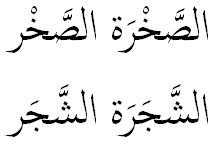
Above, the first line shows al-ṣakhra (“the rock”) on the right and its plural on the left. On the second line there is another word whose plural follows the same pattern. On the right is al-shajara (“the tree”), on the left is al-shajar (“the trees”).
The word wād has a yāʾ at the end which is thrown away in the Quranic text:

Verse 10

And Pharaoh, possessor of the stakes
Transliteration: wa-firʿawna dhī al-awtād
Pronunciation: wa-fir-ʿaw-na dhīl-aw-tād
Wa-firʿawna (and Pharaoh) dhī (possessor of) al-awtād (the stakes).
Firʿawn is Arabic for Pharaoh, the title of the rulers of ancient Egypt. The word dhī (“possessor of”) is the same as dhū. The word changes based on context. The word al-awtād (“the stakes”) is the plural of al-watad (“the stake”).

It may refer to largeness of Pharaoh’s army, which had to use a large number of stakes for its camping tents. It may also refer to a form of punishment by stakes (impalement) practiced by Pharaoh.
Verse 11

Those who oppressed in the cities
Transliteration: alladhīna ṭaghaw fī al-bilād
Pronunciation: al-la-dhī-na ṭa-ghaw fīl-bi-lād
Alladhīna (those who) ṭaghaw (oppressed) fī (in) al-bilād (the cities, the land).
The verb ṭaghaw (“they oppressed”, “they acted despotically”) is the plural third person form of ṭaghā:
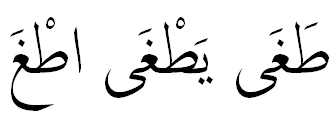
From right to left: he oppressed; he oppresses; oppress!
The word al-bilād is written with an alif in standard Arabic:
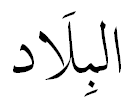
While this word literally means “the cities”, it is also used to mean “the land”. For example the phrase bilād al-shām means “the lands of the Levant”.
Verse 12

So they increased in it corruption
Transliteration: fa-aktharū fī-hā al-fasād
Pronunciation: fa-ak-tha-rū fī-hal-fa-sād
Fa (so) aktharū (they increased) fī-hā (in it) al-fasād (corruption).
The verb aktharū (“they increased [it]”) is the third person plural of akthara (“he increased [it]”).
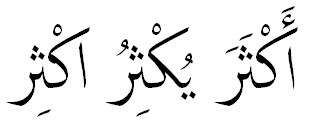
From right to left: he increased [it]; he increases [it]; ikthir (increase [it]!)
Verse 13

So your Lord poured upon them a scourge of punishment.
Transliteration: fa-ṣabba ʿalay-him rabbuka sawṭa ʿadhāb
Pronunciation: fa-ṣab-ba ʿa-lay-him rab-bu-ka saw-ṭa ʿa-dhāb
Fa (so) ṣabba (he poured) ʿalay-him (upon them) rabbuka (your Lord) sawṭa (scourge [of]) ʿadhāb (punishment).

From right to left: he poured; he pours; pour!
The word sawṭ means “scourage” (a whip used for punishment). The word ʿadhāb means “punishment” and “torture”.
Verse 14

Indeed, your Lord truly is [waiting] in ambush
Transliteration: inna rabba-ka la-bi-al-mirṣād
Pronunciation: in-na rab-ba-ka la-bil-mir-ṣād
Inna (indeed) rabbaka (your Lord) la-bi-al-mirṣād (truly waits in ambush).
The word al-mirṣād means “ambush”. When you say he is bi-al-mirṣād it means “he is lying in ambush”, “he is waiting in ambush” (he is waiting and observing from a hidden place in order to attack an enemy when the time is right). The meaning of the verse is that God keeps Himself hidden and observes patiently until the time is right to punish His enemies.
Lesson 19 Review


Wa-al-fajr (by the dawn).

Wa (by) layālin (nights) ʿashr (ten).

Wa (by) al-shafʿi (the even) wa-al-watr (and the odd).

Wa (by) al-layli (the night) idhā (when) yasr (it passes).

Hal (is there) fī (in) dhālika (that) qasamun (an oath) li (for) dhī (possessor of) ḥijr (perception, rationality).

A-lam (have not) tara (you see) kayfa (how) faʿala (he dealt) rabbuka (your Lord) bi (with) ʿād.
A-lam tara (have you not seen) kayfa (how) faʿala rabbuka bi-ʿād (your Lord dealt with ʿĀd).

Irama dhati (possessor of) al-ʿimād (the pillars).

Allatī (which) lam yukhlaq (had not been created) mithlu-hā (its like) fi-al-bilād (in the cities).

Wa-thamūda (and Thamud) alladhīna (those who) jābū (carved out) al-ṣakhra (the rocks) bi-al-wād (in/at the valley).

Wa-firʿawna (and Pharaoh) dhī (possessor of) al-awtād (the stakes).

Alladhīna (those who) ṭaghaw (oppressed) fī (in) al-bilād (the cities, the land).

Fa (so) aktharū (they increased) fī-hā (in it) al-fasād (corruption).

Fa (so) ṣabba (he poured) ʿalay-him (upon them) rabbuka (your Lord) sawṭa (scourge [of]) ʿadhāb (punishment).

Inna (indeed) rabbaka (your Lord) la-bi-al-mirṣād (truly waits in ambush).
Lesson 20: al-Fajr Part 1
Verse 15, part 1
The next verse is long, so we will discuss it in multiple parts.

So as for the human, when His Lord tests him
Transliteration: fa-ammā al-insānu idhā mā ibtalā-hu rabbu-hu
Pronunciation: fa-am-mal-in-sā-nu i-dhā mab-ta-lā-hu rab-bu-hu
Fa-ammā (so as for) al-insānu (the human) idhā mā (when) ibtalā-hu (he tested him) rabbu-hu (his Lord).
The phrase ibtalāhu (“he tested him”) uses a non-standard spelling in the Quranic text. In standard Arabic it would be:

This word has connotations of trials and hardship. It does not mean a simple test, but a test that causes the person difficulty in order to bring out their true character and test their faith. Below are the different permutations of this word:

From right to left: ibtalā (he tested); yabtalī (he tests); ibtali test! (a command); ibtilāʾ (test [this is a noun that means “test”]); mubtall (tester [a person who tests someone]); mubtalā (tested [person] [a person who is tested]).
The word idhā means “when”. Idhā mā means the same, it is just more emphatic.
Verse 15, part 2

So He honored him with generosity and bestowed favors upon him
Transliteration: fa-akrama-hu wa-naʿʿama-hu
Pronunciation: fa-ak-ra-ma-hu wa-naʿ-ʿa-ma-hu
Fa (so) akrama-hu (he honored him) wa-naʿʿama-hu (and bestowed favors upon him).
The verb akrama means “he treated [him] with graciousness and generosity”, “he honored [him]”.

From right to left: he honored; he honors; honor!; to honor [someone]; one who honors; one who is honored [by someone].
The verb naʿʿama means “he bestowed favors and blessings upon [him]”. We already saw the noun niʿma which comes from the same root and means “favor”, “blessing”.

Below are the different permutations of naʿʿama:
نَعَّمَ يُنَعِّمُ نَعِّم تَنَعُّم مُنَعِّم مُنَعَّم
From right to left: he bestowed a favor upon; he bestows a favor upon; bestow a favor upon!; to bestow a favor upon; bestower of favor; one who has been bestowed a favor upon.
Verse 15, part 3

Then he says, “My Lord has honored me.”
Transliteration: fa-yaqūlu rabb-ī akrama-n
Pronunciation: fa-ya-qū-lu rab-bī ak-ra-man
Fa (so) yaqūlu (he says) rabb-ī (my Lord) akraman (honored me).

From right to left: he said; he says; say!; [a] saying; sayer (one who says something); said thing (a thing that was said).
The word akrama-n (he honored me) would be akrama-nī in standard Arabic:

Verse 16, part 1

And as for when He tests him so he restricts upon him his provision
Transliteration: wa-ammā idhā mā ibtalā-hu fa-qadara ʿalay-hi rizqa-hu
Pronunciation: wa-am-mā idhā mab-ta-lā-hu fa-qa-da-ra ʿa-lay-hi riz-qa-hu
Wa-ammā idhā mā (and as for when) ibtalā-hu (he tested him) fa-qadara (so he restricted) ʿalay-hi (upon him) rizqa-hu (his provision, his livelihood).
The verb qadara means “he measured”, “he rationed”, “he restricted”.

From right to left: he restricted; he restricted; restrict!; restriction; restricter; restricted [thing].
Verse 16, part 2

Then he says, “My Lord has humiliated me.”
Transliteration: fa-yaqūlu rabb-ī ahāna-n
Pronunciation: fa-ya-qū-lu rab-bī ahā-nan
Fa-yaqūlu (then he says) rabb-ī (my Lord) ahāna-n (he humiliated me).
The meaning of this verse with the one before it is that when God favors a human with blessings, the human is happy with God. But when God tests him with hardship, the human becomes disgruntled and unappreciative and forgets the favors God bestowed upon them in the past.
The phrase ahāna-n (“he humiliated me”) would be ahāna-nī in standard Arabic. It is shortened for poetic effect.

Below are the different permutations of the word:

From right to left: he humiliated; he humiliates; humiliate!; (an act of) humiliation; one who humiliates; one who is humiliated.
Verse 17

No! But rather, you do not honor the orphan
Transliteration: kallā bal lā tukrimū-na al-yatīma
Pronunciation: kal-lā bal lā tuk-ri-mū-nal-ya-tī-ma
Kallā (No! But) bal (rather) lā (do not) tukrimū-na (you [plural] honor) al-yatīma (the orphan).
The symbol above the kallā tells reciters that it is permitted for them to pause at that point before going on, but that it is recommended that they do not pause.
Verse 18

And you do not encourage one another upon the feeding of the poor
Transliteration: wa-lā taḥaḍḍ-ūna ʿalā ṭaʿāmi al-miskīn
Pronunciation: wa-lā ta-ḥaḍ-ḍū-na ʿa-lā ṭa-ʿā-mil-mis-kīn
Wa-lā (and do not) taḥaḍḍ-ūna (you [plural] encourage one another) ʿalā (upon) ṭaʿāmi al-miskīn (the food of the poor).
The phrase taḥaḍḍ-ūna (“you [plural] encourage one another”) is the second person present form of taḥaḍḍa (“the [two persons] encouraged one another”). This is a verb that can only be correctly used when referring to two or more persons, so its third person singular actually applies to two people.
The word ṭaʿām means “food”. The phrase ṭaʿāmi al-miskīn literally means “food of the poor”, but from the context we know it is referring to the feeding of the poor.
Verse 19

And you consume inheritance a total devouring
Transliteration: wa-taʾkulū-na al-turātha aklan lammā
Pronunciation: wa-taʾ-ku-lū-nat-tu-rā-tha ak-lan lam-mā
Wa-taʾkulū-na (and you consume) al-turātha (inheritance) aklan (an eating) lammā (total).
The phrase taʾkulūna (“you eat”, “you consume”, “you devour”) is the second person plural if akala (“he ate”, “he consumed”, “he devoured”).

From right to left: he ate; he eats; eat!; [the act of] eating (also used in this verse); eater; eaten [thing]
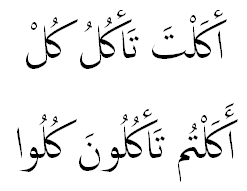
Above are the second-person singular and plural forms. Top from right to left: you ate; you eat; eat!
Bottom from right to left: you [plural] ate; you [plural] eat; eat! (addressed to a group). The one used in the Quranic verse is the one at the middle of the second line.
The noun lamm means the act of gathering together. When used as an adjective, it means “in a complete and total way”.
The wording of the verse “And you consume inheritance a total devouring” may sound strange since it seems to be made up of two disjoined parts: “And you consume inheritance” and “a total devouring”. This is a very common form of expression used in the Quran. The second part as a whole describes the first part; it means “you consume inheritance in the form of a total devouring”. This is a highly poetic form of expression that rarely used in ordinary Arabic.
Verse 20

And you love wealth an immense love
Transliteration: wa-tuḥibbū-na al-māla ḥubban jammā
Pronunciation: wa-tu-ḥib-bū-nal-mā-la ḥub-ban jam-mā
Wa-tuḥibbū-na (and you [plural] love) al-māla (wealth) ḥubban (a love) jammā (immense).
The phrase tuḥibbūna (“you [plural] love”) is the second person plural of ḥabba (“he loved”).

From right to left: he loved; he loves; love [him]! (a command); love (a noun, also used in the verse); one who loves; one who is loved.
The word jamm (“immense”, “vast”) is from jamma ( “it accumulated and increased”).
Verse 21

No! But when the earth has been razed an utter razing
Transliteration: kallā idhā dukka-ti al-arḍu dakkan dakkā
Pronunciation: kal-lā idhā duk-ka-til-ar-ḍu dak-kan dak-kā
Kallā (No! But) idhā (when) dukka-ti (it was razed) al-arḍu (the earth) dakkan dakkā (an utter razing).
The verb dukka means “it was crushed and razed”, “it was violently flattened”. It is the passive third person form of dakka (“he razed”).

From right to left: he razed; he razes; raze [it]!; [an act of] razing; one who razes; razed [thing].
At the end of the verse the noun dakk ([an act of] razing; the fourth word from the right above) is repeated twice for emphasis: dakkan dakkā literally means “a razing and razing”, its normal meaning “utter razing”.
Verse 22

And came your Lord and the angels rank upon rank
Transliteration: wa-jāʾa rabbu-ka wa-al-malaku ṣaffan ṣaffā
Pronunciation: wa-jā-ʾa rab-bu-ka wal-ma-la-ku ṣaf-fan ṣaf-fā
Wa-jāʾa (and came) rabbu-ka (your Lord) wa-al-malaku (and the angels) ṣaffan ṣaffā (rank upon rank).
The verb jāʾa means “it came”. In some contexts a singular verb is applied to a plural group.

This verb can be both non-transitive (as in the verse) and transitive. Non-transitive from right to left: he came; he comes; come!; a coming; comer; [the last word only applies to the transitive]
Transitive from right to left: he brought; he brings; bring!; a bringing; bringer; brought [thing].
The third word from the right is jiʾ (“come!”, “bring!”). Its final letter is a hamza that looks like a yāʾ with a hamza symbol above it. This is not a yāʾ, it just a hamza with no yāʾ before it. In some contexts the hamza is written in this way.
The word al-malak (“the angels”) is the plural of al-malāʾika (“the angel”).
The word ṣaff means “line”, “row”, “rank”, “column” (as in “a column of troops”). The word is duplicated for poetic effect and emphasis, creating the meaning “rank by rank”, “rank upon rank”.
Verse 23, part 1

And on that day Hell will be brought
Transliteration: wa-jīʾa yawmaʾidhin bi-jahannam
Pronunciation: wa-jī-ʾa yaw-ma-ʾi-dhim bi-ja-han-nam
Wa-jīʾa (and was brought) yawmaʾidhin (on the day) bi-jahannam (Hell).
The verb jīʾa (“it was brought”) is the passive form of jaʾa (“he brought”, “he came”). In standard Arabic jīʾa is written as follows:

You just have to ignore the strange way the Quranic word is spelled and read it as if it was just like the above.
The word yawmaʾidhin is one word that means “on that day”. It was originally yawm (“day”) and idh (“when”), but the two were combined to create this new word. This word always has a tanwīn al-kasr at its end:

In the Quranic text there is a small mīm at the end to tell reciters that according to the art of tajwīd this word should be pronounced yawmaʾidhim rather than yawmaʾidhin.
The bi is necessary in the Arabic as a companion for jīʾa to create the meaning of “was brought”. The verb jīʾa does not make sense by itself in Arabic, it has to be jīʾa…bi.
The tiny jīm at the end of the Quranic text is another tajwīd symbol that tells reciters they may pause here.
Verse 23, part 2

On that day the human remembers, but how is remembrance for him?
Transliteration: yawmaʾidhin yatadhakkaru al-insānu wa-annā la-hu al-dhikrā
Pronunciation: yaw-ma-ʾi-dhin ya-ta-dhak–ka-rul-in-sā-nu wa-an-nā la-hudh-dhi-krā
Yawmaʾidhin (on that day) yatadhakkaru (he remembers) al-insānu (the human) wa-annā (and how) la-hu (for him) al-dhikrā (remembrance).
The meaning of the verse is that on that day (the Day of Judgment) a human will remember (that they should have been pious), but what good is remembrance for him?

From right to left: he remembered; he remembers; remember!; [the act of] remembering; one who remembers; that which is remembered.
The word annā means “how…?”, “from where…?”
The word al-dhikrā is from the same root as yatadhakkaru and means “remembrance”, “the act of remembering”. It has the same meaning as tadhakkur (fourth word from the right above) in this verse.
Verse 24

He says “Oh, I wish I had sent ahead [some good] for my life!”
Transliteration: yaqūlu yā-layta-nī qaddam-tu li-ḥayāt-ī
Pronunciation: ya-qū-lu yā-lay-ta-nī qad-dam-tu li-ḥa-yā-tī
Yaqūlu (he says) yā-layta-nī (Oh, I wish…!) qaddam-tu (I advanced) li-ḥayāt-ī (for my life).
Here the person wishes he had “sent ahead” some good deeds for his afterlife. He uses “my life” to refer to the life he has after his resurrection.
The phrase yā-layta is made up of yā, which is a word used for grabbing attention, layta is a special type of word that is used to express a wish. The full phrase yā-layta-nī means “Oh, I wish…!”. The phrase qaddam-tu (“I sent [something] ahead”, “I advanced [something]”) is the first person singular of qaddama (“he sent ahead”).

From right to left: he sent forth; he sends forth; send forth!; to send forth; one who sends forth; that which is sent forth.
Verse 25

So on that day no one is tortured his torture
Transliteration: fa-yawmaʾidhin lā yuʿadhdhabu ʿadhāba-hu aḥad
Pronunciation: fa-yaw-ma-ʾi-dhin lā yu-ʿadh-dha-bu ʿa-dhā-ba-hu a-ḥad
Fa-yawmaʾidhin (so on that day) lā yuʿadhdhabu (is not tortured) ʿadhāba-hu (his torture) aḥad (anyone).
The meaning of the verse is controversial. It may mean that the torture on that day will be something that no human (on earth) has suffered.

From right to left: he tortured; he tortures; torture!; torture; torturer; one who is tortured.
Verse 26

And no one is bound his binding
Transliteration: wa-lā yūthaqu wathāqa-hu aḥad
Pronunciation: wa-lā yū-tha-qu wa-thā-qa-hu a-ḥad
Wa-lā yūthaqu (and is not bound) wathāqa-hu (his binding) aḥad (anyone).

From right to left: he bound (someone with chains); he binds; bind!; to bind; one who binds; one who is bound.
The word wathāq, which comes from the same root as the words above, means “binding”, “chains”, “shackles”.
Verse 27

O soul at ease!
Transliteration: yā-ayyatuhā al-nafsu al-muṭmaʾinna
Pronunciation: yā-ay-yatu-han-naf-sul-muṭ-ma-ʾin-na
Ya-ayyatuhā (O) al-nafsu (the soul) al-muṭmaʾinna (at ease).
The phrase yā-ayyatuhā is used for grabbing attention, it means “O…” It is stronger and more emphatic than merely yā. Al-nafs means different things in different contexts. It can mean “soul”, “self” and “ego”. Al-muṭmaʾinna is a feminine adjective that means “reassured”, “at peace”, “at ease”
Verse 28

Return to your Lord, pleased and pleasing
Transliteration: irjiʿ-ī ilā rabbiki rādhiyatan mardhīya
Pronunciation: ir-ji-ʿī ilā rab-bi-ki rā-dhi-ya-tan mar-dhī-ya
Irjiʿ-ī (return) ilā (to) rabbiki (your Lord) rādhiyatan (pleased) mardhīya (pleasing [to God]).
The verb irjiʿ is the command (amr) form of rajaʿa (“he returned”):

From right to left: he returned; he returns; return!; return; returner; returned [thing].
In verb used in the Quranic text is irjiʿ-ī with the feminine yāʾ pronoun at the end because the speech is directed at a feminine noun (the al-nafs in the previous verse).
In standard Arabic rabbiki would be rabbikī; in the Quranic text the yāʾ is removed for poetic effect:
Verse 29

So enter among my servants
Transliteration: fa-udkhul-ī fī ʿibad-ī
Pronunciation: fad-khu-lī fī ʿi-ba-dī
Fa-udkhul-ī (so enter) fī (in, among) ʿibad-ī (my servants).

Non-transitive from right to left: he entered; he enters; enter!; to enter; one who enters; [n/a]
Transitive from right to left: he put [it] in; he puts [it] in; put [it] in; to put [something] in; one who puts [something] in; [a thing that was] put in.
The word ʿibad (“servants”) is the plural of ʿabd (“servant”) and it would be written as follows in standard Arabic:

Verse 30

And enter my Paradise
Tranlsiteration: wa-udkhul-ī jannat-ī
Pronunciation: wad-khu-lī jan-na-tī
Wa-udkhul-ī (and enter) jannat-ī (my Paradise).
Janna literally means “garden”. It is the word used for Paradise in Islam.
Lesson 20 Review

Fa-ammā (so as for) al-insānu (the human) idhā mā (when) ibtalā-hu (he tested him) rabbu-hu (his Lord).

Fa (so) akrama-hu (he honored him) wa-naʿʿama-hu (and bestowed favors upon him).

Fa (so) yaqūlu (he says) rabb-ī (my Lord) akraman (honored me).

Wa-ammā idhā mā (and as for when) ibtalā-hu (he tested him) fa-qadara (so he restricted) ʿalay-hi (upon him) rizqa-hu (his provision, his livelihood).

Fa-yaqūlu (then he says) rabb-ī (my Lord) ahāna-n (he humiliated me).

Kallā (No! But) bal (rather) lā (do not) tukrimū-na (you [plural] honor) al-yatīma (the orphan).

Wa-lā (and do not) taḥaḍḍ-ūna (you [plural] encourage one another) ʿalā (upon) ṭaʿāmi al-miskīn (the food of the poor).

Wa-taʾkulū-na (and you consume) al-turātha (inheritance) aklan (an eating) lammā (total).

Wa-tuḥibbū-na (and you [plural] love) al-māla (wealth) ḥubban (a love) jammā (immense).

Kallā (No! But) idhā (when) dukka-ti (it was razed) al-arḍu (the earth) dakkan dakkā (an utter razing).

Wa-jāʾa (and came) rabbu-ka (your Lord) wa-al-malaku (and the angels) ṣaffan ṣaffā (rank upon rank).

Wa-jīʾa (and was brought) yawmaʾidhin (on the day) bi-jahannam (Hell).

Yawmaʾidhin (on that day) yatadhakkaru (he remembers) al-insānu (the human) wa-annā (and how) la-hu (for him) al-dhikrā (remembrance).

Yaqūlu (he says) yā-layta-nī (Oh, I wish…!) qaddam-tu (I advanced) li-ḥayāt-ī (for my life).

Fa-yawmaʾidhin (so on that day) lā yuʿadhdhabu (is not tortured) ʿadhāba-hu (his torture) aḥad (anyone).

Wa-lā yūthaqu (and is not bound) wathāqa-hu (his binding) aḥad (anyone).
 .
.
Ya-ayyatuhā (O) al-nafsu (the soul) al-muṭmaʾinna (at ease).
Ya-ayyatuhā (O) al-nafsu al-muṭmaʾinna (soul at ease, at ease soul, i.e. a soul that is at ease).

Irjiʿ-ī (return) ilā (to) rabbiki (your Lord) rādhiyatan (pleased) mardhīya (pleasing [to God]).

Fa-udkhul-ī (so enter) fī (in, among) ʿibad-ī (my servants).

Wa-udkhul-ī (and enter) jannat-ī (my Paradise).
Lesson 21: al-Balad Part 1
In this lesson we will move on to chapter 90 of the Quran, al-Balad (“The Town”).

Verse 1

I swear by this town
Transliteration: lā uqsimu bi-hādhā al-balad
Pronunciation: lā uq-si-mu bi-hā-dhal-ba-lad
Lā uqsimu (I swear) bi-hādhā (by this) al-balad (town).
The town that is sworn by in this verse is considered to be Mecca.
The seemingly negative lā here is used for grabbing attention. While the verse literally seems to say “I do not swear by this town”, the meaning actually is “I swear by this town”. uqsimu is the first person singular of aqsama (“he swore”, “he took an oath”).

From right to left: he swore; he swears; swear!; to swear; one who swears; that which is sworn [by].
The word hādhā is Arabic for “this”. It is written without the first alif in standard Arabic as well.

Verse 2

And you are free of restriction at this town
Transliteration: wa-anta ḥillun bi-hādhā al-balad
Pronunciation: wa-an-ta ḥil-lum bi-hā-dhal-ba-lad
Wa-anta (and you) ḥillun (free of restriction) bi-hādhā (at this) al-balad (town).
The word ḥill means “free of restriction”, “not in a state where things are forbidden from [the person]”. It comes from the same root as the word ḥalāl (“permitted”, a thing that is not forbidden in Islam).
Verse 3

And by a parent and that which it begets
Transliteration: wa-wālidin wa-mā walad
Pronunciation: wa-wā-li-diw wa-mā wa-lad
Wa-wālidin (by a parent) wa-mā (and that which) walad (he/she begot).
The word wālid means “parent”, “begetter”. In modern Arabic it means “father” and its feminine form wālida is used for “mother”. But in Quranic Arabic it can mean either parent.
Walada means “he/she begot”. In modern Arabic it is used to mean “she gave birth”, but in Quranic Arabic it can refer to a man begetting a child or a woman giving birth to a child.

From right to left: he begot; he begets; beget!; to beget; begetter/parent; begotten thing/child/infant.
Verse 4

Truly we have created man in hardship
Transliteration: la-qad khalaqnā al-insāna fī kabad
Pronunciation: la-qad kha-laq-nal-in-sā-na fī ka-bad
La-qad (truly [we] have) khalaqnā (we created) al-insāna (the human) fī kabad (in hardship).
La-qad means “truly [we] have”. The word qad is used to emphasize something that happened in the past. Kabad means “hardship”, “toil”.
Verse 5

Does he think that no one will overpower him?
Transliteration: a-yaḥsabu an lan yaqdira ʿalay-hi aḥad
Pronunciation: a-yaḥ-sa-bu al lan yaq-di-ra ʿa-lay-hi a-ḥad
A-yaḥsabu (does he think) an (that) lan (will not) yaqdira (he is capable/powerful) ʿalay-hi (upon him) aḥad (anyone).
In the pronunciation above I have italicized al to the way the “n” sound becomes a “l” during recitation.
The verb yaḥsabu means “he thought”, “he assumed”.

Above are the different permutations of the verb. I have used commas because the third-person singular present has two equally valid forms (the second and third word from right to left above).
Top from right to left: he thought; he thinks; assume!; to assume; one who assumes; assumed [thing].
Verse 6

He says, “I have consumed an abundant wealth.”
Transliteration: yaqūlu ahlak-tu mālan lubadā
Pronunciation: ya-qū-lu ah-lak-tu mā-lan lu-ba-dā
Yaqūlu (he says) ahlak-tu (I consumed) mālan (a wealth) lubadā (abundant, vast).
Ahlak-tu means “I spent”, “I consumed”, “I caused it to cease existing”.

From right to left: he consumed; he consumes; consume!; to consume; consumer; consumed [thing].
Verse 7

Does he think that no one saw him?
Transliteration: a-yaḥsabu an lam yara-hu aḥad
Pronunciation: a-yaḥ-sa-bu an lam ya-ra-hu a-ḥad
A-yaḥsabu (does he think, does he assume) an (that) lam (did not) yara-hu (he sees him) aḥad (anyone).
The phrase yara-hu would be yarā-hu in standard Arabic:


From right to left: he saw; he sees; see!; to see; one who sees; seen [thing].
Verse 8

Did we not make for him two eyes?
Transliteration: a-lam najʿal la-hu ʿaynayn
Pronunciation: a-lam naj-ʿal la-hu ʿay-nayn
A-lam (did not) najʿal (we create) la-hu (for him) ʿaynayn (two eyes).
The verb najʿal is the first person plural of jaʿala (“he created”, “he made”, “he assigned”).

From right to left: he made; he makes; make!; to make; maker; made [thing].
The word ʿaynayn is the dual of ʿayn (“eye”).

Above, the first word on the right is ʿayn (“eye”). The next towards are its duals (“two eyes”), it depends on the context which one is used. The last two words are the plural “eyes”. Both can be used interchangeably (the context does not decide it).
Verse 9

And a tongue, and two lips?
Transliteration: wa-lisānan wa-shafatayn
Pronunciation: wa-li-sā-nan wa-sha-fa-tayn
Wa-lisānan (and a tongue) wa-shafatayn (and two lips).
The word shafatayn (“two lips”) is the dual of shafa (“lip”).
شَفَة، شَفَتَان وشَفَتَيْن، شَفَهَات وشِفَاه وشَفَايِف
Above on the right is the singular, the next two are duals, and the last three are all plurals.
Verse 10

And we guided him to the two heights/ways
Transliteration: wa-haday-nā-hu al-najdayn
Pronunciation: wa-ha-day-nā-hun-naj-dayn
Wa-haday-nā-hu (and we guided him) al-najdayn (the two heights, the two ways).
The meaning of this verse is controversial. It may refer to God’s guidance of a person to the two ways of good and evil. But the “two heights” can also refer to a woman’s breasts, in which case the verse would be referring to the fact that God gave human infants the instinct to seek the breasts of their mothers.
Al-najdayn is the dual of najd (“height”, “way”). Najd is also the name of the central highland part of Arabia where the city of Riyadh is located.
The verb haday-nā (“we guided”) is the first person plural of hadā (“he guided”).
Lesson 21 Review


Lā uqsimu (I swear) bi-hādhā (by this) al-balad (town).

Wa-anta (and you) ḥillun (free of restriction) bi-hādhā (at this) al-balad (town).
Wa-anta ḥillun (and you are free of restriction) bi-hādhā (at this) al-balad (town).

Wa-wālidin (by a parent) wa-mā (and that which) walad (he/she begot).

La-qad (truly [we] have) khalaqnā (we created) al-insāna (the human) fī kabad (in hardship).

A-yaḥsabu (does he think) an (that) lan (will not) yaqdira (he is capable/powerful) ʿalay-hi (upon him) aḥad (anyone).

Yaqūlu (he says) ahlak-tu (I consumed) mālan (a wealth) lubadā (abundant, vast).

A-yaḥsabu (does he think, does he assume) an (that) lam (did not) yara-hu (he sees him) aḥad (anyone).

A-lam (did not) najʿal (we create) la-hu (for him) ʿaynayn (two eyes).

Wa-lisānan (and a tongue) wa-shafatayn (and two lips).

Wa-haday-nā-hu (and we guided him) al-najdayn (the two heights, the two ways).
Lesson 22: al-Balad Part 2
Verse 11

But he does not break through the difficult pass
Transliteration: fa-lā iqtaḥama al-ʿaqaba
Pronunciation: fa-laq-ta-ḥa-mal-ʿa-qa-ba
Fa-lā (but does not) iqtaḥama (he break through) al-ʿaqaba (the difficult pass).
In this verse “the difficult pass” may refer to the difficult task of overcoming one’s ego and base desires.
While literally fa-lā means “so does not”, what is meant is more correctly “but does not”.

From right to left: he broke through; he breaks through; break through!; to break through; one who breaks through; broken through [thing].
ʿaqaba means “mountain pass”, “stumbling block”, “disadvantage”.
Verse 12

And what can make you know what the difficult pass is?
Transliteration: wa-mā adrā-ka mā al-ʿaqaba
Pronunciation: wa-mā ad-rā-ka mal-ʿa-qa-ba
Wa-mā (and what) adrā-ka (made you know) mā (what) al-ʿaqaba (the difficult pass [is]).
Adrā-ka means “it made you know”, “it made you understand”. The phrase mā adrā-ka means “what makes you know?”, “what is there to make you know?”, “what is there to make you understand?”. It is rhetorical question that implies “you know little about”, “you know nothing about”.

From right to left: he made [him] know; he makes [him] know; make [him] know!; to make [someone] know; one who makes [others] know; one who has been made to know.
Verse 13

The freeing of a slave
Transliteration: fakku raqaba
Pronunciation: fak-ku ra-qa-ba
Fakku (the freeing [of], to free) raqaba (a slave).
This verse and the ones that follow answer the question from the previous verses. The difficult pass is the freeing of a slave and what follows.
The word fakk means “to undo”, “to dissolve [a bond or contract]”, “to free [a prisoner or slave]”.

From right to left: he freed; he frees; free! (the command has to forms); to free; one who frees; freed [person].
The word raqaba literally means “neck”. It is used metaphorically to mean a slave since their neck is held in bond.
Verse 14

Or feeding on a day that possesses severe hunger
Transliteration: aw iṭʿāmun fī yawmin dhī masghaba
Pronunciation: aw iṭ-ʿā-mun fī yaw-min dhī mas-gha-ba
Aw iṭʿāmun (or feeding) fī (on) yawmin (a day) dhī (possessing) masghaba (great hunger).
Iṭʿām means “to feed [someone]”, “feeding [someone]”, from the verb aṭʿama (“he fed [someone]”).

From right to left: he fed [someone or something]; he feeds; feed [him]!; to feed; one who feeds [another person or animal]; one who is fed [by someone].
Verse 15

An orphan possessing nearness [of relationship]
Transliteration: yatīman dhā maqraba
Pronunciation: ya-tī-man dhā maq-ra-ba
Yatīman (an orphan) dhā (possessing) maqraba (nearness).
This verse continues from the previous verse; it is saying that feeding an orphan who is a near relation is one of the actions that define passing the “difficult pass”.
The phrase dhā maqraba literally means “possessing nearness”, meaning an orphan who is also a near relation (a close relative).
Verse 16

Or a needy person possessing great misery
Transliteration: aw miskīnan dhā matraba
Pronunciation: aw mis-kī-nan dhā ma-tra-ba
Aw (or) miskīnan (a needy person) dhā (possessing) matraba (great misery).
The word matraba means “great poverty”, “great misery”, “destitution”.
Verse 17, part 1

Next, he was of those who believed
Transliteration: thumma kāna min alladhīna āmanū
Thumma (then, next) kāna (he was) min (of) alladhīna (those) āmanū (they believed).
The verb āmanū is the third person plural of āmana (“he believed”).

From right to left: he believed; yuʾminu (he believes [the wāw-like letter with the hamza symbol is a mere hamza, there is no wāw there]); believe!; to believe / belief; believer; that which is believed in (or one who is believed in).
Verse 18, part 2

And they encouraged each other to patience and encouraged each other to compassion
Transliteration: wa-tawāṣaw bi-al-ṣabri wa-tawāṣaw bi-al-marḥama
Pronunciation: wa-ta-wā-ṣaw biṣ-ṣab-ri wa-ta-wā-ṣaw bil-mar-ḥa-ma
Wa-tawāṣaw (and they encouraged each other) bi-al-ṣabri (to patience) wa-tawāṣaw (and they encouraged each other) bi-al-marḥama (to compassion).
Verse 18

Those are the companions of the right
Transliteration: ulāʾika aṣḥābu al-maymana
Pronunciation: u-lā-ʾi-ka aṣ-ḥā-bul-may-ma-na
Ulāʾika (those [are]) aṣḥābu (companions [of]) al-maymana (the right).
“Companions of the right” refers to those who will be on the right side on the Day of Judgment and/or who will receive their record of deeds with their right hand. It refers to those who will attain success on the Day of Judgment.
Aṣḥāb (“companion”) is the plural of ṣāḥib (“companion”).
Al-maymana means “the right side”, “the direction of the right”. The more common word for “right” is yamīn.
Verse 19

And those who denied our signs are the companions of left
Transliteration: wa-alladhīna kafarū bi-āyāti-nā hum aṣḥābu al-mashʾama
Pronunciation: wal-la-dhī-na ka-fa-rū bi-ā-yā-ti-nā hum aṣ-ḥā-bul-mash-ʾa-ma
Wa-alladhīna (and those who) kafarū (denied) bi-āyāti-nā (our signs) hum (they are) aṣḥābu (companions [of]) al-mashʾama (the left).
The verb kafarū is the third person plural of kafara (“he denied”). Kafarū bi means “they expressed disbelief about…”

From right to left: he denied; he denies; deny!; denial; denier; denied [thing or person].
The word āyāt (“signs”) is the plural of āya (“sign”). It refers to the signs around us that point to God’s existence and the truth of His scriptures. The word āya is also used to refer to a Quranic verse. Each verse of the Quran is an āya.

The word al-mashʾama (“the left”) is the opposite of al-maymana (“the right”) from the previous verse. The more common word for “left” is yasār.
Verse 20

Upon them is a shut-in fire
Transliteration: ʿalayhim nārun muʾṣada
Pronunciation: ʿa–lay-him nā-run muʾ-ṣa-da
ʿalayhim (upon them [is]) nārun (a fire) muʾṣada (shut-in, enclosed).
Lesson 22 Review

Fa-lā (but does not) iqtaḥama (he break through) al-ʿaqaba (the difficult pass).

Wa-mā (and what) adrā-ka (made you know) mā (what) al-ʿaqaba (the difficult pass [is]).
Wa-mā adrā-ka (what is there to make you know) mā al-ʿaqaba (what the difficult pass [is]).

Fakku (the freeing [of], to free) raqaba (a slave).

Aw iṭʿāmun (or feeding) fī (on) yawmin (a day) dhī (possessing) masghaba (great hunger).

Yatīman (an orphan) dhā (possessing) maqraba (nearness).

Aw (or) miskīnan (a needy person) dhā (possessing) matraba (great misery).

Thumma (then, next) kāna (he was) min (of) alladhīna (those) āmanū (they believed).
Thumma (then, next) kāna (he was) min (of) alladhīna āmanū (those who believed).

Wa-tawāṣaw (and they encouraged each other) bi-al-ṣabri (to patience) wa-tawāṣaw (and they encouraged each other) bi-al-marḥama (to compassion).

Ulāʾika (those [are]) aṣḥābu (companions [of]) al-maymana (the right).

Wa-alladhīna (and those who) kafarū (denied) bi-āyāti-nā (our signs) hum (they are) aṣḥābu (companions [of]) al-mashʾama (the left).

ʿalayhim (upon them [is]) nārun (a fire) muʾṣada (shut-in, enclosed).
Lesson 23: al-Shams
In this lesson we will discuss chapter 91 of the Quran: al-Shams (“The Sun”).

Verse 1

By the sun and her morning brightness
Transliteration: wa-al-shamsi wa-ḍuḥā-hā
Pronunciation: wash-sham-si wa-ḍu-ḥā-hā
Wa-al-shamsi (by the sun) wa-ḍuḥā-hā (and her morning brightness).
The phrase ḍuḥā-hā has the feminine pronoun hā (here it means “its”, “her”) at the end because it is referring to al-shams, which is a feminine word. The feminine pronouns are generally translated as “it” and “its” in English rather than “her”. Both are correct.
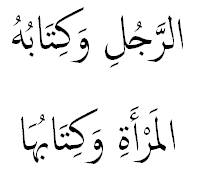
Above, on the first line we have “the man and his book”. On the second line we have “the woman and her book”. Notice the way the ending pronouns change: kitābu-hu becomes kitābu-hā when it is referring to a woman.
Verse 2

And the moon when it follows her
Transliteration: wa-al-qamari idhā talā-hā
Pronunciation: wal-qa-ma-ri i-dhā ta-lā-hā
Wa-al-qamari (and the moon) idhā (when) talā-hā (it followed her).
Above, “her” continues to refer to the sun from the previous verse. The verse means “By the moon when it follows the sun”.

From right to left: he followed; he follows; utlu (“follow!”); tuluww (“to follow”); follower; [that which is] followed.
Verse 3

And the daytime when it clearly displays her
Transliteration: wa-al-nahāri idhā jallā-hā
Pronunciation: wan-na-hā-ri i-dhā jal-lā-hā
Wa-al-nahāri (and the daytime) idhā (when) jallā-hā (it displays her clearly).
The verb jallā means “he made it clear”, “he displayed it with clarity”, “he caused it to be clear”.

From right to left: he displayed it clearly; he displays it clearly; display it clearly!; to display clearly; [one who] displays [something] clearly; [that which is made to be] displayed clearly.
Verse 4

And the night when it covers her
Transliteration: wa-al-layli idhā yaghshā-hā
Pronunciation: wal-lay-li i-dhā yagh-shā-hā
Wa-al-layli (and the night) idhā (when) yaghshā-hā (it covers her).

From right to left: he covered; he covers; ighsha (“cover!”); to cover; coverer; covered [thing].
Verse 5

And the sky and that which built her
Transliteration: wa-al-samāʾi wa-mā banā-hā
Pronunciation: was-sa-mā-ʾi wa-mā ba-nā-hā
Wa-al-samāʾi (and the sky) wa-mā (and that which) banā-hā ([he/it] built it).
Here the ending pronoun in banā-hā (“he built her”) no longer refers to the sun but to the sky mentioned earlier in this verse. Again “her” is used because al-samāʾ (“the sky”) is feminine.

From right to left: he built; he builds; ibni (“build!”); to build (or building, both the physical structure known as a building and the act of building); builder; built [thing].
In the verse, the word mā (“that which”) is used to refer to God who “built” the sky. Instead of mā, man (“he who”) could have been used:

In the Quran, sometimes God is referred to with mā even though normally this word is used to refer to non-living or non-conscious things, as in:

“The book and that which is in it.” Since the things inside a book are not conscious, we use mā (“that which”) to refer to them. But below we have to use man:

“The house and those who are in it.” Since those who are in the house are conscious beings, we have to use man. If we had used mā, it would have referred to the non-conscious things in the house, such as its furniture.
Verse 6

By the earth and that which spread her
Transliteration: wa-al-arḍi wa-mā ṭaḥā-hā
Pronunciation: wal-ar-ḍi wa-mā ṭa-ḥā-hā
Wa-al-arḍi (and the earth) wa-mā (and that which) ṭaḥā-hā ([he/it] spread her).
The phrase ṭaḥā-hā means “he extended her”, “he spread her”, “he threw her”. It refers to God’s creation of the earth.

From right to left: he spread; he spreads; uṭḥu (“spread [it]!”); to spread [it]; spreader; spread [thing].
Verse 7

And a soul and that which proportioned her
Transliteration: wa-nafsin wa-mā sawwā-hā
Pronunciation: wa-naf-sin wa-mā saw-wā-hā
Wa-nafsin (and a soul) wa-mā (and that which) sawwā-hā ([he/it] proportioned her).
The verb sawwā has various meanings; here it means “he balanced it”, “he proportioned it in a balanced way”, “he caused it to be in a way that lacks unevenness and disorder”.

From right to left: he proportioned [it]; he proportions [it]; proportion [it]!; to proportion; proportioner; proportioned [thing].
Verse 8

So he inspired in her her wickedness and righteousness
Transliteration: fa-alhama-ḥā fujūra-hā wa-taqwā-hā
Pronunciation: fa-al-ha-ma-ḥā fu-jū-ra-hā wa-taq-wā-hā
Fa-alhama-ḥā (so he inspired [in] her) fujūra-hā (her wickedness) wa-taqwā-hā (her righteousness).
The meaning of this verse is controversial. It may refer to God inspiring in the soul the ability to discern good and evil. It may also refer to the concept that God increases good souls in righteousness and wicked souls in wickedness. While the soul is free to choose to be righteous or wicked, God inspires it with more righteousness or wickedness based on its choices.

From right to left: he inspires; he inspired; to inspire (or inspiration); inspirer; inspired [thing]. The command form is almost never used therefore it is omitted here.
Verse 9

Truly has succeeded he who purifies her
Transliteration: qad aflaḥa man zakkā-hā
Pronunciation: qad af-la-ḥa man zak-kā-hā
Qad (truly has) aflaḥa (he succeeded) man (he who) zakkā-hā ([he] purified her).
“Her” above continues to refer to the soul.

From right to left: he succeeded; he succeeds; success; successful [person]; one who has been made to attain success.
Verse 10

And truly has lost he who corrupts it
Transliteration: wa-qad khāba man dassā-hā
Pronunciation: wa-qad khā-ba man das-sā-hā
Wa-qad (and truly has) khāba (lost) man (he who) dassā-hā (he hid her).
The verb khāba means “he lost”, “he failed”, “he suffered disappointment”.

From right to left: he lost; he loses; lose!; loss; loser.
The verb dassā literally means “he hid it”. Here it means the person hid his soul’s good qualities through evil deeds.

From right to left: he hid; he hides; hide!; to hide; hider; hidden [thing].
Verse 11

Thamud denied by her transgression
Transliteration: kadhdhaba-t thamūdu bi-ṭaghwā-hā
Pronunciation: kadh-dha-bat tha-mū-du bi-ṭagh-wā-hā
Kadhdhaba-t (she denied) thamūdu (Thamud) bi-ṭaghwā-hā (by her transgression).
The meaning of the verse is that Thamud, by their transgression, denied the truth of their Prophet’s message.
The word ṭaghwā is a rare poetic word that means “transgression”, “despotism”, from ṭaghā (“he acted despotically”).

Verse 12

When her most wretched went forth
Transliteration: idh inbaʿatha ashqā-hā
Pronunciation: i-dhin-ba-ʿa-tha ash-qā-hā
Idh (when) inbaʿatha (he went forth) ashqā-hā (her most wretched).
This verse refers to a person among Thamud who went forth in order to carry out a deed that God had forbidden. The verb inbaʿatha means “he went forth”. It is not inbaʿatha-t because the subject (fāʿil, the doer of the action) is a male, described here ashqā-hā (“her most wretched”). “Her” refers to Thamud.
انْبَعَثَ يَنْبَعِثُ انْبِعَاث مُنْبَعِث
From right to left: he went forth; he goes forth; to go forth, [one who] goes forth.
Verse 13

So the Messenger of God said to them: “The she-camel of God and her water-portion.”
Transliteration: fa-qāla la-hum rasūlu allāhi nāqata allāhi wa-suqyā-hā
Pronunciation: fa-qā-la la-hum ra-sū-lul-lā-hi nā-qa-tal-lā-hi wa-suq-yā-hā
Fa-qāla (so he said) la-hum (to them) rasūlu (messenger [of]) allāhi (God) nāqata (she-camel [of]) allāhi (God) wa-suqyā-hā (and her water-portion).
This verse expresses in a very compressed way the fact that God’s Messenger told Thamud: “This is God’s she-camel and you should not obstruct her water-portion.” They had asked for a miracle and their miracle was that a she-camel appeared to them. They were promised severe punishment if they did anything to obstruct or harm the camel.
The word suqyā means “water-portion”, a specific amount of water assigned to an animal or person. It comes from the verb saqā (“he watered [an animal or person]”, “he provided water”):
سَقَى يَسْقِي اسْقِ سَقْي سَاقٍ مَسْقِيّ
From right to left: he watered; he waters; isqi (“water [it]!”); saqī (“to water”); server of water; watered [person or animal].
Verse 14, part 1

So they denied his truthfulness and they hamstrung her
Transliteration: fa-kadhdhabū-hu fa-ʿaqarū-hā
Pronunciation: fa-kadh-dha-bū-hu fa-ʿa-qa-rū-hā
Fa-kadhdhabū-hu (so they denied his truthfulness, they called him a liar) fa-ʿaqarū-hā (and they hamstrung her, and they hamstrung her).
As has been mentioned kadhdhabū means “they denied the truthfulness of”, “they called him a liar or considered something to be a lie”. The verb ʿaqarū (“they hamstrung”, “they cut the legs”) is the third person plural of ʿaqara.
When we have two fas following each other as above, it is more correct to treat the first one as a “so” or “then” and the second one as an “and”.
Verse 14, part 2

So their Lord brought destruction down upon them for their sin so He levelled her
Transliteration: fa-damdama ʿalay-him rabbu-hum bi-dhanbi-him fa-sawwā-hā
Pronunciation: fa-dam-da-ma ʿa-lay-him rab-bu-hum bi-dhan-bi-him fa-saw-wā-hā
Fa-damdama (so he brought destruction down) ʿalay-him (upon them) rabbu-hum (their Lord) bi-dhanbi-him (by their sin, for their sin) fa-sawwā-hā (so He leveled her, i.e. He leveled Thamud).
Damdama is a rare Arabic word that means “he crushed wrathfully”, “he brought destruction down [upon it]”. We already saw the verb sawwā in verse 7, where it meant “he proportioned [it]”. Here it means “he leveled it”, “he razed it to the ground”.
Verse 15

And He fears not her consequence.
Transliteration: wa-lā yakhāfu ʿuqbā-hā
Pronunciation: wa-lā ya-khā-fu ʿuq-bā-hā
Fa-lā (so does not) yakhāfu (he fears) ʿuqbā-hā (her consequence, literally “what follows her”).
The meaning of the verse is that God does not fear the consequence of “her”. “Her” refers to God’s action of destroying Thamud. So the meaning is that God does not fear the consequence of His destruction of Thamud, since there is no one to take Him to account; He can do whatever He wishes without fearing consequences.
The verb yakhāfu means “he fears”. It is the third person present form of khāfa (“he feared”).

From right to left: he feared; he fears; fear!; fear (two variants); [one who is] afraid.
Lesson 23 Review


Wa-al-shamsi (by the sun) wa-ḍuḥā-hā (and her morning brightness).

Wa-al-qamari (and the moon) idhā (when) talā-hā (it followed her).

Wa-al-nahāri (and the daytime) idhā (when) jallā-hā (it displays her clearly).

Wa-al-layli (and the night) idhā (when) yaghshā-hā (it covers her).

Wa-al-samāʾi (and the sky) wa-mā (and that which) banā-hā ([he/it] built it).

Wa-al-arḍi (and the earth) wa-mā (and that which) ṭaḥā-hā ([he/it] spread her).

Wa-nafsin (and a soul) wa-mā (and that which) sawwā-hā ([he/it] proportioned her).

Fa-alhama-ḥā (so he inspired [in] her) fujūra-hā (her wickedness) wa-taqwā-hā (her righteousness).

Qad (truly has) aflaḥa (he succeeded) man (he who) zakkā-hā ([he] purified her).
Qad aflaḥa (truly he has succeeded) man zakkā-hā (he who purified her).

Wa-qad (and truly has) khāba (lost) man (he who) dassā-hā (he hid her).

Kadhdhaba-t (she denied) thamūdu (Thamud) bi-ṭaghwā-hā (by her transgression).
Kadhdhaba-t thamūdu (Thamud denied) bi-ṭaghwā-hā (by her transgression).

Idh (when) inbaʿatha (he went forth) ashqā-hā (her most wretched).

Fa-qāla (so he said) la-hum (to them) rasūlu (messenger [of]) allāhi (God) nāqata (she-camel [of]) allāhi (God) wa-suqyā-hā (and her water-portion).

Fa-kadhdhabū-hu (so they denied his truthfulness, they called him a liar) fa-ʿaqarū-hā (and they hamstrung her, and they hamstrung her).

Fa-damdama (so he brought destruction down) ʿalay-him (upon them) rabbu-hum (their Lord) bi-dhanbi-him (by their sin, for their sin) fa-sawwā-hā (so He leveled her, i.e. He leveled Thamud).

Fa-lā (so does not) yakhāfu (he fears) ʿuqbā-hā (her consequence, literally “what follows her”).
Lesson 24: al-Aʿlā Part 1
In this lesson we will discuss chapter 87 of the Quran: al-Aʿlā (“The Most High”).

Verse 1

Exalt the name of your Lord the Most High
Transliteration: sabbiḥ isma rabbi-ka al-aʿlā
Pronunciation: sab-biḥ is-ma rab-bi-kal-aʿ-lā
Sabbiḥ (exalt) isma (name [of]) rabbi-ka (your Lord) al-aʿlā (the Most High, the Highest).
The verb sabbiḥ is a command that means “exalt [it]”, “chant it [with exaltation]”.

From right to left: he exalted; he exalts; exalt!; to exalt; exalter.
Verse 2

The One Who created then proportioned
Transliteration: alladhī khalaqa fa-sawwā
Pronunciation: alladhī khalaqa fa-sawwā
Alladhī (the one who) khalaqa (created) fa-sawwā (then proportioned).

From right to left: he created; he creates; ukhluq(“create!”); creation; creator; created [thing].
Verse 3

And the One Who measured then guided
Transliteration: wa-alladhī qaddara fa-hadā
Pronunciation: wal-la-dhī qad-da-ra fa-ha-dā
Wa-alladhī (and the one who) qaddara (measured) fa-hadā (then guided).
Verse 4

And the One Who brought out the pastureland
Transliteration: wa-alladhī akhraja al-marʿā
Pronunciation: wal-la-dhī akh-ra-jal-mar-ʿā
Wa-alladhī (and the one who) akhraja (brought out) al-marʿā (the pasture, the pastureland).
Verse 5

So He makes it black dried and broken herbage
Transliteration: fa-jaʿalahu ghuthāʾan aḥwā
Pronunciation: fa-ja-ʿa-la-hu ghu-thā-ʾan aḥ-wā
Fa-jaʿalahu (then He made it [into]) ghuthāʾan (dried and broken herbage) aḥwā (black).
The word ghuthāʾ means “dried and broken pieces of herbage”. The word aḥwā means “so dark as to be black”.
Verse 6

We will cause you to recite so that you will not forget
Transliteration: sa-nuqriʾu-ka fa-lā tansā
Pronunciation: sa-nuq-ri-ʾu-ka fa-lā tan-sā
Sa-nuqriʾu-ka (we will make you recite”) fa-lā (so do not) tansā (you forget).
Nuqriʾu means “we cause [him] to recite”, “we make [him] recite”, from the verb aqraʾa (“he caused [him] to recite”, rather than qaraʾa (“he recited”).

From right to left: he read or recited; he caused [someone] to read or recite.
The verb tansā is the second person singular of nasiya (“he forgot”):

Verse 7

Except that which God wills; indeed He knows what is declared and what is hidden
Transliteration: illā mā shāʾa allāhu inna-hu yaʿlamu al-jahra wa-mā yakhfā
Pronunciation: il-lā mā shā-ʾal-lā-hu in-na-hu yaʿ-la-mul-jah-ra wa-mā yakh-fā
Illā (except) mā (that which) shāʾa (he wills) allāhu (God) inna-hu (truly He) yaʿlamu (he knows) al-jahra (the declared) wa-mā (and that which) yakhfā (hides [itself], is/stays hidden).
The word al-jahr means “that which is loudly spoken” and “to speak loudly” (in a way that others may be able to hear it). The verb yakhfā means “it hides [itself]”, “it becomes hidden”.
Verse 8

And we ease you toward ease
Transliteration: wa-nuyassiru-ka li-al-yusrā
Pronunciation: wa-nu-yas-si-ru-ka lil-yus-rā
Wa-nuyassiru-ka (and we ease you) li-al-yusrā (to ease, toward ease).
Verse 9

So remind [them], if the reminder benefits
Transliteration: fa-dhakkir in nafaʿati al-dhikrā
Pronunciation: fa-dhak-kir in na-fa-ʿa–tidh-dhik-rā
Fa-dhakkir (so remind!) in (if) nafaʿati (it benefits) al-dhikrā (the reminder, the remembrance).
Verse 10

He who fears [God] will be reminded
Transliteration: sa-yadhdhakkaru man yakhshā
Pronunciation: sa-yadh-dhak-ka-ru man yakh-shā
Sa-yadhdhakkaru (he will remember) man (who) yakhshā (he fears).
In standard Arabic yadhdhakkaru would be yatadhakkaru (“he is reminded [of something]”, “he remembers [something]”):
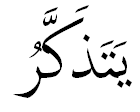
Verse 11

And the most wretched will avoid it
Transliteration: wa-yatajannabu-hā al-ashqā
Pronunciation: wa-ya-ta-jan-na-bu-hal-ash-qā
Wa-yatajannabu-hā (and avoid it) al-ashqā (the most wretched).
The meaning of the verse is that the most wretched will avoid the remembrance of God.
Verse 12

The one who experiences the burn of the greatest fire
Transliteration: alladhī yaṣlā al-nāra al-kubrā
Pronunciation: al-la-dhī yaṣ-lan-nā-ral-kub-rā
Alladhī (the one who) yaṣlā (experiences the burn [of]) al-nāra (the fire) al-kubrā (the greatest).
The word al-kubrā is the feminine of al-kabīr (“greater”, “greatest”). The feminine adjective is used because nār (“fire”) is a feminine word.
Verse 13

Then he does not die in it and he does not live
Transliteration: thumma la yamūtu fī-hā wa-lā yaḥyā
Pronunciation: thum-ma la ya-mū-tu fī-hā wa-lā yaḥ-yā
Thumma (then, next) la (does not) yamūtu (he dies) fī-hā (in it) wa-lā (and does not) yaḥyā (he lives).
Lesson 24 Review


Sabbiḥ (exalt) isma (name [of]) rabbi-ka (your Lord) al-aʿlā (the Most High, the Highest).

Alladhī (the one who) khalaqa (created) fa-sawwā (then proportioned).

Wa-alladhī (and the one who) qaddara (measured) fa-hadā (then guided).

Wa-alladhī (and the one who) akhraja (brought out) al-marʿā (the pasture, the pastureland).

Fa-jaʿalahu (then He made it [into]) ghuthāʾan (dried and broken herbage) aḥwā (black).

Sa-nuqriʾu-ka (we will make you recite”) fa-lā (so do not) tansā (you forget).
Sa-nuqriʾu-ka (we will make you recite”) fa-lā tansā (so you will not forget).

Illā (except) mā (that which) shāʾa (he wills) allāhu (God) inna-hu (truly He) yaʿlamu (he knows) al-jahra (the declared) wa-mā (and that which) yakhfā (hides [itself], is/stays hidden).

Wa-nuyassiru-ka (and we ease you) li-al-yusrā (to ease, toward ease).

Fa-dhakkir (so remind!) in (if) nafaʿati (it benefits) al-dhikrā (the reminder, the remembrance).
Fa-dhakkir (so remind!) in (if) nafaʿati al-dhikrā (the reminder benefits).

Sa-yadhdhakkaru (he will remember) man (who) yakhshā (he fears).
Sa-yadhdhakkaru (he will remember) man yakhshā (he who fears).

Wa-yatajannabu-hā (and avoid it) al-ashqā (the most wretched).

Alladhī (the one who) yaṣlā (experiences the burn [of]) al-nāra (the fire) al-kubrā (the greatest).

Thumma (then, next) la (does not) yamūtu (he dies) fī-hā (in it) wa-lā (and does not) yaḥyā (he lives).
Thumma (then, next) la yamūtu (he does not die) fī-hā (in it) wa-lā yaḥyā (and he does not live).
Lesson 25: al-Aʿlā Part 2
Verse 14

Truly he has succeeded who purifies himself
Transliteration: qad aflaḥa man tazakkā
Pronunciation: qad af-la-ḥa man ta-zak-kā
Qad (truly has) aflaḥa (he succeeded) man (he who) tazakkā (he purified himself).
Verse 15

And remembered the name of his Lord then worshiped
Transliteration: wa-dhakara isma rabbi-hi fa-ṣallā
Pronunciation: wa-dha-ka-ras-ma rab-bi-hi fa-ṣal-lā
Wa-dhakara (and remembered) isma rabbi-hi (the name of his Lord) fa-ṣallā (then worshiped, then performed the formal Islamic prayer).
Verse 16

But rather, you give preference to the life of the world
Transliteration: bal tuʾthirū-na al-ḥayāt al-dunyā
Pronunciation: bal tuʾ-thi-rū-nal-ḥa-yā-tad-dunyā
Bal (but rather) tuʾthirū-na (you [plural] give preference [to]) al-ḥayāt (the life [of]) al-dunyā (this world).
The word bal means “but rather”. The word tuʾthirū-na (“you [plural] give preference [to]”) is the second person plural of āthara (“he gave preference [to]”).

From right to left: he gave preference [to]; he gives preference [to]; to give preference [to]; one who gives preference [to]; [something that is] given preference.
The word al-ḥayāt (“the life”) would be written as follows in standard Arabic:

The word al-dunyā is used in the Quran to refer to the life of this world as opposed to the Hereafter. It is the opposite of al-ākhira (“the Hereafter”), literally “the last one”.
Verse 17

And the Hereafter is better and more enduring
Transliteration: wa-al-ākhiratu khayrun wa-abqā
Pronunciation: wal-ā-khi-ra-tu khay-run wa-ab-qā
Wa-al-ākhiratu (and the Hereafter) khayrun ([is] better) wa-abqā (and more enduring).
The word khayr means “better” when it is used in comparisons. Originally the word was akhyar, but the a was removed by Arabs to shorten it and make it easier to say, which is why this word does not follow the ordinary patterns of Arabic adjectives. The word comes from khāra (“it was good”, “it was superior”). The word abqā (“more enduring”, “most enduring”) is the comparative and superlative form of baqī (“remaining”, “lasting”, “enduring”). The word comes from the verb baqā (“it remained”, “it endured”).

Verse 18

Indeed, this is truly in the first scriptures
Transliteration: inna hādhā la-fī al-ṣuḥufi al-ūlā
Pronunciation: in-na hā-dhā la–fiṣ -ṣu-ḥu-fil-ū-lā
Inna (indeed) hādhā (this) la-fī (truly [is] in) al-ṣuḥufi (the scriptures) al-ūlā (the first).
The word ṣuḥuf (“written pages”, “scriptures”) is the plural of ṣaḥīfa (“written page”), anything that has writing upon it, whether it is paper or some other material.
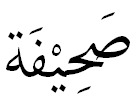
Verse 19

The scriptures of Abraham and Moses
Transliteration: ṣuḥufi ibrāhīma wa-mūsā
Pronunciation: ṣu-ḥu-fi ib-rā-hī-ma wa-mū-sā
Ṣuḥufi (the scriptures [of]) ibrāhīma (Abraham) wa-mūsā (and Moses).
Lesson 25 Review

Qad (truly has) aflaḥa (he succeeded) man (he who) tazakkā (he purified himself).
Qad aflaḥa (truly he has succeeded) man tazakkā (he who purified himself).

Wa-dhakara (and remembered) isma rabbi-hi (the name of his Lord) fa-ṣallā (then worshiped, then performed the formal Islamic prayer).

Bal (but rather) tuʾthirū-na (you [plural] give preference [to]) al-ḥayāt (the life [of]) al-dunyā (this world).

Wa-al-ākhiratu (and the Hereafter) khayrun ([is] better) wa-abqā (and more enduring).

Inna (indeed) hādhā (this) la-fī (truly [is] in) al-ṣuḥufi (the scriptures) al-ūlā (the first).

Ṣuḥufi (the scriptures [of]) ibrāhīma (Abraham) wa-mūsā (and Moses).
Lesson 26: al-Ṭāriq Part 1
This lesson is about chapter 86 of the Quran; al-Ṭāriq (“The Night Comer”).

Verse 1

By the sky and the night comer
Transliteration: wa-al-samāʾi wa-al-ṭāriq
Pronunciation: was-sa-mā-ʾi waṭ-ṭāriq
Wa-al-samāʾi (by the sky) wa-al-ṭāriq (and the night comer).
Al-ṭāriq means “the night comer” and “the knocker”, from the verb ṭaraqa (“[the star] appeared”, “he knocked”).
Verse 2

And what can make you know what the night comer is?
Transliteration: wa-mā adrā-ka mā al-ṭāriq
Pronunciation: wa-mā ad-rā-ka maṭ-ṭā-riq
Wa-mā (and what) adrā-ka (it made you know) mā (what [is]) al-ṭāriq (the night comer).
Verse 3

The piercingly bright star
Transliteration: al-najmu al-thāqib
Pronunciation: an-naj-muth-thā-qib
Al-najmu (the star) al-thāqib (the piercingly bright).
This verse answers the question from the previous verse. The “night comer” is the piercing star.
Al-thāqib literally means “the piercer”, metaphorically meaning extremely bright. It comes from the word thaqaba (“he pierced”, “it shone brightly”).
Verse 4

Truly there is no soul except that upon it is a keeper
Transliteration: in kullu nafsin lammā ʿalayhā ḥāfiẓ
Pronunciation: in kul-lu naf-sin lam-mā ʿa-lay-hā ḥā-fiẓ
In (truly not) kullu (every) nafsin (a soul) lammā (except that) ʿalayhā (upon her [is]) ḥāfiẓ (a keeper).
The first in is for negative emphasis, it means “truly not”. Kullu means “every”, “all of”.
The lammā means “except that”. The word ḥāfiẓ (“keeper”, “protector”) could refer to angels who watch over every human, recording their deeds and protecting them according to God’s wishes.
Verse 5

So let the human look from what he was made
Transliteration: fa-l-yanẓuri al-insānu mi-mma khuliq
Pronunciation: fal-yan-ẓu-ril-in-sā-nu mim-ma khu-liq
Fa (then) l (let) yanẓuri (he looks) al-insānu (the human) mi-mma (from what) khuliq (he was made).
Mi-mma is a shortened form of min mā (“of what”, “from what”).

The word khuliqa (“it was made”) is the passive form of khalaqa (“he created”).
Verse 6

He wade from an ejected fluid
Transliteration: khuliqa min māʾin dāfiq
Pronunciation: khu-li-qa min māʾ-in dā-fiq
Khuliqa (he was created) min (from) māʾin (a fluid) dāfiq (thing that comes out ejectingly).
The word māʾ literally means “water”, but it can also be used to mean “fluid”, “liquid”.
Verse 7

It comes out from between the backbone and the ribs
Transliteration: yakhruju min bayni al-ṣulbi wa-al-tarāʾib
Pronunciation: yakh-ru-ju mim bay-niṣ-ṣul-bi wat-ta-rā-ʾib
Yakhruju (it comes out) min (from) bayni (between) al-ṣulbi (the backbone) wa-al-tarāʾib (and the ribs).
The word al-tarāʾib is the plural of tarība (“rib”):

Verse 8

Truly He is upon returning him truly capable
Transliteration: inna-hū ʿalā rajʿi-hi la-qādir
Pronunciation: in-na-hū ʿa-lā raj-ʿi-hi la-qā-dir
Inna-hū (truly He) ʿalā (upon) rajʿi-hi (his returning, the act of returning him) la-qādir (truly capable).
The meaning of the verse is that God is totally capable of returning the human from the dead.
Verse 9

The day personal secrets will be put on trial
Transliteration: yawma tublā al-sarāʾir
Pronunciation: yaw-ma tub-las-sa-rā-ʾir
Yawma ([the] day) tublā (are put on trial) al-sarāʾir (the personal secret).
The verb tublā (“it is put on trial”) is the third person present passive form of balā (“he put [it] on trial”, “he tested it”).
Al-sarāʾir (“personal secrets”) is the plural of sarīra (“personal secret”), the things a person keeps hidden and private. It comes from the word sirr (“secret”), which comes from the verb sarra (“he kept it secret”).

Verse 10

So there is not for him any power or helper
Transliteration: fa-mā la-hu min quwwatin wa-lā nāṣir
Pronunciation: fa-mā la-hu min quw-wa-tin wa-lā nā-ṣir
Fa-mā (so there is not) la-hu (for him) min ([any]) quwwatin (strength, power) wa-lā (and not) nāṣir (supporter).
The phrase mā…min means “there is not any”, “there is none”.
Lesson 26 Review


Wa-al-samāʾi (by the sky) wa-al-ṭāriq (and the night comer).

Wa-mā (and what) adrā-ka (it made you know) mā (what [is]) al-ṭāriq (the night comer).

Al-najmu (the star) al-thāqib (the piercingly bright).

In (truly not) kullu (every) nafsin (a soul) lammā (except that) ʿalayhā (upon her [is]) ḥāfiẓ (a keeper).
In kullu nafsin (truly there is not any soul) lammā (except that) ʿalayhā ḥāfiẓ (upon her is a keeper).

Fa (then) l (let) yanẓuri (he looks) al-insānu (the human) mi-mma (from what) khuliq (he was made).
Fa–l-yanẓuri (so let him look) al-insānu (the human) mi-mma khuliq (from what he was made).

Khuliqa (he was created) min (from) māʾin (a fluid) dāfiq (thing that comes out ejectingly).
Khuliqa (he was created) min (from) māʾin dāfiq (a fluid that comes out ejectingly).

Yakhruju (it comes out) min (from) bayni (between) al-ṣulbi (the backbone) wa-al-tarāʾib (and the ribs).

Inna-hū (truly He) ʿalā (upon) rajʿi-hi (his returning, the act of returning him) la-qādir (truly capable).

Yawma ([the] day) tublā (are put on trial) al-sarāʾir (the personal secret).

Fa-mā (so there is not) la-hu (for him) min ([any]) quwwatin (strength, power) wa-lā (and not) nāṣir (supporter).
Lesson 27: al-Ṭāriq Part 2
Verse 11

By the sky, [which is the] possessor of rain
Transliteration: wa-al-samāʾi dhāti al-rajʿi
Pronunciation: was-sa-mā-ʾi dhā-tir-raj-ʿi
Wa-al-samāʾi (by the sky) dhāti al-rajʿi (possessor of rain).
The phrase dhāti al-rajʿ literally means “possessor of return”. Metaphorically rajʿ is used to refer to rain, since it comes and goes and repeats.
Verse 12

And the earth, possessor of cracks
Transliteration: wa-al-arḍi dhāti al-ṣadʿi
Pronunciation: wal-ar-ḍi dhā-tiṣ-ṣad-ʿi
Wa-al-arḍi (and the earth) dhāti al-ṣadʿi (possessor of cracks).
Since the previous verse was about rain, this verse is considered to refer to the earth cracking open to let plants out. While al-ṣadʿi (“the crack”) is singular, in the context it is used as a general term, so it is more correct to translate it as “cracks” in English.
Verse 13

Indeed, truly it is a decisive statement
Transliteration: inna-hu la-qawlun faṣl
Pronunciation: in-na-hu la-qaw-lun faṣl
Inna-hu (Indeed, it [is]) la-qawlun faṣl (truly a decisive statement).
The word faṣl means “season”, “decisive moment”, “to fully separate two things”. The phrase qawlun faṣl means “decisive statement”, a statement that puts an end to an argument.
Verse 14

It is not a jest.
Transliteration: wa-mā huwa bi-al-hazl
Pronunciation: wa-mā hu-wa bil-hazl
Wa-mā (and is not) huwa (it) bi-al-hazl (a jest, in jest).
The word hazl means “jest”, “joke”, “something meant for amusement”. The phrase mā huwa bi… is an empathic way of saying “it is not…”
Verse 15

Indeed, they are planning a plan
Transliteration: inna-hum yakīdūna kaydan
Pronunciation: in-na-hum ya-kī-dū-na kay-dan
Inna-hum (indeed they) yakīdūna (plan) kaydan (a plan).
The verb yakīdūna is the plural of yakīdu (“he plans”, “he schemes”), which is the present form of kāda (“he schemed”).

The word kayd comes from the same root and means “plan”, “scheme”.
Verse 16

And I plan a plan
Transliteration: wa-akīdu kaydā
Pronunciation: wa-a-kī-du kay-dā
Wa-akīdu (and I plan) kaydā (a plan).
In this verse God says that He too plans just as His enemies plan.
Verse 17

So give the deniers respite; give them respite in a leisurely manner
Transliteration: fa-mahhil al-kāfirina amhil-hum ruwaydā
Pronunciation: fa-mah-hi-lil-kā-fi-ri-na am-hil-hum ru-way-dā
Fa-mahhil (so give respite [to]) al-kāfirina (the deniers) amhil-hum (give them respite) ruwaydā (in a leisurely manner).
The words mahhil and amhil are two command forms from the same root that mean “give respite”. The word ruwaydā means “gently”, “slowly”, “in a leisurely manner”.
Lesson 27 Review

Wa-al-samāʾi (by the sky) dhāti al-rajʿi (possessor of rain).

Wa-al-arḍi (and the earth) dhāti al-ṣadʿi (possessor of cracks).

Inna-hu (Indeed, it [is]) la-qawlun faṣl (truly a decisive statement).

Wa-mā (and is not) huwa (it) bi-al-hazl (a jest, in jest).

Inna-hum (indeed they) yakīdūna (plan) kaydan (a plan).

Wa-akīdu (and I plan) kaydā (a plan).

Fa-mahhil (so give respite [to]) al-kāfirina (the deniers) amhil-hum (give them respite) ruwaydā (in a leisurely manner).
Lesson 28: al-Ḥadīd Part 1
In this lesson we will move on to chapter 57 of the Quran; al-Ḥadīd (“Iron”).

Verse 1, part 1

Everything in the heavens and the earth chants exaltation for God
Transliteration: sabbaḥa lillāhi mā fī al-samāwāti wa-al-arḍ
Pronunciation: sab-baḥa lil-lā-hi mā fis-sa-mā-wā-ti wal-arḍ
Sabbaḥa (it chanted exaltation, it exalted) lillāhi (for God) mā fī (what is in, everything in) al-samāwāti (the heavens) wa-al-arḍ (and the earth).
Notice the “ll” in lillāh (“for God”, “to God”) is pronounced as the “l” in “lamp”. This is the case whenever there is a kasra before llāh. But normally, as we have mentioned, the “ll” in Allāh is pronounced like the “ll” in “call”.
The phrase mā fī means “what is in”, but from the context sometimes “everything in” is a more correct way of translating it.
Al-samāwāt literally means “the skies”, it is the plural of al-samāʾ (“the sky”). But it is used to mean the present universe’s sky and spaces outside of it from the Unseen world, therefore “the heavens” is more fitting.
Verse 1, part 2

And He is the the Mighty, the Wise
Transliteration: wa-huwa al-ʿazīzu al-ḥakīm
Pronunciation: wa-hu-wal-ʿa-zī-zul-ḥa-kīm
Wa-huwa (and he is) al-ʿazīzu (the Mighty) al-ḥakīm (the Wise).
Verse 2, part 1

To Him belongs the dominion of the heavens and the earth
Transliteration: la-hū mulku al-samāwāti wa-al-arḍ
Pronunciation: la-hū mul-kus-sa-mā-wā-ti wal-arḍ
La-hū (for Him [is]) mulku (the dominion [of]) al-samāwāti wa-al-arḍ (the heavens and the earth).
The phrase la-hū means “for him [is]…”, “to him belongs”.
Mulk means “dominion”, “reign”, “supreme rule”.
Verse 2, part 2

He brings to life and causes to die, and He is over all things extremely capable
Transliteration: yuḥyi wa-yumītu wa-huwa ʿalā kulli shayʾin qadīr
Pronunciation: yuḥ-yi wa-yu-mī-tu wa-hu-wa ʿa-lā kul-li shay-ʾin qa-dīr
Yuḥyi (He brings to life) wa-yumītu (and causes to die) wa-huwa (and he [is]) ʿalā (upon) kulli (every) shayʾin (thing) qadīr (extremely capable).
The verb yuḥyī (“he causes to live”, “he brings to life”) is the third person present form of aḥyā (“he brought to life”). In the Quranic text the final yāʾ of yuḥyī has been removed.
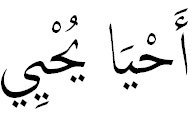
The verb yumīt (“he causes to die”) is the third present form of amāta (“he caused it to die”, “he caused it to stop living”).

The phrase ʿalā kulli shayʾin qadīr (“over all things extremely capable”) means “capable of all things”, “all-powerful”.
Verse 3, part 1

He is the First and the Last, the Apparent and the Hidden
Transliteration: huwa al-awwalu wa-al-ākhiru wa-al-ẓāhiru wa-al-baṭin
Pronunciation: hu-wal-aw-wa-lu wal-ā-khi-ru waẓ-ẓā-hi-ru wal-ba-ṭin
Huwa (He [is]) al-awwalu (the First) wa-al-ākhiru (and the Last) wa-al-ẓāhiru (and the Apparent) wa-al-baṭin (and the Hidden).
Verse 3, part 2

And He is about all things extremely knowing
Transliteration: wa-huwa bi-kulli shayʾin ʿalīm
Pronunciation: wa-hu-wa bi-kul-li shay-ʾin ʿa-līm
Wa-huwa (and He is) bi (of, about) kulli shayʾin (everything) ʿalīm (extremely knowing).
Verse 4, part 1

He is the One Who created the heavens and the earth in six days
Transliteration: huwa alladhī khalaqa al-samāwāti wa-al-arḍa fī sittati ayyām
Pronunciation: hu-wa al-ladhī kha-la-qa al-sa-mā-wā-ti wal-ar-ḍa fī sit-ta-ti ay-yām
Huwa (He [is]) alladhī (the One Who) khalaqa (He created) al-samāwāti wa-al-arḍa (the heavens and the earth) fī (in) sittati (six) ayyām (days).
Verse 4, part 2

Then He established Himself upon the Throne
Transliteration: thumma istawā ʿalā al-ʿarsh
Pronunciation: thum-mas-ta-wā ʿa-lal-ʿarsh
Thumma (then, next) istawā (He balanced Himself, He established Himself) ʿalā (upon) al-ʿarsh (the Throne).
The verb istawā means “he became balanced”, “he straightened up”, “it became established”, “it became equal to”.
اسْتَوَى يَسْتَوِي اسْتَوِ اسْتِوَاء مُسْتَوِ
From right to left: it became established; it becomes established; become established!; to become established; one who is established.
Verse 4, part 3

He knows what penetrates into the earth and what comes out of her.
Transliteration: yaʿlamu mā yaliju fī al-arḍi wa-mā yakhruju min-hā
Pronunciation: yaʿ-la-mu mā ya-li-ju fil-ar-ḍi wa-mā yakh-ru-ju min-hā
Yaʿlamu (He knows”) mā (what) yaliju (penetrates) fī (into) al-arḍi (the earth) wa-mā (and what) yakhruju (comes out) min-hā (from her).
The verb yaliju means “it goes into [something] so that it partly or completely disappears”, “it inserts itself into [something]”, “it penetrates [into]”. The past tense form is walaja (“it entered [into]”).
Verse 4, part 4

And what descends from the heaven and what ascends into her
Transliteration: wa-mā yanzilu min al-samāʾi wa-mā yaʿruju fī-hā
Pronunciation: wa-mā yan-zi-lu mi–nas-sa-mā-ʾi wa-mā yaʿ-ru-ju fī-hā
Wa-mā (and what) yanzilu (descends) min (from) al-samāʾi (the heaven, the sky) wa-mā (and what) yaʿruju (ascends) fī-hā (into her).

From right to left: he descended; he descends; unzul (“descend!”); to descend or descent; descender; [thing that was] made to descend.
Yaʿruju (“it goes up”, “it ascends”) is the present tense form of ʿaraja.
Verse 4, part 5

And He is with you [plural] wherever you [plural] are
Transliteration: wa-huwa maʿa-kum ayna mā kuntu-m
Pronunciation: wa-hu-wa ma-ʿa-kum ay-na mā kun-tum
Wa-huwa (and He [is]) maʿa-kum (with you) ayna mā (wherever) kuntu-m (you were).
The word ayna means “where”, it can be used in questions, as follows:

“Where are you?”
But the phrase ayna mā… means “wherever”.
Verse 4, part 6

And God is of what you [plural] do seeing
Transliteration: wa-allāhu bi-mā taʿmalūna baṣīr
Pronunciation: wal-lā-hu bi-mā taʿ-ma-lū-na ba-ṣīr
Wa-allāhu (and God [is]) bi-mā (of what) taʿmalūna (you do) baṣīr (one who sees, [a] seeing [person]).
The word taʿmalūna (“you do”, “you work”) is the second person plural of taʿmalu (“you [singular] do”, “you work”), which is the present tense form of ʿamila (“he did”, “he worked”).
The word baṣīr means “one who sees”, from the verb baṣura (“he saw”).

From right to left: he saw; he sees; baṣar and baṣāra (“the act of seeing”, “the ability to see”, “eyesight”, “insight”); one who sees.
Lesson 28 Review


Sabbaḥa (it chanted exaltation, it exalted) lillāhi (for God) mā fī (what is in, everything in) al-samāwāti (the heavens) wa-al-arḍ (and the earth).

Wa-huwa (and he is) al-ʿazīzu (the Mighty) al-ḥakīm (the Wise).

La-hū (for Him [is]) mulku (the dominion [of]) al-samāwāti wa-al-arḍ (the heavens and the earth).

Yuḥyi (He brings to life) wa-yumītu (and causes to die) wa-huwa (and he [is]) ʿalā (upon) kulli (every) shayʾin (thing) qadīr (extremely capable).

Huwa (He [is]) al-awwalu (the First) wa-al-ākhiru (and the Last) wa-al-ẓāhiru (and the Apparent) wa-al-baṭin (and the Hidden).

Wa-huwa (and He is) bi (of, about) kulli shayʾin (everything) ʿalīm (extremely knowing).

Huwa (He [is]) alladhī (the One Who) khalaqa (He created) al-samāwāti wa-al-arḍa (the heavens and the earth) fī (in) sittati (six) ayyām (days).

Thumma (then, next) istawā (He balanced Himself, He established Himself) ʿalā (upon) al-ʿarsh (the Throne).

Yaʿlamu (He knows”) mā (what) yaliju (penetrates) fī (into) al-arḍi (the earth) wa-mā (and what) yakhruju (comes out) min-hā (from her).

Wa-mā (and what) yanzilu (descends) min (from) al-samāʾi (the heaven, the sky) wa-mā (and what) yaʿruju (ascends) fī-hā (into her).

Wa-huwa (and He [is]) maʿa-kum (with you) ayna mā (wherever) kuntu-m (you were).
Wa-huwa maʿa-kum (and He is with you) ayna mā kuntu-m (wherever you are).

Wa-allāhu (and God [is]) bi-mā (of what) taʿmalūna (you do) baṣīr (one who sees, [a] seeing [person]).
Lesson 29: al-Ḥadīd Part 2
Verse 5

To Him belongs the dominion of the heavens and the earth, and to God are returned all matters
Transliteration: la-hū mulku al-samāwāti wa-al-arḍi wa-ilā allāhi turjaʿu al-umūr
Pronunciation: la-hū mul-kus-sa-mā-wā-ti wal-ar-ḍi wa-ilal-lā-hi tur-ja-ʿul-u-mūr
La-hū (for Him [is], to Him [belongs]) mulku (the dominion [of]) al-samāwāti wa-al-arḍi (the heavens and the earth) wa-ilā (and to) allāhi (God) turjaʿu (are returned) al-umūr (the matters).
The meaning of the verse is that all matters or affairs are under God’s control. It can also refer to the fact that all human deeds are returned to Him for judgment.
The verb turjaʿu (“is returned”) is the passive form of tarjiʿu (“he returns”). The word umūr ( “commands”, “matters”, “affairs”) is the plural of amr (“command”, “matter”, “affair”).
Verse 6, part 1

He causes the night to penetrate into the daytime and the daytime to penetrate into the night
Transliteration: yūliju al-layla fī al-nahāri wa-yūliju al-nahāra fī al-layl
Pronunciation: yū-li-jul-lay-la fin-na-hā-ri wa-yū-li–jun-na-hā-ra fil-layl
Yūliju (He causes to penetrate) al-layla (the night) fī (into) al-nahāri (the daytime) wa-yūliju (and causes to penetrate) al-nahāra (the daytime) fī (into) al-layl (the night).
The verse refers to the way the night merges into the day and the day merges into the night. yūliju comes from the same root as yaliju (“it penetrates [into]”) in verse 4, part 3. But while the past tense form of yūliju is awlaja (“he caused it to penetrate [int]”, “he inserted it”), the past tense form of yaliju is walaja (“it penetrated into”, “it became inserted”).

Verse 6, part 2

And He is extremely knowing of that which is in the chests
Transliteration: wa-huwa ʿalīmun bi-dhāti al-ṣudūr
Pronunciation: wa-hu-wa ʿa-lī-mum bi-dhā-tiṣ-ṣu-dūr
Wa-huwa (and He [is]) ʿalīmun (extremely knowing) bi-dhāti al-ṣudūr (of that which accompanies the chests, of that which is in the chests).
The word ʿalīm means “extremely knowing”, from the word ʿalima (“he knew”). The form of the word ʿalīm is known as ṣīghat al-mubālagha (“the hyperbolic form”) of ʿālim (“one who knows”). It strengthens its meaning and makes it extreme.
عَالِم عَلِيْم
From right to left: ʿālim (“one who knows”), ʿalīm (“one who knows extremely”, “one who is extremely knowing”).
The phrase dhāti al-ṣudūr is a special expression that means “what is in the chests”, i.e. what is in the hearts. Literally dhāti means “possessor of”, however in certain special expressions it means “companion of”, “associate of”. Here it means “companion of the chests”, “that which is in the chests”, meaning that which accompanies the chests, i.e. the secrets that are in people’s hearts.
Verse 7, part 1

Believe in God and His Messenger
Transliteration: āminū bi-allāhi wa-rasūli-hi
Pronunciation: ā-mi-nū bil-lā-hi wa-ra-sū-li-hi
Āminū (believe!) bi-allāhi (in God) wa-rasūli-hi (and His Messenger).
The verb āminū is a command directed at a group, it means “believe!” Its singular form is āmin (“believe! [directed at one person]”). It comes from the verb āmana (“he believed”).
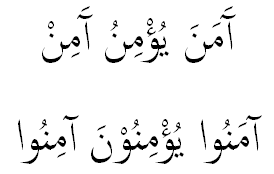
Top from right to left: he believed; he believes; believe!
Bottom from right to left: they believed; they believe; believe! [directed at a group].
The word rasūl means “messenger”, “one who is sent by someone to carry a message”, from the verb arsala (“he sent [a message]”, “he sent [a messenger]”).
Verse 7, part 2

And spend of that which He made you stewards of
Transliteration: wa-anfiqū mi-mmā jaʿala-kum mustakhlafīna fī-h
Pronunciation: wa-an-fi-qū mim-mā ja-ʿa-la-kum mus-takh-la-fī-na fīh
Wa-anfiqū (and spend) mi-mmā (of that which) jaʿala-kum (He made you) mustakhlafīna fī-h (stewards in it / of it).
God here tells humans that they wealth they have is actually God’s wealth that has been entrusted to them. They are its stewards or trustees and they should spend it in God’s way.
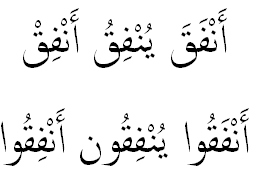
Top from right to left: he spent; he spends; spend!
Bottom from right to left: they spent; they spend; spend! [directed at a group]
The word mustakhlafīn is the plural of mustakhlaf (“one who has been made a successor”, “steward”, “trustee”), from the verb istakhlafa (“he made him a steward/successor/trustee”).
Verse 7, part 3

Because those who believed among you and spent for them is a great reward
Transliteration: fa-alladhīna āmanū min-kum wa-anfaqū la-hum ajrun kabīr
Pronunciation: fal-la-dhī-na ā-ma-nū min-kum wa-an-fa-qū la-hum aj-run ka-bīr
Fa-alladhīna (because those who) āmanū (believed) min-kum (of you, among you) wa-anfaqū (and spent) la-hum (for them) ajrun (a reward) kabīr (great).
While fa usually means “then”, “so”, here it more correctly means “because” since it is starting the conclusion to the statement that came before it.
Verse 8, part 1

What is with you [plural] that you do not believe in God while the Messenger invites you to believe in your Lord?
Transliteration: wa-mā la-kum la tuʾminūna bi-allahi wa-al-rasūlu yadʿū-kum li-tuʾminū bi-rabbi-kum
Pronunciation: wa-mā la-kum la tuʾ-mi-nū-na bil-la-hi war-ra-sū-lu yad-ʿū-kum li-tuʾ-mi-nū bi-rab-bi-kum
Wa-mā la-kum (and what is [going on] with you) la tuʾminūna (you do not believe) bi-allahi (in God) wa-al-rasūlu yadʿū-kum (while the Messenger invites you) li-tuʾminū bi-rabbi-kum (to believe in your Lord).
The phrase mā la-kum means “what is [going on] with you?”, “what is up with you?”, “what is wrong with you?”
The tiny lā symbol above bi-allahi tells reciters not to stop at that point because stopping would change the meaning of the verse.
The wa in wa-al-rasūlu means “while”. It is known as a wāw al-ḥāl and is different from the first wa in the verse (which is what we commonly see) which is known as a wāw al-ʿaṭf. The context determines which wāw it is. The wāw al-ḥāl is rare, so it is usually safe to assume a wāw is wāw al-ʿaṭf (“and”).
Verse 8, part 2

And truly He has taken your covenant if you are truly believers
Transliteration: wa-qad akhadha mīthāqa-kum in kun-tum muʾminīn
Pronunciation: wa-qad a-kha-dha mī-thā-qa-kum in kun-tum muʾ-mi-nīn
Wa-qad (and truly has) akhadha (He took) mīthāqa-kum (your covenant) in kun-tum (if truly you were) muʾminīn (believers).
Verse 9, part 1

He is the One Who sends down upon His servant clear verses
Transliteration: huwa alladhī yunazzilu ʿalā ʿabdi-hi āyatin bayyināt
Pronunciation: hu-wa al-la-dhī yu-naz-zi-lu ʿa-lā ʿab-di-hi ā-ya–tim bay-yi-nāt
Huwa (He [is]) alladhī (the One Who) yunazzilu (sends down) ʿalā (upon) ʿabdi-hi (His servant) āyatin (verses) bayyināt (clear ones).
The word bayyināt is the plural of bayyina, which means “clear evidence”, “evident”.

Verse 9, part 2

To take you out of the darknesses into the light
Transliteration: li-yukhrija-kum mina al-ẓulumāti ilā al-nūr
Pronunciation: li-yukh-ri-ja-kum mi–naẓ-ẓu-lu-mā-ti i-lan-nūr
Li-yukhrija-kum (to take you out) mina al-ẓulumāti (from the darknesses) ilā al-nūr (to the light).
The word ẓulumāti is the plural of ẓulma (“darkness”, “the darkness of the night [or a storm, etc.]”):

Verse 9, part 3

And indeed God toward you is truly Sympathetic, Merciful
Transliteration: wa-inna allāha bi-kum la-raʿūfun raḥīm
Pronunciation: wa-in-nal-lā-ha bi-kum la-ra-ʿū-fun ra-ḥīm
Wa-inna (and indeed) allāha (God [is]) bi-kum (with you, toward you) la-raʿūfun (truly Sympathetic) raḥīm (Merciful).
Raʿūf means “soft-hearted and sympathetic”, from the verb raʾufa (“he was sympathetic”):

From right to left: raʾufa (“he sympathized”); yarʾufu (“he sympathizes”); raʾfa (“sympathy”); raʿūf (“one who sympathizes”, “sympathetic”).
Lesson 29 Review

La-hū (for Him [is], to Him [belongs]) mulku (the dominion [of]) al-samāwāti wa-al-arḍi (the heavens and the earth) wa-ilā (and to) allāhi (God) turjaʿu (are returned) al-umūr (the matters).

Yūliju (He causes to penetrate) al-layla (the night) fī (into) al-nahāri (the daytime) wa-yūliju (and causes to penetrate) al-nahāra (the daytime) fī (into) al-layl (the night).

Wa-huwa (and He [is]) ʿalīmun (extremely knowing) bi-dhāti al-ṣudūr (of that which accompanies the chests, of that which is in the chests).

Āminū (believe!) bi-allāhi (in God) wa-rasūli-hi (and His Messenger).

Wa-anfiqū (and spend) mi-mmā (of that which) jaʿala-kum (He made you) mustakhlafīna fī-h (stewards in it / of it).

Fa-alladhīna (because those who) āmanū (believed) min-kum (of you, among you) wa-anfaqū (and spent) la-hum (for them) ajrun (a reward) kabīr (great).

Wa-mā la-kum (and what is [going on] with you) la tuʾminūna (you do not believe) bi-allahi (in God) wa-al-rasūlu yadʿū-kum (while the Messenger invites you) li-tuʾminū bi-rabbi-kum (to believe in your Lord).

Wa-qad (and truly has) akhadha (He took) mīthāqa-kum (your covenant) in kun-tum (if truly you were) muʾminīn (believers).

Huwa (He [is]) alladhī (the One Who) yunazzilu (sends down) ʿalā (upon) ʿabdi-hi (His servant) āyatin (verses) bayyināt (clear ones).

Li-yukhrija-kum (to take you out) mina al-ẓulumāti (from the darknesses) ilā al-nūr (to the light).

Wa-inna (and indeed) allāha (God [is]) bi-kum (with you, toward you) la-raʿūfun (truly Sympathetic) raḥīm (Merciful).
Lesson 30: al-Ḥadīd Part 3
Verse 10, part 1

And what is [going on] with you [plural] that you do not spend in the way of God
Transliteration: wa-mā la-kum al-lā tunfiqū fī sabīli allāhi
Pronunciation: wa-mā la-kum al-lā tun-fi-qū fī sa-bī-lil-lā-hi
Wa-mā la-kum (and what is with you) al-lā (to not) tunfiqū (you spend) fī (in) sabīli (way [of]) allāhi (God).
Verse 10, part 2

While to God belongs the inheritance of the heavens and the earth
Transliteration: wa-lillāhi mīrāthu al-samāwāti wa-al-arḍ
Pronunciation: wa-lil-lā-hi mī-rā-thus-sa-mā-wā-ti wal-arḍ
Wa-lillāhi (and for God is, and to God belongs) mīrāthu (the inheritance [of]) al-samāwāti wa-al-arḍ (the heavens and the earth).
The meaning of the verse is that to God belongs all of the wealth of the heavens and the earth.
Verse 10, part 3

Is not equal among you the one who spent before the conquest [of Mecca] and fought
Transliteration: lā yastawī min-kum man anfaqa min qabli al-fatḥi wa-qātal
Pronunciation: lā yas-ta-wī min-kum man an-fa-qa min qab-lil-fat-ḥi wa qā-tal
Lā (does not) yastawī (equals, is equal to) min-kum (of you, among you) man (he who) anfaqa (spent) min qabli (before) al-fatḥi (the conquest) wa-qātal (and fought).
The word qabl means “before”. The phase min qabli also merely means “before”.
The verb qātala means “he fought” while qatala means “he killed”.
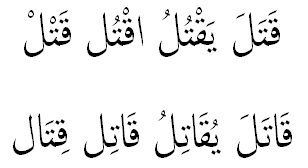
Top from right to left: he killed; he kills; kill!; [the act of] killing / homicide.
Bottom from right to left: he fought; he fights; fight!; fighting / [a] fight.
Verse 10, part 4

Those are greater in degree than those who spent afterwards and fought
Transliteration: ulāʾika aʿẓamu darajatan min alladhīna anfaqū min baʿdu wa-qātalu
Pronunciation: u-lā-ʾi-ka aʿ-ẓa–mu da-ra-ja-tan mi-nal-la-dhī-na an-fa-qū min baʿ-du wa-qā-ta-lu
Ulāʾika (those [are]) aʿẓamu (greater) darajatan (a degree, a rank) min (than) alladhīna (those who) anfaqū (spent) min baʿdu (afterwards) wa-qātalu (and fought).
The word baʿd means “after”. The phrase min baʿdu means “after”, “afterwards”.
Verse 10, part 5

And [to] all [of them] He has promised the best [reward], and God is cognizant of what you [plural] do
Transliteration: wa-kullan waʿada allāhu al-ḥusnā wa-allāhu bi-mā taʿmalūna khabīr
Pronunciation: wa-kul-lan wa-ʿa-dal-lā-hul-ḥus-nā wal-lā-hu bi-mā taʿ-ma-lū-na kha-bīr
Wa-kullan (and every, and all) waʿada (He promised) allāhu (God) al-ḥusnā (the most beautiful, the best) wa-allāhu (and God [is]) bi-mā (of what) taʿmalūna (you do) khabīr (cognizant, knowing, aware).
Verse 11, part 1

Who is it who lends God a wholesome loan…?
Transliteration: man dhā alladhī yuqriḍu allāha qarḍan ḥasanā
Pronunciation: man dhal-la-dhī yuq-ri-ḍul-lā-ha qar-ḍan ḥa-sa-nā
Man dhā alladhī (who is the one who) yuqriḍu (lends) allāha (God) qarḍan ḥasanā (a good loan).
The word man means “who”, dhā means “that” and alladhī means “the one”. The full phrase means “who is the one who…?”, “who is the one that…?”

From right to left: he lent; he lends; to lend; lender; lent [thing].
The word qarḍ comes from the same root and means “loan”.
The word ḥasan means “beautiful”, “goodly”, “wholesome”.
Verse 11, part 2

So He multiplies it for him and for him is a generous reward
Transliteration: fa-yuḍāʿifu-hu la-hu wa-la-hu ajrun karīm
Pronunciation: fa-yu-ḍā-ʿi-fu-hu la-hu wa-la-hu aj-run ka-rīm
Fa-yuḍāʿifu-hu (so He multiplies it) la-hu (for him) wa-la-hu (and for him) ajrun (a reward) karīm (generous).
The verb yuḍāʿifu is the third person present form of ḍāʿafa (“he doubled it”, “he multiplied it”).

From right to left: he multiplied [it]; he multiplies [it]; multiplication; multiplier.
Verse 12, part 1

[On] the day you [singular] see the believers [masculine] and the believers [feminine]
Transliteration: yawma tarā al-muʾminīna wa-al-muʾmināti
Pronunciation: yaw-ma ta-rā al-muʾ-mi-nī-na wal-muʾ-mi-nā-ti
Yawma ([on] the day) tarā (you see) al-muʾminīna (the [male] believers) wa-al-muʾmināti (the [female] believers).
The “on” at the beginning is there due to the context of this verse and the previous one.
Verse 12, part 2

Their light proceeding in front of them and on their right sides
Transliteration: yasʿā nūru-hum bayna aydī-him wa bi-aymāni-him
Pronunciation: yas-ʿā nū-ru-hum bay-na ay-dī-him wa bi-ay-mā-ni-him
Yasʿā (it proceeds) nūru-hum (their light) bayna aydī-him (in front of them) wa bi-aymāni-him (and on their right sides).
The verb yasʿā means “it goes forth hurriedly”, “it proceeds fast”, “it runs”.
The phrase bayna aydī-him literally means “between their hands”, it is a common Arabic expression that menas “in front of them”.
Verse 12, part 3

Your [plural] good tidings today are gardens under which rivers flow
Transliteration: bushrā-kumu al-yawma jannātun tajrī min taḥtihā al-anhār
Pronunciation: bush-rā-ku-mul-yaw-ma jan-nā-tun taj-rī min taḥ-ti-hal-an-hār
Bushrā-kumu (your good tiding) al-yawma (today) jannātun (gardens) tajrī (they flow) min taḥtihā (from underneath them) al-anhār (the rivers).
The word bushrā means “good news”, “good tiding”.
Verse 12, part 4

Immortal in them. That is the great success
Transliteration: khālidīna fī-hā dhālika huwa al-fawzu al-ʿaẓīm
Pronunciation: khā-li-dī-na fī-hā dhā-li-ka hu-wa al-faw-zul-ʿa-ẓīm
Khālidīna (immortal [ones]) fī-hā (in them, i.e. in the gardens) dhālika huwa (that is) al-fawzu (the success) al-ʿaẓīm (the great).
While dhālika means “that [is]”, dhālika huwa also means the same, it is just a more emphatic way of saying “that [is]”.
Verse 13, part 1

[On] the day the [male] hypocrites and the [female] hypocrites say to those who believed…
Transliteration: yawma yaqūlu al-munāfiqūna wa-al-munāfiqātu li-alladhīna āmanū
Pronunciation: yaw-ma ya-qū-lul-mu-nā-fi-qū-na wal-mu-nā-fi-qā-tu lil-la-dhī-na ā-ma-nū
Yawma ([on] the day) yaqūlu ([they] say) al-munāfiqūna (the [male] hypocrites) wa-al-munāfiqātu (the [female] hypocrites) li-alladhīna (to those who) āmanū (they believed).
Verse 13, part 2

“Wait for us, we may take some of your light.”
Transliteration: unẓurūnā naqtabis min nūri-kum
Pronunciation: un-ẓu-rū-nā naq-ta-bis min nū-ri-kum
Unẓurūnā (wait for us) naqtabis (we take) min (from) nūri-kum (your light).
The phrase unẓurū (“wait!”, “give [us] time!”) is the plural command form of anẓara (“he gave respite”, “he gave time”, “he waited”).
The verb naqtabis is the first person plural of iqtabasa (“he took something from a larger whole”), for example to take a burning ember from a fire.

From right to left: he took something from a larger whole; he takes something from a larger whole; to take something from a larger whole (it is also used to mean “quotation”, a piece of text taken out from a book, speech, etc.)
Verse 13, part 3

It was said, “Go back behind you then seek light.”
Transliteration: qīla irjiʿū warāʾa-kum fa-iltamisū nūrā
Pronunciation: qī-lar-ji-ʿū wa-rā-ʾa-kum fal-ta-mi-sū nū-rā
Qīla (it was said) irjiʿū (return) warāʾa-kum (behind you) fa-iltamisū (then seek) nūrā (a light).
After the hypocrites demand to have some light, here they are told to go back and seek light. It may be a taunt that tells them to go back to the worldly life and do good deeds so that they may earn some light. But of course, they will not be able to go back.
The verb iltamisū is the command form of iltamasa (“he sought for it”, “he petitioned for it”, “he pleaded for it”).

From right to left: he sought; he seeks; an act of seeking / petition / supplication.
Verse 13, part 4

So a wall was placed between them that had a door
Transliteration: fa-ḍuriba bayna-hum bi-sūrin la-hu bāb
Pronunciation: fa-ḍu-ri-ba bay-na-hum bi-sū-rin la-hu bāb
Fa-ḍuriba (so it was placed) bayna-hum (between them) bi-sūrin (a wall) la-hu (for it [was]) bāb (a door).
The verb ḍuriba is the passive form of ḍaraba (“he struck”, “he let down”, “he set up”). The word sūr means “a wall meant to keep people out”. The usual word for “wall” in Arabic is jidār.

Verse 13, part 5

Its interior contains mercy and its exterior, from its direction [comes] torment
Transliteration: bāṭinu-hu fī-hi al-raḥmatu wa-ẓāhiru-hu min qibali-hi al-ʿadhāb
Pronunciation: bā-ṭi-nu-hu fī-hir-raḥ-ma-tu wa-ẓā-hi-ru-hu min qi-ba-li-hil-ʿa-dhāb
Bāṭinu-hu (its interior) fī-hi (in it [is]) al-raḥmatu (mercy) wa-ẓāhiru-hu (and its exterior) min qibali-hi (from its direction [is]) al-ʿadhāb (torment).
The word qibal means “direction”. The phrase min qibal means “from the direction [of]”.
Lesson 30 Review

Wa-mā la-kum (and what is with you) al-lā (to not) tunfiqū (you spend) fī (in) sabīli (way [of]) allāhi (God).

Wa-lillāhi (and for God is, and to God belongs) mīrāthu (the inheritance [of]) al-samāwāti wa-al-arḍ (the heavens and the earth).

Lā (does not) yastawī (equals, is equal to) min-kum (of you, among you) man (he who) anfaqa (spent) min qabli (before) al-fatḥi (the conquest) wa-qātal (and fought).

Ulāʾika (those [are]) aʿẓamu (greater) darajatan (a degree, a rank) min (than) alladhīna (those who) anfaqū (spent) min baʿdu (afterwards) wa-qātalu (and fought).

Wa-kullan (and every, and all) waʿada (He promised) allāhu (God) al-ḥusnā (the most beautiful, the best) wa-allāhu (and God [is]) bi-mā (of what) taʿmalūna (you do) khabīr (cognizant, knowing, aware).

Man dhā alladhī (who is the one who) yuqriḍu (lends) allāha (God) qarḍan ḥasanā (a good loan).

Fa-yuḍāʿifu-hu (so He multiplies it) la-hu (for him) wa-la-hu (and for him) ajrun (a reward) karīm (generous).

Yawma ([on] the day) tarā (you see) al-muʾminīna (the [male] believers) wa-al-muʾmināti (the [female] believers).

Yasʿā (it proceeds) nūru-hum (their light) bayna aydī-him (in front of them) wa bi-aymāni-him (and on their right sides).

Bushrā-kumu (your good tiding) al-yawma (today) jannātun (gardens) tajrī (they flow) min taḥtihā (from underneath them) al-anhār (the rivers).

Khālidīna (immortal [ones]) fī-hā (in them, i.e. in the gardens) dhālika huwa (that is) al-fawzu (the success) al-ʿaẓīm (the great).

Yawma ([on] the day) yaqūlu ([they] say) al-munāfiqūna (the [male] hypocrites) wa-al-munāfiqātu (the [female] hypocrites) li-alladhīna (to those who) āmanū (they believed).

Unẓurūnā (wait for us) naqtabis (we take) min (from) nūri-kum (your light).
Unẓurūnā naqtabis (wait for us to we take) min (from) nūri-kum (your light).

Qīla (it was said) irjiʿū (return) warāʾa-kum (behind you) fa-iltamisū (then seek) nūrā (a light).

Fa-ḍuriba (so it was placed) bayna-hum (between them) bi-sūrin (a wall) la-hu (for it [was]) bāb (a door).
Fa-ḍuriba bayna-hum bi-sūrin (so a wall was placed between them) la-hu bāb (for it is/was a door, it has/had a door).

Bāṭinu-hu (its interior) fī-hi (in it [is]) al-raḥmatu (mercy) wa-ẓāhiru-hu (and its exterior) min qibali-hi (from its direction [is]) al-ʿadhāb (torment).
Lesson 31: al-Ḥadīd Part 4
Verse 14, part 1

They call them, “Were we not with you?” They said, “Rather, yes…”
Transliteration: yunādūna-hum a-lam nakun maʿa-kum qālū balā
Pronunciation: yu-nā-dū-na-hum a-lam na-kun ma-ʿa-kum qā-lū ba-lā
Yunādūna-hum (they call them) a-lam nakun (were we not) maʿa-kum (with you) qālū (they said) balā (rather, yes).
Above, the hypocrites are calling the believers, who respond to them.
The verb yunādūna means “they call”, it is the plural third person of nādā (“he called”).
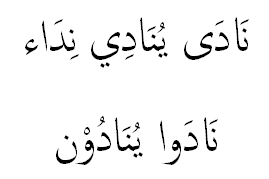
Top from right to left: he called; he calls; [a] call.
Bottom from right to left: they called; they call.
Bala is a response that means “rather, yes”, “rather, I did”. It negates the statement it responds to, for example:

“Did you not eat?” “Rather, I did.”

“Am I not beautiful?” “Rather, yes (i.e. you are beautiful).”
Verse 14, part 2

But you afflicted yourselves [with trials]
Transliteration: wa-lākinna-kum fatantu-m anfusa-kum
Pronunciation: wa-lā-kin-na-kum fa-tan-tum an-fu-sa-kum
Wa-lākinna-kum (but you) fatantu-m (you afflicted) anfusa-kum (yourselves).
The word lākinna means “but”. The phrase wa-lākinna (literally “and but”) is also used to mean “but” when the sentence continues from something before. In English “and but” is never used so the correct translation is merely “but”.
Fatantu-m is the second person plural of fatana (“he afflicted [him] with trials and difficulties”).
Verse 14, part 3

But you [plural] waited watchfully, hestitated and wishful thinking deceived you
Transliteration: wa-tarabbaṣtu-m wa-irtabtu-m wa-gharrat-kumu al-amānīy
Pronunciation: wa-ta-rab-baṣ-tum war-tab-tu-m wa-ghar-rat-ku-mul-a-mā-nīy
Wa-tarabbaṣtu-m (and you waited watchfully) wa-irtabtu-m (and you hestitated) wa-gharrat-kumu (they deceived you) al-amānīy (the worldly hopes, wishful thoughts).
The verb tarabbaṣtu-m (“you waited watchfully [for something to happen]”) is the second person plural of tarabbaṣa. Irtabtu-m (“you doubted”, “you wavered”, “you hesitated”) is the second person plural of irtaba.

From right to left: he hesitated; he hesitates; hesitation; one who hesitates.
The word amānīy (“hopes”, “wishes”, “wishful thinking”) is the plural of umniya (“hope”, “wish”, “ greedy and deluded worldly desire”).
Verse 14, part 4

Until the command of God came and the deceiver deceived you about God
Transliteration: ḥattā jāʾa amru allāhi wa-gharra-kum bi-allahi al-gharūr
Pronunciation: ḥat-tā jā-ʾa am-rul-lā-hi wa-ghar-ra-kum bil-la-hil-gha-rūr
Ḥattā (until) jāʾa ([it] came) amru (the command [of]) allāhi (God) wa-gharra-kum (and deceived you) bi-allahi (about God) al-gharūr (the deceiver).
The “deceiver” mentioned in the verse is thought to refer to Satan.
Verse 15, part 1

So today no ransom will be taken from you and not from those who denied
Transliteration: fa-al-yawma lā yuʾkhadhu min-kum fidyatun wa-lā min alladhīna kafarū
Pronunciation: fal-yaw-ma lā yuʾ-kha-dhu min-kum fid-ya-tun wa-lā mi-nal-la-dhī-na ka-fa-rū
Fa-al-yawma (so today) lā (is not) yuʾkhadhu (is taken) min-kum (from you) fidyatun (a ransom) wa-lā (and not) min (from) alladhīna (those who) kafarū (denied).
While yawm means “day”, al-yawma can mean “today” in some contexts.
Verse 15, part 2

Your refuge is the fire. She is your protector, and what a horrible destination!
Transliteration: maʾwā-kumu al-nāru hiya mawlā-kum wa-biʾsa al-maṣīr
Pronunciation: maʾ-wā-ku-mun-nā-ru hi-ya maw-lā-kum wa-biʾ-sal-ma-ṣīr
Maʾwā-kumu (your refuge [is]) al-nāru (the fire) hiya (she is) mawlā-kum (your protector) wa-biʾsa al-maṣīr (and what a horrible destination!).
The fire is called a “refuge” and “protector” as taunts.
The biʾsa (“how horrible!”) is used to exclaim about how bad something is.
Verse 16, part 1

Has the time not come for those who believed that their hearts should humbly submit to the remembrance of God?
Transliteration: a-lam yaʾni li-alladhīna āmanū an takhshaʿa qulūbu-hum li-dhikri allāh
Pronunciation: a-lam yaʾ-ni lil-la-dhī-na ā-ma-nū an takh-sha-ʿa qu-lū-bu-hum li-dhik-ril-lāh
A-lam (has not) yaʾni (its time comes) li-alladhīna āmanū (for those who believed) an (that) takhshaʿa (humbles [itself]) qulūbu-hum (their hearts) li-dhikri (to the remembrance [of]) allāh (God).
The word yaʾni (“its time comes”) is yaʾnī in standard Arabic:

From right to left: its time came; its time comes.
The verb takhshaʿ is the feminine third person form of khashaʿa (“he humbly and fearfully submitted”, “he humbled himself”). It is in the feminine because it is used in reference to qulūb, which is feminine due to being plural (the singular qalb [“heart”] is masculine).
Verse 16, part 2

and that which came down of the truth and not be like those who were given the Book before
Transliteration: wa-mā nazala min al-ḥaqqi wa-lā yakūnu ka-alladhīna ūtū al-kitāba min qabl
Pronunciation: wa-mā na-za-la min al-ḥaq-qi wa-lā ya-kū-nu kal-la-dhī-na ū-tul-ki-tā-ba min qabl
Wa-mā (and that which) nazala (it came down) min (of) al-ḥaqqi (the truth) wa-lā (and not) yakūnu (be) ka-alladhīna (like those who) ūtū (were given) al-kitāba (the Book) min qabl (before).
The meaning of this part continues from the previous part.
The word ka in ka-alladhīna means “like”. The “Book” refers to past scriptures such as the Torah.
Verse 16, part 3

so the span of time became lengthy upon them so their hearts hardened and many of them are rebellious
Transliteration: fa-ṭāla ʿalayhimu al-amadu fa-qasa-t qulūbu-hum wa-kathīrun min-hum fāsiqūn
Pronunciation: fa-ṭā-la ʿa-lay-hi-mul-a-ma-du fa-qa-sa-t qu-lū-bu-hum wa-ka-thī-run min-hum fā-si-qūn
Fa-ṭāla (so it became lengthy) ʿalayhimu (upon them) al-amadu (the span of time) fa-qasa-t (so she hardened) qulūbu-hum (their hearts) wa-kathīrun (and many) min-hum (of them [are]) fāsiqūn (rebellious ones).
The verb ṭāla means “it was long” and “it became long”, “it became lengthy”. The word amad means “duration”, “period [of time]”, “span [of time]”. The phrase qasa-t is the feminine of qasā (“it became hardened”). It is feminine again because it is used in reference to the plural qulūb (“hearts”).
Verse 17, part 1

Know that God brings to life the earth after her death
Transliteration: iʿlamū anna allāha yuḥyī al-arḍa baʿda mawti-hā
Pronunciation: iʿ-la-mū an-nal-lā-ha yuḥ-yil-ar-ḍa baʿ-da maw-ti-hā
Iʿlamū (know [directed at a group]) anna (that) allāha (God) yuḥyī (brings to life) al-arḍa (the earth) baʿda (after) mawti-hā (her death).
Verse 17, part 2

Truly we have made clear for you the signs so that you may understand
Transliteration: qad bayyan-nā lakumu al-āyāti laʿalla-kum taʿqilūn
Pronunciation: qad bay-yan-nā la-ku-mul-ā-yā-ti la-ʿal-la-kum taʿ-qi-lūn
Qad (truly have) bayyan-nā (we made clear) lakumu (for you) al-āyāti (the signs, the verses) laʿalla-kum (so that you may) taʿqilūn (understand, comprehend).
The phrase bayyan-nā (“we have made clear”) is made up of bayyana and the pronoun nā. They are merged together and expressed with a shadda.

The word laʿalla is a special word that means “so that [you/it] may”.
Lesson 31 Review

Yunādūna-hum (they call them) a-lam nakun (were we not) maʿa-kum (with you) qālū (they said) balā (rather, yes).

Wa-lākinna-kum (but you) fatantu-m (you afflicted) anfusa-kum (yourselves).

Wa-tarabbaṣtu-m (and you waited watchfully) wa-irtabtu-m (and you hestitated) wa-gharrat-kumu (they deceived you) al-amānīy (the worldly hopes, wishful thoughts).

Ḥattā (until) jāʾa ([it] came) amru (the command [of]) allāhi (God) wa-gharra-kum (and deceived you) bi-allahi (about God) al-gharūr (the deceiver).

Fa-al-yawma (so today) lā (is not) yuʾkhadhu (is taken) min-kum (from you) fidyatun (a ransom) wa-lā (and not) min (from) alladhīna (those who) kafarū (denied).

Maʾwā-kumu (your refuge [is]) al-nāru (the fire) hiya (she is) mawlā-kum (your protector) wa-biʾsa al-maṣīr (and what a horrible destination!).

A-lam (has not) yaʾni (its time comes) li-alladhīna āmanū (for those who believed) an (that) takhshaʿa (humbles [itself]) qulūbu-hum (their hearts) li-dhikri (to the remembrance [of]) allāh (God).
A-lam yaʾni (has its time not come) li-alladhīna āmanū (for those who believed) an takhshaʿa qulūbu-hum (that their hearts [should] humble themselves) li-dhikri (to the remembrance [of]) allāh (God).

Wa-mā (and that which) nazala (it came down) min (of) al-ḥaqqi (the truth) wa-lā (and not) yakūnu (be) ka-alladhīna (like those who) ūtū (were given) al-kitāba (the Book) min qabl (before).

Fa-ṭāla (so it became lengthy) ʿalayhimu (upon them) al-amadu (the span of time) fa-qasa-t (so she hardened) qulūbu-hum (their hearts) wa-kathīrun (and many) min-hum (of them [are]) fāsiqūn (rebellious ones).

Iʿlamū (know [directed at a group]) anna (that) allāha (God) yuḥyī (brings to life) al-arḍa (the earth) baʿda (after) mawti-hā (her death).

Qad (truly have) bayyan-nā (we made clear) lakumu (for you) al-āyāti (the signs, the verses) laʿalla-kum (so that you may) taʿqilūn (understand, comprehend).
Lesson 32: al-Ḥadīd Part 5
Verse 18, part 1

Indeed the [male] givers of charity and the [female] givers of charity and [those who] lent God a wholesome loan
Transliteration: inna al-muṣṣaddiqīna wa-al-muṣṣaddiqāti wa-aqraḍū allāha qarḍan ḥasanā
Pronunciation: in-nal-muṣ-ṣad-di-qī-na wal-muṣ-ṣad-di-qā-ti wa-aq-ra-ḍul-lā-ha qar-ḍan ḥa-sa-nā
Inna (indeed) al-muṣṣaddiqīna (the [male] givers of charity) wa-al-muṣṣaddiqāti (and the [female] givers of charity) wa-aqraḍū (and [those who] lent) allāha (God) qarḍan (a loan) ḥasanā (wholesome).
The word al-muṣṣaddiqīna and al-muṣṣaddiqāti would be as follows in standard Arabic:

These two words come from the verb taṣaddaqa (“he gave charity”).
The phrase wa-aqraḍū is short for wa-alladhīna aqraḍū (“those who lent”).

The alladhīna has been omitted in the Quranic text to create a poetic effect.
Verse 18, part 2

It is multiplied for them and for them is a generous reward
Transliteration: yuḍāʿafu la-hum wa-la-hum ajrun karīm
Pronunciation: yu-ḍā-ʿa-fu la-hum wa-la-hum aj-run ka-rīm
Yuḍāʿafu ([it] is multiplied) la-hum (for them) wa-la-hum (and for them [is]) ajrun (a reward) karīm (generous).
The verb yuḍāʿafu (“it is multiplied”) is the passive form of yuḍāʿifu (“he multiplies”).

From right to left: he multiplied; he multiplies.
Verse 19, part 1

And those who believed in God and His Messenger, truly those are the utterly truthful
Transliteration: wa-alladhīna āmanū bi-allāhi wa-rusuli-hi ulāʾika humu al-ṣiddīqūn
Pronunciation: wal-la-dhī-na ā-ma-nū-bil-lā-hi wa-ru-su-li-hi u-lā-ʾi-ka hu-muṣ-ṣid-dī-qūn
Wa-alladhīna (and those who) āmanū (believed) bi-allāhi (in God) wa-rusuli-hi (and His Messengers) ulāʾika humu (truly those are) al-ṣiddīqūn (the utterly truthful).
The word ṣiddīqūn is the plural of ṣiddīq (“utterly truthful”), which can either refer to a person’s truthfulness or their strong faith in the truth of God’s messages, therefore it may mean “strong affirmers of truth”.
The word ulāʾika means “those are” while hum also means “those are”. When used together they form a more emphatic way of saying “those are”, i.e. “truly those are”.
Verse 19, part 2

And the martyrs [are] with their Lord, for them is their reward and their light
Transliteration: wa-al-shuhadāʾu ʿinda rabbi-him la-hum ajru-hum wa-nūru-hum
Pronunciation: wash-shu-ha-dā-ʾu ʿin-da rab-bi-him la-hum aj-ru-hum wa-nū-ru-hum
Wa-al-shuhadāʾu (and the martyrs [are]) ʿinda (with) rabbi-him (their Lord) la-hum (for them [is]) ajru-hum (their reward) wa-nūru-hum (and their light).
The word shuhadāʾu (“matyrs”, “witnesses”) is the plural of shahīd.

Verse 19, part 3

And those who rejected and denied the truth of our signs those are the companions of the violent blaze
Transliteration: wa-alladhīna kafarū wa-kadhdhabū bi-āyātina ulāʾika aṣḥābu al-jaḥim
Pronunciation: wal-la-dhī-na ka-fa-rū wa-kadh-dha-bū bi-ā-yā-ti-na u-lā-ʾi-ka aṣ-ḥā-bul-ja-ḥim
Wa-alladhīna (and those who) kafarū (rejected) wa-kadhdhabū bi (denied the truth of) āyātina (our signs, our verses) ulāʾika (those [are]) aṣḥābu (companions [of]) al-jaḥim (the violent blaze).
The phrase kadhdhabū bi means “they denied the truth of”. The verb kafarū means (“they denied a truth/blessing”, “they rejected a truth/blessing”). The word al-jaḥim (“the violent blaze”) is another way of referring to the Hellfire.
Verse 20, part 1

Know that truly the life of the world is play and amusement
Transliteration: iʿlamū anna-mā ḥayātu al-dunyā laʿibun wa-lahw
Pronunciation: iʿ-la-mū an-na-mā ḥa-yā-tud-dun-yā la-ʿi-bun wa-lahw
Iʿlamū (know! [directed at a group]) anna-mā (truly that) ḥayātu al-dunyā (the life of the world) laʿibun (play, a game) wa lahw (and amusement).
The verb iʿlamū is the plural of iʿlam (“know!”).

The phrase anna-mā (“truly that”) is a more empathic form of anna (“truly that”).
Verse 20, part 2

and adornment and boasting between you and a competition in increase in wealth and children
Transliteration: wa-zīnatun wa-tafākhurun bayna-kum wa-takāthurun fī al-amwāli wa-al-awlād
Pronunciation: wa-zī-na-tun wa-ta-fā-khu-run bay-na-kum wa-ta-kā-thu-run fil-am-wā-li wal-aw-lād
Wa-zīnatun (and adornment) wa-tafākhurun (and boasting) bayna-kum (between you) wa-takāthurun (and a competition in increase) fī (in) al-amwāli (wealth, properties) wa-al-awlād (and children).
This part continues describing what the worldly life is.
Verse 20, part 3

Like the example of a rain whose [resulting] vegetation pleases the rejecters
Transliteration: ka-mathali ghaythin aʿjaba al-kuffāru nabātu-h
Pronunciation: ka-ma-tha-li ghay-thin aʿ-ja-bal-kuf-fā-ru na-bā-tuh
Ka (like) mathali ([the] example [of]) ghaythin (a rain) aʿjaba (it pleased) al-kuffāru (the rejecters [of truth and blessings]) nabātu-h (its vegetation).
The word ghayth literally means “rescue”, “relief”. It is used metaphorically to refer to rain.
Verse 20, part 4

then it dries so you see it yellowed then it becomes debris
Transliteration: thumma yahīju fa-tarā-hu muṣfarran thumma yakūnu ḥuṭāmā
Pronunciation: thum-ma ya-hī-ju fa-ta-rā-hu muṣ-far-ran thum-ma ya-kū-nu ḥu-ṭā-mā
Thumma (then) yahīju (it dries) fa-tarā-hu (then you see it) muṣfarran (yellowed) thumma (then) yakūnu (it is, it will be) ḥuṭāmā (debris, broken pieces).
Verse 20, part 5

And in the Hereafter is a severe torment and forgiveness from God and [His] pleasure
Transliteration: wa-fī al-ākhirati ʿadhābun shadīdun wa-maghfiratun mina allāhi wa-riḍwān
Pronunciation: wa-fil-ā-khi-ra-ti ʿa-dhā-bun sha-dī-duw wa-magh-fi-ra–tum mi-nal-lā-hi wa-riḍ-wān
Wa-fī (and in) al-ākhirati (the Hereafter) ʿadhābun (a torment) shadīdun (severe) wa-maghfiratun (and a forgiveness) mina (from) allāhi (God) wa-riḍwān (and [His] pleasure).
The word riḍwān means “the state of being pleased”, from the verb raḍiya (“he was pleased”).
Verse 20, part 6

And the life of the world is nothing but the goods of delusion
Transliteration: wa-mā al-ḥayātu al-dunyā illā matāʿu al-ghurūr
Pronunciation: wa-mal-ḥa-yā-tud-dun-yā il-lā ma-tā-ʿul-ghu-rūr
Wa-mā (and is not) al-ḥayātu al-dunyā (the life of the world) illā (except) matāʿu al-ghurūr (goods of delusion).
The word matāʿ means “goods”, “provisions”. The word ghurūr means “the state of being deluded”, “delusion”. The phrase matāʿu al-ghurūr means “goods of delusion”, goods that are enjoyed by those who are deluded.
Lesson 32 Review

Inna (indeed) al-muṣṣaddiqīna (the [male] givers of charity) wa-al-muṣṣaddiqāti (and the [female] givers of charity) wa-aqraḍū (and [those who] lent) allāha (God) qarḍan (a loan) ḥasanā (wholesome).

Yuḍāʿafu ([it] is multiplied) la-hum (for them) wa-la-hum (and for them [is]) ajrun (a reward) karīm (generous).

Wa-alladhīna (and those who) āmanū (believed) bi-allāhi (in God) wa-rusuli-hi (and His Messengers) ulāʾika humu (truly those are) al-ṣiddīqūn (the utterly truthful).

Wa-al-shuhadāʾu (and the martyrs [are]) ʿinda (with) rabbi-him (their Lord) la-hum (for them [is]) ajru-hum (their reward) wa-nūru-hum (and their light).

Wa-alladhīna (and those who) kafarū (rejected) wa-kadhdhabū bi (denied the truth of) āyātina (our signs, our verses) ulāʾika (those [are]) aṣḥābu (companions [of]) al-jaḥim (the violent blaze).

Iʿlamū (know! [directed at a group]) anna-mā (truly that) ḥayātu al-dunyā (the life of the world) laʿibun (play, a game) wa lahw (and amusement).

Wa-zīnatun (and adornment) wa-tafākhurun (and boasting) bayna-kum (between you) wa-takāthurun (and a competition in increase) fī (in) al-amwāli (wealth, properties) wa-al-awlād (and children).

Ka (like) mathali ([the] example [of]) ghaythin (a rain) aʿjaba (it pleased) al-kuffāru (the rejecters [of truth and blessings]) nabātu-h (its vegetation).

Thumma (then) yahīju (it dries) fa-tarā-hu (then you see it) muṣfarran (yellowed) thumma (then) yakūnu (it is, it will be) ḥuṭāmā (debris, broken pieces).

Wa-fī (and in) al-ākhirati (the Hereafter) ʿadhābun (a torment) shadīdun (severe) wa-maghfiratun (and a forgiveness) mina (from) allāhi (God) wa-riḍwān (and [His] pleasure).

Wa-mā (and is not) al-ḥayātu al-dunyā (the life of the world) illā (except) matāʿu al-ghurūr (goods of delusion).
Lesson 33: al-Ḥadīd Part 6
Verse 21, part 1

Race each other toward a forgiveness from your Lord
Transliteration: sābiqū ilā maghfiratin min rabbi-kum
Pronunciation: sā-bi-qū ilā magh-fi-ra-tin min rab-bi-kum
Sābiqū (race [one another, addressed to a group]) ilā (toward) maghfiratin (a forgiveness) min rabbi-kum (from your Lord).
The word sābiqū is the plural of sābiq (“race [him]”), from the word sābaqa (“he raced [him]”).

From right to left: he raced; he races; race (two forms); racer.
Verse 21, part 2

and a garden whose width is like the width of the heavens and the earth
Transliteration: wa-jannatin ʿarḍu-hā ka-ʿarḍi al-samāʾi wa-al-arḍ
Pronunciation: wa-jan-na-tin ʿar-ḍu-hā ka-ʿar-ḍis-sa-mā-ʾi wal-arḍ
Wa-jannatin (and a garden, and a Paradise) ʿarḍu-hā (her width [is]) ka-ʿarḍi (like the width [of]) al-samāʾi wa-al-arḍ (the heaven and the earth).
Verse 21, part 3

she was prepared for those who believed in God and His Messengers
Transliteration: uʿidda-t li-alladhīna āmanū bi-allahi wa-rusuli-h
Pronunciation: u-ʿid-dat lil-la-dhī-na ā-ma-nū bil-la-hi wa-ru-su-lih
Uʿidda-t (she was prepared) li-alladhīna (for those who) āmanū (believed) bi-allahi (in God) wa-rusuli-h (and His Messengers).
The verb uʿidda-t is the passive form of aʿadda (“he prepared”). The verse uses “she was…” because it is referring to janna from part 2 which is a feminine word.

From right to left: he prepared; he prepares; preparation.
Verse 21, part 4

That is the favor of God, He gives it to whomever He wills
Transliteration: dhālika faḍlu allāhi yuʿtī-hi man yashāʾ
Pronunciation: dhā-li-ka faḍ-lul-lā-hi yuʿ-tī-hi man ya-shāʾ
Dhālika (that is) faḍlu (the favor of) allāhi (God) yuʿtī-hi (He gives it [to]) man (whom) yashāʾ (He wishes).
Verse 21, part 5

And God is the possessor of great favor
Transliteration: wa-allāhu dhū al-faḍli al-ʿaẓīm
Pronunciation: wal-lā-hu dhul-faḍ-lil-ʿa-ẓīm
Wa-allāhu (and God [is]) dhū (possessor of) al-faḍli (the favor) al-ʿaẓīm (great).
Verse 22, part 1

No disaster strikes in the earth nor in yourselves…
Transliteration: mā aṣāba min muṣībatin fī al-arḍi wa-lā fī anfusi-kum
Pronunciation: mā a-ṣā-ba min mu-ṣī-ba-tin fil-ar-ḍi wa-lā fī an-fu-si-kum
Mā (does not) aṣāba (it struck) min muṣībatin ([of any kind] of calamity) fī (in) al-arḍi (the earth) wa-lā (and not) fī anfusi-kum (in yourselves).
The word aṣāba means “it struck”, “it hit”, “it befell”. The word muṣība comes from the same root and means “disaster”, “calamity”. The phrase min muṣībatin means something like “of [any kind of] calamity”.
Verse 22, part 2

except that it is in a book before we bring it into existence
Transliteration: illā fī kitābin min qabli an nabraʾa-ḥā
Pronunciation: il-lā fī ki-tā-bin min qab-li an nab-ra-ʾa-ḥā
Illā (except [that it is]) fī (in) kitābin (a book) min qabli an (before the fact that) nabraʾa-ḥā (we bring it about).
The meaning of this part with the previous one is that every disaster that strikes is first written by God before it comes about in the world, meaning that no disaster happens without Him overseeing it and permitting it. The phrase min qabli an means “before the fact that…”
Verse 22, part 3

That is upon God easy
Transliteration: dhālika ʿalā allāhi yasīr
Pronunciation: dhā-li-ka ʿa-lal-lā-hi ya-sīr
Dhālika (that [is]) ʿalā (upon) allāhi (God) yasīr (easy).
Verse 23, part 1

So that you [plural] may not grieve over what has escaped you and not exult about what He has given you
Transliteration: li-kay-lā taʾsaw ʿalā mā fāta-kum wa-lā tafraḥū bi-mā ātā-kum
Pronunciation: li-kay-lā taʾ-saw ʿa-lā mā fā-ta-kum wa-lā taf-ra-ḥū bi-mā ā-tā-kum
Li-kay-lā (so that not) taʾsaw (you grieve) ʿalā (upon) mā fāta-kum (what escaped you) wa-lā (and not) tafraḥū (you exult) bi-mā ātā-kum (about what He gave you).
The phrase li-kay-lā means “so that [you/it/etc.] may not”. In standard Arabic it would be written as follows:
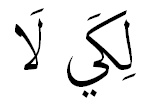
The verb taʾsaw (“you grieve”) is the second person plural of asīya.
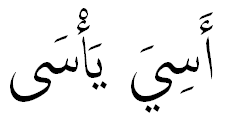
From right to left: he grieved; he grieves.
The word tafraḥū (“you exult [about something]”, “you become happy [about something]”) is the plural second person form of tafraḥ (“you exult”), whose third person past tense form is fariḥa.

From right to left: he exulted; he exults; exultation / happiness.
The symbol at above the last word tells reciters it is recommended for them to pause here before going on.
Verse 23, part 2

and God does not love each conceited boasting person
Transliteration: wa-allāhu lā yuḥibbu kulla mukhtālin fakhūr
Pronunciation: wal-lā-hu lā yu-ḥib-bu kul-la mukh-tā-lin fa-khūr
Wa-allāhu (and God) lā yuḥibbu (does not love) kulla (each, every) mukhtālin (conceited, self-satisfied) fakhūr (one who boasts).
Verse 24, part 1

Those who withhold [their wealth] and command people toward stinginess
Transliteration: alladhīna yabkhalūna wa-yaʾmurūna al-nāsa bi-al-bukhl
Pronunciation: al-la-dhī-na yab-kha-lū-na wa-yaʾ-mu-rū-nan-nā-sa bil-bukhl
Alladhīna (those who) yabkhalūna (withhold) wa-yaʾmurūna (and they command) al-nāsa (people) bi-al-bukhl (with stinginess, toward stinginess).
Verse 24, part 2

and whoever turns away then indeed God is Needless, Praiseworthy
Transliteration: wa-man yatawalla fa-inna allāha huwa al-ghanīyu al-ḥamīd
Pronunciation: wa-man ya-ta-wal-la fa-in-nal-lā-ha hu-wal-gha-nī-yul-ḥa-mīd
Wa-man (and whoever) yatawalla (turns away) fa-inna (then indeed) allāha (God) huwa (He [is]) al-ghanīyu (the Needless) al-ḥamīd (the Praiseworthy).
The huwa serves for emphasis.
Verse 25, part 1

Truly we sent our Messengers with the clear demonstrations
Transliteration: la-qad arsal-nā rusula-nā bi-al-bayyināt
Pronunciation: la-qad ar-sal-nā ru-su-la-nā bil-bay-yi-nāt
La-qad (truly have) arsal-nā (we sent) rusula-nā (our Messengers) bi-al-bayyināt (with the clear proofs, with the clear demonstrations).
Verse 25, part 2

And we sent down with them the Book and the balance so that people may establish justice
Transliteration: wa-anzal-nā maʿa-hum al-kitāba wa-al-mīzāna li-yaqūma al-nāsa bi-al-qisṭ
Pronunciation: wa-an-zal-nā ma-ʿa-hum al-ki-tā-ba wal-mī-zā-na li-ya-qū-man-nā-sa bil-qisṭ
Wa-anzal-nā (and we sent down) maʿa-hum (with them) al-kitāba (the Book) wa-al-mīzāna (the balance) li-yaqūma (so that they establish) al-nāsa (the people) bi-al-qisṭ (justice).
Above, al-mīzān (“the balance”, “the scales”) may refer to the knowledge of how to establish justice. The phrase li-yaqūma…bi means “so that they may…”
Verse 25, part 3

And we sent down iron, in it there is severe [military] capability and benefits for the people
Transliteration: wa-anzal-nā al-ḥadīda fī-hi baʾsun shadīdun wa-manāfiʿu li-al-nās
Pronunciation: wa-an-zal-nā al-ḥa-dī-da fī-hi baʾ-sun sha-dī-dun wa-ma-nā-fi-ʿu lin-nās
Wa-anzal-nā (and we sent down) al-ḥadīda (iron) fī-hi (in it [is]) baʾsun (injury, military power) shadīdun (severe) wa-manāfiʿu (and benefits) li-al-nās (for the people).
Verse 25, part 4

And so that God may know who supports Him and His Messengers unseen. Indeed God is Strong, Mighty
Transliteration: wa-li-yaʿlama allāhu man yanṣuru-hu wa-rusulu-hu bi-al-ghayb inna allāha qawīyun ʿazīz
Pronunciation: wa-li-yaʿ-la-mal-lā-hu man yan-ṣu-ru-hu wa-ru-su-lu-hu bil-ghayb in-nal-lā-ha qa-wī-yun ʿa-zīz
Wa-li-yaʿlama (so that He knows) allāhu (God) man (who) yanṣuru-hu (supports Him) wa-rusulu-hu (and His Messengers) bi-al-ghayb (unseen) inna (indeed) allāha (God [is]) qawīyun (Strong) ʿazīz (Mighty).
The phrase bi-al-ghayb means “in a state of not being seen”, meaning that they support God even though there is apparently no one looking at them and forcing them.
Lesson 33 Review

Sābiqū (race [one another, addressed to a group]) ilā (toward) maghfiratin (a forgiveness) min rabbi-kum (from your Lord).

Wa-jannatin (and a garden, and a Paradise) ʿarḍu-hā (her width [is]) ka-ʿarḍi (like the width [of]) al-samāʾi wa-al-arḍ (the heaven and the earth).

Uʿidda-t (she was prepared) li-alladhīna (for those who) āmanū (believed) bi-allahi (in God) wa-rusuli-h (and His Messengers).

Dhālika (that is) faḍlu (the favor of) allāhi (God) yuʿtī-hi (He gives it [to]) man (whom) yashāʾ (He wishes).

Wa-allāhu (and God [is]) dhū (possessor of) al-faḍli (the favor) al-ʿaẓīm (great).

Mā (does not) aṣāba (it struck) min muṣībatin ([of any kind] of calamity) fī (in) al-arḍi (the earth) wa-lā (and not) fī anfusi-kum (in yourselves).

Illā (except [that it is]) fī (in) kitābin (a book) min qabli an (before the fact that) nabraʾa-ḥā (we bring it about).

Dhālika (that [is]) ʿalā (upon) allāhi (God) yasīr (easy).

Li-kay-lā (so that not) taʾsaw (you grieve) ʿalā (upon) mā fāta-kum (what escaped you) wa-lā (and not) tafraḥū (you exult) bi-mā ātā-kum (about what He gave you).

Wa-allāhu (and God) lā yuḥibbu (does not love) kulla (each, every) mukhtālin (conceited, self-satisfied) fakhūr (one who boasts).

Alladhīna (those who) yabkhalūna (withhold) wa-yaʾmurūna (and they command) al-nāsa (people) bi-al-bukhl (with stinginess, toward stinginess).

Wa-man (and whoever) yatawalla (turns away) fa-inna (then indeed) allāha (God) huwa (He [is]) al-ghanīyu (the Needless) al-ḥamīd (the Praiseworthy).

La-qad (truly have) arsal-nā (we sent) rusula-nā (our Messengers) bi-al-bayyināt (with the clear proofs, with the clear demonstrations).

Wa-anzal-nā (and we sent down) maʿa-hum (with them) al-kitāba (the Book) wa-al-mīzāna (the balance) li-yaqūma (so that they establish) al-nāsa (the people) bi-al-qisṭ (justice).

Wa-anzal-nā (and we sent down) al-ḥadīda (iron) fī-hi (in it [is]) baʾsun (injury, military power) shadīdun (severe) wa-manāfiʿu (and benefits) li-al-nās (for the people).

Wa-li-yaʿlama (so that He knows) allāhu (God) man (who) yanṣuru-hu (supports Him) wa-rusulu-hu (and His Messengers) bi-al-ghayb (unseen) inna (indeed) allāha (God [is]) qawīyun (Strong) ʿazīz (Mighty).
Lesson 34: al-Ḥadīd Part 7
Verse 26, part 1

And truly We sent Noah and Abraham and placed within their descendants prophethood and the Book
Transliteration: wa-la-qad arsal-nā nūḥan wa-ibrāhīma wa-jaʿal-nā fī dhurrīyati-himā al-nubuwwata wa-al-kitāb
Pronunciation: wa-la-qad ar-sal-nā nū-ḥan wa-ib-rā-hī-ma wa-ja-ʿal-nā fī dhur-rī-ya-ti-hi-mal-nu-buw-wa-ta wal-ki-tāb
Wa-la-qad (and truly have) arsal-nā (We sent) nūḥan (Noah) wa-ibrāhīma (and Abarahm) wa-jaʿal-nā (and We placed, and We made) fī (in) dhurrīyati-himā (their descendants) al-nubuwwata (prophethood) wa-al-kitāb (and the Book).
The word dhurrīya means “descendants”. The himā is the dual pronoun; it means “the two of them”.
Verse 26, part 2

so from them is [the occasional] one who is guided, and many of them are rebellious
Transliteration: fa-min-hum muhtadin wa-kathīrun min-hum fāsiqūn
Pronunciation: fa-min-hum muh-ta-din wa-ka-thī-run min-hum fā-si-qūn
Fa-min-hum (so from them) muhtadin (a guided one) wa-kathīrun (and many) min-hum (of them [are]) fāsiqūn (rebellious, sinful).
The meaning of the verse is that you will find one here and there among them who is guided, but that most of them are rebellious (against God).
Verse 27, part 1

Then we sent our Messengers after their footsteps and sent Jesus son of Mary after [them]
Transliteration: thumma qaffay-nā ʿalā āthāri-him bi-rusuli-nā wa-qaffay-nā bi-ʿīsā ibni maryam
Pronunciation: thum-ma qaf-fay-nā ʿalā ā-thā-ri-him bi-ru-su-li-nā wa-qaf-fay-nā bi-ʿī-sab-ni mar-yam
Thumma (then, next) qaffay-nā (we sent after [them]) ʿalā (upon) āthāri-him (their footsteps) bi-rusuli-nā (our Messengers) wa-qaffay-nā (and we sent after [them]) bi-ʿīsā (Jesus) ibni maryam (son of Mary).
The verb qaffay-nā is the first person plural of qaffā (“he sent him after [another person]”, “he caused him to follow [another person]”). The phrase qaffā…bi has the same meaning.
Verse 27, part 2

And we gave him the Gospel and placed in the hearts of those who followed him a compassion
Transliteration: wa-ātay-nā-hu al-injīla wa-jaʿalnā fī qulūbi alladhīna ittabaʿū-hu raʾfatan
Pronunciation: wa-ā-tay-nā-hul-in-jī-la wa-ja-ʿal-nā fī qu-lū-bil-la-dhī-nat-taba-ʿū-hu raʾ-fa-tan
Wa-ātay-nā-hu (and We gave him) al-injīla (the Gospel) wa-jaʿalnā (and We placed) fī (in) qulūbi (the hearts [of]) alladhīna (those who) ittabaʿū-hu (followed him) raʾfatan (a compassion).
Verse 27, part 3

and a mercy and a monasticism they invented, we did not prescribe it upon them
Transliteration: wa-raḥmatan wa-rahbānīyatan ibtadaʿū-hā mā katabnā-hā ʿalay-him
Pronunciation: wa-raḥ-ma-tan wa-rah-bā-nī-ya-tan ib-ta-da-ʿū-hā mā ka-tab-nā-hā ʿa-lay-him
Wa-raḥmatan (and a mercy) wa-rahbānīyatan (and a monasticism) ibtadaʿū-hā (they invented it) mā katabnā-hā (we did not prescribe it) ʿalay-him (upon them).
The word katabnā literally means “we wrote”. But when it is followed by ʿalā (“upon”) it means “we prescribed”, “we made it obligatory”.
Verse 27, part 4

but they did not observe it its rightful observance, so we gave those who believed of them their reward, and many of them are rebellious
Transliteration: fa-mā raʿaw-hā ḥaqqa riʿāyati-hā fa-ātay-nā alladhīna āmanū min-hum ajra-hum wa-kathīrun min-hum fāsiqūn
Pronunciation: fa-mā ra-ʿaw-hā ḥaq-qa ri-ʿā-ya-ti-hā fa-ā-tay-nā al-la-dhī-na ā-ma-nū min-hum aj-ra-hum wa-ka-thī-run min-hum fā-si-qūn
Fa-mā (but not) raʿaw-hā (they observed it) ḥaqqa (due, rightful) riʿāyati-hā (its observance) fa-ātay-nā (so We gave) alladhīna āmanū (those who believed) min-hum (of them) ajra-hum (their reward) wa-kathīrun (and many) min-hum (of them [are]) fāsiqūn (rebellious ones).
Verse 28, part 1

O those who believed, fear God and believe in His Messenger
Transliteration: yā-ʾayyuḥā alladhīna āmanū ittaqū allāha wa-āminū bi-rasūli-h
Pronunciation: yā-ʾay-yu-ḥal-la-dhī-na ā-ma–nut-ta-qul-lā-ha wa-ā-mi-nū bi-ra-sū-lih
Yā-ʾayyuḥā alladhīna (O those who…) āmanū (they believed) ittaqū (fear) allāha (God) wa-āminū (and believe) bi-rasūli-h (in His Messenger).
Verse 28, part 2

He will give you two shares of His mercy
Transliteration: yuʾti-kum kiflayni min raḥmati-h
Pronunciation: yuʾ-ti-kum kif-lay-ni min raḥ-ma-tih
Yuʾti-kum (He gives you) kiflayni (two shares) min (of) raḥmati-h (His mercy).
The word kiflayn is the dual of kifl (“portion”, “share”).
Verse 28, part 2

And He will assign for you [plural] a light which you will walk with
Transliteration: wa-yajʿal la-kum nūran tamshūna bi-h
Pronunciation: wa-yaj-ʿal la-kum nū-ran tam-shū-na bih
Wa-yajʿal (and He assigns, and He places) la-kum (for you) nūran (a light) tamshūna (you walk) bi-h (with it, by it).
Verse 28, part 3

and He will forgive you, and God is the Forgiving, the Merciful
Transliteration: wa-yaghfir la-kum wa-allāhu ghafūrun raḥīm
Pronunciation: wa-yagh-fir la-kum wal-lā-hu gha-fū-run ra-ḥīm
Wa-yaghfir la-kum (and He forgives you) wa-allāhu (and God [is]) ghafūrun (Forgiving) raḥīm (Merciful).
The phrase yaghfir la-kum means “He forgives you”, it is the third person present tense of ghafara li (“He forgave”).
Verse 29, part 1

So that the People of the Book may know…
Transliteration: li-allā yaʿlama ahlu al-kitābi
Pronunciation: li-al-lā yaʿ-la-ma ah-lul-ki-tā-bi
Li-allā yaʿlama (so that they know) ahlu al-kitābi (the People of the Book).
The phrase li-allā is short for li-an lā. It literally means “so that [it/they/etc] may not”, “so that [it/they/etc] will not”, but here it is used to mean the opposite; “so that [it/they/etc] may”. This use of something to mean its opposite is used for grabbing attention. The phrase ahlu al-kitāb means “the People of the Book”. It refers to Jews, Christians and others belonging to the Abrahaic religions.
Verse 29, part 2
 That they do not have power over any of God’s favor and that favor is in God’s hand
That they do not have power over any of God’s favor and that favor is in God’s hand
Transliteration: allā yaqdirūna ʿalā shayʾin min faḍli allāhi wa-anna al-faḍla bi-yadi allāh
Pronunciation: al-lā yaq-di-rū-na ʿa-lā shay-ʾin min faḍ-lil-lā-hi wa-an-nal-faḍ-la bi-ya-dil-lāh
Allā (that not) yaqdirūna (they have power) ʿalā (over) shayʾin (anything) min (of) faḍli (the favor [of]) allāhi (God) wa-anna (and that) al-faḍla (favor [is]) bi-yadi (in that hand [of]) allāh (God).
The meaning of this part with the previous one is that the People of the Book have no power over God’s favor. The Jews claimed that the favor of prophethood was bestowed upon them and exclusive to them, but God took that favor away and gave it to Muhammad who was a non-Jew. Here God affirms His power to place His favors wherever He wants.
Verse 29, part 3

He gives it [i.e. His favor] to whomever He wills, and God is the possessor of great favor
Transliteration: yuʾtī-hi man yashāʾ wa-allāhu dhū al-faḍli al-ʿaẓīm
Pronunciation: yuʾ-tī-hi man ya-shāʾ wal-lā-hu dhul-faḍ-lil-ʿa-ẓīm
Yuʾtī-hi (He gives it [to]) man (whomever) yashāʾ (He wills) wa-allāhu (and God [is]) dhū al-faḍli (possessor of the favor) al-ʿaẓīm (the great).
Lesson 34 Review

Wa-la-qad (and truly have) arsal-nā (We sent) nūḥan (Noah) wa-ibrāhīma (and Abarahm) wa-jaʿal-nā (and We placed, and We made) fī (in) dhurrīyati-himā (their descendants) al-nubuwwata (prophethood) wa-al-kitāb (and the Book).

Fa-min-hum (so from them) muhtadin (a guided one) wa-kathīrun (and many) min-hum (of them [are]) fāsiqūn (rebellious, sinful).

Thumma (then, next) qaffay-nā (we sent after [them]) ʿalā (upon) āthāri-him (their footsteps) bi-rusuli-nā (our Messengers) wa-qaffay-nā (and we sent after [them]) bi-ʿīsā (Jesus) ibni maryam (son of Mary).

Wa-ātay-nā-hu (and We gave him) al-injīla (the Gospel) wa-jaʿalnā (and We placed) fī (in) qulūbi (the hearts [of]) alladhīna (those who) ittabaʿū-hu (followed him) raʾfatan (a compassion).

Wa-raḥmatan (and a mercy) wa-rahbānīyatan (and a monasticism) ibtadaʿū-hā (they invented it) mā katabnā-hā (we did not prescribe it) ʿalay-him (upon them).

Fa-mā (but not) raʿaw-hā (they observed it) ḥaqqa (due, rightful) riʿāyati-hā (its observance) fa-ātay-nā (so We gave) alladhīna āmanū (those who believed) min-hum (of them) ajra-hum (their reward) wa-kathīrun (and many) min-hum (of them [are]) fāsiqūn (rebellious ones).

Yā-ʾayyuḥā alladhīna (O those who…) āmanū (they believed) ittaqū (fear) allāha (God) wa-āminū (and believe) bi-rasūli-h (in His Messenger).

Yuʾti-kum (He gives you) kiflayni (two shares) min (of) raḥmati-h (His mercy).

Wa-yajʿal (and He assigns, and He places) la-kum (for you) nūran (a light) tamshūna (you walk) bi-h (with it, by it).

Wa-yaghfir la-kum (and He forgives you) wa-allāhu (and God [is]) ghafūrun (Forgiving) raḥīm (Merciful).

Li-allā yaʿlama (so that they know) ahlu al-kitābi (the People of the Book).

Allā (that not) yaqdirūna (they have power) ʿalā (over) shayʾin (anything) min (of) faḍli (the favor [of]) allāhi (God) wa-anna (and that) al-faḍla (favor [is]) bi-yadi (in that hand [of]) allāh (God).

Yuʾtī-hi (He gives it [to]) man (whomever) yashāʾ (He wills) wa-allāhu (and God [is]) dhū al-faḍli (possessor of the favor) al-ʿaẓīm (the great).
Lesson 35: al-Insān Part 1
In this lesson we will cover chapter 76 of the Quran which is titled al-Insān (“The Human”).

Verse 1

Has a period of time come upon the human [when] he was not a mentioned thing?
Transliteration: hal atā ʿalā al-insāni ḥīnun mina al-dahri lam yakun shayʾan madhkūrā
Pronunciation: hal atā ʿalā al-insāni ḥīnun mina al-dahri lam yakun shayʾan madhkūrā
Hal (has it…?, is it true that…?) atā (it came) ʿalā (upon) al-insāni (the human) ḥīnun (a period [of time], a point [in time]) mina (of) al-dahri (time, eternity) lam (not) yakun (was) shayʾan (a thing) madhkūrā (remembered).
This verse asks humans the rhetorical question if there was ever a time they were not something that was not mentioned. It is reminding humans that there was a time when they did not even exist.
Verse 2

Indeed We created the human from a sperm-drop mixture [so that] we [may] test him so we made him hearing and seeing.
Transliteration: innā khalaq-nā al-insāna min nuṭfatin amshājin nabtalī-hi fa-jaʿalnā-hu samīʿan baṣirā
Pronunciation: in-nā kha-laq-nal-in-sā-na min nuṭ-fa-tin am-shā-jin nab-ta-lī-hi fa-ja-ʿal-nā-hu sa-mī-ʿan ba-ṣi-rā
Innā (indeed We) khalaq-nā (We created) al-insāna (the human) min (from) nuṭfatin (a sperm-drop) amshājin (mixed) nabtalī-hi (We test him) fa-jaʿalnā-hu (so We made him) samīʿan (hearing [i.e. able to hear]) baṣirā (seeing).
Verse 3

Indeed We guided him to the way, whether grateful or ungrateful
Transliteration: innā hadaynā-hu al-sabīla immā shākiran wa-immā kafūrā
Pronunciation: in-nā ha-day-nā-hus-sa-bī-la im-mā shā-ki-ran wa-im-mā ka-fū-rā
Innā (indeed We) hadaynā-hu (guided him [to]) al-sabīla (the way) immā (whether) shākiran (grateful) wa-immā kafūrā (or whether ungrateful).
Verse 4

Indeed We have prepared for the deniers chains, shackles and a blaze
Transliteartion: innā aʿtad-nā li-al-kāfirīna salāsila wa-aghlālan wa-saʿīrā
Pronunciation: in-nā aʿ-tad-nā lil-kā-fi-rī-na sa-lā-si-la wa-agh-lā-law wa-sa-ʿī-rā
Innā (indeed we) aʿtad-nā (we prepared) li-al-kāfirīna (for the deniers) salāsila (chains) wa-aghlālan (shackles) wa-saʿīrā (and a blaze).
While salāsila appears to have an alif at the end, it is not pronounced in the common reading of the Quran.
Verse 5

Indeed the righteous drink of a cup its mixture is of camphor
Transliteartion: inna al-abrāra yashrabūna min kaʾsin kāna mizāju-hā kāfūrā
Pronunciation: in-nal-ab-rā-ra yash-ra-bū-na min kaʾ-sin kā-na mi-zā-ju-hā kā-fū-rā
Inna (indeed) al-abrāra (the righteous) yashrabūna (they drink) min (from) kaʾsin (a cup) kāna (is/was) mizāju-hā (its mixture) kāfūrā (camphor).
Verse 6

A spring the servants of God drink by [which] they make gush forth abundantly.
Transliteration: ʿaynan yashrabu bi-hā ʿibadu allāhi yufajjirūna-hā tafjīrā
Pronunciation: ʿay-nan yash-ra-bu bi-hā ʿi-ba-dul-lā-hi yu-faj-ji-rū-na-hā taf-jī-rā
ʿaynan (a spring) yashrabu (drinks) bi-hā (by it) ʿibadu (the servants [of]) allāhi (God) yufajjirūna-hā (they cause it to gush forth) tafjīrā (an extreme gushing forth).
The word ʿayn means both “eye” and “spring” (a place where water comes out of the ground).
Verse 7

They fulfill their vows and fear a day whose evil will be widespread
Transliteration: yūfūna bi-al-nadhri wa-yakhāfūna yawman kāna sharru-hu mustaṭīrā
Pronunciation: yū-fū-na bin-nadh-ri wa-ya-khā-fū-na yaw-man kā-na shar-ru-hu mus-ta-ṭī-rā
Yūfūna (they fulfill) bi-al-nadhri (their vows) wa-yakhāfūna (and they fear) yawman (a day) kāna (is/was) sharru-hu (its evil) mustaṭīrā (widespread).
Verse 8

They feed food despite their love for it to the poor, the orphan and the prisoner
Transliteration: wa-yuṭʿimūna al-ṭaʿāma ʿalā ḥubbi-hi miskīnan wa-yatīman wa-asīrā
Pronunciation: wa-yuṭ-ʿi-mū-naṭ-ṭa-ʿā-ma ʿa-lā ḥub-bi-hi mis-kī-nan wa-ya-tī-man wa-a-sī-rā
Wa-yuṭʿimūna (and they feed) al-ṭaʿāma (food) ʿalā ḥubbi-hi (despite its love) miskīnan (a needy person) wa-yatīman (an orphan) wa-asīrā (and a prisoner).
The phrase ʿalā ḥubbi means “despite their love for it”. It means that these people give away food even though they need it themselves. According to some exegetes the phrase could also mean “out of His love”, i.e. they give away food out of love for God. The question is what the pronoun hi in ʿalā ḥubbi-hi refers to. It could either refer to the aforementioned food, or to God.
Verse 9

Indeed we feed you only for the [sake of the] Countenance of God, we do not want from you a reward or thanks
Transliteration: inna-mā nuṭʿimu-kum li-wajhi allāhi lā nurīdu min-kum jazāʾan wa-lā shukūrā
Pronunciation: in-na-mā nuṭ-ʿi-mu-kum li-waj-hil-lā-hi lā nu-rī-du min-kum ja-zā-ʾan wa-lā shu-kū-rā
Inna-mā (indeed only) nuṭʿimu-kum (we feed you) li-wajhi (for the Countenance [of]) allāhi (God) lā (do not) nurīdu (we want) min-kum (from you) jazāʾan (a reward) wa-lā (and no) shukūrā (thanks).
The phrase inna-mā means “Indeed it is a fact that…only”
Verse 10

Indeed we fear from our Lord a day grim and distressful
Transliteration: innā nakhāfu min rabbi-nā yawman ʿabūsan qamṭarīrā
Pronunciation: in-nā na-khā-fu min rab-bi-nā yaw-man ʿa-bū-san qam-ṭa-rī-rā
Innā (indeed we) nakhāfu (we fear) min (from) rabbi-nā (our Lord) yawman (a day) ʿabūsan (grim, austere) qamṭarīrā (distressful).
Lesson 35 Review


Hal (has it…?, is it true that…?) atā (it came) ʿalā (upon) al-insāni (the human) ḥīnun (a period [of time], a point [in time]) mina (of) al-dahri (time, eternity) lam (not) yakun (was) shayʾan (a thing) madhkūrā (remembered).

Innā (indeed We) khalaq-nā (We created) al-insāna (the human) min (from) nuṭfatin (a sperm-drop) amshājin (mixed) nabtalī-hi (We test him) fa-jaʿalnā-hu (so We made him) samīʿan (hearing [i.e. able to hear]) baṣirā (seeing).

Innā (indeed We) hadaynā-hu (guided him [to]) al-sabīla (the way) immā (whether) shākiran (grateful) wa-immā kafūrā (or whether ungrateful).

Innā (indeed we) aʿtad-nā (we prepared) li-al-kāfirīna (for the deniers) salāsila (chains) wa-aghlālan (shackles) wa-saʿīrā (and a blaze).

Inna (indeed) al-abrāra (the righteous) yashrabūna (they drink) min (from) kaʾsin (a cup) kāna (is/was) mizāju-hā (its mixture) kāfūrā (camphor).

ʿaynan (a spring) yashrabu (drinks) bi-hā (by it) ʿibadu (the servants [of]) allāhi (God) yufajjirūna-hā (they cause it to gush forth) tafjīrā (an extreme gushing forth).

Yūfūna (they fulfill) bi-al-nadhri (their vows) wa-yakhāfūna (and they fear) yawman (a day) kāna (is/was) sharru-hu (its evil) mustaṭīrā (widespread).

Wa-yuṭʿimūna (and they feed) al-ṭaʿāma (food) ʿalā ḥubbi-hi (despite its love) miskīnan (a needy person) wa-yatīman (an orphan) wa-asīrā (and a prisoner).

Inna-mā (indeed only) nuṭʿimu-kum (we feed you) li-wajhi (for the Countenance [of]) allāhi (God) lā (do not) nurīdu (we want) min-kum (from you) jazāʾan (a reward) wa-lā (and no) shukūrā (thanks).

Innā (indeed we) nakhāfu (we fear) min (from) rabbi-nā (our Lord) yawman (a day) ʿabūsan (grim, austere) qamṭarīrā (distressful).
Lesson 36: al-Insān Part 2
Verse 11

So God protected them from the evil of that day and granted them radiance and happiness
Transliteration: fa-waqqā-humu allāhu sharra dhālika al-yawmi wa-laqqā-hum naḍratan wa-surūrā
Pronunciation: fa-waq-qā-hu-mul-lā-hu shar-ra dhā-li-kal-yaw-mi wa-laq-qā-hum naḍ-ra-tan wa-su-rū-rā
Fa-waqqā-humu (so He protected them) allāhu (God) sharra (the evil) dhālika (that) al-yawmi (day) wa-laqqā-hum (and caused them to meet with, granted them) naḍratan (radiance) wa-surūrā (and happiness).
Verse 12

and He rewarded them for their patience with a garden and silk
Transliteration: wa-jazā-hum bi-mā ṣabarū jannatan wa ḥarīrā
Pronunciation: wa-ja-zā-hum bi-mā ṣa-ba-rū jan-na-tan wa ḥa-rī-rā
Wa-jazā-hum (and He rewarded them with) bi-mā ṣabarū (for their patience) jannatan (a garden) wa ḥarīrā (and a silk, and silk).
The phrase bi-mā ṣabarū means “for their patience”, “for the fact that they were patient”.
Verse 13

reclining upon couches; they see no [burning] sun or [freezing] cold
Transliteration: muttakiʾīna fī-hā ʿalā al-arāʾiki la yarawna fī-hā shamsan wa-lā zamharīrā
Pronunciation: mut-ta-ki-ʾī-na fī-hā ʿa-lal-a-rā-ʾi-ki la ya-raw-na fī-hā sham-san wa-lā zam-harī-rā
Muttakiʾīna ([they are] reclining ones) fī-hā (in it) ʿalā (upon) al-arāʾiki (couches) la yarawna (they do not see) fī-hā (in it) shamsan (a sun) wa-lā (and not) zamharīrā (a freezing cold).
The word muttakiʾīn is the plural of the agent noun (ism fāʿil) muttakiʾ (“one who is reclining”, “reclining person”). This word comes from the verb ittakaʾa (“he reclined”, “he leaned onto”).

From right to left: he reclined; he reclines; to recline; one who reclines.
The word arāʾik (“decorated couches”) is the plural of arīka.

Verse 14

And near above them are its shades and its fruit clusters will be made to hang very low
Transliteration: wa-dāniyatan ʿalay-him ẓilāluḥā wa-dhullila-t quṭūfu-hā tadhlīlā
Pronunciation: wa-dā-ni-ya-tan ʿa-lay-him ẓi-lā-lu-ḥā wa-dhul-li-lat qu-ṭū-fu-hā tadh-lī-lā
Wa-dāniyatan (and [are] near, and [are] within reach) ʿalay-him (upon them) ẓilāluḥā (its shades) wa-dhullila-t (and were lowered) quṭūfu-hā (its fruit clusters) tadhlīlā (an extreme lowering).
The verb dhullila-t means “it was humbled”, “it was lowered”, while tadhlīl means “to humble”. The phrase dhullila-t…tadhlīlā is an emphatic way of saying something is very humbled or lowered.
Verse 15

And will be circulated upon them vessels of silver and cups that are glass
Transliteration: wa-yuṭāfu ʿalay-him bi-āniyatin min fiḍḍatin wa-akwābin kānat qawārīrā
Pronunciation: wa-yu-ṭā-fu ʿa-lay-him bi-ā-ni-ya-tin min fiḍ-ḍa-tin wa-ak-wā-bin kā-nat qa-wā-rī-rā
Wa-yuṭāfu (and is circulated) ʿalay-him (upon them) bi-āniyatin (with vessels) min (of) fiḍḍatin (silver) wa-akwābin (and cups) kānat (that were) qawārīrā (glass, crystal).
The word āniya is the plural of ināʾ (“container”, “vessel”).

The word akwāb is the plural of kūb (“cup”).
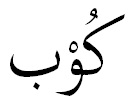
The word qawārīr is the plural of qārūra (“glass”, “crystal”).

The round symbol at the end of the verse tells reciters to not pronounce the alif if they continue their recitation to the next verse without pausing.
Verse 16

Glasses of silver, they measured with accurate measuring
Transliteration: qawārīra min fiḍḍatin qaddarū-hā taqdīrā
Pronunciation: qa-wā-rī-ra min fiḍ-ḍa-tin qad-da-rū-hā taq-dī-rā
Qawārīra (glasses, crystals) min (of) fiḍḍatin (silver) qaddarū-hā (they measured it) taqdīrā (a measuring).
Since qawārīr refers to a type of glass or crystal, “glasses of silver” may refer to a type of glass that has silver mixed with it. The mentioned measure may refer to the amount of drink in the vessel being perfectly measured to satisfy.
Verse 17

And in it they are watered [with] a cup [of wine] whose mixture is ginger
Transliteration: wa-yusqawna fī-hā kaʾsan kāna mizāju-hā zanjabīlā
Pronunciation: wa-yus-qaw-na fī-hā kaʾ-san kā-na mi-zā-ju-hā zan-ja-bī-lā
Wa-yusqawna (and they are fed liquid) fī-hā (in it, i.e. in the garden) kaʾsan (a cup) kāna (it was) mizāju-hā (its mixture) zanjabīlā (ginger).
The verb yusqawna is the plural passive form of saqā (“he watered”, “he fed someone a liquid”).

From right to left: he fed liquid [to someone]; he feeds liquid [to someone].
The word zanjabīl (“ginger”) may either refer to actual ginger (thus the wine is ginger-flavored), or it may be the name of a spring in Paradise.
Verse 18

A spring in it named Salsabīl
Transliteration: ʿaynan fī-hā tusammā salsabīlā
Pronunciation: ʿay-nan fī-hā tu-sam-mā sal-sa-bī-lā
ʿaynan (a spring) fī-hā (in it) tusammā (it is named) salsabīlā.
Verse 19

And circulate upon them immortal children; if you saw them you would think them scattered pearls
Transliteration: wa-yaṭūfu ʿalay-him wildānun mukhalladūna idhā raʾayta-hum ḥasibta-hum luʾluʾan manthūrā
Pronunciation: wa-ya-ṭū-fu ʿa-lay-him wil-dā-nun mu-khal-la-dū-na i-dhā ra-ʾay-ta-hum ḥa-sib-ta-hum luʾ-lu-ʾan man-thū-rā
Wa-yaṭūfu (and circulate) ʿalay-him (upon them) wildānun (children) mukhalladūna (immortalized) idhā (if) raʾayta-hum (you saw them) ḥasibta-hum (you thought them, you considered them, you assumed them to be) luʾluʾan (pearls) manthūrā (scattered).
The word wildān (“children”) is the plural of wilīd (“child”, “offspring”, literally “begotten [thing]”). While wildān is generally interpreted as “boys”, the gender is not specifically determined by the word. But in verse 52:24 the Quran refers to these same children as ghilmān (“boys”).
Verse 20

And if you saw in that direction, you will see a bliss and a great kingdom
Transliteration: wa-idhā raʾayta thamma raʾayta naʿīman wa-mulkan kabīrā
Pronunciation: wa-i-dhā ra-ʾay-ta tham-ma ra-ʾayta na-ʿī-man wa-mul-kan ka-bīrā
Wa-idhā (and if) raʾayta (you saw) thamma (in that direction) raʾayta (you saw) naʿīman (blessings, bliss) wa-mulkan (and a kingdom) kabīrā (large, great).
The word thamma means “in that direction”, “toward that direction”.
Lesson 36 Review

Fa-waqqā-humu (so He protected them) allāhu (God) sharra (the evil) dhālika (that) al-yawmi (day) wa-laqqā-hum (and caused them to meet with, granted them) naḍratan (radiance) wa-surūrā (and happiness).

Wa-jazā-hum (and He rewarded them with) bi-mā ṣabarū (for their patience) jannatan (a garden) wa ḥarīrā (and a silk, and silk).

Muttakiʾīna ([they are] reclining ones) fī-hā (in it) ʿalā (upon) al-arāʾiki (couches) la yarawna (they do not see) fī-hā (in it) shamsan (a sun) wa-lā (and not) zamharīrā (a freezing cold).

Wa-dāniyatan (and [are] near, and [are] within reach) ʿalay-him (upon them) ẓilāluḥā (its shades) wa-dhullila-t (and were lowered) quṭūfu-hā (its fruit clusters) tadhlīlā (an extreme lowering).

Wa-yuṭāfu (and is circulated) ʿalay-him (upon them) bi-āniyatin (with vessels) min (of) fiḍḍatin (silver) wa-akwābin (and cups) kānat (that were) qawārīrā (glass, crystal).

Qawārīra (glasses, crystals) min (of) fiḍḍatin (silver) qaddarū-hā (they measured it) taqdīrā (a measuring).

Wa-yusqawna (and they are fed liquid) fī-hā (in it, i.e. in the garden) kaʾsan (a cup) kāna (it was) mizāju-hā (its mixture) zanjabīlā (ginger).

ʿaynan (a spring) fī-hā (in it) tusammā (it is named) salsabīlā.

Wa-yaṭūfu (and circulate) ʿalay-him (upon them) wildānun (children) mukhalladūna (immortalized) idhā (if) raʾayta-hum (you saw them) ḥasibta-hum (you thought them, you considered them, you assumed them to be) luʾluʾan (pearls) manthūrā (scattered).

Wa-idhā (and if) raʾayta (you saw) thamma (in that direction) raʾayta (you saw) naʿīman (blessings, bliss) wa-mulkan (and a kingdom) kabīrā (large, great).
Lesson 37: al-Insān Part 3
Verse 21, part 1

Upon them is clothing of fine green silk and heavy brocade
Transliteration: ʿāliya-hum thiyābu sundusin khuḍrun wa-istabraq
Pronunciation: ʿā-li-ya-hum thi-yā-bu sun-du-sin khuḍ-run wa-is-tab-raq
ʿāliya-hum (upon them) thiyābu (clothing [of]) sundusin (fine silk) khuḍrun (green) wa-istabraq (and silk brocade).
The phrase ʿāliya-hum has lead to controversy because it literally means “their higher part”. Some consider it to be used here as a non-standard variant of ʿalay-him (“upon them”).
The word sundus means “fine silk”, while istabraq means “silk brocade”, a rich silk with raised patterns on it. The word khuḍr (“green ones”) is the plural of akhḍar, which means “green”.
Verse 21, part 2

And they were adorned with bracelets of silver and their Lord watered them with a pure drink
Transliteration: wa-ḥullū asāwira min fiḍḍatin wa-saqā-hum rabbu-hum sharāban ṭahūrā
Pronunciation: wa-ḥul-lū a-sā-wi-ra min fiḍ-ḍa-tin wa-sa-qā-hum rab-bu-hum sha-rā-ban ṭa-hū-rā
Wa-ḥullū (and they were adorned with) asāwira (bracelets) min (of) fiḍḍatin (silver) wa-saqā-hum (and He watered them) rabbu-hum (their Lord) sharāban (a drink) ṭahūrā (pure).
The verb ḥullū is the plural passive of ḥallā (“he adorned [with jewelry, etc.]”, “he placed decorations on [it]”).
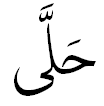
The word asāwir is the plural of aswira (“bracelet”, “bangle”).
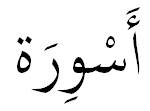
The word sharāb means “drink”, from the verb shariba (“he drank”).

From right to left: he drank; he drinks.
The word ṭahūr means “pure”, from the verb ṭahura (“it was pure”, “it became pure”).

From right to left: it was pure; it is pure; purity (two forms); pure (two forms).
Verse 22

Indeed this is for you a reward and your effort has been appreciated
Transliteration: inna hādha kāna la-kum jazāʾan wa-kāna saʿyu-kum mashkūrā
Pronunciation: in-na hā-dha kā-na la-kum ja-zā-ʾan wa-kā-na saʿ-yu-kum mash-kū-rā
Inna (indeed) hādha (this) kāna (was) la-kum (for you) jazāʾan (a reward) wa-kāna (and was) saʿyu-kum (your effort) mashkūrā (appreciated, thanked).
Verse 23

Indeed, We have truly sent down the Quran upon you [singular]
Transliteration: innā naḥnu nazzal-nā ʿalay-ka al-qurʾāna tanzīlā
Pronunciation: in-nā naḥ-nu naz-zal-nā ʿa-lay-kal-qur-ʾā-na tan-zī-lā
Innā naḥnu (indeed we) nazzal-nā (sent down) ʿalay-ka (upon you) al-qurʾāna (the Quran) tanzīlā (a sending down).
The word innā means “indeed, we” while naḥnu also means “we”. The additional naḥnu serves for emphasis. The phrase nazzal-nā…tanzīlā literally means “we sent it down…a sending down”, it serves for emphasis to repeat the same meaning in this way.
Verse 24

So be patient toward the judgment of your Lord and do not obey among them a sinner or rejecter
Transliteration: fa-iṣbir li-ḥukmi rabbi-ka wa-lā tuṭiʿ min-hum āthiman aw kafūrā
Pronunciation: faṣ-bir li-ḥuk-mi rab-bi-ka wa-lā tu-ṭiʿ min-hum ā-thi-man aw ka-fū-rā
Fa-iṣbir (so be patient) li (for, toward) ḥukmi (the judgment [of]) rabbi-ka (your Lord) wa-lā (and not) tuṭiʿ (you obey) min-hum (of them, among them) āthiman (a sinner) aw kafūrā (or a rejecter).
Verse 25

And remember the Name of your Lord morning and mid-afternoon
Transliteration: wa-udhkur isma rabbi-ka bukratan wa-aṣīlā
Pronunciation: wadh-kur is-ma rab-bi-ka buk-ra-tan wa-a-ṣī-lā
Wa-udhkur (and remember) isma (the name [of]) rabbi-ka (your Lord) bukratan (morning) wa-aṣīlā (and mid-afternoon).
The word bukra literally means “early”, “early in the day”. The word aṣīl refers to the time from the mid-afternoon until sunset.
Verse 26

And from the night, prostrate to Him and exalt Him a long [part of the] night
Transliteration: wa-mina al-layli fa-usjud la-hu wa-sabbiḥ-hu laylan ṭawīlā
Pronunciation: wa-mi-nal-lay-li fas-jud la-hu wa-sab-biḥ-hu lay-lan ṭa-wī-lā
Wa-mina (and of) al-layli (the night) fa-usjud la-hu (then prostrate yourself to Him) wa-sabbiḥ-hu (and exalt Him) laylan (a night) ṭawīlā (long).
Verse 27

Indeed those love the immediate [life] and leave behind them a grave day
Transliteration: inna hāʾulāʾi yuḥibbūna al-ʿājilata wa-yadharūna warāʾa-hum yawman thaqīlā
Pronunciation: in-na hā-ʾu-lā-ʾi yu-ḥib-bū-nal-ʿā-ji-la-ta wa-ya-dha-rū-na wa-rā-ʾa-hum yaw-man tha-qīlā
Inna (indeed) hāʾulāʾi (those) yuḥibbūna (they love) al-ʿājilata (the immediate) wa-yadharūna (and they leave) warāʾa-hum (behind them) yawman thaqīlā (a grave day).
The word thaqīl litearlly means “heavy”. Metaphorically it means “grave”, “serious and important”.
Verse 28

We created them and strengthened their forms, and when We wish we will exchange them for their like
Transliteration: naḥnu khalaqnā-hum wa-shadad-nā asra-hum wa-idhā shiʾ-nā baddal-nā amthāla-hum tabdīlā
Pronunciation: naḥ-nu kha-laq-nā-hum wa-sha-dad-nā as-ra-hum wa-i-dhā shiʾ-nā bad-dal-nā am-thā-la-hum tab-dī-lā
Naḥnu (We) khalaqnā-hum (We created them) wa-shadad-nā (and we strengthened) asra-hum (their form) wa-idhā (and when) shiʾ-nā (We wish, We will) baddal-nā (We exchange) amthāla-hum (their likes, their likeness) tabdīlā (a [true/real] exchanging).
Verse 29

Indeed this is a reminder, so whoever wishes takes a path to his Lord
Transliteration: inna hādhi-hi tadhkiratun fa-man shāʾa ittakhadha ilā rabbi-hi sabīlā
Pronunciation: in-na hā-dhi-hi tadh-ki-ra-tun fa-man shā-ʾat-ta-kha-dha ilā rab-bi-hi sa-bī-lā
Inna (indeed) hādhi-hi (this [is]) tadhkiratun (a reminder) fa-man (so who) shāʾa (wills, wishes) ittakhadha (takes) ilā (to) rabbi-hi (his Lord) sabīlā (a path).
Verse 30

And you do not will [anything] unless God wills [it]; indeed God is Knowing, Wise
Transliteration: wa-mā tashāʾūna illā an yashāʾa allāhu inna allāha kāna ʿalīman ḥakīmā
Pronunciation: wa-mā ta-shā-ʾū-na il-lā an ya-shā-ʾal-lā-hu in-nal-lā-ha kā-na ʿa-lī-man ḥa-kī-mā
Wa-mā (and not) tashāʾūna (you will) illā (except) an (that) yashāʾa (He wills) allāhu (God) inna (indeed) allāha (God) kāna (was/is) ʿalīman (Knowing) ḥakīmā (Wise, Decisive).
The meaning of this verse is that God is absolutely in charge; no human will can override God’s will.
Verse 31

He causes to enter whomever He wills into His mercy, and the wrongdoers—He has prepared for them a painful torment
Transliteration: yudkhilu man yashāʾu fī raḥmati-hi wa-al-ẓālimīna aʿadda la-hum ʿadhāban alīmā
Pronunciation: yud-khi-lu man ya-shā-ʾu fī raḥ-ma-ti-hi waẓ-ẓā-li-mī-na a-ʿad-da la-hum ʿa-dhā-ban a-lī-mā
Yudkhilu (He causes to enter) man (whomever) yashāʾu (He wills) fī (in, into) raḥmati-hi (His mercy) wa-al-ẓālimīna (and the wrongdoers, and the transgressers) aʿadda (He prepared) la-hum (for them) ʿadhāban (a torment) alīmā (painful).
Lesson 37 Review

ʿāliya-hum (upon them) thiyābu (clothing [of]) sundusin (fine silk) khuḍrun (green) wa-istabraq (and silk brocade).

Wa-ḥullū (and they were adorned with) asāwira (bracelets) min (of) fiḍḍatin (silver) wa-saqā-hum (and He watered them) rabbu-hum (their Lord) sharāban (a drink) ṭahūrā (pure).

Inna (indeed) hādha (this) kāna (was) la-kum (for you) jazāʾan (a reward) wa-kāna (and was) saʿyu-kum (your effort) mashkūrā (appreciated, thanked).

Innā naḥnu (indeed we) nazzal-nā (sent down) ʿalay-ka (upon you) al-qurʾāna (the Quran) tanzīlā (a sending down).

Fa-iṣbir (so be patient) li (for, toward) ḥukmi (the judgment [of]) rabbi-ka (your Lord) wa-lā (and not) tuṭiʿ (you obey) min-hum (of them, among them) āthiman (a sinner) aw kafūrā (or a rejecter).

Wa-udhkur (and remember) isma (the name [of]) rabbi-ka (your Lord) bukratan (morning) wa-aṣīlā (and mid-afternoon).

Wa-mina (and of) al-layli (the night) fa-usjud la-hu (then prostrate yourself to Him) wa-sabbiḥ-hu (and exalt Him) laylan (a night) ṭawīlā (long).

Inna (indeed) hāʾulāʾi (those) yuḥibbūna (they love) al-ʿājilata (the immediate) wa-yadharūna (and they leave) warāʾa-hum (behind them) yawman thaqīlā (a grave day).

Naḥnu (We) khalaqnā-hum (We created them) wa-shadad-nā (and we strengthened) asra-hum (their form) wa-idhā (and when) shiʾ-nā (We wish, We will) baddal-nā (We exchange) amthāla-hum (their likes, their likeness) tabdīlā (a [true/real] exchanging).

Inna (indeed) hādhi-hi (this [is]) tadhkiratun (a reminder) fa-man (so who) shāʾa (wills, wishes) ittakhadha (takes) ilā (to) rabbi-hi (his Lord) sabīlā (a path).

Wa-mā (and not) tashāʾūna (you will) illā (except) an (that) yashāʾa (He wills) allāhu (God) inna (indeed) allāha (God) kāna (was/is) ʿalīman (Knowing) ḥakīmā (Wise, Decisive).

Yudkhilu (He causes to enter) man (whomever) yashāʾu (He wills) fī (in, into) raḥmati-hi (His mercy) wa-al-ẓālimīna (and the wrongdoers, and the transgressers) aʿadda (He prepared) la-hum (for them) ʿadhāban (a torment) alīmā (painful).
Lesson 38: Maryam Part 1
This lesson is on chapter 19 of the Quran, which is titled Maryam (“Mary”), referring to Mary mother of Jesus (peace be upon him and his mother).
From this lesson on, we will no longer have separate pronunciations and transliterations underneath the Arabic. This is in order to save safe so that we can fit more verses into the remaining part of the book.

Verse 1

kā hā yā ʿayn ṣād
The first verse of this chapter starts with a number of disjoined letters that are pronounced as shown above. These letters do not have a meaning as far as we know. They are like musical tones that grab the listerner’s attention.
Verse 2

[This is] the mention of your Lord’s mercy toward His servant Zechariah
Dhikru (the mention [of]) raḥmati (the mercy [of]) rabbi-ka (your Lord [toward]) ʿabda-hu (His servant) zakarīyā (Zechariah).
The word raḥmati (“mercy [of]”) would be written as follows in standard Arabic:

The phrase raḥmati rabbi-ka means “the mercy of your Lord”, while the phrase raḥmati rabbi-ka ʿabda-hu means “the mercy of your Lord [toward] His servant” even though there is no explicit “toward” in the statement. It is something gleaned from the phrasing.
Verse 3

When he called his Lord [with a] a secret [act of] calling
Idh (when) nādā (he called) rabba-hu (his Lord) nidāʾan (an [act of] calling) khafīyā (secret).
Verse 4, part 1

He said, “My Lord, indeed the bones have weakened from me and my head has become kindled with grayness…”
Qāla (he said) rabbi (my Lord) in-nī (indeed I) wahana ([they] weakened) al-ʿaẓmu (the bones) min-nī (from me) wa-ishtaʿala (and it became kindled, and it got set on fire) al-raʾsu (the head) shaybā (grayness).
The word rabbi would be written as rabb-ī in standard Arabic.

In the Quran the ending yāʾ is removed for poetic effect.
The word ishtaʿala means “it became kindled”, “it started to burn”. The phrase ishtaʿala shayban “it became kindled with grayness” is a highly poetic express that means “the hairs went gray” (i.e. the person became old).
Verse 4, part 2

“and I have never been, in my supplication to you, unanswered.”
Wa-lam akun (and I was not) bi-duʿāʾi-ka (by Your supplication, i.e. by my supplication to You) rabbi (my Lord) shaqīyā (wretched, here meaning one whose supplication is ignored and unanswered).
The verb akun is the present tense form of kuntu (“I was”). But lam turns iti into the past tense, so lam akun means “I was not”).
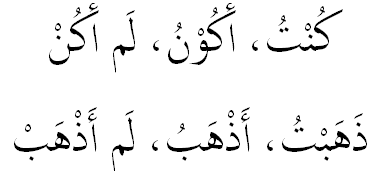
Top from right to left: I was; I am; I was not.
Bottom from right to left: I went, I go; I did not go.
Notice the way wāw in akūnu (first line, middle) is removed when the word is preceded by lam (first line, left). This is due to a rule of Arabic grammar that applies to words that have a vowel letter as their second letter. Here the word is kāna (when you look at it in the past tense), which has an alif as its second letter. Below is a different word that follows the same pattern:

From right to left: he died; I die; I did not die.
Verse 5, part 1

“And indeed I feared the cousins from behind me…”
Wa-innī (and indeed I) khif-tu (I feared) al-mawāliya (the cousins, the allies) min (from) warāʾ-ī (behind me).
The word mawālī is the plural of mawlā (“servant”, “slave”, “master”, “ally”, “close relative”). Here mawālī is thought to refer to paternal cousins. Here Zechariah is referring to his nation (the Children of Israel) as his cousins and says that he fears for their fate if they are left without a prophet to guide them after his death.
Verse 5, part 2

“and my wife was barren so grant me from Yourself a close ally.
Wa-kāna-t (and she was) imraʾat-ī (my woman) ʿāqiran (barren, infertile) fa-hab l-ī (so grant to me, so bestow upon me) min ladun-ka (from yourself) walīyā (a close ally).
The phrase min ladun-ka means “from yourself”. The word ladun implies that the thing mentioned is with the person mentioned, as in:

“I took a book from Ahmad”, literally “I took a book that was with Ahmad”, “I took a book from the possession of Ahmad”.
Verse 6

“He will inherit me and inherit from the family of Jacob, and make him, my Lord, pleasing [to You].
Yarithu-nī (he inherits me) wa-yarithu (and he inherits) min (from) āli (the family of, the household of) yaʿqūba (Jacob) wa-ijʿal-hu (and make him) rabbi (my Lord) raḍīyā (pleasing).
Yarithu means “he inherits”, i.e. “he becomes the inheritor [of someone or something]”.
Verse 7

“O Zechariah, indeed We give you the good tidings of a boy whose name is John—we never made for him before that a named one.”
Yā-zakarīyā (O Zechariah!) in-nā (indeed we) nubashshiru-ka (we give you glad tidings) bi-ghulāmin (by a boy, about a boy) ismu-hu (his name [is]) yaḥyā (John) lam najʿal (we did not make, we did not assign) la-hu (for him) min qablu (before) samīyā (a named [person]).
Here God responds to Zechariah’s prayer by giving him the good news of a boy that will be born to him whose name was never before used by anyone.
Verse 8

He said, “My Lord, how can there be for me a boy while my wife was barren and I have reached of old age an extreme?
Qāla (he said) rabbi (my Lord) annā (how can) yakūnu (there is, there be) l-ī (for me) ghulāmun (a boy) wa-kāna-t (and she was) imraʾatī (my woman) ʿāqiran (barren) wa-qad (and have) balaghtu (I reached) min (from) al-kibari (oldness, old age) ʿitīyā (an extreme).
The word ʿitī is the gerund (maṣdar) of ʿatā (“he transgressed”, “he went to an extreme”).

Verse 9

He said, “Thus [it will be]; your Lord said ‘It is easy on me and I created you from before while you were nothing.’”
Qāla (he said) ka-dhālika (thus, like that) qāla (he said) rabbu-ka (your Lord) huwa (it [is]) ʿalay-ya (upon me) hayyinun (easy) wa-qad (and have) khalaq-tu-ka (I created you) min (from) qablu (before) wa (while) lam taku (you were not) shayʾan (a thing).
The word taku is a short form of takun.
The speaker here may be an angel who says that God said such and such.
Lesson 38 Review


kā hā yā ʿayn ṣād

Dhikru (the mention [of]) raḥmati (the mercy [of]) rabbi-ka (your Lord [toward]) ʿabda-hu (His servant) zakarīyā (Zechariah).

Idh (when) nādā (he called) rabba-hu (his Lord) nidāʾan (an [act of] calling) khafīyā (secret).

Qāla (he said) rabbi (my Lord) in-nī (indeed I) wahana ([they] weakened) al-ʿaẓmu (the bones) min-nī (from me) wa-ishtaʿala (and it became kindled, and it got set on fire) al-raʾsu (the head) shaybā (grayness).

Wa-lam akun (and I was not) bi-duʿāʾi-ka (by Your supplication, i.e. by my supplication to You) rabbi (my Lord) shaqīyā (wretched, here meaning one whose supplication is ignored and unanswered).

Wa-innī (and indeed I) khif-tu (I feared) al-mawāliya (the cousins, the allies) min (from) warāʾ-ī (behind me).

Wa-kāna-t (and she was) imraʾat-ī (my woman) ʿāqiran (barren, infertile) fa-hab l-ī (so grant to me, so bestow upon me) min ladun-ka (from yourself) walīyā (a close ally).

Yarithu-nī (he inherits me) wa-yarithu (and he inherits) min (from) āli (the family of, the household of) yaʿqūba (Jacob) wa-ijʿal-hu (and make him) rabbi (my Lord) raḍīyā (pleasing).

Yā-zakarīyā (O Zechariah!) in-nā (indeed we) nubashshiru-ka (we give you glad tidings) bi-ghulāmin (by a boy, about a boy) ismu-hu (his name [is]) yaḥyā (John) lam najʿal (we did not make, we did not assign) la-hu (for him) min qablu (before) samīyā (a named [person]).

Qāla (he said) rabbi (my Lord) annā (how can) yakūnu (there is, there be) l-ī (for me) ghulāmun (a boy) wa-kāna-t (and she was) imraʾatī (my woman) ʿāqiran (barren) wa-qad (and have) balaghtu (I reached) min (from) al-kibari (oldness, old age) ʿitīyā (an extreme).

Qāla (he said) ka-dhālika (thus, like that) qāla (he said) rabbu-ka (your Lord) huwa (it [is]) ʿalay-ya (upon me) hayyinun (easy) wa-qad (and have) khalaq-tu-ka (I created you) min (from) qablu (before) wa (while) lam taku (you were not) shayʾan (a thing).
Lesson 39: Maryam Part 2
Verse 10

He said, “My Lord, assign for me a sign.” He said, “Your sign is that you will not speak to people for three nights, [being] sound”.
Qāla (he said) rabbi (my Lord) ijʿal (make, assign) l-ī (for me) āyatan (a sign) qāla (he said) āyatu-ka (your sign [is]) allā (to not) tukallima (you talk to) al-nāsa (the people) thalātha (three) layālin (nights) sawīyā ([while being] sound).
The word sawī at the end means that Zechariah will not be speaking to people despite being sound and not suffering from an illness that causes you to be unable to speak. It may also refer to the nights, meaning they will be three sound and complete nights.
Verse 11

He went out to his people from the prayer chamber then signalled to them that “Exalt [God] morning and evening.”
Fa-kharaja (so he went out) ʿalā (upon) qawmi-hi (his people) min (from) al-miḥrābi (the prayer chamber) fa-awḥā (so he signaled) ilay-him (to them) an (that) sabbi-ḥū (exalt [God]) bukratan (morning) wa-ʿashīyā (and evening).
The word awḥā means “he signaled”, “he inspired”. It is also used in the Quran to refer to God revealing his Revelation to prophets. ʿashī refers to the time of day from sunset until the night becomes completely dark about an hour and a half later. The word ʿishāʾ comes from the same root and refers to the same time period. The ʿishāʾ prayer is the last of the five daily prayers in Islam and is prayed at the very end of ʿashī when the night has become completely dark.
Verse 12

“O John! Grasp the Book with strength!” and we gave him wise judgment as a child
Yā-yaḥyā (O John) khudh (take, grasp) al-kitāba (the Book, i.e. the scripture) bi-quwwatin (with strength) wa-ātaynā-hu (and we gave him) al-ḥukma (judgment, wise judgment) ṣabīyā ([as] a child).
Verse 13

And [we gave Him] an affection form us, and a purity, and he was God-fearing
Wa-ḥanānan (and an affection) min ladun-nā (from us) wa-zakātan (and a purity) wa-kāna (and he was) taqīyā (God-fearing).
Verse 14

And dutiful to his parents, and he was not a disobedient tyrant
Wa-barran (and a dutiful one) bi-wāliday-hi (toward his parents) wa-lam (and not) yakun (he is) jabbāran (a tyrant) ʿaṣīyā (disobedient).
Verse 15

And peace be upon him the day he was born, the day he will die, and the day he is raised back to life
Wa-salāmun (and a peace [is/will be/be], and a salutation [is/will be/be]) ʿalay-hi (upon him) yawma (the day) wulida (he was born) wa-yawma (and the day) yamūtu (he dies) wa-yawma (and the day) yubʿathu (he is raised, he is revivified) ḥayyā (alive).
Verse 16

And remember in the Book Mary, when she withdrew, from her family, to an easterly place
Wa-udhkur (and remember) fī (in) al-kitābi (the Book) maryama (Mary) idh (in) intabadha-t (she withdrew to) min (from) ahli-hā (her family) makānan (a place) sharqīyā (easterly, i.e. located in the east or east-facing).
Verse 17

So she took up, away from them, a screen. So we sent to her Our Spirit so he assumed toward her the likeness of a proper human
Fa-ittakhadha-t (so she took up, so she adopted) min dūni-him (apart from them) ḥijāban (a screen) fa-arsalnā (so we sent) ilay-hā (to her) rūḥa-nā (Our Spirit) fa-tamaththala (so he adopted the likeness [of]) la-hā (for her) basharan (a human) sawīyā (proper, sound).
Verse 18

She said, “Indeed I seek protection with the most Gracious from you, if you are God-fearing.”
Qāla-t (she said) in-nī (indeed I) aʿūdhu (I seek protection) bi-al-raḥmāni (with the most Gracious, by the most Gracious) min-ka (from you) in (if) kun-ta (you are) taqīyā (God-fearing).
Verse 19

He said, “Indeed I am only the messenger of your Lord, to grant you a pure boy.”
Qāla (he said) inna-mā ana (indeed I am only) rasūlu (the messenger [of]) rabbi-ki (your Lord) li-ahaba (to bestow, to grant) la-ki (to you) ghulāman (a boy) zakīyā (pure).
The phrases rabbi-ki and la-ki both have the ending yāʾ removed for poetic effect.
Verse 20

She said, “How can there be for me a boy while no human has touched me and I was not an unchaste [woman]?
Qāla-t (she said) annā (how can) yakūnu (there will be) l-ī (for me) ghulāmun (a boy) wa-lam (while did not) yamsas-nī (touch me) basharun (a human) wa-lam (and was not) aku (I was) baghīyā (an unchaste woman, a harlot).
Lesson 39 Review

Qāla (he said) rabbi (my Lord) ijʿal (make, assign) l-ī (for me) āyatan (a sign) qāla (he said) āyatu-ka (your sign [is]) allā (to not) tukallima (you talk to) al-nāsa (the people) thalātha (three) layālin (nights) sawīyā ([while being] sound).

Fa-kharaja (so he went out) ʿalā (upon) qawmi-hi (his people) min (from) al-miḥrābi (the prayer chamber) fa-awḥā (so he signaled) ilay-him (to them) an (that) sabbi-ḥū (exalt [God]) bukratan (morning) wa-ʿashīyā (and evening).

Yā-yaḥyā (O John) khudh (take, grasp) al-kitāba (the Book, i.e. the scripture) bi-quwwatin (with strength) wa-ātaynā-hu (and we gave him) al-ḥukma (judgment, wise judgment) ṣabīyā ([as] a child).

Wa-ḥanānan (and an affection) min ladun-nā (from us) wa-zakātan (and a purity) wa-kāna (and he was) taqīyā (God-fearing).

Wa-barran (and a dutiful one) bi-wāliday-hi (toward his parents) wa-lam (and not) yakun (he is) jabbāran (a tyrant) ʿaṣīyā (disobedient).

Wa-salāmun (and a peace [is/will be/be], and a salutation [is/will be/be]) ʿalay-hi (upon him) yawma (the day) wulida (he was born) wa-yawma (and the day) yamūtu (he dies) wa-yawma (and the day) yubʿathu (he is raised, he is revivified) ḥayyā (alive).
Lesson 40: Maryam Part 3
Verse 21, part 1

He said, “[It is] thus. Your Lord said, ‘It is easy for me…’”
Qāla (he said) ka-dhāliki (thus, like that) qāla (He said) rabbu-ki (your Lord) huwa (it [is]) ʿalay-ya (on me) hayyinun (easy).
Verse 21, part 2

“and to make him a sign for the people and a mercy from us. It is a matter decreed.”
Wa (and) li (to) najʿala-hu (we make him) āyatan (a sign) li-al-nāsi (for the people) wa-raḥmatan (and a mercy) min-nā (from us) wa-kāna (and it was) amran (a matter) maqḍīyā (decreed).

From right to left: he decreed; he decrees; decree!; to decree (two forms); decreer (also means judge); that which has been decreed.
Verse 22

So she carried him then withdrew, with him, to a remote place
Fa-ḥamala-t-hu (so she carried him) fa-intabadha-t (so she withdrew to) bi-hi (with him) makānan (a place) qaṣīyā (remote).
Verse 23, part 1

So the pains of childbirth drove her to the trunk of the date-palm
Fa-ajāʾa-hā (so it drove her, so it caused her to go) al-makhāḍu (the pains of childbirth) ilā (to) jazʿi (the trunk [of]) al-nakhlati (the date-palm).
Verse 23, part 2

She said, “Oh I wish I had died before this and I was abandoned, forgotten.”
Qāla-t (she said) yā-layta-nī (Oh I wish I had) mit-tu (I died) qabla (before) hādhā (this) wa-kun-tu (and I was) nasyan (an abandoned and thrown away thing) mansīyā (a forgotten thing).
Verse 24

So he called her from below her that “Do not grieve, your Lord truly has placed beneath you a stream.”
Fa-nādā-hā (so he called her) min taḥti-hā (from beneath her) al-lā (that do not) taḥza-nī (you grieve) qad (truly has) jaʿala (He placed) rabbu-ki (your Lord) taḥtaki (beneath you) sarīyā (a stream).
Verse 25

And shake toward you the trunk of the date-palm, it will drop upon you fresh, ripe dates
Wa-huzz-ī (and shake) ilay-ki (toward you) bi-jidhʿi (the trunk) al-nakhlati (the date-palm) tusāqiṭ (it drops) ʿalay-ki (on you) ruṭaban (fresh dates) janīyā (ripe).
Verse 26, part 1

“So eat, drink, and gain consolation. And if you see from humanity anyone…”
Fa-kul-ī (so eat) wa-ishrab-ī (and drink) wa-qarr-ī ʿaynan (and gain consolation) fa-immā (and if) tarayinna (you see) mina (from) al-bashari (humans, humanity) aḥadā (a one, anyone).
The phrase qarr-ī ʿaynan literally means “let your eyes become cool”, “cool your eyes”. It is a phrase that means to gain consolation by observing someone you love. Here she is being asked to interact with the infant in order to console herself with the love she will feel for it.
The word tarayinna is originally tarayna with the nūn of emphasis (something we have not seen before) added to its end:

Below is another example of the use of the emphatic nūn:

Verse 26, part 2

Then say, “Indeed I have vowed to the Most Gracious a fast, so I will not speak with any human today.”
Fa-qūl-ī (then say) in-nī (indeed I) nadhar-tu (I vowed) li-al-raḥmāni (to the Most Gracious) ṣawman (a fast [from speaking]) fa-lan (so will not) ukallima (I speak with) al-yawma (today) insīyā (one of humankind).
Verse 27

So she brought him to her people, carrying him. They said, “O Mary, you have truly brought a tremendous thing.”
Fa-ata-t bi-hi (so she brought him) qawma-hā ([to] her people) taḥmilu-hu (she carries him) qālū (they said) ya-maryamu (O Mary) la-qad (truly have) jiʾti (you have brought) shayʾan (a thing) farīyā (tremendous).
The word qawm means “kinsfolk”, “[one’s] people”, “nation”.
Verse 28

“O sister of Aaron, your father was not a man of evil nor was your mother an unchatse woman.”
Yā-ukhta (O sister [of]) hārūna (Aaron) mā kāna (was not) abū-ki (your father) imraʾa (a man [of]) sūʾin (evil) wa-mā kāna-t (and was not) ummi-ki (your mother) baghīyā (an unchaste woman).
Verse 29

So she pointed to him. They said, “How do we speak with one who is a child, in the cradle?”
Fa-ashāra-t (so she pointed) ilay-hi (to him) qālū (they said) kayfa (how do) nukallimu (we speak with) man (one who) kāna (was) fī (in) al-mahdi (the cradle) ṣabīyā (a child).
Lesson 40 Review

Wa-udhkur (and remember) fī (in) al-kitābi (the Book) maryama (Mary) idh (in) intabadha-t (she withdrew to) min (from) ahli-hā (her family) makānan (a place) sharqīyā (easterly, i.e. located in the east or east-facing).

Fa-ittakhadha-t (so she took up, so she adopted) min dūni-him (apart from them) ḥijāban (a screen) fa-arsalnā (so we sent) ilay-hā (to her) rūḥa-nā (Our Spirit) fa-tamaththala (so he adopted the likeness [of]) la-hā (for her) basharan (a human) sawīyā (proper, sound).

Qāla-t (she said) in-nī (indeed I) aʿūdhu (I seek protection) bi-al-raḥmāni (with the most Gracious, by the most Gracious) min-ka (from you) in (if) kun-ta (you are) taqīyā (God-fearing).

Qāla (he said) inna-mā ana (indeed I am only) rasūlu (the messenger [of]) rabbi-ki (your Lord) li-ahaba (to bestow, to grant) la-ki (to you) ghulāman (a boy) zakīyā (pure).

Qāla-t (she said) annā (how can) yakūnu (there will be) l-ī (for me) ghulāmun (a boy) wa-lam (while did not) yamsas-nī (touch me) basharun (a human) wa-lam (and was not) aku (I was) baghīyā (an unchaste woman, a harlot).

Qāla (he said) ka-dhāliki (thus, like that) qāla (He said) rabbu-ki (your Lord) huwa (it [is]) ʿalay-ya (on me) hayyinun (easy).

Wa (and) li (to) najʿala-hu (we make him) āyatan (a sign) li-al-nāsi (for the people) wa-raḥmatan (and a mercy) min-nā (from us) wa-kāna (and it was) amran (a matter) maqḍīyā (decreed).

Fa-ḥamala-t-hu (so she carried him) fa-intabadha-t (so she withdrew to) bi-hi (with him) makānan (a place) qaṣīyā (remote).

Fa-ajāʾa-hā (so it drove her, so it caused her to go) al-makhāḍu (the pains of childbirth) ilā (to) jazʿi (the trunk [of]) al-nakhlati (the date-palm).

Qāla-t (she said) yā-layta-nī (Oh I wish I had) mit-tu (I died) qabla (before) hādhā (this) wa-kun-tu (and I was) nasyan (an abandoned and thrown away thing) mansīyā (a forgotten thing).

Fa-nādā-hā (so he called her) min taḥti-hā (from beneath her) al-lā (that do not) taḥza-nī (you grieve) qad (truly has) jaʿala (He placed) rabbu-ki (your Lord) taḥtaki (beneath you) sarīyā (a stream).

Wa-huzz-ī (and shake) ilay-ki (toward you) bi-jidhʿi (the trunk) al-nakhlati (the date-palm) tusāqiṭ (it drops) ʿalay-ki (on you) ruṭaban (fresh dates) janīyā (ripe).

Fa-kul-ī (so eat) wa-ishrab-ī (and drink) wa-qarr-ī ʿaynan (and gain consolation) fa-immā (and if) tarayinna (you see) mina (from) al-bashari (humans, humanity) aḥadā (a one, anyone).

Fa-qūl-ī (then say) in-nī (indeed I) nadhar-tu (I vowed) li-al-raḥmāni (to the Most Gracious) ṣawman (a fast [from speaking]) fa-lan (so will not) ukallima (I speak with) al-yawma (today) insīyā (one of humankind).

Fa-ata-t bi-hi (so she brought him) qawma-hā ([to] her people) taḥmilu-hu (she carries him) qālū (they said) ya-maryamu (O Mary) la-qad (truly have) jiʾti (you have brought) shayʾan (a thing) farīyā (tremendous).

Yā-ukhta (O sister [of]) hārūna (Aaron) mā kāna (was not) abū-ki (your father) imraʾa (a man [of]) sūʾin (evil) wa-mā kāna-t (and was not) ummi-ki (your mother) baghīyā (an unchaste woman).

Fa-ashāra-t (so she pointed) ilay-hi (to him) qālū (they said) kayfa (how do) nukallimu (we speak with) man (one who) kāna (was) fī (in) al-mahdi (the cradle) ṣabīyā (a child).
Lesson 41: Maryam Part 4
Verse 30

He [the infant Jesus] said, “Indeed I am the servant of God. He has given me the Book and made me a prophet.”
Qāla (he said) in-nī (indeed I [am]) ʿabdu (the servant [of]) allāhi (God) ātāni (He gave me) al-kitāba (the Book) wa-jaʿala-nī (and He made me) nabīyā (a prophet).
Verse 31

And He made me blessed wherever I am and enjoined on me the prayer and the zakah as long as I remain alive
Wa-jaʿala-nī (and He made me) mubārakan (a blessed [one]) ayna mā (wherever) kun-tu (I was) wa-awṣā-nī (and He enjoined on me) bi-al-ṣalāti (the prayer) wa-al-zakāti (the zakah) mā dum-tu (as long as I remain) ḥayyā (alive).
The phrase dum-tu means “I remained”. The phrase mā dum-tu means “as long as I remained”, “while I remained”.
Verse 32

And dutiful to my mother and He did not make me a wretched tyrant
Wa-barran (and a dutiful one) bi-wālida-tī (to my mother) wa-lam (and did not) yajʿal-nī (He made me) jabbāran (a tyrant) shaqīyā (a wretched one).
Verse 33

And peace is on me the day I was born, the day I die and the die I will be raised back to life
Wa-al-salāmu (and peace [is]) ʿalay-ya (upon me) yawma (the day) wulid-tu (I was born) wa-yawma (and the day) amū-tu (I die) wa-yawma (and the day) ubʿathu (I am raised back) ḥayyā (alive).
Verse 34

That is Jesus son of Mary, the word of truth about which they dispute
Dhālika (that is) ʿīsā ibni maryama (Jesus son of Mary) qawla (the word [of]) al-ḥaqqi (the truth) alladhī (which) fī-hi (in it) yamtarūn (they dispute).
Verse 35, part 1

It is not befitting for God to take a son, exalted and pure is He [above such a thing]!
Mā kāna (it was not) li-llāhi (for God) an (to) yattakhidha (take) waladin (a son) subḥānah (exalted and pure is He!).
Verse 35, part 2

If He decrees a matter, truly He only says to it “Be!” and it is.
Idhā (if) qaḍā (He decreed) amran (a matter) fa-inna-mā (then truly [He] only) yaqūlu (He says) la-hu (to it) kun (be!) fa-yakūn (and it is).
Verse 36

[Jesus said,] “And indeed God is my Lord and your [plural] Lord so worship Him, this is a straight path
Wa-inna (and indeed) allāha (God [is]) rabb-ī (my Lord) wa-rabbu-kum (and your Lord) fa-uʿbudu-hu (so worship him) hādhā (this [is]) ṣirātun (a path) mustaqīm (straight).
Verse 37

So the factions differed between themselves. So woe to those who denied from the scene of a tremendous day
Fa-ikhtalafa (so they differed, so they disagreed) l-aḥzābu (the factions, the parties) min (from) bayni-him (between them) fa-waylun (so woe) li-alladhīna (to those who) kafarū (denied) min (from) mashhadi (the scene [of]) yawmin (a day) ʿaḍīm (tremendous, great).
Verse 38

How hearing and how seeing the day they come to us! But the wrongdoers today are in a clear error
Asmiʿ bi-him (how hearing!) wa abṣir (and how seeing!) yawma (the day) yaʿtūna-nā (they come to us) lākini (but) al-ẓālimuna (the wrongdoers, the oppressors) al-yawma (today [are]) fī (in) ḍalālin (error, misguidance) mubīn (clear).
The word asmiʿ means “more hearing”, “most hearing”. The phrase asmiʿ bi is an exclamation that means “how hearing!” (i.e. how able to hear they are!). The same applies to abṣir bi.
Verse 39

And warn them about the day of regret when the matter is decreed, while they are in obliviousness and while they do not believe
Wa-andhir-hum (and warn them about) yawma (the day [of]) al-ḥasrati (grief) idh (when) quḍiya (it was decreed) al-amru (the matter) wa-hum (while they [are]) fī (in) ghaflatin (obliviousness) wa-hum (and they) lā yuʿminūn (do not believe).
Lesson 41 Review

Qāla (he said) in-nī (indeed I [am]) ʿabdu (the servant [of]) allāhi (God) ātāni (He gave me) al-kitāba (the Book) wa-jaʿala-nī (and He made me) nabīyā (a prophet).

Wa-jaʿala-nī (and He made me) mubārakan (a blessed [one]) ayna mā (wherever) kun-tu (I was) wa-awṣā-nī (and He enjoined on me) bi-al-ṣalāti (the prayer) wa-al-zakāti (the zakah) mā dum-tu (as long as I remain) ḥayyā (alive).

Wa-barran (and a dutiful one) bi-wālida-tī (to my mother) wa-lam (and did not) yajʿal-nī (He made me) jabbāran (a tyrant) shaqīyā (a wretched one).

Wa-al-salāmu (and peace [is]) ʿalay-ya (upon me) yawma (the day) wulid-tu (I was born) wa-yawma (and the day) amū-tu (I die) wa-yawma (and the day) ubʿathu (I am raised back) ḥayyā (alive).

Dhālika (that is) ʿīsā ibni maryama (Jesus son of Mary) qawla (the word [of]) al-ḥaqqi (the truth) alladhī (which) fī-hi (in it) yamtarūn (they dispute).

Mā kāna (it was not) li-llāhi (for God) an (to) yattakhidha (take) waladin (a son) subḥānah (exalted and pure is He!).

Idhā (if) qaḍā (He decreed) amran (a matter) fa-inna-mā (then truly [He] only) yaqūlu (He says) la-hu (to it) kun (be!) fa-yakūn (and it is).

Wa-inna (and indeed) allāha (God [is]) rabb-ī (my Lord) wa-rabbu-kum (and your Lord) fa-uʿbudu-hu (so worship him) hādhā (this [is]) ṣirātun (a path) mustaqīm (straight).

Fa-ikhtalafa (so they differed, so they disagreed) l-aḥzābu (the factions, the parties) min (from) bayni-him (between them) fa-waylun (so woe) li-alladhīna (to those who) kafarū (denied) min (from) mashhadi (the scene [of]) yawmin (a day) ʿaḍīm (tremendous, great).

Asmiʿ bi-him (how hearing!) wa abṣir (and how seeing!) yawma (the day) yaʿtūna-nā (they come to us) lākini (but) al-ẓālimuna (the wrongdoers, the oppressors) al-yawma (today [are]) fī (in) ḍalālin (error, misguidance) mubīn (clear).

Wa-andhir-hum (and warn them about) yawma (the day [of]) al-ḥasrati (grief) idh (when) quḍiya (it was decreed) al-amru (the matter) wa-hum (while they [are]) fī (in) ghaflatin (obliviousness) wa-hum (and they) lā yuʿminūn (do not believe).
Lesson 42: Maryam Part 5
Verse 40

Indeed we inherit the earth and those on it and to us they return
Innā (indeed we) naḥnu (we) narithu (we inherit) al-arḍa (the earth) wa-man (and [those] who [are]) ʿalay-hā (on it) wa-ilay-nā (and to us) yurjaʿūn (they return).
Verse 41

And mention in the Book Abraham; indeed he was a man of truth, a prophet
Wa-udhkur (and mention) fī al-kitābi (in the Book) ibrāhīma (Abrahm) inna-hu (indeed he) kāna (was) ṣiddīqan (a man of truth) nabīyā (a prophet).
Verse 42

When he said to his father, “O my father, why do you worship that which does not hear, does not see and does not benefit you at all?”
Idh qāla (when he said) li-abīhi (to his father) yā abati (O my father) li-ma (for what) taʿbudu (you worship) mā lā (what does not) yasmaʿu (hears) wa-lā (and does not) yubṣiru (sees) wa-lā yughnī ʿanka (and does not benefit you) shayʾā (anything).
The verb yughnī means “it makes him needless”, “it makes him rich”, while the phrase yughnī ʿan means “it benefits him”.
Verse 43

“O my father, indeed it has come to me of knowledge what has not come to you so follow me, I will guide you to a proper path.”
Yā abati (O my father) in-nī (indeed I) qad jāʾa-nī (it has come to me) mina (from) al-ʿilmi (knowledge) mā lam (that which did not) yaʾti-ka (it comes to you) fa-ittabiʿ-nī (so follow me) ahdi-ka (I guide you [to]) ṣiraṭan (a path) sawīyā (proper, sound).
Verse 44

“O my father, do not worship Satan. Indeed Satan is toward the Most Gracious disobedient.”
Yā-abati (O my father) la (do not) taʿbudi (you worship) al-shayṭan (Satan, the devil) inna (indeed) al-shayṭana (Satan, the devil) kāna (was) li-al-raḥmāni (to the most Gracious) ʿaṣīyā (disobedient).
Verse 45

“O my father, I fear that a torment may touch you from the Most Gracious so that you will be a companion to Satan.”
Yā-abati (O my father) in-nī (indeed I) akhāfu (I fear) an (that) yamassa-ka (it touches you) ʿadhābun (a torment) mina al-raḥmāni (from the Most Gracious) fa-takūna (so that you are, so that you will be) li-al-shayṭāni (to Satan) walīyā (a companion, a close ally).
Verse 46

Are you desireless toward my gods O Abraham? If you do not stop truly I will stone you, and leave me for a long time.
Qāla (he said) a-rāghibun (are you desirious) anta (you) ʿan (away [from]) ālihat-ī (my gods) yā ibrāhīm (O Abraham) la-in (truly if) lam (do not) tantahi (you stop) la-arjumanna-ka (I will truly stone you) wa-uhjur-nī (and leave me) malīyā (prolongedly).
The word rāghib means “one who desires”. But the phrase rāghibun…ʿan means “desirious away [from]”, meaning undesirious. The word arjumanna (“I truly stone”) is arjuma (“I stone”) with the emphatic nūn added to it.
Verse 47

He said, “Peace be upon you. I will seek forgiveness for you from my Lord, He was toward me gracious.”
Qāla (he said) salāmun (peace [be]) ʿalay-ka (upon you) sa-astaghfiru (I will seek forgiveness [from]) la-ka (for you) rabb-ī (my Lord) inna-hu (indeed He) kāna (was) b-ī (to me) ḥafīyā (a gracious One).
Verse 48

“And I leave you and what you call besides God and I call my Lord, perhaps I will not be regarding my prayer to my Lord wretched.”
Wa-aʿtazilu-kum (and I leave you, and I cut off myself from you) wa-mā (and what) tadʿūna (you call) min dūni (apart from, besides, without) allāhi (God) wa-adʿū (and I call) rabb-ī (my Lord) ʿasā (perhaps) allā (that will not) akūna (I am, I [will] be) bi-duʿāʾi (regarding my prayer [to]) rabb-ī (my Lord) shaqīyā (wretched).
Here Abrahm says he will leave them so that perhaps his prayers will not go unanswered. Since in the previous verse he said he would pray for his father to be forgiven, here he may be saying that by abandoning these people, he hopes his prayer for his father’s forgiveness will be accepted.
Verse 49

So when he left them and what they worship besides God We gave to him Isaac and Jacob, and each we made a prophet.
Fa-lammā (so when, so once) iʿtazala-hum (he left them, he cut off himself from them) wa-mā (and what) yaʿbudūna (they worship) min dūni (without, apart from) allāhi (God) wahab-nā (we granted, we bestowed) la-hū (to him) isḥāqā (Isaac) wa-yaʿqūba (and Jacob) wa-kullan (and each, and everyone) jaʿal-nā (we made) nabīyā (a prophet).
Verse 50

And We granted them of our mercy and made for them a reputation of high honor
Wa-wahab-nā (and We granted) la-hum (to them) min (from) raḥmati-nā (Our mercy) wa-jaʿal-nā (and We made) la-hum (for them) lisāna ṣidqin ʿalīyā (a true reputation of high honor).
The word lisān means “tongue”, ṣidq means “truthfulness” and ʿalī means “high”, “exalted”. The phrase lisāna ṣidqin means “a truthful mention”, “a true reputation”.
Lesson 42 Review

Innā (indeed we) naḥnu (we) narithu (we inherit) al-arḍa (the earth) wa-man (and [those] who [are]) ʿalay-hā (on it) wa-ilay-nā (and to us) yurjaʿūn (they return).

Wa-udhkur (and mention) fī al-kitābi (in the Book) ibrāhīma (Abrahm) inna-hu (indeed he) kāna (was) ṣiddīqan (a man of truth) nabīyā (a prophet).

Idh qāla (when he said) li-abīhi (to his father) yā abati (O my father) li-ma (for what) taʿbudu (you worship) mā lā (what does not) yasmaʿu (hears) wa-lā (and does not) yubṣiru (sees) wa-lā yughnī ʿanka (and does not benefit you) shayʾā (anything).

Yā abati (O my father) in-nī (indeed I) qad jāʾa-nī (it has come to me) mina (from) al-ʿilmi (knowledge) mā lam (that which did not) yaʾti-ka (it comes to you) fa-ittabiʿ-nī (so follow me) ahdi-ka (I guide you [to]) ṣiraṭan (a path) sawīyā (proper, sound).

Yā-abati (O my father) la (do not) taʿbudi (you worship) al-shayṭan (Satan, the devil) inna (indeed) al-shayṭana (Satan, the devil) kāna (was) li-al-raḥmāni (to the most Gracious) ʿaṣīyā (disobedient).

Yā-abati (O my father) in-nī (indeed I) akhāfu (I fear) an (that) yamassa-ka (it touches you) ʿadhābun (a torment) mina al-raḥmāni (from the Most Gracious) fa-takūna (so that you are, so that you will be) li-al-shayṭāni (to Satan) walīyā (a companion, a close ally).

Qāla (he said) a-rāghibun (are you desirious) anta (you) ʿan (away [from]) ālihat-ī (my gods) yā ibrāhīm (O Abraham) la-in (truly if) lam (do not) tantahi (you stop) la-arjumanna-ka (I will truly stone you) wa-uhjur-nī (and leave me) malīyā (prolongedly).

Qāla (he said) salāmun (peace [be]) ʿalay-ka (upon you) sa-astaghfiru (I will seek forgiveness [from]) la-ka (for you) rabb-ī (my Lord) inna-hu (indeed He) kāna (was) b-ī (to me) ḥafīyā (a gracious One).

Wa-aʿtazilu-kum (and I leave you, and I cut off myself from you) wa-mā (and what) tadʿūna (you call) min dūni (apart from, besides, without) allāhi (God) wa-adʿū (and I call) rabb-ī (my Lord) ʿasā (perhaps) allā (that will not) akūna (I am, I [will] be) bi-duʿāʾi (regarding my prayer [to]) rabb-ī (my Lord) shaqīyā (wretched).

Fa-lammā (so when, so once) iʿtazala-hum (he left them, he cut off himself from them) wa-mā (and what) yaʿbudūna (they worship) min dūni (without, apart from) allāhi (God) wahab-nā (we granted, we bestowed) la-hū (to him) isḥāqā (Isaac) wa-yaʿqūba (and Jacob) wa-kullan (and each, and everyone) jaʿal-nā (we made) nabīyā (a prophet).

Wa-wahab-nā (and We granted) la-hum (to them) min (from) raḥmati-nā (Our mercy) wa-jaʿal-nā (and We made) la-hum (for them) lisāna ṣidqin ʿalīyā (a true reputation of high honor).
Lesson 43: Maryam Part 6
Verse 51

And mention in the Book Moses; indeed he was chosen and was a messenger who was a prophet.
Wa-udhkur (and mention) fī (in) al-kitābi (the Book) mūsā (Moses) inna-hu (indeed he) kāna (he was) mukhlaṣan (chosen) wa-kāna (and he was) rasūlan (a messenger [who was]) nabīyā (a prophet).
Verse 52

And We called him from the side of the mountain on the right and We brought him near, [as] a confidant [in us]
Wa-nādaynā-hu (and We called him) min (from) jānibi (the side [of]) al-ṭūri (the mountain) al-aymani (on the right) wa-qarrabnā-hu (and We brough him near) najīyā (a confidant, one who holds secret and intimate conversation [with another person]).
While the phrase jānibi al-ṭūri al-aymani literally appears to mean “on the right side of the mountain”, Quran exegetes say the mountain had no right side and that the “right” here refers to the right side of Moses.
Verse 53

And We granted him from Our mercy his brother Aaron [as] a prophet
Wa-wahab-nā (and we granted) la-hu (to him) min (from) raḥmati-nā (Our mercy) akhā-hu (his brother) hārūna (Aaron) nabīyā ([as] a prophet).
Verse 54

And mention in the Book Ishmael; indeed he was true to his promises and was messenger who was a prophet
Wa-udhkur (and mention) fī al-kitābi (in the Book) ismāʿīl (Ishmael) inna-hu (indeed he) kāna (he was) ṣadiqa (truthful [to]) al-waʿdi (the promise) wa-kāna (and he was) rasūlan (a messenger [who was]) nabīyā (a prophet).
The word ṣadiq means “truthful”, while the phrase ṣadiqa al-waʿd means “one who keeps his promises”, “one who is true to his promises”.
Verse 55

And he used to enjoin on his family the prayer and zakah and was, to his God, pleasing
Wa-kāna (and he was, and he used to) yaʾmuru (he commands, he enjoins) ahla-hu (his family) bi-al-ṣalāti (with the prayer) wa-al-zakāti (and the zakah) wa-kāna (and was) ʿinda (by, with) rabbi-hi (his Lord) marḍīyā (pleasing).
Verse 56

And mention in the Book Idrīs; indeed he was a man of truth who was a prophet
Wa-udhkur (and mention) fī al-kitābi (in the book) idrīs (Idrīs) inna-hu (indeed he) kāna (was) ṣiddīqan (a man of truth) nabīyā (a prophet).
Verse 57

And We raised him to an exalted place
Wa-rafaʿnā-hu (and We raised him) makānan (a place, a station) ʿalīyā (high, exalted).
Verse 58, part 1

Those are the ones upon whom God bestowed favor from the prophets of the descendants of Adam
Ulāʾika (those [are]) alladhīna (the ones who) anʿama (He bestowed His favor) allāhu (God) ʿalay-him (upon them) min (from) al-nabīyīna (the prophets) min (from) dhurrīyati (the descendants [of]) ādama (Adam).
Verse 58, part 2

And of those whom We carried with Noah and of the descendants of Abraham and Israel
Wa-mim-man (and from those whom) ḥamal-nā (we carried) maʿa (with) nūhin (Noah) wa-min (and from) dhurrīyati (the descendants [of]) ibrāhīma (Abraham) wa-isrāʾīla (and Israel).
The phrase mim-man is min and man combined together.
Israel is another name for the prophet Jacob son of Isaac son of Abraham. The Jewish people are called the Children of Israel in the Quran because they are all descended from Jacob’s twelve sons.
Verse 58, part 3

And from those whom We guided and We chose; when the verses of the Most Gracious were recited upon them they fell prostrating themselves and weaping
Wa-mim-man (and of those whom) haday-nā (We guided) wa-ijtabay-nā (We chose, we selected and preferred) idhā (when) tutlā (it is recited) ʿalay-him (on them) āyatu (the verses [of]) al-raḥmāni (the Most Gracious) kharrū (the fell) sujjadan (in a state of prostration) wa-bukīyā (in a state of weaping).
The vertical line tells readers that as an optional act of worship they may prostrate themselves at the end of reading or reciting the verse.
Verse 59

So they succeeded them successors who neglected the prayer and followed their base desires; soon they will meet evil
Fa-khalafa (so they succeeded) min baʿdi (after) him (them) khalfun (a succession, a group of successors) aḍāʿū (they lost, they neglected) al-ṣalāta (the prayer) wa-ittabaʿū (and they followed) al-shahawāti (the base desires) fa-sawfa (so are going to) yalqawna (they meet) ghayyā (evil, corruption, an evil fate, the Hellfire).
Lesson 43 Review

Wa-udhkur (and mention) fī (in) al-kitābi (the Book) mūsā (Moses) inna-hu (indeed he) kāna (he was) mukhlaṣan (chosen) wa-kāna (and he was) rasūlan (a messenger [who was]) nabīyā (a prophet).

Wa-nādaynā-hu (and We called him) min (from) jānibi (the side [of]) al-ṭūri (the mountain) al-aymani (on the right) wa-qarrabnā-hu (and We brough him near) najīyā (a confidant, one who holds secret and intimate conversation [with another person]).

Wa-wahab-nā (and we granted) la-hu (to him) min (from) raḥmati-nā (Our mercy) akhā-hu (his brother) hārūna (Aaron) nabīyā ([as] a prophet).

Wa-udhkur (and mention) fī al-kitābi (in the Book) ismāʿīl (Ishmael) inna-hu (indeed he) kāna (he was) ṣadiqa (truthful [to]) al-waʿdi (the promise) wa-kāna (and he was) rasūlan (a messenger [who was]) nabīyā (a prophet).

Wa-kāna (and he was, and he used to) yaʾmuru (he commands, he enjoins) ahla-hu (his family) bi-al-ṣalāti (with the prayer) wa-al-zakāti (and the zakah) wa-kāna (and was) ʿinda (by, with) rabbi-hi (his Lord) marḍīyā (pleasing).

Wa-udhkur (and mention) fī al-kitābi (in the book) idrīs (Idrīs) inna-hu (indeed he) kāna (was) ṣiddīqan (a man of truth) nabīyā (a prophet).

Wa-rafaʿnā-hu (and We raised him) makānan (a place, a station) ʿalīyā (high, exalted).

Ulāʾika (those [are]) alladhīna (the ones who) anʿama (He bestowed His favor) allāhu (God) ʿalay-him (upon them) min (from) al-nabīyīna (the prophets) min (from) dhurrīyati (the descendants [of]) ādama (Adam).

Wa-mim-man (and from those whom) ḥamal-nā (we carried) maʿa (with) nūhin (Noah) wa-min (and from) dhurrīyati (the descendants [of]) ibrāhīma (Abraham) wa-isrāʾīla (and Israel).

Wa-mim-man (and of those whom) haday-nā (We guided) wa-ijtabay-nā (We chose, we selected and preferred) idhā (when) tutlā (it is recited) ʿalay-him (on them) āyatu (the verses [of]) al-raḥmāni (the Most Gracious) kharrū (the fell) sujjadan (in a state of prostration) wa-bukīyā (in a state of weaping).

Fa-khalafa (so they succeeded) min baʿdi (after) him (them) khalfun (a succession, a group of successors) aḍāʿū (they lost, they neglected) al-ṣalāta (the prayer) wa-ittabaʿū (and they followed) al-shahawāti (the base desires) fa-sawfa (so are going to) yalqawna (they meet) ghayyā (evil, corruption, an evil fate, the Hellfire).
Lesson 44: Maryam Part 7
Verse 60

Except one who repents, believes and does good deeds; so those enter Paradise and are not wronged in any way
Illā (except) man (one [who]) tāba (he repented) wa-ʿamila (he did, he performed) ṣāliḥan (a good one, good deeds) fa-ulāʾika (so those) yadkhulūna (they enter) al-jannata (Paradise) wa-lā (and do not) yuẓlamūna (they get wronged) shayʾā (anything, in any way).
Verse 61

Gardens of perptual residence which the Most Gracious promised to His servants unseen; indeed His promise is one which comes
Jannāti (Gardens [of]) ʿadnin (perpetual residence) allatī (which) waʿada (He promised) al-raḥmānu (the Most Gracious) ʿibada-hu (His servants) bi-al-ghayb (unseen [while unseen]) inna-hu (indeed He) kāna (was) waʿdu-hu (His promise) maʾtīyā (one that comes).
Verse 62

They hear not in it bad speech except [words of] peace; and for them is their provision morning and evening
Lā (do not) yasmaʿūna (they hear) fī-hā (in it) laghwan (bad speech, ill speech, vain talk) illā (except) salāman (peace) wa-la-hum (and for them [is]) rizqu-hum (their provision) fī-hā (in it) bukratan (morning) wa-ʿashīyā (and evening).
Verse 63

That is the Paradise which we cause [some] of our servants to inherit; the ones who are God-fearing
Tilka (that [is]) al-jannati (the Paradise) allatī (the one which) nūrithu (we cause to inherit) min (of) ʿibādi-nā (our servants) man (who) kāna (was) taqīyā (God-fearing).
Verse 64, part 1

“And we do not come down except by the command of your Lord…”
Wa-mā (and do not) natanazzalu (we descend, we come down) illā (except) bi-amri (with the command [of], by the command [of]) rabbi-k (your Lord).
Here the speaker is an angel, considered to be the angel Gabriel.
Verse 64, part 2

“for Him is what is before us, what is behind us, and what is between that.” And your Lord is not forgetful
La-hu (for Him [is]) mā (what [is]) bayna (between) aydīnā (our hands) wa-mā (and what [is]) khalfanā (behind us) wa-mā (and what [is]) bayna (between) dhālika (that) wa-mā (and not) kāna (He was) rabbu-ka (your Lord) nasīyā (a forgetful One).
Verse 65, part 1

The Lord of the heavens and the earth and what is between them
Rabbu (the Lord [of]) al-samāwāti (the heavens) wa-al-arḍi (and the earth) wa-mā (and what [is]) bayna (between) dhālika (that).
Verse 65, part 2

So worship him and be patient for His worship. Do you know anyone who shares His name?
Fa-uʿbud-hu (so worship Him) wa-iṣtabir (and be patient) li-ʿibādati-hi (for His worship) hal (do) taʿlamu (you know) la-hu (for Him) samīyā (a named one).
Lesson 44 Review

Illā (except) man (one [who]) tāba (he repented) wa-ʿamila (he did, he performed) ṣāliḥan (a good one, good deeds) fa-ulāʾika (so those) yadkhulūna (they enter) al-jannata (Paradise) wa-lā (and do not) yuẓlamūna (they get wronged) shayʾā (anything, in any way).

Jannāti (Gardens [of]) ʿadnin (perpetual residence) allatī (which) waʿada (He promised) al-raḥmānu (the Most Gracious) ʿibada-hu (His servants) bi-al-ghayb (unseen [while unseen]) inna-hu (indeed He) kāna (was) waʿdu-hu (His promise) maʾtīyā (one that comes).

Lā (do not) yasmaʿūna (they hear) fī-hā (in it) laghwan (bad speech, ill speech, vain talk) illā (except) salāman (peace) wa-la-hum (and for them [is]) rizqu-hum (their provision) fī-hā (in it) bukratan (morning) wa-ʿashīyā (and evening).

Tilka (that [is]) al-jannati (the Paradise) allatī (the one which) nūrithu (we cause to inherit) min (of) ʿibādi-nā (our servants) man (who) kāna (was) taqīyā (God-fearing).

Wa-mā (and do not) natanazzalu (we descend, we come down) illā (except) bi-amri (with the command [of], by the command [of]) rabbi-k (your Lord).

La-hu (for Him [is]) mā (what [is]) bayna (between) aydīnā (our hands) wa-mā (and what [is]) khalfanā (behind us) wa-mā (and what [is]) bayna (between) dhālika (that) wa-mā (and not) kāna (He was) rabbu-ka (your Lord) nasīyā (a forgetful One).

Rabbu (the Lord [of]) al-samāwāti (the heavens) wa-al-arḍi (and the earth) wa-mā (and what [is]) bayna (between) dhālika (that).

Fa-uʿbud-hu (so worship Him) wa-iṣtabir (and be patient) li-ʿibādati-hi (for His worship) hal (do) taʿlamu (you know) la-hu (for Him) samīyā (a named one).
Lesson 45: Maryam Part 8
Verse 66

And the human says, “When I die, will I be brought out alive?”
Wa-yaqūlu (and he says) al-insānu (the human) a-idhā mā (will I when) mit-tu (I died) la-sawfa (truly will be) ukhraju (I am brought out) ḥayyā (alive).
Verse 67

And does he not remember that We created him before when he was not a thing?
A-wa-lā (and does not…?) yadhkuru (he remembers) al-insānu (the human) an-nā (that We) khalaqnā-hu (we created him) min qablu (before) wa-lam (and not) yaku (he was) shayʾā (a thing).
Verse 68

So by your Lord, we surely truly gather them and the devils then we will surely bring them into prescence around Hell bent upon their knees
Fa (then) wa (by) rabbi-ka (your Lord) la-naḥshuranna-hum (We will surely gather them) wa-al-shayātīna (and the devils) thumma la-naḥḍuranna-hum (We will surely bring them into prescence, we will bring them before [something]) ḥawla (around) jahannama (Hell) jithīyā (bent on knees).
Verse 69

Then We will surely extract from each faction which of them is the most extreme in insolence upon the Most Gracious
Thumma (then) la-nanzaʿanna (We will surely extract, We will surely remove) min (from) kulli (each) shīʿatin (faction, sect) ayyu-hum (which one of them) ashaddu (the most servere) ʿalā (upon) al-raḥmāni (the Most Gracious) ʿitīyā ([in] insolence, [in] disobedience).
Verse 70

Then We are most knowing about those who are most worthy of burning by it
Thumma (then) la-naḥnu (we surely [are]) aʿlamu (most knowing) bi-alladhīna (about those) hum (they [are]) awlā (worthiest) bi-hā (by it) ṣilīyā (to burn, the act of experiencing burn).
Verse 71

And there is none of you except that he is one who enters it, that is upon your Lord an inevitability decreed
Wa-in (and [there is] none) min-kum (of you) illā (except [that]) wāridu-hā (one who enters it) kāna (it was) ʿalā (on) rabbi-ka (your Lord) ḥatman (a matter of inevitability) maqḍīyā (a decreed thing).
Verse 72

Then We save those who feared [God] and We leave the wrongdoers in it bent on their knees
Thumma (then) nunajjī (We save) alladhīna (those who) ittaqaw (they feared [God]) wa-nadharu (and We leave) al-ẓālimina (the wrongdoers) fī-hā (in it) jithīyā (bent on their knees).
Verse 73, part 1

And when it is recited upon them our verses, [which are] clear, those who denied say…
Wa-idhā (and if) tutlā (it is recited) ʿalay-him (on them) āyātu-nā (our verses) bayyinātin (clear ones) qāla (they said) alladhīna (those who) kafarū (denied).
Verse 73, part 2

to those who believed, “Which of the two groups is best in position and best in association?”
Li-alladhīna (to those who) ʿāmanū (they believed) ayyu (which [of]) al-farīqayni (the two groups) khayrun ([is] better) maqāman ([when it comes to] position) wa-aḥsanu (and better) nadīyā ([when it comes to] association).
Here the rejecters ask which of the two groups (the believers or the rejecters) are better when it comes to status and when it comes to association (friendships and alliances).
Verse 74

And how many generations we destroyed before them who were better in material goods and outward appearance?
Wa-kam (and how many) ahlak-nā (we destroyed) qabla-hum (before them) min (of) qarnin (a generation) hum (they [were]) aḥsanu (better) athāthan ([in] possessions, [in] equipment) wa-raʾiyā ([in outward] appearance).
Verse 75, part 1

Say, “Whoever is in error, then let the Most Gracious extend for him an extension [in wealth and time]…”
Qul (say) man (who, whoever) kāna (was) fī (in) al-ḍalālati (error, misguidance) fa-li-yumdid (then let Him extend) la-hu (for him) al-raḥmānu (the Most Gracious) maddā (an extension).
Verse 75, part 2

Until when they see what they are promised; whether torment or the Hour [of Judgment]…
Ḥattā (until) idhā (when) raʾaw (the saw) mā yūʿadūna (that which they are promised) imam (either) al-ʿadhāba (the torment) wa-immā (and either) al-sāʿata (the Hour).
Verse 75, part 3

Then they will know who is worse in position and weaker in soldiers
Fa-sa-yaʿlamūna (so they know) man huwa (who is the one who) sharrun (worse) makānan ([in] position) wa-aḍʿafu (and weaker) jundā ([in] soldiers).
Verse 76, part 1

And God increases those who attained guidance in guidance
Wa-yazīdu (and He increases) allāhu (God) alladhīna (those who) ihtadaw (they attained guidance) hudā ([in] guidance).
Verse 76, part 2

and the enduring good deeds are better by your Lord in reward and better in returns
Wa-al-bāqiyātu (and the enduring) al-ṣaliḥātu (good deeds) khayrun ([are] better) ʿinda (with, by, from the perspective of) rabbi-ka (your Lord) thawaban ([in] reward) wa-khayrun (and better) maraddā ([in] returns, [in] benefits, [in] profits).
Lesson 45 Review

Wa-yaqūlu (and he says) al-insānu (the human) a-idhā mā (will I when) mit-tu (I died) la-sawfa (truly will be) ukhraju (I am brought out) ḥayyā (alive).

A-wa-lā (and does not…?) yadhkuru (he remembers) al-insānu (the human) an-nā (that We) khalaqnā-hu (we created him) min qablu (before) wa-lam (and not) yaku (he was) shayʾā (a thing).

Fa (then) wa (by) rabbi-ka (your Lord) la-naḥshuranna-hum (We will surely gather them) wa-al-shayātīna (and the devils) thumma la-naḥḍuranna-hum (We will surely bring them into prescence, we will bring them before [something]) ḥawla (around) jahannama (Hell) jithīyā (bent on knees).

Thumma (then) la-nanzaʿanna (We will surely extract, We will surely remove) min (from) kulli (each) shīʿatin (faction, sect) ayyu-hum (which one of them) ashaddu (the most servere) ʿalā (upon) al-raḥmāni (the Most Gracious) ʿitīyā ([in] insolence, [in] disobedience).

Thumma (then) la-naḥnu (we surely [are]) aʿlamu (most knowing) bi-alladhīna (about those) hum (they [are]) awlā (worthiest) bi-hā (by it) ṣilīyā (to burn, the act of experiencing burn).

Wa-in (and [there is] none) min-kum (of you) illā (except [that]) wāridu-hā (one who enters it) kāna (it was) ʿalā (on) rabbi-ka (your Lord) ḥatman (a matter of inevitability) maqḍīyā (a decreed thing).

Thumma (then) nunajjī (We save) alladhīna (those who) ittaqaw (they feared [God]) wa-nadharu (and We leave) al-ẓālimina (the wrongdoers) fī-hā (in it) jithīyā (bent on their knees).

Wa-idhā (and if) tutlā (it is recited) ʿalay-him (on them) āyātu-nā (our verses) bayyinātin (clear ones) qāla (they said) alladhīna (those who) kafarū (denied).

Li-alladhīna (to those who) ʿāmanū (they believed) ayyu (which [of]) al-farīqayni (the two groups) khayrun ([is] better) maqāman ([when it comes to] position) wa-aḥsanu (and better) nadīyā ([when it comes to] association).

Wa-kam (and how many) ahlak-nā (we destroyed) qabla-hum (before them) min (of) qarnin (a generation) hum (they [were]) aḥsanu (better) athāthan ([in] possessions, [in] equipment) wa-raʾiyā ([in outward] appearance).

Qul (say) man (who, whoever) kāna (was) fī (in) al-ḍalālati (error, misguidance) fa-li-yumdid (then let Him extend) la-hu (for him) al-raḥmānu (the Most Gracious) maddā (an extension).

Ḥattā (until) idhā (when) raʾaw (the saw) mā yūʿadūna (that which they are promised) imam (either) al-ʿadhāba (the torment) wa-immā (and either) al-sāʿata (the Hour).

Fa-sa-yaʿlamūna (so they know) man huwa (who is the one who) sharrun (worse) makānan ([in] position) wa-aḍʿafu (and weaker) jundā ([in] soldiers).

Wa-yazīdu (and He increases) allāhu (God) alladhīna (those who) ihtadaw (they attained guidance) hudā ([in] guidance).

Wa-al-bāqiyātu (and the enduring) al-ṣaliḥātu (good deeds) khayrun ([are] better) ʿinda (with, by, from the perspective of) rabbi-ka (your Lord) thawaban ([in] reward) wa-khayrun (and better) maraddā ([in] returns, [in] benefits, [in] profits).
Lesson 46: Maryam Part 9
Verse 77, part 1

Have you then seen the one who rejected our verses…?
A-fa-raʾayta (so have you seen) alladhī (the one who) kafara (rejected, denied) bi-āyātinā (our verses).
The phrase kafara bi means “he rejected [a truth or blessing]”. It means to display disbelief and ingratitude despite knowing the truth of a fact or blessing.
Verse 77, part 2

And he said, “I will surely be given wealth and children.”
Wa-qāla (and he said) la-ūtayanna (surely I will be given) mālan (wealth) wa-waladā (children).
Verse 78

Has he inspected the Unseen or has he taken from the Most Gracious a promise?
Aṭṭalaʿa (has he inspected, has he perused) al-ghayba (the Unseen) ami (or [has he]) ittakhadha (he took) ʿinda (with, by) al-raḥmāni (the Most Gracious) ʿahdā (a promise, a pact).
Verse 79

No! But we will write what he says and will extend for him of torment and extension
Kallā (No! But) sa-naktubu (we will write) mā (what) yaqūlu (he says) wa-namuddu (and we extend) la-hu (for him) min (from) al-ʿadhābi (torment) maddā (an extension).
Verse 80

We will inherit from him what he says and he will come to us alone
Wa-narithu-hu (and we inherit him) mā (what) yaqūlu (he says) wa-yaʾtīnā (and hecomes to us) fardā (as an individual, alone).
Verse 81

They took gods apart from God to be for them a source of glory
Wa-ittakhadhū (and they took, and they assigned to themselves) min dūni (apart from, without) allāhi (God) ālihatan (gods) li (in order [for them]) yakūnū (to be) la-hum (for them) ʿizzā (a [source of] glory).
Verse 82

No! But they will reject their worship and will be against them helpers
Kallā (No! But) sa-yakfurūna (they will reject) bi-ʿibādati-him (their worship) wa-yakūnūna (and will be) ʿalay-him (against them) ḍiddā (helpers).
The meaning of the verse is that the statues they worshiped will reject their worship (God will cause the statues to talk) on the Day of Judgment and will help the cause of God against the pagans by bearing witness that they were not gods and that they reject such worship.
Verse 83

Have you not seen that indeed we sent the devils upon the rejecters, constantly inciting them?
A-lam (did not) tara (you saw) an-nā (indeed We) arsal-nā (we sent) al-shayāṭīna (the devils) ʿalā (upon) al-kāfirīna (the rejecters) taʾuzzu-hum (they incite them) azzā (an inciting).
Verse 84

So make no haste against them; we indeed only count for them a number
Fa-lā (so do not) taʿjal (you make haste) ʿalay-him (against them) inna-mā (indeed only) naʿuddu (we count) la-hum (for them) ʿaddā (a number, a sum).
The meaning of this verse is that God is counting for them the number of days (etc.) until they meet their judgment.
Verse 85

[On] the day we gather the God-fearing ones to the Most Gracious as a delegation
Yawma (the day) naḥshuru (we gather) al-muttaqīna (the God-fearing ones) ilā (to) al-raḥmāni (the Most Gracious) wafdā ([as] a delegation).
Verse 86

And we drive the criminals to Hell as a thirsty herd
Wa-nasūqu (and we drive) al-mujrimīna (the criminals) ilā (to) jahannama (Hell) wirdā ([as] a thirsty herd, [in] a state of thirst).
Verse 87

They do not possess the power of intercession except one who has taken a promise from the Most Gracious
La yamlikūna (they do not possess) al-shafāʿta (the power of intercession) illā (except) man (one who) ittakhadha (he took) ʿinda (with, from) al-raḥmāni (the Most Gracious) ʿahdā (a promise, a pact).
Verse 88

And they said, “The Most Gracious has taken a child [as a son].”
Wa-qālū (and they said) ittakhadha (He took) al-raḥmānu (the Most Gracious) waladā (a child).
Verse 89

You have truly brought forth an atrocious thing
La-qad (truly have) jiʾtum (you brought) shayʾan (a thing) iddā (atrocious, monstrous).
Lesson 46 Review

A-fa-raʾayta (so have you seen) alladhī (the one who) kafara (rejected, denied) bi-āyātinā (our verses).

Wa-qāla (and he said) la-ūtayanna (surely I will be given) mālan (wealth) wa-waladā (children).

Aṭṭalaʿa (has he inspected, has he perused) al-ghayba (the Unseen) ami (or [has he]) ittakhadha (he took) ʿinda (with, by) al-raḥmāni (the Most Gracious) ʿahdā (a promise, a pact).

Kallā (No! But) sa-naktubu (we will write) mā (what) yaqūlu (he says) wa-namuddu (and we extend) la-hu (for him) min (from) al-ʿadhābi (torment) maddā (an extension).

Wa-narithu-hu (and we inherit him) mā (what) yaqūlu (he says) wa-yaʾtīnā (and hecomes to us) fardā (as an individual, alone).

Wa-ittakhadhū (and they took, and they assigned to themselves) min dūni (apart from, without) allāhi (God) ālihatan (gods) li (in order [for them]) yakūnū (to be) la-hum (for them) ʿizzā (a [source of] glory).

Kallā (No! But) sa-yakfurūna (they will reject) bi-ʿibādati-him (their worship) wa-yakūnūna (and will be) ʿalay-him (against them) ḍiddā (helpers).

A-lam (did not) tara (you saw) an-nā (indeed We) arsal-nā (we sent) al-shayāṭīna (the devils) ʿalā (upon) al-kāfirīna (the rejecters) taʾuzzu-hum (they incite them) azzā (an inciting).

Fa-lā (so do not) taʿjal (you make haste) ʿalay-him (against them) inna-mā (indeed only) naʿuddu (we count) la-hum (for them) ʿaddā (a number, a sum).

Yawma (the day) naḥshuru (we gather) al-muttaqīna (the God-fearing ones) ilā (to) al-raḥmāni (the Most Gracious) wafdā ([as] a delegation).

Wa-nasūqu (and we drive) al-mujrimīna (the criminals) ilā (to) jahannama (Hell) wirdā ([as] a thirsty herd, [in] a state of thirst).

La yamlikūna (they do not possess) al-shafāʿta (the power of intercession) illā (except) man (one who) ittakhadha (he took) ʿinda (with, from) al-raḥmāni (the Most Gracious) ʿahdā (a promise, a pact).

Wa-qālū (and they said) ittakhadha (He took) al-raḥmānu (the Most Gracious) waladā (a child).

La-qad (truly have) jiʾtum (you brought) shayʾan (a thing) iddā (atrocious, monstrous).
Lesson 47: Maryam Part 10
Verse 90, part 1

The heavens almost repture from it…
Takādu ([it is / they are] about to) al-samāwātu (the heavens) yatafaṭṭarna (they burst, they repture) min-hu (from it).
Verse 90, part 2

And the earth [almost] splits asunder and the mountains collapse in devastation
Wa-tanshaqqu (and splits asunder) al-arḍu (the earth) wa-takhirru (and they collapse) al-jibālu (the mountains) haddā ([in] ruins, [in] devastation).
Verse 91

That they invoke a child for the Most Gracious
An (that) daʿaw (they called) li-al-raḥmāni (for the Most Gracious) waladā (a child).
Verse 92

And it is not befitting for the Most Gracious to take a child
Wa-mā (and not) yanbaghī (it befits) li-al-raḥmāni (for the Most Gracious) an (that) yattakhidha (he takes) yaladā (a child).
Verse 93

There is none in the heavens and the earth except that he comes to the Most Gracious as a servant
In ([there is] not) kullu (any) man (who [is]) fī (in) al-samāwāti (the heavens) wa-al-arḍi (and the earth) illā (except) ātī (he comes [to]) al-raḥmāni (the Most Gracious) ʿabdā ([as] a servant).
Verse 94

He has enumerated them and counted them with a [proper] counting
La-qad (he truly has) aḥṣā-hum (enumerated them) wa-ʿadda-hum (and counted them) ʿaddā ([with] a [proper] counting).
Verse 95

And each of them comes to Him on the Day of Judgment alone
Wa-kullu-hum (and all of them, and each of them) ātī-hi (he comes to Him) yawma (the day [of]) al-qiyāmati (judgment) fardā (alone, singly).
Verse 96

Indeed, those who believed and did good deeds—the Most Gracious will appoint for them love
Inna (indeed) alladhīna (those who) āmanū (they believed) wa-ʿamilū (the did, they performed) al-ṣāliḥāti (good deeds) sa-yajʿalu (He will appoint, He will make) la-hum (for them) al-raḥmānu (the Most Gracious) wuddā (love, affection).
Verse 97

Indeed We have only made it easy in your tongue in order to give good tidings to the God-fearing and to warn with it a hostile people
Fa-inna-mā (indeed we have only) yassarnā-hu (we made it easy) bi-lisāni-ka (with your tongue, in your tongue) li-tubashshira (to give good tidings [to]) bi-hi (with it) al-muttaqīna (the God-fearing ones) wa-tundhira (and warn) bi-hi (with it) qawman (a people) luddā (hostile).
Verse 98

And how many a generation we destroyed before them—do you sense from them anyone or do you hear from them a faint sound?
Wa-kam (and how many) ahlak-nā (we destroyed) qabla-hum (before them) min qarnin (a generation) hal (do…?) tuḥissu (you sense) min-hum (from them) min aḥadin (any one) aw (or) tasmaʿu (you hear) la-hum (to them, from them) rikzā (a faint sound, a whisper).
Lesson 47 Review

Takādu ([it is / they are] about to) al-samāwātu (the heavens) yatafaṭṭarna (they burst, they repture) min-hu (from it).

Wa-tanshaqqu (and splits asunder) al-arḍu (the earth) wa-takhirru (and they collapse) al-jibālu (the mountains) haddā ([in] ruins, [in] devastation).

An (that) daʿaw (they called) li-al-raḥmāni (for the Most Gracious) waladā (a child).

Wa-mā (and not) yanbaghī (it befits) li-al-raḥmāni (for the Most Gracious) an (that) yattakhidha (he takes) yaladā (a child).

In ([there is] not) kullu (any) man (who [is]) fī (in) al-samāwāti (the heavens) wa-al-arḍi (and the earth) illā (except) ātī (he comes [to]) al-raḥmāni (the Most Gracious) ʿabdā ([as] a servant).

La-qad (he truly has) aḥṣā-hum (enumerated them) wa-ʿadda-hum (and counted them) ʿaddā ([with] a [proper] counting).

Wa-kullu-hum (and all of them, and each of them) ātī-hi (he comes to Him) yawma (the day [of]) al-qiyāmati (judgment) fardā (alone, singly).

Inna (indeed) alladhīna (those who) āmanū (they believed) wa-ʿamilū (the did, they performed) al-ṣāliḥāti (good deeds) sa-yajʿalu (He will appoint, He will make) la-hum (for them) al-raḥmānu (the Most Gracious) wuddā (love, affection).

Fa-inna-mā (indeed we have only) yassarnā-hu (we made it easy) bi-lisāni-ka (with your tongue, in your tongue) li-tubashshira (to give good tidings [to]) bi-hi (with it) al-muttaqīna (the God-fearing ones) wa-tundhira (and warn) bi-hi (with it) qawman (a people) luddā (hostile).

Wa-kam (and how many) ahlak-nā (we destroyed) qabla-hum (before them) min qarnin (a generation) hal (do…?) tuḥissu (you sense) min-hum (from them) min aḥadin (any one) aw (or) tasmaʿu (you hear) la-hum (to them, from them) rikzā (a faint sound, a whisper).
Lesson 48: al-Furqān Part 1
In this lesson we will cover chapter 25 of the Quran; al-Furqān (“The Criterion”).
Verse 1

Blessed is the One who sent down the Criterion upon His servant to be a warner to the worlds
Tabāraka (is blessed) alladhī (the One who) nazzala (He sent down) al-furqāna (the Criterion) ʿalā (upon) ʿabdi-hi (His servant) li-yakūna ([in order for him] to be) li-al-ʿālamīna (for the worlds, for the inhabitants of the worlds) nadhīrā (a warner).
Verse 2, part 1

The One for whom is the dominion of the heavens and the earth and did not take a child [as a son]
Alladhī (the One who) la-hu (for Him [is]) mulku (the dominion [of]) al-samāwāti (the heavens) wa-al-arḍi (the earth) wa-lam (and did not) yattakhidh (He takes) waladā (a child).
Verse 2, part 2

and there was not for Him a partner in dominion and created everything so He determined it with a [precise] determination
Wa-lam (and not) yakun (was) la-hu (for Him) sharīkun (a partner) fī (in) al-mulki (the dominion) wa-khalaqa (and created) kulla (every) shayʾin (thing) fa-qaddara-hu (so He determined it) taqdīrā ([with] a [precise] determination).
Verse 3, part 1

And they took apart from gods—they do not create a thing
Wa-ittakhadhū (they took, they took up) min dūni-hi (apart from Him) ālihatan (gods) lā (do not) yakhluqūna (they create) shayʾan (a thing).
Verse 3, part 2

and they are created and they do not possess for themselves a harm or benefit
Wa-hum (and they) yukhlaqūna (they are created) wa-lā (and not) yamlikūna (they possess) li-anfusi-him (for themselves) ḍarran (a harm) wa-lā nafʿan (a benefit).
Verse 3, part 3

and they possess no death, no life and no resurrection
Wa-lā yamlikūna (and they do not possess) mawtan (a death) wa-lā (and not) ḥayātan (a life) wa-la nushūrā (and no resurrection).
Verse 4, part 1

And those who rejected said, “This is only a lie he has made up…”
Wa-qāla (and said) alladhīna (those who) kafarū (they rejected) in hādhā (this is not) illā (except) ifkun (a lie, a made up thing) iftarā-hu (he made it up).
Verse 4, part 2

“…and another people have helped him on it.” Then they have truly brought an injustice and a falsity.
Wa-aʿāna-hu (and they helpd him) ʿalay-hi (on it) qawmun (a people) ākharūn (a different [group], another) fa-qad (then truly have) jāʿū (they brought, they put forward) ẓulman (an injustice, a transgression) wa-zūrā (a falsity, a lie).
Verse 5, part 1

And they said, “[This is] the legends of the ancients he has written down…”
Wa-qālū (and they said) asāṭīru (tales [of], legends [of]) al-awwalīna (the ancients, literaly “the first ones”) iktataba-hā (he wrote them down).
Verse 5, part 2

“…so it is dictated to him morning and late afternoon.”
Fa-hiya (so it [is]) tumlā ([it is] dictated) ʿalay-hi (on him) bukratan (morning) wa-aṣīlā (and late afternoon).
Verse 6, part 1

Say, “The one who knows the secret in the heavens and the earth sent it down.”
Qul (say) anzala-hu (He sent it down) alladhī (the One who) yaʿlamu (He knows) al-sirra (the secret) fī (in) al-samāwāti wa-al-arḍ (the heavens and the earth).
Verse 6, part 2

Indeed He is Forgiving, Merciful
Inna-hu (indeed He) kāna (He was) ghafūran (a Forgiving One) raḥīmā (a Merciful One).
Verse 7, part 1

And they said, “What is [wrong] with this messenger—he eats food…”
Wa-qālū (and they said) mā-li (what is with) hādhā (this) al-rasūli (messenger) yaʾkulu (he eats) al-ṭaʿāma (food).
Verse 7, part 2

“…and he walks in the markets. Why is an angel not sent down to him so that he will be with him a warner?”
Wa-yamshī (and he walks) fī al-aswāqi (in the markets) law-lā (why not) unzila (was sent down) ilay-hi (to him) malakun (an angel) fa-yakūna (so he will be) maʿa-hu (with him) nadhīrā (a warner).
Verse 8, part 1

“Or is thrown [down] to him a treasure or there will be for him a [miraculous] garden he eats from.”
Aw (or) yulqā (is thrown) ilay-hi (upon him) kanzun (a treasure) aw (or) takūnu (there is, there will be) la-hu (for him) jannatun (a garden) yaʾkulu (he eats) min-hā (from it).
Verse 8, part 2

And the wrong doers said, “You follow none except a bewitched man.”
Wa-qāla (and said) al-ẓālimuna (the wrongdoers) in (not) tattabiʿūna (you follow) illā (except) rajulan (a man) masḥūrā (bewitched, under the influence of magic).
Verse 9, part 1

Loo how they coin comparisons for you
Unẓur (look) kayfa (how) ḍarabū (they coined) la-ka (for you) al-amthāla (comparisons, similitudes, examples).
The verb ḍaraba literally means “he struck”. It is also used in the context of coin-making to mean that a coin was made by coin press. The phrase ḍaraba al-amthāla (“he coined comparisons”) means he mentioned comparisons for a thing, or examples that are meant to be compared with something.
Verse 9, part 2

So they went astray so they are unable to [find] a way
Fa-ḍallū (so they went astray, so they lost the way) fa-lā (so do not) yastaṭīʿūna (they are able) sabīlā ([to find] a way).
Verse 10, part 1

Blessed is the One Who, if He willed, [would have] appointed for you better than that
Tabāraka (is blessed) alladhī (the One who) in (if) shāʾa (He willed, He wished) jaʿala (He made, He appointed) la-ka (for you) khayran (better) min (than) dhālik (that).
Verse 10, part 2

Gardens underneath which flow rivels, and He would have made for you palaces
Jannātin (gardens) tajrī (they run, they flow) min (from) taḥti-hā (underneath it) al-anhāru (rivers) wa-yajʿal (and He appoints, and He makes) la-ka (for you) quṣūrā (palaces).
Lesson 48 Review

Tabāraka (is blessed) alladhī (the One who) nazzala (He sent down) al-furqāna (the Criterion) ʿalā (upon) ʿabdi-hi (His servant) li-yakūna ([in order for him] to be) li-al-ʿālamīna (for the worlds, for the inhabitants of the worlds) nadhīrā (a warner).

Alladhī (the One who) la-hu (for Him [is]) mulku (the dominion [of]) al-samāwāti (the heavens) wa-al-arḍi (the earth) wa-lam (and did not) yattakhidh (He takes) waladā (a child).

Wa-lam (and not) yakun (was) la-hu (for Him) sharīkun (a partner) fī (in) al-mulki (the dominion) wa-khalaqa (and created) kulla (every) shayʾin (thing) fa-qaddara-hu (so He determined it) taqdīrā ([with] a [precise] determination).

Wa-ittakhadhū (they took, they took up) min dūni-hi (apart from Him) ālihatan (gods) lā (do not) yakhluqūna (they create) shayʾan (a thing).

Wa-hum (and they) yukhlaqūna (they are created) wa-lā (and not) yamlikūna (they possess) li-anfusi-him (for themselves) ḍarran (a harm) wa-lā nafʿan (a benefit).

Wa-lā yamlikūna (and they do not possess) mawtan (a death) wa-lā (and not) ḥayātan (a life) wa-la nushūrā (and no resurrection).

Wa-qāla (and said) alladhīna (those who) kafarū (they rejected) in hādhā (this is not) illā (except) ifkun (a lie, a made up thing) iftarā-hu (he made it up).

Wa-aʿāna-hu (and they helpd him) ʿalay-hi (on it) qawmun (a people) ākharūn (a different [group], another) fa-qad (then truly have) jāʿū (they brought, they put forward) ẓulman (an injustice, a transgression) wa-zūrā (a falsity, a lie).

Wa-qālū (and they said) asāṭīru (tales [of], legends [of]) al-awwalīna (the ancients, literaly “the first ones”) iktataba-hā (he wrote them down).

Fa-hiya (so it [is]) tumlā ([it is] dictated) ʿalay-hi (on him) bukratan (morning) wa-aṣīlā (and late afternoon).

Qul (say) anzala-hu (He sent it down) alladhī (the One who) yaʿlamu (He knows) al-sirra (the secret) fī (in) al-samāwāti wa-al-arḍ (the heavens and the earth).

Inna-hu (indeed He) kāna (He was) ghafūran (a Forgiving One) raḥīmā (a Merciful One).

Wa-qālū (and they said) mā-li (what is with) hādhā (this) al-rasūli (messenger) yaʾkulu (he eats) al-ṭaʿāma (food).

Wa-yamshī (and he walks) fī al-aswāqi (in the markets) law-lā (why not) unzila (was sent down) ilay-hi (to him) malakun (an angel) fa-yakūna (so he will be) maʿa-hu (with him) nadhīrā (a warner).

Aw (or) yulqā (is thrown) ilay-hi (upon him) kanzun (a treasure) aw (or) takūnu (there is, there will be) la-hu (for him) jannatun (a garden) yaʾkulu (he eats) min-hā (from it).

Wa-qāla (and said) al-ẓālimuna (the wrongdoers) in (not) tattabiʿūna (you follow) illā (except) rajulan (a man) masḥūrā (bewitched, under the influence of magic).

Unẓur (look) kayfa (how) ḍarabū (they coined) la-ka (for you) al-amthāla (comparisons, similitudes, examples).

Fa-ḍallū (so they went astray, so they lost the way) fa-lā (so do not) yastaṭīʿūna (they are able) sabīlā ([to find] a way).

Tabāraka (is blessed) alladhī (the One who) in (if) shāʾa (He willed, He wished) jaʿala (He made, He appointed) la-ka (for you) khayran (better) min (than) dhālik (that).

Jannātin (gardens) tajrī (they run, they flow) min (from) taḥti-hā (underneath it) al-anhāru (rivers) wa-yajʿal (and He appoints, and He makes) la-ka (for you) quṣūrā (palaces).
Lesson 49: al-Furqān Part 2
Verse 11

Rather, they denied the Hour, and We have prepared for the one who denies the Hour a blaze
Bal (rather, but) kadhdhabū bi (they denied) al-sāʿati (the Hour) wa-aʿtad-nā (and we prepared) li-man (for the one who) kadhdhaba bi (he denied) al-sāʿati (the Hour) saʿīrā (a blaze).
Verse 12

When it [i.e. the Hellfire] sees them from a distant place–they hear from it a fury and roaring
Idhā (when) raʾat-hum (it sees them) min (from) makānin (a place) baʿīdin (distant) samiʿū (they heard) la-hā (for it, belonging to it) taghayyuẓan (fury, craclking) wa-zafīrā (roaring).
Verse 13

And when they are thrown into a narrow place of it, in chains, they will pray there for destruction
Wa-idhā (and when) ulqū (they are thrown) min-hā (from it) makānan (a place) ḍayyiqan (narrow) muqarranīna ([bound] in chains) daʿaw (they call for, they pray for) hunālika (there) thubūrā (destruction).
Verse 14

Do not call today for one destruction, call for many destructions!
Lā (do not) tadʿū (you call [for]) al-yawma (today) thubūran (destruction) wāḥidan (one) wa-udʿū (and call, but call [for]) thubūran (destruction) kathīrā (many).
Verse 15, part 1

Say, “Is that better or the garden of eternity which the God-fearing have been promised?”
Qul (say) a-dhālika (is that) khayrun (better) am (or) jannatu (the garden [of]) al-khuldi (immortality, eternity, perpetuity) allatī (that which) wuʿida (were promised) al-muttaqūn (the God-fearing ones).
Verse 15, part 2

It will be for them a reward and a destination
Kāna-t (it was) la-hum (for them) jazāʾan (a reward) wa-maṣīrā (and a destination).
Even though the literal meaning of the statement is in the past tense, we know from the context that it is speaking of a future event, for this reason in the translation we write “It will be…” rather than “It was…”
Verse 16, part 1

For them is what they wish for, abiding eternally
La-hum (for them [is]) fī-hā (in it) mā (what) yashāʾūna (they wish for, they will) khālidīn (immortal ones, ones who abide eternally).
Verse 16, part 2

It is upon your Lord a promise that one is held responsible for
Kāna (it was) ʿalā (upon) rabbi-ka (your Lord) waʿdan (a promise) masʾūlā (a thing that is asked about, a thing that one is held responsible for).
The phrase waʿdan masʾūlā means “a promise that the promiser is held responsible for”, “a promise that must be fulfilled”. Since the promise is from God, the meaning is that this is a promise that God has made obligatory upon Himself to fulfill.
Verse 17, part 1

And the day He gathres them and what they worship apart from God
Wa-yawma (and the day, and [on] the day) yaḥshuru (He gathers them) -hum (them) wa-mā (and what) yaʿbudūna (they worship) min dūni (apart from) allāh (God).
Verse 17, part 2

So He says, “Did you mislead those my servants or did they [themselves] lose the way?
Fa-yaqūlu (so He says) a-antum (did you [plural]) aḍlal-tum (cause to be misled, cause to be misguided, cause to fall into error) ʿibādī (my servants) hāʾulāʾi (those) am (or) hum (they) ḍallū (became misled [from], strayed [from]) al-sabīl (the way).
Verse 18, part 1

They said, “Exalted are You! It was not for us to take besides You any allies…”
Qālū (they said) subḥāna-ka (exalted are You!) mā (not) kāna (it was) yanbaghī (it is befitting, it is rightful) la-nā (for us) an (to) nattakhidha (take) min dūni-ka (apart from You, besides You) awliyāʾ (allies, protectors).
Verse 18, part 2

“…but you provided comforts for them and their fathers until they forgot the message and became a ruined people.”
Wa-lākin (but) mattaʿta-hum (You provided them with comforts, You provisioned them) wa-ābāʾa-hum (and their fathers) ḥattā (until) nasaw (they forgot) al-dhikra (the message, the remembrance) wa-kānū (and they were) qawman (a people) būrā (ruined).
Verse 19, part 1

So surely they have denied you in what you say, so you are unable to avert [the punishment] or [find] help
Fa-qad (so surely has) kadhdhabū-kum (they denied you, they called you liars) bi-mā (in what) taqūluna (you say) fa-mā (so not) tastaṭīʿūna (you are able) ṣarfan (to avert) wa-lā (and not) naṣrā (to [find] help).
Verse 19, part 2

and whoever does wrong of you—We will make him taste a great torment
Wa-man (and who, and whoever) yaḍlim (does wrong, wrongs, transgresses) min-kum (of you) nudhiq-hu (we make him taste) ʿadhāban (a torment) kabīrā (great).
Lesson 49 Review

Bal (rather, but) kadhdhabū bi (they denied) al-sāʿati (the Hour) wa-aʿtad-nā (and we prepared) li-man (for the one who) kadhdhaba bi (he denied) al-sāʿati (the Hour) saʿīrā (a blaze).

Idhā (when) raʾat-hum (it sees them) min (from) makānin (a place) baʿīdin (distant) samiʿū (they heard) la-hā (for it, belonging to it) taghayyuẓan (fury, craclking) wa-zafīrā (roaring).

Wa-idhā (and when) ulqū (they are thrown) min-hā (from it) makānan (a place) ḍayyiqan (narrow) muqarranīna ([bound] in chains) daʿaw (they call for, they pray for) hunālika (there) thubūrā (destruction).

Lā (do not) tadʿū (you call [for]) al-yawma (today) thubūran (destruction) wāḥidan (one) wa-udʿū (and call, but call [for]) thubūran (destruction) kathīrā (many).

Qul (say) a-dhālika (is that) khayrun (better) am (or) jannatu (the garden [of]) al-khuldi (immortality, eternity, perpetuity) allatī (that which) wuʿida (were promised) al-muttaqūn (the God-fearing ones).

Kāna-t (it was) la-hum (for them) jazāʾan (a reward) wa-maṣīrā (and a destination).

La-hum (for them [is]) fī-hā (in it) mā (what) yashāʾūna (they wish for, they will) khālidīn (immortal ones, ones who abide eternally).

Kāna (it was) ʿalā (upon) rabbi-ka (your Lord) waʿdan (a promise) masʾūlā (a thing that is asked about, a thing that one is held responsible for).

Wa-yawma (and the day, and [on] the day) yaḥshuru (He gathers them) -hum (them) wa-mā (and what) yaʿbudūna (they worship) min dūni (apart from) allāh (God).

Fa-yaqūlu (so He says) a-antum (did you [plural]) aḍlal-tum (cause to be misled, cause to be misguided, cause to fall into error) ʿibādī (my servants) hāʾulāʾi (those) am (or) hum (they) ḍallū (became misled [from], strayed [from]) al-sabīl (the way).

Qālū (they said) subḥāna-ka (exalted are You!) mā (not) kāna (it was) yanbaghī (it is befitting, it is rightful) la-nā (for us) an (to) nattakhidha (take) min dūni-ka (apart from You, besides You) awliyāʾ (allies, protectors).

Wa-lākin (but) mattaʿta-hum (You provided them with comforts, You provisioned them) wa-ābāʾa-hum (and their fathers) ḥattā (until) nasaw (they forgot) al-dhikra (the message, the remembrance) wa-kānū (and they were) qawman (a people) būrā (ruined).

Fa-qad (so surely has) kadhdhabū-kum (they denied you, they called you liars) bi-mā (in what) taqūluna (you say) fa-mā (so not) tastaṭīʿūna (you are able) ṣarfan (to avert) wa-lā (and not) naṣrā (to [find] help).

Wa-man (and who, and whoever) yaḍlim (does wrong, wrongs, transgresses) min-kum (of you) nudhiq-hu (we make him taste) ʿadhāban (a torment) kabīrā (great).
Lesson 50: al-Furqān Part 3
Verse 20, part 1

And we did not send before you of messengers except that they eat food
Wa-mā (and did not) arsal-nā (we sent) qabla-ka (before you) min (of) al-mursalīna (messengers, sent ones) illā (except [that]) inna-hum (indeed they are) la-yaʾkulūna (they truly eat) al-ṭaʿāma (food).
Verse 20, part 2

And they walk in the markets
Wa-yamshūna (and they walk) fī (in) al-aswāq (the markets).
Verse 20, part 3

And we have made some of you [a cause of] trials for others—will you be patient? And your Lord is Seeing
Wa-jaʿal-nā (and we made, and we assigned) baʿḍu-kum (some of you) li-baʿḍin (for some of you) fitnatan (a trial) a-taṣbirūna (do you endure patiently?) wa-kāna (and was) rabbu-ka (your Lord) baṣīrā (Seeing, One Who sees).
Verse 21, part 1

And those who do not wish meeting Us said, “Why are angels not sent down upon us…?”
Wa-qāla (and said) alladhīna (those who) lā (do not) yarjūna (they wish for, they desire) liqāʾa-nā (Our meeting, meeting Us) lawlā (why not) unzila (were sent down) ʿalay-nā (upon us) al-malāʾika (the angels).
Verse 21, part 2

“…or [why do we not] see our Lord?” Truly they have become arrogant in their selves and have acted insolently with great insolence
Aw (or) narā (we see) rabba-nā (our Lord) la-qad (truly have) istakbarū (they acted arrogantly) fī (in) anfusi-him (their own selves, their souls) wa-ʿataw (and they acted insolently) ʿutūwan ([with] an insolence) kabīrā (great).
Verse 22

The day they see the angels, there is no good tiding on that day for the criminals and they say “A forbidden barrier!”
Yawma (the day) yarawna (they see) al-malāʾikata (the angels) lā (no) bushrā (good tidings) yawmaʾidhin (on that day) li-al-mujrimīna (for the criminals) wa-yaqūlūna (and they say) ḥijran (a barrier) māhjūrā (forbidden).
Verse 23

and We shall proceed to the deeds they have done and scatter them like dust
Wa-qadim-nā (and We came, and We proceeded) ilā (to) mā (what) ʿamilū (they did, they worked) min (of) ʿamalin (a deed, a work) fa-jaʿalnā-hu (so We made it) habāʾan (dust) manthūrā (scattered).
Verse 24

The companions of the Garden will have a better home on that Day, and a more beautiful resting place
Aṣḥābu (the companions [of]) al-jannati (the Garden) yawmaʾidhin (on that day) khayrun ([will have] a better) mustaqarran (abode, home) wa-aḥsanu (and more beautiful) maqīlā (a resting place).
Verse 25

A day when the heaven with the clouds will be rent asunder and the angels will be sent down, a grand descent
Wa-yawma (and the day) tashaqqaqu (splits, is rent asunder) al-samāʾu (the heaven) bi-alghamāmi (with the clouds) wa-nuzzila (and were sent down) al-malāʾikatu (the angels) tanzīlā (a [grand] sending down, a [grand] descent).
Verse 26

True sovereignty, that day, is for the Most Gracious. And it will be upon the disbelievers a difficult Day
Al-mulku (the sovereignty) yawmʾidhin (on that day) al-ḥaqqu (true) li-al-raḥmāni (for the Most Gracious) wa-kāna (and it was) yawman (a day) ʿalā (upon) al-kāfirīna (the rejecters) ʿasīrā (difficult).
Verse 27

The day the evildoer will bite his own hand and say, “If only I had taken the same path as the Messenger…”
Wa-yawma (and the day) yaʿaḍḍu (he bites) al-ẓālimu (the wrongdoer, the transgresser) ʿalā (upon) yaday-hi (his [two] hands) yaqūlu (he says) yalayta-nī (Oh I wish I…, if only I) ittakhadh-tu (I took) maʿa (with) al-rasūli (the Messenger) sabīlā (a path).
Verse 28

“Oh, woe to me! I wish I had not taken that one as a friend…”
Yā-waylatā (Oh woe to me!) layta-nī (I wish I, if only I) lam (did not) attakhidha (I took, I assigned to myself) fulānan (so and so) khalīlā (a close friend).
Verse 29, part 1

“Truly he led me away from the remembrance after it had come to me.”
La-qad (truly has truly did) aḍalla-nī (he misled me) ʿan (from) al-dhikri (the remembrance) baʿda (after) idh (when) jāʾa-nī (it came to me).
Verse 29, part 2

And ever is Satan, to man, a deserter.
Wa-kāna (and was, and ever is) al-shayṭānu (Satan, the devil) li-al-insāni (to the human) khadhūlā (a deserter).
Lesson 50 Review

Wa-mā (and did not) arsal-nā (we sent) qabla-ka (before you) min (of) al-mursalīna (messengers, sent ones) illā (except [that]) inna-hum (indeed they are) la-yaʾkulūna (they truly eat) al-ṭaʿāma (food).

Wa-yamshūna (and they walk) fī (in) al-aswāq (the markets).

Wa-jaʿal-nā (and we made, and we assigned) baʿḍu-kum (some of you) li-baʿḍin (for some of you) fitnatan (a trial) a-taṣbirūna (do you endure patiently?) wa-kāna (and was) rabbu-ka (your Lord) baṣīrā (Seeing, One Who sees).

Wa-qāla (and said) alladhīna (those who) lā (do not) yarjūna (they wish for, they desire) liqāʾa-nā (Our meeting, meeting Us) lawlā (why not) unzila (were sent down) ʿalay-nā (upon us) al-malāʾika (the angels).

Aw (or) narā (we see) rabba-nā (our Lord) la-qad (truly have) istakbarū (they acted arrogantly) fī (in) anfusi-him (their own selves, their souls) wa-ʿataw (and they acted insolently) ʿutūwan ([with] an insolence) kabīrā (great).

Yawma (the day) yarawna (they see) al-malāʾikata (the angels) lā (no) bushrā (good tidings) yawmaʾidhin (on that day) li-al-mujrimīna (for the criminals) wa-yaqūlūna (and they say) ḥijran (a barrier) māhjūrā (forbidden).

Wa-qadim-nā (and We came, and We proceeded) ilā (to) mā (what) ʿamilū (they did, they worked) min (of) ʿamalin (a deed, a work) fa-jaʿalnā-hu (so We made it) habāʾan (dust) manthūrā (scattered).

Aṣḥābu (the companions [of]) al-jannati (the Garden) yawmaʾidhin (on that day) khayrun ([will have] a better) mustaqarran (abode, home) wa-aḥsanu (and more beautiful) maqīlā (a resting place).

Wa-yawma (and the day) tashaqqaqu (splits, is rent asunder) al-samāʾu (the heaven) bi-alghamāmi (with the clouds) wa-nuzzila (and were sent down) al-malāʾikatu (the angels) tanzīlā (a [grand] sending down, a [grand] descent).

Al-mulku (the sovereignty) yawmʾidhin (on that day) al-ḥaqqu (true) li-al-raḥmāni (for the Most Gracious) wa-kāna (and it was) yawman (a day) ʿalā (upon) al-kāfirīna (the rejecters) ʿasīrā (difficult).

Wa-yawma (and the day) yaʿaḍḍu (he bites) al-ẓālimu (the wrongdoer, the transgresser) ʿalā (upon) yaday-hi (his [two] hands) yaqūlu (he says) yalayta-nī (Oh I wish I…, if only I) ittakhadh-tu (I took) maʿa (with) al-rasūli (the Messenger) sabīlā (a path).

Yā-waylatā (Oh woe to me!) layta-nī (I wish I, if only I) lam (did not) attakhidha (I took, I assigned to myself) fulānan (so and so) khalīlā (a close friend).

La-qad (truly has truly did) aḍalla-nī (he misled me) ʿan (from) al-dhikri (the remembrance) baʿda (after) idh (when) jāʾa-nī (it came to me).

Wa-kāna (and was, and ever is) al-shayṭānu (Satan, the devil) li-al-insāni (to the human) khadhūlā (a deserter).
Lesson 51: al-Furqān Part 4
Verse 30

And the Messenger said, “O my Lord, indeed my people have taken this Quran as [a thing] abandoned.”
Wa-qāla (and said) al-rasūlu (the Messenger) yā-rabbi (O my Lord) inna (indeed) qawm-ī (my people) ittakhadhū (they took) hādha (this) al-qurʾāna (Quran) mahjūrā (an abandoned [thing]).
Verse 31

And thus have We made for every prophet an enemy from among the criminals. But sufficient is your Lord as a guide and a helper
Wa-kadhālika (and thus, and in that way) jaʿal-nā (we made, we assigned) li-kulli (for every) nabīyin (a prophet) ʿadūwan (an enemy) mina (from, from among) al-mujrimīna (the criminals) wa-kafā (and is sufficient) bi-rabbi-ka (your Lord) hādiyan (a guide) wa-naṣīrā (and a helper).
The phrase kafā bi means “is sufficient”. The verb kafā by itself means “was sufficient”.
Verse 32, part 1

And those who disbelieve say, “Why was the Qur’an not revealed to him all at once?”
Wa-qāla (and said) alladhīna (those who) kafarū (they disbelieved, they rejected) lawlā (why not) nuzzila (it was sent down) ʿalay-hi (upon him) al-qurʾānu (the Quran) jumlatan (all together, an aggregate) wāḥidatan (one, once).
The phrase jumlatan wāḥidatan means “in one go”, “in [the form of] one aggregate”.
Verse 32, part 2

Thus [it is] that We may strengthen thereby your heart. And We gave it to you in gradual revelation.
Ka-dhālika ([it is] thus, [it is] that way) li-nuthabbita (to make firm, to strengthen) bi-hi (with it) fuʾāda-ka (your heart) wa-rattalnā-hu (and We recited it) tartīlā (a [grand/proper/spaced out] recitation).
Verse 33

And they do not come to you with an argument except that We bring you the truth and the best explanation.
Wa-lā (and not) yaʾtūna-ka (they come to you) bi-mathalin (with a similitude, with an argument) illā (except that) jiʾnā-ka (we bring you) bi-al-ḥaqqi (the truth) wa-aḥsana (and better) tafsīrā (an explanation, an interpretation).
The phrase jiʾnā…bi means “we brought”. Without the bi it means “we came”.
Verse 34

The ones who are gathered on their faces to Hell – those are the worst in position and farthest astray in [their] way
Alladhīna (those who) yuḥsharūna (they are gathered) ʿalā (on) wujūhi-him (their faces) ilā (to) jahannama (Hell) ulāʾika (those [are]) sharrun (the worst) makānan ([in] position) wa-aḍallu (and most astray) sabīlā ([with regards to their] way).
Verse 35

And We had certainly given Moses the Scripture and appointed with him his brother Aaron as an assistant
Wa-laqad (and truly have) ātay-nā (we gave) mūsā (Moses) al-kitāba (the Book) wa-jaʿal-nā (and we made, and we appointed) maʿa-hu (with him) akhā-hu (his brother) hārūna (Aaron) wazīrā (an assistant).
Verse 36

And We said, “Go both of you to the people who have denied Our signs.” Then We destroyed them with [complete] destruction.
Fa-qul-nā (so we said, and we said) idhhabā (go [the two of you]) ilā (to) al-qawmi (the people) alladhīna (those who) kadhdhabū (they denied) bi-āyāti-nā (our signs) fa-dammar-nā-hum (so we destroyed them) tadmīrā (a [proper/complete] destruction).
Verse 37

And the people of Noah—when they denied the messengers, We drowned them, and We made them for mankind a sign. And We have prepared for the wrongdoers a painful punishment
Wa-qawma (and the people [of]) nūḥin (Noah) lammā (when) kadhdhabū (they denied) al-rusula (the messengers) aghraq-nā-hum (we drowned them) wa-jaʿalnā-hum (and we made them) li-al-nāsi (for the people) āyatan (a sign) wa-aʿtad-nā (and we prepared) li-al-ẓalimīna (for the wrongdoers, for the transgressors) ʿadhāban (a torment) alīmā (a painful [one]).
Verse 38

and ʿĀd, Thamūd, and the companios of al-Rass, and many generations in between that
Wa-ʿādan (and ʿĀd) wa-thamūda (and Thamūd) wa-aṣḥāba (and the companions [of]) al-rassi (al-Rass) wa-qurūnan (and generations) bayna (between) dhālika (that) kathīrā (many).
Verse 39

And for each We presented examples [as warnings], and each We destroyed with [total] destruction.
Wa-kullan (and each) ḍarab-nā (we presented, we struck)) la-hu (for it) al-amthāla (examples, similitudes) wa-kullan (and each) tabbar-nā (we destroyed) tatbīrā (a [complete] destruction).
Lesson 51 Review

Wa-qāla (and said) al-rasūlu (the Messenger) yā-rabbi (O my Lord) inna (indeed) qawm-ī (my people) ittakhadhū (they took) hādha (this) al-qurʾāna (Quran) mahjūrā (an abandoned [thing]).

Wa-kadhālika (and thus, and in that way) jaʿal-nā (we made, we assigned) li-kulli (for every) nabīyin (a prophet) ʿadūwan (an enemy) mina (from, from among) al-mujrimīna (the criminals) wa-kafā (and is sufficient) bi-rabbi-ka (your Lord) hādiyan (a guide) wa-naṣīrā (and a helper).

Wa-qāla (and said) alladhīna (those who) kafarū (they disbelieved, they rejected) lawlā (why not) nuzzila (it was sent down) ʿalay-hi (upon him) al-qurʾānu (the Quran) jumlatan (all together, an aggregate) wāḥidatan (one, once).

Ka-dhālika ([it is] thus, [it is] that way) li-nuthabbita (to make firm, to strengthen) bi-hi (with it) fuʾāda-ka (your heart) wa-rattalnā-hu (and We recited it) tartīlā (a [grand/proper/spaced out] recitation).

Wa-lā (and not) yaʾtūna-ka (they come to you) bi-mathalin (with a similitude, with an argument) illā (except that) jiʾnā-ka (we bring you) bi-al-ḥaqqi (the truth) wa-aḥsana (and better) tafsīrā (an explanation, an interpretation).

Alladhīna (those who) yuḥsharūna (they are gathered) ʿalā (on) wujūhi-him (their faces) ilā (to) jahannama (Hell) ulāʾika (those [are]) sharrun (the worst) makānan ([in] position) wa-aḍallu (and most astray) sabīlā ([with regards to their] way).

Wa-laqad (and truly have) ātay-nā (we gave) mūsā (Moses) al-kitāba (the Book) wa-jaʿal-nā (and we made, and we appointed) maʿa-hu (with him) akhā-hu (his brother) hārūna (Aaron) wazīrā (an assistant).

Fa-qul-nā (so we said, and we said) idhhabā (go [the two of you]) ilā (to) al-qawmi (the people) alladhīna (those who) kadhdhabū (they denied) bi-āyāti-nā (our signs) fa-dammar-nā-hum (so we destroyed them) tadmīrā (a [proper/complete] destruction).

Wa-qawma (and the people [of]) nūḥin (Noah) lammā (when) kadhdhabū (they denied) al-rusula (the messengers) aghraq-nā-hum (we drowned them) wa-jaʿalnā-hum (and we made them) li-al-nāsi (for the people) āyatan (a sign) wa-aʿtad-nā (and we prepared) li-al-ẓalimīna (for the wrongdoers, for the transgressors) ʿadhāban (a torment) alīmā (a painful [one]).

Wa-ʿādan (and ʿĀd) wa-thamūda (and Thamūd) wa-aṣḥāba (and the companions [of]) al-rassi (al-Rass) wa-qurūnan (and generations) bayna (between) dhālika (that) kathīrā (many).

Wa-kullan (and each) ḍarab-nā (we presented, we struck)) la-hu (for it) al-amthāla (examples, similitudes) wa-kullan (and each) tabbar-nā (we destroyed) tatbīrā (a [complete] destruction).
Lesson 52: al-Furqān Part 5
Verse 40

And truly they have come upon the town which was showered with a rain of evil. So have they not seen it? But they are not expecting resurrection.
Wa-la-qad and truly have) ataw (they came) ʿalā (upon) al-qaryati (the town) allatī (which) umṭira-t (was rained on, was showered) maṭara (the rain [of]) al-sawʾi (evil) a-fa-lam (so not) yakūnū (they were) yarawna-hā (they see it) bal (no, but rather) kānū (they were) lā (not) yarjūna (they expect, they look forward to) nushūrā (a resurrection).
Verse 41

And when they see you, [O Muhammad], they take you not except in ridicule, [saying], “Is this the one whom Allah has sent as a messenger? …”
Wa-idhā (and when) raʾaw-ka (they see you) in (do not) yattakhidhūna-ka (they take you) illā (except) huzuwan (in ridicule) a-hādhā (is this) alladhī (the one whom) baʿatha (has sent) allāhu (God) rasūlā ([as] a messenger).
Verse 42

“Indeed he almost would have misled us from our gods had we not been steadfast in [worship of] them.” But they are going to know, when they see the punishment, who is farthest astray in [his] way.
In (indeed) kāda (he was about to) la-yuḍillu-nā (truly misleads us) ʿan (from) ālihati-nā (our gods) lawlā (had [we] not) an (that) ṣabar-nā (we were steadfast) ʿalay-hā (upon them) wa-sawfa (and shall) yaʿlamūna (they know) ḥīna (when, at the moment when) yarawna (they see) al-ʿadhāba (the torment) man (who [is]) aḍallu (most mislead) sabīlā ([in his] way).
The in at the beginning is a special formulation that is an abbreviation of inna-hu (“he indeed”).
Verse 43

Have you seen the one who takes as his god his own desire? Then would you be a guardian for him?
A-raʾay-ta (have you seen, did you see) man (who) ittakhadha (he took) ilāha-hu ([as] his god) hawā-hu (his desire) a-fa-anta (then are you) takūnu (you are, you are going to be) ʿalay-hi (upon him) wakīlā (a guardian, a person responsible [for him]).
Verse 44

Or do you think that most of them hear or reason? They are not except like livestock. Rather, they are [even] more astray in [their] way.
Am (or) taḥsabu (you think, you assume) anna (that) akthara-hum (most of them) yasmaʿūna (they hear) aw (or) yaʿqilūna (they reason, they comprehend) in (not) hum (they are) illā (except) ka-al-anʿāmi (like livestock) bal (no, but rather) hum (they [are]) aḍallu (more astray) sabīlā ([in their] way).
Verse 45

Have you not considered your Lord—how He extends the shadow, and if He willed, He could have made it stationary? Then We made the sun for it an indication.
A-lam (did not) tara ilā (you looked at, you considered) rabbi-ka (your Lord) kayfa (how) madda (He extended) al-ẓilla (the shadow) wa-law (and if) shāʾa (He willed) la-jaʿala-hu (truly He would have made it) sākinan (stationary) thumma (then) jaʿal-nā (we made, we assigned) al-shamsa (the sun) ʿalay-hi (upon it) dalīlā (an indicator).
Verse 46

Then We withdraw it unto Us, a gradual withdrawal
Thumma (then) qabaḍ-nā-hu (we withdrew it, we took hold of it) ilay-nā (toward us) qabḍan (a withdrawing, a taking) yasīrā (easy, gradual).
Verse 47

And it is He who has made the night for you as clothing and sleep [a means for] rest and has made the day a resurrection
Wa-huwa (and He is) alladhī (the One Who) jaʿala (He made) la-kum (for you) al-layla (the night) libāsan (a covering, a clothing) wa-al-nawma (and sleep) subātan (a rest) wa-jaʿala (and He made) al-nahāra (the daytime) nushūrā (a resurrection).
Verse 48

And it is He who sends the winds as good tidings before His mercy, and We send down from the sky pure water
Wa-huwa (and He is) alladhī (the One Who) arsala (He sent) al-riyāḥa (the winds) bushran (good tidings) bayna yaday (before, in front of) raḥmati-hi (His mercy) wa-anzal-nā (and We sent down) min (from) al-samāʾi (the sky) māʾan (a water) ṭahūrā (pure).
The phrase bayna yaday literally means “between the two hands [of]”, it is an idiom that means “before”, “in front of”.
Verse 49

So that We may bring to life thereby a dead land and give it as drink to those We created of numerous livestock and people.
Li-nuḥyiya (so that We may bring to life) bi-hi (with it) baldatan (a land) maytan (dead) wa-nusqī-hi (We give it as drink, We water with it) mim-mā (of what) khalaq-nā (we created [of]) anʿāman (livestock) wa-anāsīya (and people) kathīrā (many, numerous).
Lesson 52 Review

Wa-la-qad and truly have) ataw (they came) ʿalā (upon) al-qaryati (the town) allatī (which) umṭira-t (was rained on, was showered) maṭara (the rain [of]) al-sawʾi (evil) a-fa-lam (so not) yakūnū (they were) yarawna-hā (they see it) bal (no, but rather) kānū (they were) lā (not) yarjūna (they expect, they look forward to) nushūrā (a resurrection).

Wa-idhā (and when) raʾaw-ka (they see you) in (do not) yattakhidhūna-ka (they take you) illā (except) huzuwan (in ridicule) a-hādhā (is this) alladhī (the one whom) baʿatha (has sent) allāhu (God) rasūlā ([as] a messenger).

In (indeed) kāda (he was about to) la-yuḍillu-nā (truly misleads us) ʿan (from) ālihati-nā (our gods) lawlā (had [we] not) an (that) ṣabar-nā (we were steadfast) ʿalay-hā (upon them) wa-sawfa (and shall) yaʿlamūna (they know) ḥīna (when, at the moment when) yarawna (they see) al-ʿadhāba (the torment) man (who [is]) aḍallu (most mislead) sabīlā ([in his] way).

A-raʾay-ta (have you seen, did you see) man (who) ittakhadha (he took) ilāha-hu ([as] his god) hawā-hu (his desire) a-fa-anta (then are you) takūnu (you are, you are going to be) ʿalay-hi (upon him) wakīlā (a guardian, a person responsible [for him]).

Am (or) taḥsabu (you think, you assume) anna (that) akthara-hum (most of them) yasmaʿūna (they hear) aw (or) yaʿqilūna (they reason, they comprehend) in (not) hum (they are) illā (except) ka-al-anʿāmi (like livestock) bal (no, but rather) hum (they [are]) aḍallu (more astray) sabīlā ([in their] way).

A-lam (did not) tara ilā (you looked at, you considered) rabbi-ka (your Lord) kayfa (how) madda (He extended) al-ẓilla (the shadow) wa-law (and if) shāʾa (He willed) la-jaʿala-hu (truly He would have made it) sākinan (stationary) thumma (then) jaʿal-nā (we made, we assigned) al-shamsa (the sun) ʿalay-hi (upon it) dalīlā (an indicator).

Thumma (then) qabaḍ-nā-hu (we withdrew it, we took hold of it) ilay-nā (toward us) qabḍan (a withdrawing, a taking) yasīrā (easy, gradual).

Wa-huwa (and He is) alladhī (the One Who) jaʿala (He made) la-kum (for you) al-layla (the night) libāsan (a covering, a clothing) wa-al-nawma (and sleep) subātan (a rest) wa-jaʿala (and He made) al-nahāra (the daytime) nushūrā (a resurrection).

Wa-huwa (and He is) alladhī (the One Who) arsala (He sent) al-riyāḥa (the winds) bushran (good tidings) bayna yaday (before, in front of) raḥmati-hi (His mercy) wa-anzal-nā (and We sent down) min (from) al-samāʾi (the sky) māʾan (a water) ṭahūrā (pure).

Li-nuḥyiya (so that We may bring to life) bi-hi (with it) baldatan (a land) maytan (dead) wa-nusqī-hi (We give it as drink, We water with it) mim-mā (of what) khalaq-nā (we created [of]) anʿāman (livestock) wa-anāsīya (and people) kathīrā (many, numerous).
Lesson 53: al-Furqān Part 6
Verse 50

And We have certainly distributed it among them that they might be reminded, but most of the people refuse except disbelief.
Wa-la-qad (and truly have) ṣarraf-nā-hu (we distributed, we repeated) bayna-hum (between them) li-yadhdhakkarū (so that they may remember) fa-abā (so refused) aktharu (most [of]) al-nāsi (the people) illā (except) kufūrā (disbelief).
Verse 51

And if We had willed, We truly could have sent into every town a warner.
Wa-law (and if) shiʾ-nā (We willed) la-baʿath-nā (truly We sent) fī (in) kulli (every) qaryatin (town) nadhīrā (a warner).
Verse 52

So do not obey the rejecters, and strive against them with it [i.e. with the Quran] a great striving.
Fa-lā (so do not) tuṭiʿ (you obey) al-kāfirīna (the rejecters) wa-jāhid-hum (and strive against them) bi-hi (with it) jihādan (a striving) kabīrā (great).
Verse 53

And it is He who has released the two seas, one fresh and sweet and one salty and bitter, and He placed between them a barrier and prohibiting partition.
Wa-huwa (and He [is]) alladhī (the One Who) maraja (released) al-baḥrayni (the two seas) hādhā (this [one]) ʿadhbun (fresh, palatable) furātun (sweet [i.e. good to drink]) wa-hādhā (and this [one]) milḥun (salty) ujājun (bitter) wa-jaʿala (and We made) bayna-huma (between them) barzakhan (a barrier) wa-ḥijran (and a partition) maḥjūrā (prohibited).
Verse 54

And it is He who has created from water a human being and made him [a relative by] lineage and marriage. And ever is your Lord competent [concerning creation]
Wa-huwa (and He [is]) alladhī (the One Who) khalaqa (He created) min (from) al-māʾi (water) basharan (a human) fa-jaʿala-hu (so He made him) nasaban (a blood relation) wa-ṣihran (a relation by marriage) wa-kāna (and He was) rabbu-ka (your Lord) qadīrā (a competenet One).
Verse 55

And they worship rather than Allah that which does not benefit them or harm them, and the disbeliever is ever, against his Lord, an assistant [to Satan]
Wa-yaʿbudūna (and they worship) min dūni (other than, in exclusion of) allāhi (God) mā (what) lā (does not) yanfaʿu-hum (it benefits them) wa-lā (and does not) yaḍurru-hum (it harms them) wa-kāna (and he was) al-kāfiru (the rejecter) ʿalā (upon, against) rabbi-hi (his Lord) ẓahīrā (an assistant).
Verse 56

And We have not sent you, [O Muhammad], except as a bringer of good tidings and a warner
Wa-mā (and did not) arsal-nā-ka (We sent you) illā (except) mubashshiran ([as] a bringer of good tidings) wa-nadhīrā (and a warner).
Verse 57

Say, “I am not asking for any reward for it, except that anyone who wishes can take a path to his Lord [through spending in charity].”
Qul (say) mā (do not) asʾalu-kum (I ask you) ʿalay-hi (upon it) min ajrin (any reward) illā (except that) man (whoever) shāʾa (wills, wishes) an (to) yattakhidha (take) ilā (toward) rabbi-hi (his Lord) sabīlā (a path).
Verse 58

And rely upon the Ever-Living who does not die, and celebrate His praise. And sufficient is He to be, with the sins of His servants, acquainted
Wa-tawakkal (and rely) ʿalā (upon) al-ḥayyi (the Living) alladhī (Who) lā (does not) yamūtu (He dies) wa-sabbiḥ (and celebrate, and chant) bi-ḥamdi-hi (His praise) wa-kafā (and is sufficient) bi-hi (He) bi-dhunūbi (with the sins [of]) ʿibādi-hi (His servants) khabīrā (cognizant, well-acquainted).
Verse 59

The One Who created the heavens and the earth and what is between them in six days and then established Himself above the Throne—the Most Gracious, so ask about Him one well informed
Alladhī (the One Who) khalaqa (He created) al-samāwāti (the heavens) wa-al-arḍa (and the earth) wa-mā (and what [is]) bayna-humā (between them) fī (in) sittati (six) ayyāmin (days) thumma (then) istawā (He established Himself) ʿalā (upon) al-ʿarshi (the Throne) al-raḥmānu (the Most Gracious) fa-sʾal (so ask) bi-hi (about him) khabīrā (a well-informed one, an expert).
Lesson 53 Review

Wa-la-qad (and truly have) ṣarraf-nā-hu (we distributed, we repeated) bayna-hum (between them) li-yadhdhakkarū (so that they may remember) fa-abā (so refused) aktharu (most [of]) al-nāsi (the people) illā (except) kufūrā (disbelief).

Wa-law (and if) shiʾ-nā (We willed) la-baʿath-nā (truly We sent) fī (in) kulli (every) qaryatin (town) nadhīrā (a warner).

Fa-lā (so do not) tuṭiʿ (you obey) al-kāfirīna (the rejecters) wa-jāhid-hum (and strive against them) bi-hi (with it) jihādan (a striving) kabīrā (great).

Wa-huwa (and He [is]) alladhī (the One Who) maraja (released) al-baḥrayni (the two seas) hādhā (this [one]) ʿadhbun (fresh, palatable) furātun (sweet [i.e. good to drink]) wa-hādhā (and this [one]) milḥun (salty) ujājun (bitter) wa-jaʿala (and We made) bayna-huma (between them) barzakhan (a barrier) wa-ḥijran (and a partition) maḥjūrā (prohibited).

Wa-huwa (and He [is]) alladhī (the One Who) khalaqa (He created) min (from) al-māʾi (water) basharan (a human) fa-jaʿala-hu (so He made him) nasaban (a blood relation) wa-ṣihran (a relation by marriage) wa-kāna (and He was) rabbu-ka (your Lord) qadīrā (a competenet One).

Wa-yaʿbudūna (and they worship) min dūni (other than, in exclusion of) allāhi (God) mā (what) lā (does not) yanfaʿu-hum (it benefits them) wa-lā (and does not) yaḍurru-hum (it harms them) wa-kāna (and he was) al-kāfiru (the rejecter) ʿalā (upon, against) rabbi-hi (his Lord) ẓahīrā (an assistant).

Wa-mā (and did not) arsal-nā-ka (We sent you) illā (except) mubashshiran ([as] a bringer of good tidings) wa-nadhīrā (and a warner).

Qul (say) mā (do not) asʾalu-kum (I ask you) ʿalay-hi (upon it) min ajrin (any reward) illā (except that) man (whoever) shāʾa (wills, wishes) an (to) yattakhidha (take) ilā (toward) rabbi-hi (his Lord) sabīlā (a path).

Wa-tawakkal (and rely) ʿalā (upon) al-ḥayyi (the Living) alladhī (Who) lā (does not) yamūtu (He dies) wa-sabbiḥ (and celebrate, and chant) bi-ḥamdi-hi (His praise) wa-kafā (and is sufficient) bi-hi (He) bi-dhunūbi (with the sins [of]) ʿibādi-hi (His servants) khabīrā (cognizant, well-acquainted).

Alladhī (the One Who) khalaqa (He created) al-samāwāti (the heavens) wa-al-arḍa (and the earth) wa-mā (and what [is]) bayna-humā (between them) fī (in) sittati (six) ayyāmin (days) thumma (then) istawā (He established Himself) ʿalā (upon) al-ʿarshi (the Throne) al-raḥmānu (the Most Gracious) fa-sʾal (so ask) bi-hi (about him) khabīrā (a well-informed one, an expert).
Lesson 54: al-Furqān Part 7
Verse 60

And when it is said to them, “Prostrate to the Most Gracious,” they say, “And what is the Most Gracious? Should we prostrate to that which you order us?” And it increases them in aversion
Wa-idhā (and when) qīla (it was said) la-hum (to them) usjudū (prostrate) li-al-raḥmāni (to the Most Gracious) qālū (they said) wa-mā (and what [is]) al-raḥmānu (the Most Gracious) a-nasjudu (do we prostrate) li-mā (to what) taʾmuru-nā (you order us) wa-zāda-hum (and it increased them) nufūrā ([in] aversion).
Verse 61

Blessed is He who has placed in the sky constellations and placed therein a [burning] lamp and luminous moon
Tabāraka (is blessed) alladhī (the One Who) jaʿala (He made, He placed, He appointed) fī (in) al-samāʾi (the sky) burūjan (constellations) wa-jaʿala (and He placed) fī-hā (in it) sirājan (a lamp) wa-qamaran (and a moon) munīrā (luminous, radiant).
Verse 62

And it is He who has made the night and the daytime in succession for whoever desires to remember or desires gratitude
Wa-huwa (and He [is]) alladhī (the One Who) jaʿala (He made) al-layla (tbe night) wa-al-nahāra (and the daytime) khilfatan ([in the form of a] succession) li-man (for whoever) arāda (he wants) an (to) yadhdhakkara (he remembers) aw (or) arāda (he wants) shukūrā (gratitude).
Verse 63

And the servants of the Most Gracious are those who walk upon the earth modestly, and when the ignorant address them [harshly], they say [words of] peace,
Wa-ʿibādu (and the servants [of]) al-raḥmāni (the Most Gracious [are]) alladhīna (those who) yamshūna (they walk) ʿalā (upon) al-arḍi (the earth) hawnan (modestly, lightly) wa-idhā (and when) khāṭaba-hum (they speak to them, they address them) al-jāhilūna (the ignorant ones) qālū (they said) salāmā (peace).
Verse 64

And those who spend [part of] the night to their Lord prostrating and standing [in prayer]
Wa-alladhīna (and those who) yabītūna (they spend the night) li-rabbi-him (to their Lord) sujjadan (prostrating, as ones who prostrate) wa-qiyāmā (and standing, as ones who stand).
Verse 65

And those who say, “Our Lord, avert from us the punishment of Hell. Indeed, its punishment is ever adhering …”
Wa-alladhīna (and those who) yaqūlūna (they say) rabba-nā (our Lord) iṣrif (avert) ʿan-nā (from us) ʿadhāba (to torment [of]) jahannama (Hell) inna (indeed) ʿadhāba-hā (its torment) kāna (was) gharāmā (ever adhering, never leaving).
Verse 66

“Indeed, it is evil as a settlement and residence.”
Inna-hā (indeed it) sāʾa-t (was evil) mustaqarran ([as] an abode, [as] a place of settlement) wa-muqāmā (and [as] a residence).
Verse 67

And [they are] those who, when they spend, do so not excessively or sparingly but are ever, between that, [justly] moderate
Wa-alladhīna (and those who) idhā (when) anfaqū (they spent) lam (did not) yusrifū (they act extravagantly) wa-lam (and did not) yaqturū (acted miserly, were penny-pinchers) wa-kāna (and was) bayna (between) dhālika (that) qawāmā (balanced, moderate).
Verse 68

And those who do not invoke with God another deity or kill the soul which God has forbidden [to be killed], except by right, and do not commit unlawful sexual intercourse. And whoever should do that will meet a penalty.
Wa-alladhīna (and those who) lā (do not) yadʿūna (they invoke, they call on) maʿa (with) allāhi (God) ilāhan (a deity) ākhara (other) wa-lā (and do not) yaqtulūna (they kill) al-nafsa (the soul) allatī (which, the one which) ḥarrama (He forbad, He made sanctified) allāhu (God) illā (except) bi-al-ḥaqqi (by right) wa-lā (and do not) yaznūna (they fornicate) wa-man (and whoever) yafʿal (he does) dhālika (that) yalqa (meets, faces) athāmā (a penaltry).
Verse 69

Multiplied for him is the punishment on the Day of Resurrection, and he will abide eternally therein humiliated
Yuḍāʿafu (is multiplied) la-hu (for him) al-ʿadhābu (the torment) yawma (the Day) al-qiyāmati ([of] Resurrection) wa-yakhlud (and he abides eternally) fī-hi (in it) muhānā ([as] a humiliated one).
Lesson 54 Review

Wa-idhā (and when) qīla (it was said) la-hum (to them) usjudū (prostrate) li-al-raḥmāni (to the Most Gracious) qālū (they said) wa-mā (and what [is]) al-raḥmānu (the Most Gracious) a-nasjudu (do we prostrate) li-mā (to what) taʾmuru-nā (you order us) wa-zāda-hum (and it increased them) nufūrā ([in] aversion).

Tabāraka (is blessed) alladhī (the One Who) jaʿala (He made, He placed, He appointed) fī (in) al-samāʾi (the sky) burūjan (constellations) wa-jaʿala (and He placed) fī-hā (in it) sirājan (a lamp) wa-qamaran (and a moon) munīrā (luminous, radiant).

Wa-huwa (and He [is]) alladhī (the One Who) jaʿala (He made) al-layla (tbe night) wa-al-nahāra (and the daytime) khilfatan ([in the form of a] succession) li-man (for whoever) arāda (he wants) an (to) yadhdhakkara (he remembers) aw (or) arāda (he wants) shukūrā (gratitude).

Wa-ʿibādu (and the servants [of]) al-raḥmāni (the Most Gracious [are]) alladhīna (those who) yamshūna (they walk) ʿalā (upon) al-arḍi (the earth) hawnan (modestly, lightly) wa-idhā (and when) khāṭaba-hum (they speak to them, they address them) al-jāhilūna (the ignorant ones) qālū (they said) salāmā (peace).

Wa-alladhīna (and those who) yabītūna (they spend the night) li-rabbi-him (to their Lord) sujjadan (prostrating, as ones who prostrate) wa-qiyāmā (and standing, as ones who stand).

Wa-alladhīna (and those who) yaqūlūna (they say) rabba-nā (our Lord) iṣrif (avert) ʿan-nā (from us) ʿadhāba (to torment [of]) jahannama (Hell) inna (indeed) ʿadhāba-hā (its torment) kāna (was) gharāmā (ever adhering, never leaving).

Inna-hā (indeed it) sāʾa-t (was evil) mustaqarran ([as] an abode, [as] a place of settlement) wa-muqāmā (and [as] a residence).

Wa-alladhīna (and those who) idhā (when) anfaqū (they spent) lam (did not) yusrifū (they act extravagantly) wa-lam (and did not) yaqturū (acted miserly, were penny-pinchers) wa-kāna (and was) bayna (between) dhālika (that) qawāmā (balanced, moderate).

Wa-alladhīna (and those who) lā (do not) yadʿūna (they invoke, they call on) maʿa (with) allāhi (God) ilāhan (a deity) ākhara (other) wa-lā (and do not) yaqtulūna (they kill) al-nafsa (the soul) allatī (which, the one which) ḥarrama (He forbad, He made sanctified) allāhu (God) illā (except) bi-al-ḥaqqi (by right) wa-lā (and do not) yaznūna (they fornicate) wa-man (and whoever) yafʿal (he does) dhālika (that) yalqa (meets, faces) athāmā (a penaltry).

Yuḍāʿafu (is multiplied) la-hu (for him) al-ʿadhābu (the torment) yawma (the Day) al-qiyāmati ([of] Resurrection) wa-yakhlud (and he abides eternally) fī-hi (in it) muhānā ([as] a humiliated one).
Lesson 55: al-Furqān Part 8
Verse 70

Except one who repents, believes and does righteous work. For them God will replace their evil deeds with good. And ever is God Forgiving and Merciful.
Illā (except) man (one who) tāba (he repented) wa-āmana (and he believed) wa-ʿamila (and he worked) ʿamalan (a work) ṣāliḥan (righteous, wholesome) fa-ulāʾika (then those) yubaddilu (He replaces) allāhu (God) sayyiʾāti-him (their bad deeds) ḥasanātin ([with] good deeds) wa-kāna (and was) allāhu (God) ghafūran (Forgiving) raḥīmā (Merciful).
Verse 71

And he who repents and does righteousness does indeed turn to Allah with [accepted] repentance
Wa-man (and who) tāba (he repented) wa-ʿamila (he worked) ṣāliḥan (a wholesome [deed]) fa-inna-hu (then he indeed) yatūbu (he repents) ilā (to) allāhi (God) matābā (with [true or accepted] repentance).
Verse 72

And [they are] those who do not testify to falsehood, and when they pass near ill speech, they pass by with dignity.
Wa-alladhīna (and those who) la (do not) yashhadūna (they testify [to]) al-zūra (falsehood, lie) wa-idhā (and when) marrū (they pass) bi-al-laghwi (by ill speech, by drivel, by nonsense) marrū (they pass) kirāmā ([as] dignified [ones]).
Verse 73

And those who, when reminded of the verses of their Lord, do not fall upon them deaf and blind
Wa-alladhīna (and those wh) idhā (when) dhukkirū (they were reminded) bi-āyāti (of the signs [of], of the verses [of]) rabbi-him (their Lord) lam (did not) yakhirrū (they fell down) ʿalay-hā (upon it) ṣumman ([as] deaf [ones]) wa-ʿumyānā (and [as] blind [ones]).
Verse 74

And those who say, “Our Lord, grant us from among our spouses and offspring comfort to our eyes and make us good examples for the righteous.”
Wa-alladhīna (and those who) yaqūlūna (they say) rabba-nā (our Lord) hab (grant, bestow) la-nā (to us) min (of) azwāji-nā (our spouses) wa-dhurrīyāti-nā (our offspring) qurrata aʿyunin (comfort to the eyes) wa-ijʿal-nā (and make us) li-l-muttaqīna (to the God-fearing ones) imāmā (leaders, examples to be emulated).
Verse 75

Those will be awarded the Chamber for what they patiently endured, and they will be received therein with greetings and [words of] peace
Ulāʾika (those) yujzawna (are rewarded by, are awarded) al-ghurfata (the Chamber) bi-mā (by that which, for what) ṣabarū (they patiently endured) wa-yulaqqawna (and they are be received) fī-hā (in it) taḥīyatan ([with] greetings) wa-salāmā (and peace).
Verse 76

Abiding eternally therein. Good is the settlement and residence
Khālidīna (abiding eternally) fī-hā (in it) ḥasunat (is good, is beautiful) mustaqarran ([as] a settlement) wa-muqāmā (and [as] a residence).
Verse 77

Say, “My Lord does not concern Himself with you if not for your supplication.” For you [disbelievers] have denied, so it [i.e. the judgment or punishment] is going to be inevitable.
Qul (say) mā (does not) yaʿbaʾu (He concerns Himself) bi-kum (with you) rabb-ī (my Lord) lawlā duʿāʾu-kum fa-qad kadhdhab-tum fa-sawfa yakūnu lizāmā
This beginning statement can also be interpreted as, “Why would my Lord concern Himself with you if it was not for your supplication?”
Lesson 55 Review

Illā (except) man (one who) tāba (he repented) wa-āmana (and he believed) wa-ʿamila (and he worked) ʿamalan (a work) ṣāliḥan (righteous, wholesome) fa-ulāʾika (then those) yubaddilu (He replaces) allāhu (God) sayyiʾāti-him (their bad deeds) ḥasanātin ([with] good deeds) wa-kāna (and was) allāhu (God) ghafūran (Forgiving) raḥīmā (Merciful).

Wa-man (and who) tāba (he repented) wa-ʿamila (he worked) ṣāliḥan (a wholesome [deed]) fa-inna-hu (then he indeed) yatūbu (he repents) ilā (to) allāhi (God) matābā (with [true or accepted] repentance).

Wa-alladhīna (and those who) la (do not) yashhadūna (they testify [to]) al-zūra (falsehood, lie) wa-idhā (and when) marrū (they pass) bi-al-laghwi (by ill speech, by drivel, by nonsense) marrū (they pass) kirāmā ([as] dignified [ones]).

Wa-alladhīna (and those wh) idhā (when) dhukkirū (they were reminded) bi-āyāti (of the signs [of], of the verses [of]) rabbi-him (their Lord) lam (did not) yakhirrū (they fell down) ʿalay-hā (upon it) ṣumman ([as] deaf [ones]) wa-ʿumyānā (and [as] blind [ones]).

Wa-alladhīna (and those who) yaqūlūna (they say) rabba-nā (our Lord) hab (grant, bestow) la-nā (to us) min (of) azwāji-nā (our spouses) wa-dhurrīyāti-nā (our offspring) qurrata aʿyunin (comfort to the eyes) wa-ijʿal-nā (and make us) li-l-muttaqīna (to the God-fearing ones) imāmā (leaders, examples to be emulated).

Ulāʾika (those) yujzawna (are rewarded by, are awarded) al-ghurfata (the Chamber) bi-mā (by that which, for what) ṣabarū (they patiently endured) wa-yulaqqawna (and they are be received) fī-hā (in it) taḥīyatan ([with] greetings) wa-salāmā (and peace).

Khālidīna (abiding eternally) fī-hā (in it) ḥasunat (is good, is beautiful) mustaqarran ([as] a settlement) wa-muqāmā (and [as] a residence).

